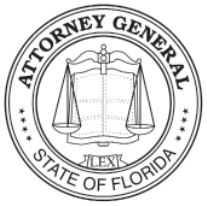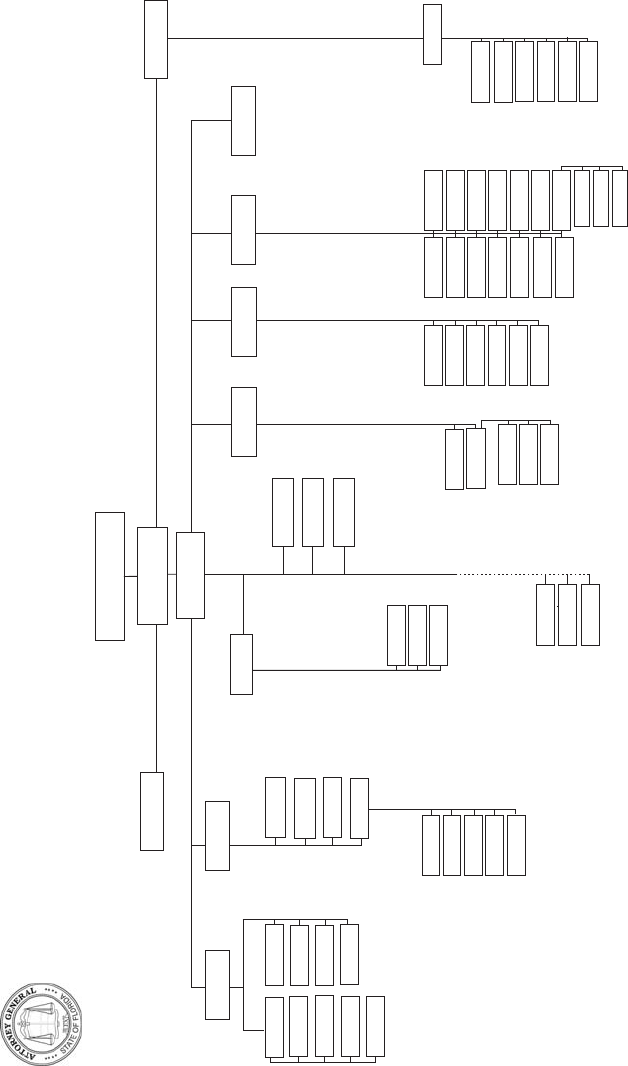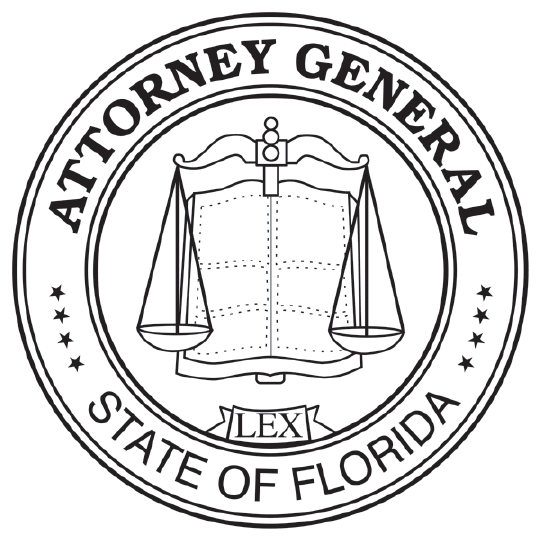
BIENNIAL REPORT
of the
ATTORNEY GENERAL
STATE OF FLORIDA
January 1, 2013, through December 31, 2014
PAM BONDI
Attorney General
Tallahassee, Florida
2015

ii
CONSTITUTIONAL DUTIES OF THE
ATTORNEY GENERAL
The revised Constitution of Florida of 1968 sets out the duties of
the Attorney General in Subsection (c), Section 4, Article IV, as:
“...the chief state legal offi cer.”
By statute, the Attorney General is head of the Department of
Legal Affairs, and supervises the following functions:
Serves as legal advisor to the Governor and other executive
offi cers of the State and state agencies;
Defends the public interest;
Represents the State in legal proceedings;
Keeps a record of his or her offi cial acts and opinions;
Serves as a reporter for the Supreme Court.

iii
STATE OF FLORIDA
OFFICE OF ATTORNEY GENERAL
PAM BONDI
February 27, 2015
The Honorable Rick Scott
Governor of Florida
The Capitol
Tallahassee, Florida 32399-0001
Dear Governor Scott:
Pursuant to my constitutional duties and the statutory
requirement that this offi ce periodically publish a report on
the Attorney General offi cial opinions, I submit herewith the
biennial report of the Attorney General for the two preceding
years from January 1, 2013, through December 31, 2014.
This report includes the opinions rendered, an organizational
chart, and personnel list. The opinions are alphabetically
indexed by subject in the back of the report with a table of
constitutional and statutory sections cited in the opinions.
It’s an honor to serve with you for the people of Florida.
Sincerely,
Pam Bondi
Attorney General
iv
TABLE OF CONTENTS
Page
Constitutional Duties of the Attorney General ....................................... ii
Letter of Transmittal ..................................................................................... iii
Table of Contents ........................................................................................... iv
Attorneys General of Florida since 1845 .................................................... v
Department of Legal Affairs .........................................................................vi
Statement of Policy Concerning Attorney General Opinions ........... xii
Seal of the Attorney General of Florida ................................................ xvii
OPINIONS
Opinions 2013 .................................................................................................... 1
Opinions 2014 ................................................................................................ 125
INDEX AND CITATOR
General Index ................................................................................................181
Citator to Florida Statutes, Constitution,
and Session Laws ..........................................................................................192
v
ATTORNEYS GENERAL OF FLORIDA
SINCE 1845
Joseph Branch ......................................................1845-1846
Augustus E. Maxwell ...........................................1846-1848
James T. Archer ...................................................1848-1848
David P. Hogue .....................................................1848-1853
Mariano D. Papy ...................................................1853-1860
John B. Galbraith .................................................1860-1868
James D. Wescott, Jr. ...........................................1868-1868
A. R. Meek ...............................................................1868-1870
Sherman Conant ...................................................1870-1870
J. P. C. Drew ..........................................................1870-1872
H. Bisbee, Jr. ..........................................................1872-1872
J. P. C. Emmons ....................................................1872-1873
William A. Cocke ...................................................1873-1877
George P. Raney ...................................................1877-1885
C. M. Cooper...........................................................1885-1889
William B. Lamar ..................................................1889-1903
James B. Whitfi eld ................................................1903-1904
W. H. Ellis ...............................................................1904-1909
Park Trammell ......................................................1909-1913
Thomas F. West .....................................................1913-1917
Van C. Swearingen ...............................................1917-1921
Rivers Buford ........................................................1921-1925
J. B. Johnson .........................................................1925-1927
Fred H. Davis .........................................................1927-1931
Cary D. Landis.......................................................1931-1938
George Couper Gibbs ..........................................1938-1941
J. Tom Watson .......................................................1941-1949
Richard W. Ervin ..................................................1949-1964
James W. Kynes.....................................................1964-1965
Earl Faircloth ........................................................1965-1971
Robert Shevin ........................................................1971-1979
Jim Smith ...............................................................1979-1987
Robert A. Butterworth ........................................1987-2002
Richard E. Doran ................................................. 2002-2003
Charlie Crist ......................................................... 2003-2007
Bill McCollum ........................................................2007-2011
Pam Bondi ..............................................................2011-

vi
!
!
"
vii
OFFICE OF THE ATTORNEY GENERAL
The Capitol, Tallahassee, Florida 32399-1050
(850) 245-0140
PAMELA BONDI
Attorney General
TYLER CATHEY
Chief Deputy
Attorney General
NICOLAS COX
StatewideProsecutor
STEVE RUMPH JR.
Inspector General
KENT PEREZ
Deputy
Attorney General
PATRICIA GLEASON
Special Counsel
For Open
Government
PATRICIA CONNERS
Deputy
Attorney General
CAROLYN SNURKOWSKI
Associate Deputy
Attorney General
For Criminal Appeals
EMERY GAINEY
Director of Law
Enforcement
Victims & Criminal
Justice Program
CHESTERFIELD SMITH JR.
Associate Deputy
Attorney General
For General Civil Litigation
ALLEN WINSOR
Solicitor General
Richard Lawson
Director of
Economic Crimes
JIM VARNADO
Associate Deputy
Attorney General
For Medicaid Fraud
Danille Carroll
Director of Civil Rights
Dana Wiehle
Acting Director of
Lemon Law
Bonnie Rogers
Director of
Administration
Vacant
Director of Opinions
Jennifer Meale
Communications
Director
Robert Johnson
Director of Legislative
& Cabinet Affairs
Jason Rodriguez
External Affairs
Director
Vacant
Director of
Information Services
Kimberli Oswald
Director of
Citizen Services
viii
Shayne Burnham
Victoria Butler
Arabella Campbell
David Campbell
Leslie Campbell
Kristin Cantrell
James Carney
Cynthia Carrino
Danille Carroll
Eual Cathey
Justin Chapman
Emmanuela Charles
Carrol Cherry
Maria Chisholm
Brandon Christian
Mary Clark
Rachel Clark
Robert Clements
Katherine Cline
Robin Compton
Cynthia Comras
Anne Conley
Bethany Connelly
Patricia Conners
Antony Constantini
Carmen Corrente
James Cox
Shelley Cridlin
Sara Dahod
Ralph Damato
Stephanie Daniel
Howard Dargan
Jessica Dasilva
Kristen Davenport
Jason Davis
Michael Davis
Carol Degraffenreidt
Patrick Delaney
Peter Delia
Arielle Demby Berger
Cornelius Demps
Timothy Dennis
Diane Dewolf
Blair Dickert
Robert Dietz
Joanne Diez
Jeffrey Dikman
Jennifer Dillon
Carol Dittmar
Douglas Dolan
Kendrick Donnelly
Susan Dunlevy
Mark Dunn
Shirley Durham
David Earl
Angel Eason
Mitchell Egber
Melissa Eggers
Carine Emplit
Alex Ershock
Diana Esposito
Elizabeth Everson
Charles Fahlbusch
Bilal Faruqui
Laura Fisher
Ryann Flack
Michael Flury
David Flynn
Robert Follis
William Foster
Deborah Fraim
Colin Fraser
Timothy Fraser
Timothy Freeland
Allie Freshman
Timothy Frizzell
David Fugett
Anne Furlow
William Gandy Jr
Sonia Garcia-Solis
Steven Gard
Cedell Garland
Sean Garvey
Jared Gass
Allan Geesey
Jeffrey Geldens
Sean Gellis
Fulvio Gentili
Donna Gerace
Jeanine Germanowicz
Peter Gioia
Douglas Glaid
David Glantz
Patricia Gleason
Jill Adams
Rotem Adar
Jacob Addicott
Stephen Ake
Jeannette Andrews-
Thompson
Thomas Arden
Albert Arena
Alexa Argerious
William Armistead
David Asti
John Bajger
Samantha Josephine Baker
Thomas Barnhart
Glen Bassett
Marilyn Beccue
Carla Bechard
Kenneth Beck
Kelly Behmke
Jill Bennett-Bodner
Laurie Benoit-Knox
Stephanie Bergen
Toni Bernstein
Heidi Bettendorf
Kristin Bigham
Sofi a Bilokryla
William Bissell
Meghdut Biswas
Jennifer Blanton
Laura Boeckman
Kirsten Bonjour
Jessica Bouis
Albert Bowden
Jessica Boxer
James Boynton Jr
Lisabeth Brady
Ravi Brammer
William Branch
Jamie Braun
Cheryl Brittle
Jerrett Brock
Karen Brodeen
Scott Browne
Lauren Brudnicki
Cindy Bruschi
Wendy Buffi ngton
David Bundy
ix
Lisa Glick
Jonathan Glogau
Stacey Gomez-Sutter
Ely Gonzalez
Eric Gonzalez
Alicia Gordon
Ashley Grafton
Ashley Grant
Marcus Graper
James Graulich
Dayle Green
David Grimes
David Grossman
Diane Guillemette
Lindsey Guinand
Tonya Guinn
Maria Guitian Barker
Lee Gustafson
Melody Hadley
Kathleen Hagan
Lori Hagan
Meredith Hall
Mark Hamel
Mark Hamilton
Gerry Hammond
Christi Hankins
Julia Harris
Lawrence Harris
Virginia Harris
Wesley Heidt
Joshua Heller
Angela Hensel
Donna Hernandez
Nikole Hiciano O’neil
Jennifer Hinton
Benedict Hoffman
Sonya Horbelt
Martha Hurtado
Angela Huston
Elmer Ignacio
Nicholas Igwe
Lee Istrail
Akio Ito
Jamie Ito
Nancy Jack
Sandra Jaggard
Clark Jennings
Georgina Jimenez-Orosa
Caroline Johnson Levine
Kristen Johnson
Robert Johnson
Bryan Jordan
Aniska Joseph
Keri Joseph
Linda Katz
Brent Kelleher
Russell Kent
Ann Keough
Denise Kim
Stacey Kircher
Robin Kissin
Katherine Kiziah
John Klawikofsky
Donna Koch
Peter Koclanes
Pamela Koller
Jill Kramer
Robert Krauss
Jay Kubica
Jacqueline Kurland
Donna Laplante
Nancy Lawler
Richard Lawson
Lisa-Marie Lerner
Norman Levin
Gillian Leytham
Catherine Linton
Wendy Linton
Sandy Lipman
Deborah Loucks
Michele Lucas
Amdrea Luedecker
Christopher Lumpkin
Giselle Lylen
Sara Macks
Susan Maher
Patrice Malloy
Daryl Manning
Luz Maria-Montero
Julian Markham III
Luis Martinez
Elba Martin-Schomaker
Linda Matthews
James McAuley
Amanda McCarthy
Patricia McCarthy
Charles McCoy
Michael McDermott
Anne McDonough
Rebbeca McGuigan
Katherine McIntire
James McNamara III
Carrie McNamara
Caroline McNulty Bernal
Donna McNulty
Jennifer Meister
Melynda Melear
Michael Mervine
Tammy Metcalf
John Mika
Jason Miller
Charmaine Millsaps
Robert Milne
Ilana Mitzner
Jacqueline Moody
Audrey Moore
Jennifer Moore
Nicole Moore
Allison Morris
Thomas Munkittrick
Teresa Mussetto
Luke Napodano
Bill Navas
Lance Neff
Eric Neiberger
Betty Nestor
Kellie Nielan
Elizabeth Nixon
Angela Noble
Rachel Nordby
Diane Oates
Matthew Ocksrider
Mary Ottinger
Magdalena Ozarowski
Robert Palmer
Michelle Pardoll
Titania Parker
Helene Parnes
Bonnie Parrish
Matthew Parrish
Trisha Pate
x
Matthew Pavese
Wesley Paxson III
Joi Pearsall
Ivy Pereira Rollins
Kent Perez
Samuel Perrone
Steven Perry
Kristen Pesicek
Mary Pettit
Ann Phillips
Richard Polin
Priscilla Quinones
Lisa Raleigh
Jonathan Rhodes
James Riecks
Marie Rives
Priscilla Roberts
Magaly Rodriguez
Don Rogers
Susan Rogers
Monique Rolla
Evan Rosen
Aimee Rosenblum
Heather Ross
Seth Rubin
Candance Sabella
Johnny Salgado
Amanda Sansone
Alfred Saunders
Alisha Savani
Richard Schiffer
Carolyn Schwarz
Jessica Schwieterman
Susan Shanahan
Tiffany Short
Sarah Shullman
Jay Silver
David Silverstein
Holly Simcox
Darlene Simmons
Hagerenesh Simmons
Jamie Simons
Carol Simpson
Rebecca Sirkle
Gregory Slemp
Janet Smith
Joshua Soileau
Mary Soorus
Joseph Spejenkowski
Douglas Squire
William Stafford III
Elizabeth Starr
Samuel Steinberg
Rachel Steinman
Jessica Stephans
Jillian Stephens
Marlene Stern
Paul Stevenson
Monica Stinson
Jacek Stramski
Betsy Stupski
Melanie Surber
Adam Tanenbaum
Matthew Tannenbaum
Kaylee Tatman
Cerese Taylor
Elizabeth Teegen
Edward Tellechea
Celia Terenzio
Britt Thomas
Stephen Thomas
Lisa Tietig
Dawn Tiffi n
Andrea Totten
Mimi Turin
Jason Vail
Alycia Vajgert
Donna Valin
Richard Valuntas
Erin Van De Walle
Elizabeth Van Den Berg
Katherine Varsegi
Osvaldo Vazquez
Ann Vecchio
Tonja Vickers
Marjorie Vincent-Tripp
Matthew Vitale
Kathleen Von Hoene
Rebecca Wall
Gretchen Wallace
Shane Weaver
Nicholas Weilhammer
Marlon Weiss
Katie Welch
W Joseph Werner
Stephen White
Dana Wiehle
Jaakan Williams
Kenneth Wilson
Blaine Winship
Allen Winsor
Katelyn Wright
Colleen Zaczek
Jason Zapper
Danielle Zemola
Christina Zuccaro
xi
ASSISTANT STATEWIDE PROSECUTORS
Lisa Acharekar
Lawonda Athouriste
Dayna Baskette
Diana Bock
Shireen Brueggeman
Melissa Checchio
Jessica Costello
Nicholas Cox
Diane Croff
Nickolaus Davis
Katherine Diamandis
Jessica Dobbins
Paul Dontenville
Kelly Eckley
Nicole Pegues
Michael-Anthony Pica
Priscilla Prado Stroze
Brent Riggle
John Roman
Laura Rose
James Schneider
Jeremy Scott
Julie Sercus
Joseph Spataro
Jeffrey Stone
Stephanie Tew
Audra Thomas-Eth
John Wethington III
Michael Williams
Robert Finkbeiner
Jeremy Franker
Oscar Gelpi
Kathleen George
David Gillespie
Kelsey
Hellstrom
Julie Hogan
Stephen Immasche
Margery Lexa
John Maceluch
Hannon MacGillis
Gary Malak
Kelly McKnight
Michael Nieman
xii
DEPARTMENT OF LEGAL AFFAIRS
Attorney General Opinions
I. General Nature and Purpose of Opinions
Issuing legal opinions to governmental agencies has long been
a function of the Offi ce of the Attorney General. Attorney General
Opinions serve to provide legal advice on questions of statutory
interpretation and can provide guidance to public bodies as an
alternative to costly litigation. Opinions of the Attorney General,
however, are not law. They are advisory only and are not binding in a
court of law. Attorney General Opinions are intended to address only
questions of law, not questions of fact, mixed questions of fact and
law, or questions of executive, legislative or administrative policy.
Attorney General Opinions are not a substitute for the advice and
counsel of the attorneys who represent governmental agencies and
offi cials on a day to day basis. They should not be sought to arbitrate
a political dispute between agencies or between factions within an
agency or merely to buttress the opinions of an agency's own legal
counsel. Nor should an opinion be sought as a weapon by only one side
in a dispute between agencies.
Particularly diffi cult or momentous questions of law should be
submitted to the courts for resolution by declaratory judgment.
When deemed appropriate, this offi ce will recommend this course
of action. Similarly, there may be instances when
securing a
declaratory statement under the Administrative Procedure Act will
be appropriate and will be recommended.
II. Types of Opinions Issued
There are several types of opinions issued by the Attorney General's
Offi ce. All legal opinions issued by this offi ce, whether formal or
informal, are persuasive authority and not binding.
Formal numbered opinions are signed by the Attorney General
and published in the Annual Report of the Attorney General. These
opinions address questions of law which are of statewide concern.
This offi ce also issues a large body of informal opinions.
Generally these opinions address questions of more limited
application. Informal opinions may be signed by the Attorney
General or by the drafting assistant attorney general. Those
xiii
signed by the Attorney General are generally issued to public offi cials
to whom the Attorney General is required to respond. While an
offi cial or agency may request that an opinion be issued as a formal
or informal, the determination of the type of opinion issued rests with
this offi ce.
III. Persons to Whom Opinions May Be Issued
The responsibility of the Attorney General to provide legal opinions
is specifi ed in section 16.01(3), Florida Statutes, which provides:
Notwithstanding any other provision of law, shall, on the written
requisition of the Governor, a member of the Cabinet, the head
of a department in the executive branch of state government,
the Speaker of the House of Representatives, the President of
the Senate, the Minority Leader of the House of Representatives,
or the Minority Leader of the Senate, and may, upon the written
requisition of a member of the Legislature, other state offi cer, or
offi cer of a county, municipality, other unit of local government,
or political subdivision, give an offi cial opinion and legal advice in
writing on any question of law relating to the offi cial duties of the
requesting offi cer.
The statute thus requires the Attorney General to render opinions
to “the Governor, a member of the Cabinet, the head of a department
in the executive branch of state government, the Speaker of the House
of Representatives, the President of the Senate, the Minority Leader of
the House of Representatives, or the Minority Leader of the Senate....”
The Attorney General may also issue opinions to “a member of the
Legislature, other state offi cer, or offi cer of a county, municipality,
other unit of local government, or political subdivision.” In addition,
the Attorney General is authorized to provide legal advice to the
state attorneys and to the representatives in Congress from this state.
Sections 16.08 and 16.52(1), Florida Statutes.
Questions relating to the powers and duties of a public board
or commission (or other collegial public body) should be requested
by a majority of the members of that body. A request from a board
should, therefore, clearly indicate that the opinion is being sought by
a majority of its members and not merely by a dissenting member or
faction.
xiv
IV. When Opinions Will Not Be Issued
Section 16.01(3), Florida Statutes, does not authorize the Attorney
General to render opinions to private individuals or entities, whether
their requests are submitted directly or through governmental
offi cials. In addition, an opinion request must relate to the requesting
offi cer's own offi cial duties. An Attorney General Opinion will not,
therefore, be issued when the requesting party is not among the
offi cers specifi ed in section 16.01(3), Florida Statutes, or when an
offi cer falling within section 16.01(3), Florida Statutes, asks a question
not relating to his or her own offi cial duties.
In order not to intrude upon the constitutional prerogative of the
judicial branch, opinions generally are not rendered on questions
pending before the courts or on questions requiring a determination
of the constitutionality of an existing statute or ordinance.
Opinions generally are not issued on questions requiring an
interpretation only of local codes, ordinances or charters rather
than the provisions of state law. Instead such requests will usually
be referred to the attorney for the local government in question. In
addition, when an opinion request is received on a question falling
within the statutory jurisdiction of some other state agency, the
Attorney General may, in the exercise of his or her discretion, transfer
the request to that agency or advise the requesting party to contact the
other agency. For example, questions concerning the Code of Ethics
for Public Offi cers and Employees may be referred to the Florida
Commission on Ethics; questions arising under the Florida Election
Code may be directed to the Division of Elections in the Department
of State.
However, as quoted above, section 16.01(3), Florida Statutes,
provides for the Attorney General's authority to issue opinions
"[n]otwithstanding any other provision of law," thus recognizing the
Attorney General's discretion to issue opinions in such instances.
Other circumstances in which the Attorney General may decline to
issue an opinion include:
• questions of a speculative nature;
• questions requiring factual determinations;
• questions which cannot be resolved due to an irreconcilable
confl ict in the laws although the Attorney General may attempt
to provide general assistance;
xv
• questions of executive, legislative or administrative policy;
• matters involving intergovernmental disputes unless all
governmental agencies concerned have joined in the request;
moot questions;
• questions involving an interpretation only of local codes,
charters, ordinances or regulations; or
• where the offi cial or agency has already acted and seeks to
justify the action.
V. Form In Which Request Should Be Submitted
Requests for opinions must be in writing and should be
addressed to:
Pam Bondi
Attorney General
Department of Legal Affairs
PL01 The Capitol
Tallahassee, Florida 32399-1050
The request should clearly and concisely state the question of law
to be answered. The question should be limited to the actual matter
at issue. Suffi cient elaboration should be provided so that it is not
necessary to infer any aspect of the question or the situation on which
it is based. If the question is predicated on a particular set of facts or
circumstances, these should be fully set out.
The response time for requests for Attorney General Opinions
has been substantially reduced. This offi ce attempts to respond to
all requests for opinions within 30 days of their receipt in this offi ce.
However, in order to facilitate this expedited response to opinion
requests, this offi ce requires that the attorneys for public entities
requesting an opinion supply this offi ce with a memorandum of law to
accompany the request. The memorandum should include the opinion
of the requesting party's own legal counsel, a discussion of the legal
issues involved, together with references to relevant constitutional
provisions, statutes, charter, administrative rules, judicial decisions,
etc.
Input from other public offi cials, organizations or associations
representing public offi cials may be requested. Interested parties
may also submit a memorandum of law and other written material
xvi
or statements for consideration. Any such material will be attached to
and made a part of the permanent fi le of the opinion request to which
it relates.
VI. Miscellaneous
This offi ce provides access to formal Attorney General Opinions
through a searchable database on the Attorney General’s website at:
myfl oridalegal.com
Persons who do not have access to the Internet and wish to obtain a
copy of a previously issued formal opinion should contact the Florida
Legal Resource Center of the Attorney General’s Offi ce. Copies of
informal opinions can be obtained from the Opinions Division of the
Attorney General's Offi ce.
As an alternative to requesting an opinion, offi cials may wish to
use the informational pamphlet prepared by this offi ce on dual offi ce-
holding for public offi cials. Copies of the pamphlet can be obtained
by contacting the Opinions Division of the Attorney General's Offi ce.
In addition, the Attorney General, in cooperation with the First
Amendment Foundation, has prepared and annually updates the
Government in the Sunshine Manual which explains the law under
which Florida ensures public access to the meetings and records of
state and local government. Copies of this manual can be obtained
through the First Amendment Foundation.

xvii
Pam Bondi
The Capitol
Tallahassee

BIENNIAL REPORT OF THE ATTORNEY GENERAL
13-01
1
BIENNIAL REPORT
of the
ATTORNEY GENERAL
State of Florida
January 1, 2013, through December 31, 2014
AGO 13-01 – January 29, 2013
MUNICIPALITIES – FARM BUILDINGS – SIGNS – FENCES –
LAND DEVELOPMENT REGULATIONS
REGULATION OF NONRESIDENTIAL FARM BUILDING BY
MUNICIPALITIES
To: Mr. Michael D. Cirullo, Jr., Town Attorney for the Town of
Loxahatchee Groves
QUESTION:
Does section 604.50, Florida Statutes, exempt nonresidential
farm buildings, farm fences, and farm signs from land
development regulations adopted pursuant to Chapter 163,
Florida Statutes?
SUMMARY:
Section 604.50, Florida Statutes, exempts nonresidential farm
buildings, farm fences, and farm signs from land development
regulations adopted by the Town of Loxahatchee Groves
pursuant to Chapter 163, Florida Statutes.
Section 604.50, Florida Statutes, makes provision for nonresidential
farm buildings, farm fences, and farm signs:
(1) Notwithstanding any provision of law to the contrary,
any nonresidential farm building, farm fence, or farm sign
is exempt from the Florida Building Code and any county or
municipal code or fee, except for code provisions implementing
local, state, or federal fl oodplain management regulations. A
farm sign located on a public road may not be erected, used,
operated, or maintained in a manner that violates any of the
standards provided in s. 479.11(4), (5)(a), and (6) (8).
The statute defi nes the terms used in the section for purposes of
statutory construction.
1

BIENNIAL REPORT OF THE ATTORNEY GENERAL
13-01
2
Prior to the adoption of Chapter 2011-7, Laws of Florida, this statute
provided that “[n]otwithstanding any other law to the contrary, any
nonresidential farm building is exempt from the Florida Building Code
and any county or municipal building code.”
2
(e.s.) The Legislature’s
removal of the term “building” from the language of the statute relating
to county or municipal codes has resulted in your request for an opinion
from this offi ce.
The Town of Loxahatchee Groves has adopted land development
regulations pursuant to Chapter 163, Florida Statutes, entitled the
“Unifi ed Land Development Code.” The town’s land development
regulations contain typical setback requirements for properties in
the town. Subject to consistency with the Right to Farm Act, the
town has sought to enforce setback requirements upon nonresidential
farm buildings, such as shade houses, corrals, and barns.
3
However,
the change to section 604.50(1), Florida Statutes, which exempts
nonresidential farm buildings, farm fences, and farm signs from “any
county or municipal code” would prevent the town from enforcing its
zoning regulations, such as setbacks for nonresidential farm buildings,
farm fences, and farm signs if it is determined that section 604.50,
Florida Statutes, provides an exemption for nonresidential farm
buildings and farm fences and signs from the town’s land development
regulations.
It is a general rule of statutory construction, frequently expressed by
Florida courts that:
When a statute is clear, courts will not look behind the
statute’s plain language for legislative intent or resort to rules
of statutory construction to ascertain intent. Instead, the
statute’s plain and ordinary meaning must control, unless this
leads to an unreasonable result or a result clearly contrary to
legislative intent.
4
Section 604.50(1), Florida Statutes, clearly states that “[n]ot
withstanding any provision of law to the contrary, any nonresidential
farm building, farm fence, or farm sign is exempt from . . . any county or
municipal code or fee[.]” The Legislature has maintained an exception
for code provisions implementing local, state, or federal fl oodplain
management regulations. Applying the rule of construction set forth
above compels the conclusion that the Town of Loxahatchee Groves has
no authority to enforce “any county or municipal code or fee” provision
on any nonresidential farm building, farm fence, or farm sign.
Further, a review of the legislative history surrounding the enactment
of CS/HB 7103 during the 2010 and 2011 legislative sessions, suggests
that this was the legislative intent. Staff analysis of the bill by both
the House and the Senate states that the amendment to section 604.50,
Florida Statutes, will exempt farm fences from the Florida Building

BIENNIAL REPORT OF THE ATTORNEY GENERAL
13-01
3
Code and farm fences and nonresidential farm buildings and fences
from county or municipal codes and fees, except fl oodplain management
regulations. It provides that a nonresidential farm building may
include, but not be limited to, a barn, greenhouse, shade house, farm
offi ce, storage building, or poultry house.
5
The intent of the Legislature is the primary guide in statutory
interpretation.
6
Where the language used by the Legislature makes
clear its intent, that intent must be given effect.
7
Thus, absent a
violation of a constitutional right, a specifi c, clear and precise statement
of legislative intent will control in the interpretation of a statute.
8
Your memorandum of law suggests that the word “code” as used
in section 604.50(1), Florida Statutes, may not include the Town of
Loxahatchee Groves’ “Unifi ed Land Development Code.” While the
Florida Statutes contain a number of defi nitions for the word “code,”
9
the
fact that the Legislature provided no defi nition for purposes of section
604.50(1), or Chapter 604, Florida Statutes, requires that the word be
understood in its common and ordinary sense.
10
“Code” is generally
defi ned as:
3. any set of standards set forth and enforced by a local
government agency for the protection of public safety, health,
etc., as in the structural safety of buildings (building code),
health requirements for plumbing, ventilation, etc. (sanitary or
health code), and the specifi cations for fi re escapes or exits (fi re
code). 4. a systematically arranged collection or compendium
of laws, rules, or regulations.
11
Black’s Law Dictionary defi nes “code” as “[a] complete system of
positive law, carefully arranged and offi cially promulgated; a systematic
collection or revision of laws, rules, or regulations[.]”
12
The term “land development regulations” is defi ned in section
163.3164, Florida Statutes, as:
“Land development regulations” means ordinances enacted by
governing bodies for the regulation of any aspect of development
and includes any local government zoning, rezoning,
subdivision, building construction, or sign regulations or any
other regulations controlling the development of land, except
that this defi nition does not apply in s. 163.3213.
13
You have advised that the Town of Loxahatchee Groves developed
its land development code pursuant to Chapter 163, Florida Statutes.
You state that while a collection of land development regulations would
appear to fall within the general defi nition of “code,” section 604.50,
Florida Statutes, applies solely to “nonresidential farm buildings” and
“farm fences.” You contrast this with land development regulations

BIENNIAL REPORT OF THE ATTORNEY GENERAL
13-01
4
which apply to “the development of land,” but which include, as set forth
in the defi nition above, such matters as zoning, building construction,
and sign regulations.
I cannot draw such a distinction. The Town of Loxahatchee Groves
“Unifi ed Land Development Code” appears to be a “code” within the
scope of that term as used in section 604.50(1), Florida Statutes. The
Legislature clearly intended to exempt nonresidential farm buildings,
farm fences, and farm signs from “any county or municipal code.” Thus,
recognizing the Legislature’s intent, it is my opinion that nonresidential
farm buildings, farm fences, and farm signs are exempted from
regulation under the land development regulations of the town.
14
In sum, it is my opinion that section 604.50, Florida Statutes, exempts
nonresidential farm buildings, farm fences, and farm signs from land
development regulations adopted by the Town of Loxahatchee Groves
pursuant to Chapter 163, Florida Statutes.
15
1
Section 604.50(2), Fla. Stat., defi nes these terms as follows:
(a) “Farm” has the same meaning as provided in s. 823.14.
(b) “Farm sign” means a sign erected, used, or maintained on
a farm by the owner or lessee of the farm which relates solely
to farm produce, merchandise, or services sold, produced,
manufactured, or furnished on the farm.
(c) “Nonresidential farm building” means any temporary or
permanent building or support structure that is classifi ed as a
nonresidential farm building on a farm under s. 553.73(10)(c)
or that is used primarily for agricultural purposes, is located on
land that is an integral part of a farm operation or is classifi ed
as agricultural land under s. 193.461, and is not intended to
be used as a residential dwelling. The term may include, but
is not limited to, a barn, greenhouse, shade house, farm offi ce,
storage building, or poultry house.
2
See s. 604.50, Fla. Stat. (2002).
3
See Ops. Att’y Gen. Fla. 09-26 (2009) and 01-71 (2001) in which this
offi ce concluded that a county could enforce land development regulations
pursuant to s. 823.14, Fla. Stat., Florida’s Right to Farm Act, so long as
those regulations did not limit the operational activities of a bona fi de
farm operation inconsistent with the Right to Farm Act. Both of these
opinions addressed s. 823.14, Fla. Stat., and were issued prior to the
amendment to s. 604.50, Fla. Stat., in 2011 by CS/HB 7103.
4
See e.g., State v. Burris, 875 So. 2d 408 (Fla. 2004); State v. Egan,
287 So. 2d 1 (Fla. 1973); Van Pelt v. Hilliard, 78 So. 693 (Fla. 1918);
Legal Environmental Assistance Foundation, Inc. v. Board of County
Commissioners of Brevard County, 642 So. 2d 1081 (Fla. 1994); Goddard

BIENNIAL REPORT OF THE ATTORNEY GENERAL
13-01
5
v. State, 438 So. 2d 110 (Fla. 1st DCA 1983); Ops. Att’y Gen. Fla. 93-
47 (1993) (in construing statute which is clear and unambiguous, the
plain meaning of statute must fi rst be considered); 93-2 (1993) (since it
is presumed that the Legislature knows the meaning of the words it uses
and to convey its intent by the use of specifi c terms, courts must apply the
plain meaning of those words if they are unambiguous); and 92-93 (1992).
5
See The Florida Senate Veto Message Bill Analysis for CS/HB 7103,
dated July 12, 2010, and House of Representatives Staff Analysis, CS/HB
7103, dated April 14, 2010, and stating that section 6 of the bill “exempts
farm fences from the Florida Building Code, and exempts farm fences and
nonresidential farm buildings from county or municipal codes and fees,
except for code provisions implementing local, state, or federal fl oodplain
management regulations.”
6
See, e.g., State v. J.M., 824 So. 2d 105, 109 (Fla. 2002); St. Petersburg
Bank & Trust Co. v. Hamm, 414 So. 2d 1071 (Fla. 1982); Barruzza v.
Suddath Van Lines, Inc., 474 So. 2d 861 (Fla. 1st DCA 1985); Philip
Crosby Associates, Inc. v. State Board of Independent Colleges, 506 So. 2d
490 (Fla. 5th DCA 1987).
7
Barruzza and Philip Crosby Associates, Inc., supra.
8
Carawan v. State, 515 So. 2d 161 (Fla. 1987).
9
See s. 320.822, Fla. Stat. (uniform standard code for recreational
vehicles and park trailers), and s. 553.955, Fla. Stat. (providing that the
word “code” is defi ned for purposes of those statutes as the Florida Energy
Effi ciency Code for Building Construction).
10
See Southeast Fisheries Association, Inc. v. Department of Natural
Resources, 453 So. 2d 1351 (Fla. 1984); Millazzo v. State, 377 So. 2d 1161
(Fla. 1979) (when a statute does not specifi cally defi ne words of common
usage, such words are construed in their plain and ordinary sense).
11
Webster’s New Universal Unabridged Dictionary (2003), p. 397.
12
Black’s Law Dictionary (8th ed. 2004), p. 273.
13
Section 163.3164(26), Fla. Stat.
14
Your letter states that “if Section 604.50 is intended to expand the
exemption for nonresidential farm buildings, fences and signs to all
municipal regulations, then Section 823.14, Florida Statutes, would be
superfl uous as to nonresidential farm buildings, fences and signs, since
an exemption from a code means there cannot be duplication of codes.”
However, s. 604.50 and s. 823.14, Fla. Stat., the Florida Right to Farm
Act, can be read in such a manner as to give effect to both. See Ideal
Farms Drainage District et al. v. Certain Lands, 19 So. 2d 234 (Fla. 1944);
Mann v. Goodyear Tire and Rubber Company, 300 So. 2d 666 (Fla. 1974),
for the proposition that when two statutes relate to common things or
have a common or related purpose, they are said to be pari materia, and

BIENNIAL REPORT OF THE ATTORNEY GENERAL
13-02
6
where possible, that construction should be adopted which harmonizes
and reconciles the statutory provisions so as to preserve the force and
effect of each. Section 604.50, Fla. Stat., is the more specifi c statute
and completely exempts nonresidential farm buildings, farm fences, and
farm signs from regulation under the town’s codes. Section 823.14, Fla.
Stat., is intended by the Legislature to “protect reasonable agricultural
activities conducted on farm land from nuisance suits.” The Right to
Farm Act would accommodate other types of land development regulation
undertaken in compliance with the terms of the act, but the more specifi c
subjects of s. 604.50, Fla. Stat., would be excluded from the terms of the
act. Thus, these two statutes, both related to farming, can be read to give
a scope of operation to each.
15
I would note that the Offi ce of General Counsel, Florida Department of
Agriculture and Consumer Services, has submitted a letter on this issue
concluding that “it is the opinion of the Department of Agriculture and
Consumer Services that this legislation applies to all local codes including
land development regulations.” See letter from Carol A. Forthman, Offi ce
of the General Counsel, Florida Department of Agriculture and Consumer
Services, to Mr. Michael D. Cirullo, Jr., dated November 20, 2012.
AGO 13-02 – January 29, 2013
SOUTH FLORIDA REGIONAL TRANSPORTATION
AUTHORITY – MUNICIPALITIES – DUAL OFFICE-HOLDING
CITY COMMISSIONER MAY SERVE AS MEMBER OF
GOVERNING BOARD OF SPECIAL DISTRICT TRANSPORTATION
AUTHORITY
To: Mr. David K. Wolpin, Ms. Laura K. Wendell, City Attorneys for the
City of Aventura
QUESTION:
May a city commissioner simultaneously serve as a member
of the governing board of the South Florida Regional
Transportation Authority without violating the dual office-
holding prohibition in section 5(a), Article II of the Florida
Constitution?
SUMMARY:
A city commissioner may simultaneously serve as a member
of the governing board of the South Florida Regional
Transportation Authority without violating the dual offi ce-
holding prohibition in section (5)(a), Article II of the Florida
Constitution, because the authority is a special district.

BIENNIAL REPORT OF THE ATTORNEY GENERAL
13-02
7
Article II, section 5(a), Florida Constitution, provides in part that
“[n]o person shall hold at the same time more than one offi ce under
the government of the state and the counties and municipalities
therein . . . .” While the constitutional provision does not defi ne the
term “offi ce” or “offi cer,” the Supreme Court of Florida has stated that
an “offi ce” implies a delegation of a portion of the sovereign power to,
and the possession of it by, the person fi lling the offi ce.
1
The constitutional dual offi ce-holding prohibition, however, refers
only to state, county, and municipal offi ces. There is no reference in
the constitutional prohibition to special district offi ces, such that both
the courts and this offi ce have therefore concluded that the dual offi ce-
holding prohibition does not apply to the offi cers of an independent
special district. In Advisory Opinion to the Governor--Dual Offi ce-
Holding,
2
the Supreme Court of Florida reiterated that special district
offi cers are not included within the dual offi ce-holding prohibition,
concluding that a member of a community college district board of
trustees is not included within the dual offi ce-holding prohibition. This
offi ce in Attorney General Opinion 94-83 stated that membership on the
Panama City-Bay County Airport Authority, created as an independent
special district, did not constitute an offi ce for purposes of Article II,
section 5(a), Florida Constitution. The authority was created by law to
perform a limited function and its members were appointed by a diverse
group of governmental agencies that had no oversight or control over
the functions or actions of the authority.
This offi ce has cautioned that care must be taken in determining the
nature and character of a district or authority to determine whether the
governmental entity is an agency of the state, county, or municipality
such that its offi cers may be considered state, county, or municipal
offi cers for purposes of dual offi ce-holding. For example, in Attorney
General Opinion 84-90, this offi ce considered whether a member of
the Volusia County Health Facilities Authority was an offi cer of the
county. While the authority was created and organized under Part III,
Chapter 154, Florida Statutes, as a public body corporate and politic, it
was created by the county by passage of an ordinance or a resolution.
The governing body of the county appointed the authority members,
was empowered to remove the members, and was authorized to abolish
the authority at any time. This offi ce, therefore, concluded that the
authority was an instrumentality of the county and its offi cers were
county offi cers. Thus, the constitutional prohibition against dual offi ce-
holding prohibited a mayor from also serving on the governing body of
the county health facilities authority.
Similarly, in Attorney General Opinion 91-79, this offi ce concluded
that the Fort Walton Beach Area Bridge Authority, created as a
dependent special district within the county, was an instrumentality
of the county for dual offi ce-holding purposes. Under the act creating
the district, the county commission was charged with approving the

BIENNIAL REPORT OF THE ATTORNEY GENERAL
13-02
8
authority’s annual budget and for fi lling vacancies on the authority.
3
There is no question that a city commissioner is an offi cer of the city
for purposes of the dual offi ce-holding prohibition. However, to the
extent the South Florida Regional Transportation Authority (authority)
is a special district, a member of its governing board is not subject to the
constitutional dual offi ce-holding prohibition.
The authority is created as “a body politic and corporate, an agency of
the state” in section 343.53(1), Florida Statutes. Pursuant to its enabling
legislation, the authority has the right to own, operate, maintain, and
manage a transit system in the tri-county area of Broward, Miami-
Dade, and Palm Beach counties.
4
Its governing board is appointed
as follows: each of its member counties selects one of its county
commissioners; the secretary of the Department of Transportation
selects one of the district secretaries (or his or her designee) from the
districts within the authority’s service area “who shall serve ex offi cio as
a voting member[;]” and the Governor appoints three members who are
residents and qualifi ed electors in the service area, but not residents of
the same county.
5
The authority is authorized to “plan, develop, own,
purchase, lease, or otherwise acquire, demolish, construct, improve,
relocate, equip, repair, maintain, operate, and manage a transit system
and transit facilities.” Moreover, the Legislature states its intent that
the authority “shall have overall authority to coordinate, develop, and
operate a regional transportation system within the area served.”
6
While the enabling legislation describes the authority as an “agency
of the state,” the authority is designated as an independent special
district by the Department of Economic Opportunity,
7
operates within
a limited geographical area, and is specifi cally authorized to perform
a limited governmental activity to fulfi ll its purpose. The nature and
purpose of the authority would appear more closely aligned with that
of a special district carrying out its limited powers. Membership on the
authority’s governing board, therefore, is more in the nature of a district
offi ce which is not subject to the constitutional prohibition against dual
offi ce-holding.
Accordingly, it is my opinion that a city commissioner may serve
as a member of the governing board of the South Florida Regional
Transportation Authority without violating the dual offi ce-holding
prohibition in section 5(a), Article II of the Florida Constitution, since
the authority is a special district.
1
State ex rel. Holloway v. Sheats, 83 So. 508, 509 (Fla. 1919); see also
State ex rel. Clyatt v. Hocker, 22 So. 721 (Fla. 1897).
2
630 So. 2d 1055, 1058 (Fla. 1994).

BIENNIAL REPORT OF THE ATTORNEY GENERAL
13-03
9
3
Cf. Op. Att’y Gen. Fla. 90-91 (1990), concluding that the Hillsborough
County Hospital Authority, created by special act with all powers of a body
corporate, whose members are appointed by the Hillsborough County
Commission which possesses the power to fi ll vacancies on the authority,
remove members for misfeasance, malfeasance or willful neglect of duty,
and approve the authority’s budget, was a county agency. And see Op.
Att’y Gen. Fla. 01-28 (2001), in which this offi ce determined that regional
planning council member was a public offi cer subject to the dual offi ce-
holding prohibition, based on Orange County v. Gillespie, 239 So. 2d 132
(Fla. 4th DCA 1970), cert. denied, 239 So. 2d 825 (Fla. 1970) (planning
council member was subject to Florida’s Resign-to-Run Law which at that
time only applied to state, county or municipal offi ces, as councils act
on behalf of the state in implementing state policies regarding growth
management). The AGO notes, however, that regional planning councils
were not (and are still not) listed as special districts by the Department
of Community Affairs (now Department of Economic Opportunity).
Questions regarding the resign-to-run law should be addressed to the
Division of Elections, Florida Department of State.
4
Section 343.54(1)(a), Fla. Stat.
5
Section 343.53(2), Fla. Stat.
6
Section 343.54(1)(b), Fla. Stat.
7
See http://dca.deo.myfl orida.com/fhcd/sdip/Offi cialListdeo/report.cfm.
AGO 13-03 – January 30, 2013
PUBLIC RECORDS – ELECTRONIC RECORDS – COPIES –
E-MAIL
CHARGES FOR PROVIDING COPIES OF PUBLIC RECORDS BY
E-MAIL
To: Ms. Sonja K. Dickens, City of Miami Gardens Attorney
QUESTION:
May the City of Miami Gardens impose a fee when documents
are downloaded and submitted by electronic mail, in lieu of
photocopying, to the requestor?
SUMMARY:
The City of Miami Gardens may charge the “actual costs
of duplication” for electronic mail forwarded to a public
records requestor in lieu of photocopying those records. When
calculating the “actual costs of duplication,” charges may not

BIENNIAL REPORT OF THE ATTORNEY GENERAL
13-03
10
be made for labor costs or associated overhead costs. However,
section 119.07(4)(d), Florida Statutes, provides that if the
nature or volume of public records to be inspected or copied
requires the extensive use of information technology resources
or extensive clerical or supervisory assistance, or both, the City
of Miami Gardens may charge a reasonable service charge based
on the cost actually incurred by the agency for such extensive
use of information technology resources or personnel. The fact
that the request involves the use of information technology
resources is not suffi cient to incur the imposition of the special
service charge.
According to your letter, a public records request was made to the
records custodian for the City of Miami Gardens for data which the city
compiles and maintains in an electronic format. A further request was
made to deliver the records by electronic mail to avoid the payment of
copying costs. The requestor objected to the payment of any fees for
costs associated with transmitting the documents by way of electronic
mail.
Section 119.01(2)(f), Florida Statutes, requires:
Each agency that maintains a public record in an electronic
recordkeeping system shall provide to any person, pursuant to
this chapter, a copy of any public record in that system which
is not exempted by law from public disclosure. An agency
must provide a copy of the record in the medium requested
if the agency maintains the record in that medium, and the
agency may charge a fee in accordance with this chapter. For
the purpose of satisfying a public records request, the fee
to be charged by an agency if it elects to provide a copy of a
public record in a medium not routinely used by the agency,
or if it elects to compile information not routinely developed or
maintained by the agency or that requires a substantial amount
of manipulation or programming, must be in accordance with s.
119.07(4). (e.s.)
The statute clearly provides that if an agency maintains a record in
a particular medium and that medium is requested for the copy, the
agency “must provide a copy of the record in the medium requested[.]”
1
The statute also provides that “the agency may charge a fee in accordance
with this chapter.”
Section 119.07, Florida Statutes, provides for the inspection and
copying of records and for the fees which may be charged for inspecting
and copying. Subsection (4) makes general provision for fees for copying
when not otherwise prescribed by law:
(4) The custodian of public records shall furnish a copy or a

BIENNIAL REPORT OF THE ATTORNEY GENERAL
13-03
11
certifi ed copy of the record upon payment of the fee prescribed
by law. If a fee is not prescribed by law, the following fees are
authorized:
(a)1.Up to 15 cents per one sided copy for duplicated copies of
not more than 14 inches by 81/2 inches;
2. No more than an additional 5 cents for each two sided copy;
and
3. For all other copies, the actual cost of duplication of the
public record.
(b) The charge for copies of county maps or aerial photographs
supplied by county constitutional offi cers may also include a
reasonable charge for the labor and overhead associated with
their duplication.
(c) An agency may charge up to $1 per copy for a certifi ed copy
of a public record.
(d) If the nature or volume of public records requested to be
inspected or copied pursuant to this subsection is such as to
require extensive use of information technology resources or
extensive clerical or supervisory assistance by personnel of the
agency involved, or both, the agency may charge, in addition to
the actual cost of duplication, a special service charge, which
shall be reasonable and shall be based on the cost incurred for
such extensive use of information technology resources or the
labor cost of the personnel providing the service that is actually
incurred by the agency or attributable to the agency for the
clerical and supervisory assistance required, or both.
(e)1. Where provision of another room or place is necessary to
photograph public records, the expense of providing the same
shall be paid by the person desiring to photograph the public
records.
2. The custodian of public records may charge the person
making the photographs for supervision services at a rate of
compensation to be agreed upon by the person desiring to make
the photographs and the custodian of public records. If they
fail to agree as to the appropriate charge, the charge shall be
determined by the custodian of public records. (e.s.)
As no charge has been established by law for providing copies by
electronic mail in lieu of photocopying, section 119.07(4)(a)3., Florida
Statutes, authorizes “the actual cost of duplication of the public
record” to be charged. “Actual cost of duplication” is defi ned in section

BIENNIAL REPORT OF THE ATTORNEY GENERAL
13-03
12
119.011(1), Florida Statutes, to mean “the cost of the material and
supplies used to duplicate the public record, but does not include labor
cost or overhead cost associated with such duplication.” You have not
advised me of and I am not aware of any “actual costs of duplication”
involved in forwarding copies of electronic mail in lieu of photocopying
and the defi nition does not allow for the imposition of labor costs or
associated overhead costs.
Section 119.07(4)(d), Florida Statutes, does provide that if the nature
or volume of public records to be inspected or copied requires the
extensive use of information technology resources or extensive clerical
or supervisory assistance, or both, the agency may charge a reasonable
service charge based on the cost actually incurred by the agency for
such extensive use of information technology resources or personnel.
When the special service charge is warranted, it applies to requests for
both the inspection of and copies made of public records.
2
For purposes
of the Public Records Law, “[i]nformation technology resources” means
“data processing hardware and software and services, communications,
supplies, personnel, facility resources, maintenance, and training.”
3
The fact that the request involves the use of information technology
resources is not suffi cient to incur the imposition of the special service
charge; rather, an extensive use of such resources is required before the
special service charge is authorized.
4
The statute does not identify the Legislature’s intent as to what
may constitute “extensive use” and provides no defi nition of the term.
5
However, in light of the lack of clear direction in the statute as to
the meaning of the term “extensive,” this offi ce has suggested that
agencies implement the service charge authorization in a manner that
refl ects the purpose and intent of the Public Records Act and does not
represent an unreasonable infringement upon the public’s statutory
and constitutional right of access to public records. While you have not
advised me whether the City of Miami Gardens has adopted a public
records procedure which includes provisions for imposing the special
service charge, this offi ce would strongly encourage the adoption of such
a policy for accommodating public records requests.
Your letter suggests that a request for the production of public records
by electronic mail may appear to be time saving and cost effective for
both the requestor and the city. However, you are concerned that an
individual could make several requests a day for the production of
public records by electronic mail and, in responding to each request, the
city could be required to utilize an exorbitant amount of staff time to
respond to such public records requests. While this offi ce acknowledges
your concerns, these are issues which arise regardless of the format
in which public records are maintained or produced. Providing access
to public records is a statutory duty imposed by the Legislature on
all records custodians and must be accomplished in a manner that is
consistent with the purpose and intent of the Public Records Law and

BIENNIAL REPORT OF THE ATTORNEY GENERAL
13-03
13
that does not unreasonably infringe upon the public’s statutory and
constitutional right of access to public records.
Subsequent conversations with your offi ce indicate that the City of
Miami Gardens is currently contracting with a private entity for the
storage and maintenance of certain public records, requests for proposal
(RFP’s) in this instance, and has been requiring that copies of the city’s
RFP’s be obtained from the private company at a price established by
that company. A request has been received by the city for copies of
these public records at the price established in the Public Records Law
for public records. This is the fact situation which has prompted your
question. This offi ce has opined, in Attorney General Opinion 2002-37,
that an agency may not abdicate its duty to produce public records for
inspection and copying by requiring those seeking public records to do
so only through its designee and then paying whatever fee that company
may establish for its services. Rather, the agency is the custodian of
its public records and, upon request, must produce such records for
inspection and copy such records at the statutorily prescribed fee.
6
In sum, it is my opinion that the City of Miami Gardens may charge
the “actual costs of duplication” for electronic mail forwarded to a
public records requestor in lieu of photocopying those records. When
calculating the “actual costs of duplication,” charges may not be
made for labor costs or associated overhead costs. However, section
119.07(4)(d), Florida Statutes, provides that if the nature or volume of
public records to be inspected or copied requires the extensive use of
information technology resources or extensive clerical or supervisory
assistance, or both, the City of Miami Gardens may charge a reasonable
service charge based on the cost actually incurred by the agency for such
extensive use of information technology resources or personnel. The fact
that the request involves the use of information technology resources is
not suffi cient to incur the imposition of the special service charge.
1
And see Op. Att’y Gen. Fla. 91-61 (1991) (custodian of public records
must, if asked for a copy of a computer software disk used by an agency,
provide a copy of the disk in its original format; a typed transcript of the
disk would not satisfy the requirements of the Public Records Law).
2
See Board of County Commissioners of Highlands County v. Colby, 976
So. 2d 31 (Fla. 2d DCA 2008).
3
Section 119.011(9), Fla. Stat.
4
See Op. Att’y Gen. Fla. 99-41 (1999).
5
However, Florida courts have approved a local government’s formula
for calculating its special service charge based on a determination that
it would take more than 15 minutes to locate, review for confi dential
information, copy, and refi le the requested material. See Florida

BIENNIAL REPORT OF THE ATTORNEY GENERAL
13-04
14
Institutional Legal Services, Inc. v. Florida Department of Corrections,
579 So. 2d 267 (Fla. 1st DCA 1991), review denied, 592 So. 2d 680 (Fla.
1991) (court upheld hearing offi cer’s order rejecting inmates’ challenge
to Department of Correction’s rule defi ning “extensive” for purposes of
special service charge to mean it would take more than 15 minutes to
locate, review, copy, and refi le requested material); and Op. Att’y Gen.
Fla. 99-41 (1999).
6
And see Op. Att’y Gen. Fla. 05-34 (2005) (while the property appraiser
may provide public records, excluding exempt or confi dential information,
to a private company, the property appraiser may receive only those fees
that are authorized by statute and may not, in the absence of statutory
authority, enter into an agreement with the private company where
the property appraiser provides such records in exchange for either in-
kind services or a share of the profi ts or proceeds from the sale of the
information by the private company).
AGO 13-04 – March 21, 2013
VIRTUAL CHARTER SCHOOLS – PUBLIC EDUCATION –
SCHOOL DISTRICTS
PAYMENT OF COSTS OF STATE-WIDE ASSESSMENTS OF
VIRTUAL CHARTER SCHOOL STUDENTS INCLUDED WITHIN
ADMINISTRATIVE FEE RETAINED BY SCHOOL DISTRICT
To: Mr. Brady J. Cobb, South Florida Virtual Charter School Board,
Inc., and Florida Virtual Academy at Palm Beach
QUESTION:
Must a virtual charter school pay for access to school district
testing facilities and the technology for taking state-wide
assessment tests for students enrolled in the virtual charter
school which the school district has sponsored?
SUMMARY:
The school district sponsoring a virtual charter school is
required to provide certain administrative services to the school,
including test administration services, which includes payment
of the costs of state-required or district-required student
assessments. The school district may withhold a fee of up to
5 percent of the funding from the Florida Education Finance
Program and the General Appropriations Act to be received by
a virtual charter school to cover the cost of the administrative
services provided to the charter school, including the cost of
virtual charter school students’ access to and use of district

BIENNIAL REPORT OF THE ATTORNEY GENERAL
13-04
15
testing facilities.
Initially, it should be acknowledged that this offi ce has previously
issued a legal opinion to a charter school. In Attorney General Opinion
2004-67, this offi ce determined that charter schools are part of the
state’s program of public education and shall be funded “the same as”
other schools in the public school system. In light of the subject matter
of your request, this offi ce sought, received, and considered the views
of the School District of Palm Beach County on the question presented
here.
Section 1002.33(1), Florida Statutes, authorizes a charter school to
operate as a virtual charter school. The sponsor of a charter school
is required to provide certain administrative and educational services
to a charter school, including “test administration services, including
payment of the costs of state-required or district-required student
assessments[.]”
1
Each student enrolled in a virtual charter school
must “[t]ake state assessment tests within the school district in which
such student resides, which must provide the student with access to the
district’s testing facilities.”
2
(e.s.)
The sponsor of a virtual charter school is authorized to withhold a
fee of up to 5 percent, which “shall be used to cover the cost of services
provided under [section 1002.33(20),] subparagraph 1 . . . or other
technological tools that are required to access electronic and digital
instructional materials.”
3
This plain language requires no further
interpretation in its directive that a school district, as the sponsor of a
virtual charter school, may retain up to 5 percent of the funds payable
to a virtual charter school and that such funds cover the provision of
testing facilities for state-wide assessments. Where the Legislature
has prescribed the manner in which something is to be accomplished,
it in effect operates as a prohibition against its being done in any other
manner.
4
Accordingly, it is my opinion that the administrative services
required to be provided by a school district sponsoring a virtual charter
school include the payment of the costs of state-required or district-
required student assessments, including the cost of virtual charter
school students’ access to and use of district testing facilities, and that
such costs are contained within the fee of up to 5 percent retained by
the school district.
1
Section 1002.33(20)(a)1., Fla. Stat.
2
Section 1002.45(6), Fla. Stat.
3
Section 1002.33(20)(a)8., Fla. Stat.
4
See Alsop v. Pierce, 19 So. 2d 799, 805 (Fla. 1944) (where Legislature

BIENNIAL REPORT OF THE ATTORNEY GENERAL
13-05
16
prescribes the mode, that mode must be observed).
AGO 13-05 – April 1, 2013
MUNICIPALITIES – CHARTERS – ELECTIONS – TERMS OF
OFFICE – QUALIFICATIONS – REFERENDUM
AMENDMENT OF CHARTER TO CHANGE ELECTION DATES
AND TERMS OF OFFICE
To: Mr. Thomas J. Wohl, City Attorney for the City of Arcadia
QUESTIONS:
1. May the Arcadia City Council, pursuant to sections
100.3605 and 166.021(4), Florida Statutes, amend the Arcadia
City Charter by ordinance to move the dates of city elections
from the first Tuesday after the third Monday of September
of each odd year to the first Tuesday after the first Monday of
November of each even year to coincide with federal, state, and
county elections, and to extend the terms of the sitting municipal
officers resulting from said date change?
2. May the Arcadia City Council, pursuant to section
166.021(4), Florida Statutes, amend the Arcadia City Charter
by ordinance to include term limits to the qualifications to be
eligible to hold office on the Arcadia City Council?
SUMMARY:
1. The Arcadia City Council, acting pursuant to sections
100.3605 and 166.021(4), Florida Statutes, may amend the
Arcadia City Charter by ordinance and without referendum for
the purpose of changing municipal election dates and qualifying
periods for candidates and for the adjustment of terms of offi ce
necessitated by such date changes.
2. The Arcadia City Council, may not, pursuant to section
166.021(4), Florida Statutes, amend the Arcadia City Charter
by ordinance to include term limits to the qualifi cations for
eligibility for holding offi ce on the city council as such a change
constitutes a change in the municipal charter which would affect
“the terms of elected offi cers[,]” and, as provided in the statute,
must be accomplished by approval by referendum pursuant to
section 166.031, Florida Statutes.
QUESTION 1.

BIENNIAL REPORT OF THE ATTORNEY GENERAL
13-05
17
According to your letter, the Charter of the City of Arcadia, Florida,
was adopted by Chapter 5080, Laws of Florida 1901, and has not been
readopted. The Arcadia City Council is considering amending the city
charter by ordinance to move the dates of city elections from September
of each odd year to November of each even year to coincide with federal,
state, and county elections to avoid the expense of a special election and
to take advantage of increased voter turnout for those elections. You
are aware that this offi ce has issued a number of opinions on sections
100.3605 and 166.021(4), Florida Statutes, advising that such a change
is authorized, but are particularly concerned that the proposed change
in the Arcadia City Charter would have the effect of extending the terms
of sitting municipal offi cers by more than one year.
Section 166.031, Florida Statutes, sets forth the procedures to be
followed in amending municipal charters and requires that a proposed
amendment shall be subject to referendum approval by the voters. For
charters adopted prior to July 1, 1973, and not subsequently readopted,
section 166.021, Florida Statutes, repealed or changed into ordinances
many of the limitations contained in such charters.
1
Subsection (4) of
the statute, however, provided that nothing in Chapter 166, Florida
Statutes, the Municipal Home Rule Powers Act, was to be construed
as permitting any changes in a special law or municipal charter that
affected certain subject matters set forth therein, including “the terms
of elected offi cers,” without referendum approval as provided in section
166.031, Florida Statutes.
Thus, for charters adopted after July 1, 1973, and for charter
provisions relating to the terms of elected offi cers adopted prior to
that date and not subsequently readopted, any amendment of those
provisions would be subject to the procedures in section 166.031,
Florida Statutes. Accordingly, this offi ce concluded in Attorney General
Opinion 94-31 that the city commission of the City of Tallahassee could
not amend its charter by ordinance to provide for a change in the date
on which municipal elections would occur and extend the terms of the
sitting offi cers affected by the change.
However, in response to this opinion, the Florida Legislature, during
the 1995 legislative session, introduced legislation to amend section
166.021, Florida Statutes. Section 1 of Chapter 95-178, Laws of Florida,
amended section 166.021(4) to read in pertinent part:
[N]othing in this act shall be construed to permit any changes
in a special law or municipal charter which affect . . . the terms
of elected offi cers and the manner of their election except for the
selection of election dates and qualifying periods for candidates
and for changes in terms of offi ce necessitated by such changes
in election dates, . . . without approval by referendum of the
electors as provided in s. 166.031. . . . (e.s.)

BIENNIAL REPORT OF THE ATTORNEY GENERAL
13-05
18
In addition, Chapter 95-178, supra, created section 100.3605, Florida
Statutes, relating to the conduct of municipal elections.
2
Subsection (2)
of section 100.3605 provides:
The governing body of a municipality may, by ordinance,
change the dates for qualifying and for the election of members
of the governing body of the municipality and provide for the
orderly transition of offi ce resulting from such date changes.
3
Accordingly, this offi ce in Attorney General Opinion 2000-61 concluded
that a city may amend its city charter by ordinance to move the dates of
city elections from April to November to coincide with federal, state, and
county elections, and to extend the terms of the sitting commissioners
to November.
4
Thus, as discussed above, prior to the 1995 amendment to section
166.021(4), Florida Statutes, and the creation of section 100.3065,
Florida Statutes, a change in the charter prescribing the qualifying
and election dates for municipal offi cers, and the resulting change in
the term of offi ce for sitting offi cers, required amendment according
to the provisions of section 166.031, Florida Statutes, regardless of
when such provisions were adopted. The legislative history of the 1995
legislation amending section 166.021(4) and creating section 100.3065,
however, indicates an intent that municipalities are authorized to
amend their charters, whether those charters were adopted before or
after July 1, 1973, to change the election dates and qualifying periods
for candidates, including any changes in terms of offi ce necessitated by
such amendment, without a referendum. Nothing in these statutes or
in the legislative history related to their enactment places a restriction
on this authority based on the increase in term required for the “orderly
transition of offi ce” affected by the ordinance.
Accordingly, I am of the opinion that pursuant to sections 166.021(4)
and 100.3605, Florida Statutes, the Arcadia City Council may amend
its city charter by ordinance to move the dates of city elections from the
fi rst Tuesday after the third Monday of September of each odd year to
the fi rst Tuesday after the fi rst Monday of November of each even year
to coincide with federal, state, and county elections, and to extend the
terms of the sitting municipal offi cers resulting from this date change
without voter approval by referendum. The date upon which the city
charter was adopted or the length of the extension of terms of offi cers
affected by the ordinance do not suggest a different conclusion.
QUESTION 2.
However, while the Arcadia City Council may amend its city charter
by ordinance to move the dates of city elections and to extend the terms of
the sitting municipal offi cers resulting from this date change, a charter
amendment to impose term limits on the future offi cers serving on the

BIENNIAL REPORT OF THE ATTORNEY GENERAL
13-05
19
Arcadia City Council would not come within the statutory exceptions
discussed above and would require voter approval by referendum.
In Attorney General Opinion 2001-81, the City of Punta Gorda
proposed to change the term of offi ce for city council members from
two years to three years. The opinion, construing sections 166.021(4)
and 100.3605, Florida Statutes, relied on the exception for “orderly
transition of offi ce resulting from such date changes” to conclude that
a provision relating to sitting offi cers falls within the exception.
5
(e.s.)
That opinion recognized, however, that a proposed charter amendment
proposing to lengthen offi cial terms of offi ce and applying to future city
council members would not come within the exception recognized in
sections 166.021(4) and 100.3605, Florida Statutes, and would require
referendum approval.
Likewise, I do not read the exception in sections 166.021(4) and
100.3605, Florida Statutes, to authorize a municipality by ordinance
to adopt term limits applying to future city council members without a
referendum. Section 166.021(4), Florida Statutes, requires that charter
amendments outside the scope of the exception be submitted to voters
for approval in accordance with section 166.031, Florida Statutes. In
addition, section 166.021(4), Florida Statutes, requires referendum
approval of any pre-1973 charter provisions affecting the terms of
elected offi cers.
6
Therefore, I am of the opinion that while voter approval by referendum
is not required for the City of Arcadia to change the date of municipal
elections and extend the terms of sitting offi cers resulting from this date
change, the city must seek referendum approval for an amendment to
the Arcadia City Charter to impose term limits on city council members
in the future.
1
And see Op. Att’y Gen. Fla. 03-52 (2003), in which this offi ce concluded
that the City of Lauderdale Lakes, with a charter possibly adopted prior
to adoption of the Municipal Home Rule Powers Act and not readopted
after the effective date of the act, was authorized by ss. 166.012(4) and
100.3605, Fla. Stat., to amend its city charter by ordinance to move the
dates of city elections from March to November.
2
Section 2, Ch. 95-178, Laws of Fla.
3
See House of Representatives Committee on Ethics and Elections Final
Bill Analysis & Economic Impact Statement on HB 2209 (passed by the
Legislature as Ch. 95-178, Laws of Fla.), dated May 10, 1995, stating:
HB 2209 authorizes amendment of a municipal charter or
special act without referendum for the purpose of changing
municipal election dates and qualifying period for candidates
and for the adjustment of terms of offi ce necessitated by such

BIENNIAL REPORT OF THE ATTORNEY GENERAL
13-05
20
date changes. . . .
And see the title for Ch. 95-178, Laws of Fla., stating in pertinent part:
An act relating to municipal elections; amending s. 166.021,
F.S.; authorizing amendment of a special law or municipal
charter for the purpose of changing election dates and qualifying
periods for candidates, including any changes in terms of
offi ce necessitated thereby, without referendum; creating s.
100.3605,
F.S.; . . . providing for change of qualifying periods
and election dates by ordinance and for the orderly transition
of offi ce; providing an effective date.
4
Compare Op. Att’y Gen. Fla. 01-81 (2001), in which this offi ce was
asked whether the exception afforded by ss. 166.021(4) and 100.3065,
Fla. Stat., applied to a change in the dates of the qualifying period as well
as the terms of offi ce for council members from two years to three years.
This offi ce noted that in Op. Att’y Gen. Fla. 00-61 (2000), only the sitting
offi cers’ terms were extended due to the change in the date of the election;
the term of offi ce of future offi cers, however, remained the same; however,
in Op. Att’y Gen. Fla. 01-81 (2001), the city was interested in changing
the term of offi ce for future council members. This offi ce concluded that
the change in term of city council members from two years to three
years did not fall within the exception recognized in ss. 166.021(4) and
100.3605; thus, such a change would have to be submitted to the voters
for approval.
5
See Op. Att’y Gen. Fla. 01-81 (2001), and see Op. Att’y Gen. Fla. 00-61
(2000).
6
Section 166.021(4), Fla. Stat., provides:
The provisions of this section shall be so construed as to
secure for municipalities the broad exercise of home rule
powers granted by the constitution. It is the further intent
of the Legislature to extend to municipalities the exercise of
powers for municipal governmental, corporate, or proprietary
purposes not expressly prohibited by the constitution, general
or special law, or county charter and to remove any limitations,
judicially imposed or otherwise, on the exercise of home rule
powers other than those so expressly prohibited. However,
nothing in this act shall be construed to permit any changes in
a special law or municipal charter which affect the exercise of
extraterritorial powers or which affect an area which includes
lands within and without a municipality or any changes in a
special law or municipal charter which affect the creation or
existence of a municipality, the terms of elected offi cers and
the manner of their election except for the selection of election
dates and qualifying periods for candidates and for changes in
terms of offi ce necessitated by such changes in election dates,

BIENNIAL REPORT OF THE ATTORNEY GENERAL
13-06
21
the distribution of powers among elected offi cers, matters
prescribed by the charter relating to appointive boards, any
change in the form of government, or any rights of municipal
employees, without approval by referendum of the electors as
provided in s. 166.031. Any other limitation of power upon any
municipality contained in any municipal charter enacted or
adopted prior to July 1, 1973, is hereby nullifi ed and repealed.
AGO 13-06 – April 1, 2013
CHARTER SCHOOLS – MUNICIPALITIES
WHETHER MUNICIPALITY AUTHORIZED TO APPLY FOR
CONVERSION CHARTER SCHOOL
To: Mr. Fred L. Koberlein, Attorney for the Town of White Springs
QUESTION:
Whether a municipality is authorized by section 1002.33(3),
Florida Statutes, to apply for a conversion charter school?
SUMMARY:
Section 1002.33(3)(b), Florida Statutes, limits the entities
authorized to make an application for a conversion charter
school to the district school board, the principal, teachers,
parents, and/or the school advisory council at an existing public
school that has been in operation for at least two years prior to
the application to convert. Municipalities have been excluded
by the Legislature from that list and thus, are not authorized
to apply for a conversion charter school under section
1002.33(3)(b), Florida Statutes, although municipalities may
apply for a new charter school under section 1002.33(3)(a),
Florida Statutes.
According to your letter, South Hamilton Elementary School is the
only school located in the southern portion of Hamilton County and
serves the citizens of the Town of White Springs, Florida. The Hamilton
County School Board announced its intention to close South Hamilton
Elementary School during the 2011-2012 calendar year. Following
this announcement, the Town of White Springs decided to apply for
permission to convert South Hamilton Elementary School to a charter
school. Subsequently, the school board decided to continue to operate
the South Hamilton Elementary School. Your letter states that the
school board has advised the Town of White Springs that a municipality
may not apply for a conversion charter school and you suggest that this
position may be based on the language of section 1002.33(3), Florida

BIENNIAL REPORT OF THE ATTORNEY GENERAL
13-06
22
Statutes. You have asked for this offi ce’s assistance in determining
whether a municipality can apply for a conversion charter school under
the provisions of section 1002.33(3), Florida Statutes.
In order to supplement the educational opportunities of children,
the Florida Legislature, in 1996, authorized the creation of charter
schools.
1
The statute, now codifi ed at section 1002.33, Florida Statutes,
allows for both the creation of new charter schools and the conversion
of existing public schools to charter status.
2
Section 1002.33 provides
for the creation of such charter schools as part of the state’s program of
public education.
3
Section 1002.33(3), Florida Statutes, sets forth the application
process for both new charter schools and for conversion charter schools.
As provided in that statute, an application for a new charter school may
be made by “an individual, teachers, parents, a group of individuals, a
municipality, or a legal entity organized” in Florida.
4
The application
process for “conversion” charter schools, however, is specifi cally
described in subsection (3)(b) and is limited by the terms of the statute:
An application for a conversion charter school shall be made by
the district school board, the principal, teachers, parents, and/
or the school advisory council at an existing public school that
has been in operation for at least 2 years prior to the application
to convert. . . . (e.s.)
The statute names those persons and entities that may make an
application for a conversion charter school; municipalities are not among
those recognized by the Legislature in section 1002.33(3)(b), Florida
Statutes. It is a well-recognized principle of statutory construction that
the mention of one thing implies the exclusion of another – expressio
unius est exclusio alterius. Thus, when a statute enumerates the things
upon which it is to operate, or forbids certain things, it is ordinarily to
be construed as excluding from its operation all things not expressly
mentioned.
5
Section 1002.33(3)(b), Florida Statutes, specifi cally
provides which entities are authorized to make an application for a
conversion charter school and that legislative designation implies the
exclusion of any other entities. Further, the Legislature has used the
word “shall” in subparagraph (b) which is normally used to connote
mandatory requirements.
6
In construing statutes, the intent of the Legislature is to be determined
initially from the language of the statute itself.
7
Thus, where the language
of a statute is plain and defi nite in meaning without ambiguity, it fi xes
the legislative intention such that interpretation and construction are
not needed.
8
The Legislature has excluded municipalities from section
1002.33(3)(b), Florida Statutes, and, in plain and defi nite terms limited
those entities that may apply for a conversion charter school.
9

BIENNIAL REPORT OF THE ATTORNEY GENERAL
13-07
23
Thus, in light of the express legislative designation of those entities
that are authorized to apply for the conversion of an existing public
school to a conversion charter school and the exclusion of municipalities
from section 1002.33(3)(b), Florida Statutes, it is my opinion that the
Town of White Springs is not authorized to apply for a conversion
charter school.
1
See s. 1, Ch. 96 186, Laws of Fla.
2
Section 1002.33(3), Fla. Stat.
3
Section 1002.33(1), Fla. Stat.
4
Section 1002.33(3)(a), Fla. Stat.
5
See Thayer v. State, 335 So. 2d 815, 817 (Fla. 1976); Dobbs v. Sea Isle
Hotel, 56 So. 2d 341, 342 (Fla. 1952); Ideal Farms Drainage District v.
Certain Lands, 19 So. 2d 234 (Fla. 1944).
6
See Drury v. Harding, 461 So. 2d 104 (Fla. 1984); Holloway v. State,
342 So. 2d 966 (Fla. 1977); Neal v. Bryant, 149 So. 2d 529 (Fla. 1962).
Compare the use of the word “may” in subparagraph (a) which, when
given its ordinary meaning denotes a permissive term rather than the
mandatory connotation of the word “shall.” Fixel v. Clevenger, 285 So. 2d
687 (Fla. 3d DCA 1973); City of Miami v. Save Brickell Ave., Inc., 426 So.
2d 1100 (Fla. 3d DCA 1983).
7
See, e.g., M.W. v. Davis, 756 So. 2d 90 (Fla. 2000) (when language of
statute is clear and unambiguous and conveys a clear and defi nite meaning,
there is no occasion for resorting to rules of statutory interpretation and
construction as statute must be given its plain and obvious meaning);
McLaughlin v. State, 721 So. 2d 1170 (Fla. 1998); Osborne v. Simpson, 114
So. 543 (Fla. 1927) (where statute’s language is plain, without ambiguity,
it fi xes legislative intention and interpretation and construction are not
needed); Holly v. Auld, 450 So. 2d 217 (Fla. 1984).
8
See Ops. Att’y Gen. Fla. 00-46 (2000), 99-44 (1999), and 97-81 (1997).
9
Compare s. 1002.33(3)(a), Fla. Stat., which includes municipalities as
an entity that can apply for a new charter school. The express mention
of municipalities in subsection (3)(a) and the exclusion of municipalities
from subsection (3)(b) would suggest that it was the Legislature’s express
intention to limit municipalities to applying for new charter schools.
AGO 13-07 – April 1, 2013
PUBLIC RECORDS – MUNICIPALITIES – TRADE SECRETS –
ELECTRONIC RECORDS

BIENNIAL REPORT OF THE ATTORNEY GENERAL
13-07
24
ACCESS TO AGENCY DATABASE THROUGH EXTERNAL HARD
DRIVE
To: Ms. Eve Boutsis, Attorney for the Village of Palmetto Bay
QUESTION:
Must the Village of Palmetto Bay allow access to its copyrighted
and licensed database which includes bank account information
and social security numbers for copying directly to a hard drive
provided by an individual requesting public records?
SUMMARY:
The village is not required to allow direct access to its
electronic records through a hard drive provided by a requestor,
but must allow inspection and copying of the requested records
in a manner that protects exempt and confi dential information
from disclosure.
You state that an individual has brought his own hard drive onto
which he wishes to download all fi nancial information data maintained
by the village. You indicate that licensed and copyrighted software is
used by the village to input data, which includes exempt and confi dential
materials, and that the data is not extractable without revealing the
copyrighted licensed programs.
Chapter 119, Florida Statutes, Florida’s Public Records Law, provides
a right of access to the records of the state and local governments.
In the absence of a statutory exemption, the right of access applies
to all materials made or received by an agency in connection with
the transaction of offi cial business which are used to perpetuate,
communicate, or formalize knowledge.
1
Section 119.01(2)(f), Florida
Statutes, requires:
Each agency that maintains a public record in an electronic
recordkeeping system shall provide to any person, pursuant to
this chapter, a copy of any public record in that system which
is not exempted by law from public disclosure. An agency
must provide a copy of the record in the medium requested
if the agency maintains the record in that medium, and the
agency may charge a fee in accordance with this chapter. For
the purpose of satisfying a public records request, the fee
to be charged by an agency if it elects to provide a copy of a
public record in a medium not routinely used by the agency,
or if it elects to compile information not routinely developed or
maintained by the agency or that requires a substantial amount
of manipulation or programming, must be in accordance with
s. 119.07(4).

BIENNIAL REPORT OF THE ATTORNEY GENERAL
13-07
25
The statute clearly provides that if an agency maintains a record in
a particular medium and that medium is requested for the copy, the
agency “must provide a copy of the record in the medium requested if it
is maintained in that medium[.]”
2
The statute also provides that “the
agency may charge a fee in accordance with this chapter.” The courts
of this state have determined that data stored in a computer is a public
record subject to inspection and copying.
3
Data processing software which has been obtained by an agency
under a licensing agreement prohibiting its disclosure and which is a
trade secret under section 812.081, Florida Statutes, is exempt from
disclosure under Florida’s Public Records Law, Chapter 119, Florida
Statutes.
4
You also indicate that data stored in the village’s computer
database contains exempt and confi dential information. As you have
represented, the village is unaware of a means to allow an individual
to have direct access to its electronic database through the individual’s
hard drive without compromising licensing agreements by divulging
trade secrets and revealing exempt and confi dential information.
While public agencies are required to provide reasonable access to
records electronically maintained, such agencies must ensure that such
records which are exempt or confi dential are not disclosed, except as
otherwise allowed by law.
5
As the court in Rea v. Sansbury
6
concluded,
the authority of a public agency to facilitate the inspection and copying
of public records by electronic means, “does not mean that every means
adopted by the [agency] to facilitate the work of [agency] employees ipso
facto requires that the public be allowed to participate therein.”
7
Thus,
while the village is obliged to provide the requested fi nancial records
in an electronic format with confi dential and exempt information
redacted, there is nothing in the Public Records Law requiring that
the individual requesting the public records may dictate the manner in
which the records are accessed or copied, such that the confi dentiality
and protection of licensed and protected material is compromised. As
noted above, the custodian’s duty to allow inspection or copying of public
records must be in a manner that will accommodate the requestor, but
at the same time safeguard the records.
8
Accordingly, it is my opinion that the Village of Palmetto Bay is
not required to allow the requestor of public records to directly access
the village’s computer records through a hard drive provided by the
requestor, but must otherwise allow inspection and copying of such
records in a manner which will accommodate the request, but protect
from disclosure exempt or confi dential materials.
1
See ss. 119.011(12), Fla. Stat., defi ning “public records” and 119.07, Fla.
Stat., requiring every custodian of a public record to permit the record to
be inspected and copied by any person desiring to do so, at any reasonable
time, under reasonable conditions, and under supervision by the custodian

BIENNIAL REPORT OF THE ATTORNEY GENERAL
13-08
26
of the public records. See also Shevin v. Byron, Harless, Schaffer, Reid
and Associates, Inc., 379 So. 2d 633, 640 (Fla. 1980) (“public records”
encompass all materials made or received by an agency in connection
with offi cial business which are used to perpetuate, communicate, or
formalize knowledge).
2
And see Op. Att’y Gen. Fla. 91-61 (1991) (custodian of public records
must, if asked for a copy of a computer software disk used by an agency,
provide a copy of the disk in its original format; a typed transcript of the
disk would not satisfy the requirements of the Public Records Law).
3
See Seigle v. Barry, 422 So. 2d 63, 65 (Fla. 4th DCA 1982), review denied,
431 So. 2d 988 (Fla. 1983) (“There can be no doubt that information stored
on a computer is as much a public record as a written page in a book or a
tabulation in a fi le stored in a fi ling cabinet”).
4
Section 119.071(1)(f), Fla. Stat. And see Ops. Att’y Gen. Fla. 90-104
(1990) and 90-102 (1990).
5
Section 119.01(2)(a), Fla. Stat., stating that agencies “must provide
reasonable public access to records electronically maintained and must
ensure that exempt or confi dential records are not disclosed except as
otherwise permitted by law.” And see Rule 1B-26.003(6)(g)3., F.A.C.,
adopted by the Division of Library and Information Services of the
Department of State.
6
504 So. 2d 1315 (Fla. 4th DCA 1987).
7
Id. at 1318.
8
Cf. s. 119.01(2)(a), Fla. Stat., in part, expressing the policy of the state:
Automation of public records must not erode the right of
access to those records. As each agency increases its use of
and dependence on electronic recordkeeping, each agency
must provide reasonable public access to records electronically
maintained and must ensure that exempt or confi dential
records are not disclosed except as otherwise permitted by law.
AGO 13-08 – April 18, 2013
PUBLIC OFFICERS – DUAL OFFICE-HOLDING –
MUNICIPALITIES – LAW ENFORCEMENT
TEMPORARY APPOINTMENT OF LAW ENFORCEMENT
OFFICER AS CITY MANAGER VIOLATES DUAL OFFICE-
HOLDING PROHIBITION WHEN CITY MANAGER IS AN
OFFICER
To: Ms. Julie O. Bru, City Attorney, City of Miami

BIENNIAL REPORT OF THE ATTORNEY GENERAL
13-08
27
QUESTION:
May a law enforcement officer serve as acting city manager
when such appointment is of a limited and finite duration,
without tenure or additional remuneration?
SUMMARY:
A law enforcement offi cer may not serve as acting city
manager when the city manager’s position constitutes an offi ce,
regardless of the limited duration or benefi ts attendant to the
offi ce, without violating the dual offi ce-holding prohibition in
section 5(a), Article II, Florida Constitution.
You acknowledge that a law enforcement offi cer is an offi cer for
purposes of the constitutional prohibition against dual offi ce-holding
in section 5(a), Article II, Florida Constitution, and state that the city
manager for the City of Miami is also such an offi ce. While you cite to
Attorney General Opinion 2006-27, in which this offi ce concluded that
a city police chief could not serve as city manager until a successor was
appointed without violating the dual offi ce-holding prohibition, you
question whether the fact that the appointment is temporary due to
the city manager’s being away from his or her offi ce due to vacation or a
medical procedure would affect the application of the dual offi ce-holding
prohibition.
Your letter indicates that the city manager is the appointed head
of the administrative branch of city government and is empowered to
exercise control over all departments and divisions of the city, execute
contracts, and carry out policies adopted by the city commission.
During temporary absences, the mayor, subject to the city commission’s
approval, may designate a qualifi ed administrative offi cer to carry out
the duties of the city manager.
Section 5(a), Article II of the Florida Constitution, provides in
pertinent part:
No person shall hold at the same time more than one offi ce
under the government of the state and the counties and
municipalities therein, except that a notary public or military
offi cer may hold another offi ce, and any offi cer may be a member
of a constitution revision commission, taxation and budget
reform commission, constitutional convention, or statutory
body having only advisory powers.
This provision prohibits a person from simultaneously serving in
more than one “offi ce” under the governments of the state, counties,
or municipalities. This offi ce has concluded that the constitutional
prohibition applies to both elected and appointed offi ces.
1
While the

BIENNIAL REPORT OF THE ATTORNEY GENERAL
13-08
28
Constitution does not defi ne the term “offi ce,” the courts have stated
that the term “implies a delegation of a portion of the sovereign
power . . . [and] embraces the idea of tenure, duration, and duties in
exercising some portion of the sovereign power, conferred or defi ned by
law and not by contract.”
2
A long recognized rule in this state, however, is that a legislative
designation of an offi cer to perform ex offi cio the function of another offi ce
does not constitute holding two offi ces at the same time, provided the
duties imposed are consistent with those being exercised.
3
Rather, the
legislatively assigned duties are considered an addition to the existing
duties of the offi cer.
4
It does not appear, nor have you proposed, that the
law enforcement offi cer would be appointed to temporarily serve as city
manager in an ex offi cio capacity.
The Florida Supreme Court in Vinales v. State,
5
held that the
constitutional dual offi ce-holding prohibition did not apply to the
appointment of municipal police offi cers as state attorney investigators
since the appointment was temporary and no additional remuneration
was paid to such municipal police offi cers for performing such additional
criminal investigative duties. In Vinales, however, there was a statute
which specifi cally authorized the appointment of municipal police
offi cers for some purposes as investigators for the state attorney.
6
The
district court’s opinion, adopted by the Supreme Court, concluded
that “the legislature has thus construed the applicable section of our
state constitution as one which does not prohibit dual offi ce holding on
a temporary basis without remuneration for the purpose of criminal
investigation.”
7
In Attorney General Opinion 84-25, this offi ce
considered whether a member of a municipal board of adjustment could
also serve as a part-time municipal police offi cer. Concluding that the
Vinales exception would not apply to such a situation because the law
enforcement duties were performed on a periodic and regular basis,
not a temporary one, the opinion also observed that the Vinales case
dealt “with the performance of additional law enforcement functions
and duties in a police capacity and not the exercise of governmental
power or performance of offi cial duties on a disparate municipal board
exercising and performing quasi-judicial power[s] and duties.”
While the courts have enumerated “tenure, duration and duties in
exercising some portion of the sovereign power, conferred or defi ned by
law and not by contract” as noted above, I have found no discussion
which imposes a minimum or maximum time on the duration of serving
in an offi ce which would otherwise affect the position’s characterization
as such. While in the instance you have proposed, the law enforcement
offi cer would be serving only for a limited time, he would be holding the
offi ce for a specifi ed time and exercising the powers attendant thereto.
8
Had the constitution considered temporary appointments to be an
exception to the dual offi ce-holding prohibition, the provisions in section
5(a), Article II, Florida Constitution, could have easily addressed such a

BIENNIAL REPORT OF THE ATTORNEY GENERAL
13-08
29
situation as an exemption.
9
Accordingly, it is my opinion that a law enforcement offi cer may not
be appointed to act as the city manager for the City of Miami, where
the city manager’s position is an offi ce, without violating the dual offi ce-
holding prohibition in section 5(a), Article II of the Florida Constitution.
1
See, e.g., Op. Att’y Gen. Fla. 80-97 (1980).
2
State ex rel. Holloway v. Sheats, 83 So. 508, 509 (Fla. 1919). And see
State ex rel. Clyatt v. Hocker, 22 So. 721 (Fla. 1897).
3
See State v. Florida State Turnpike Authority, 80 So. 2d 337, 338
(Fla. 1955); State ex rel. Gibbs v. Gordon, 189 So. 437 (Fla. 1939); City of
Riviera Beach v. Palm Beach County Solid Waste Authority, 502 So. 2d
1335 (Fla. 4th DCA 1987) (special act authorizing county commissioners
to sit as members of county solid waste authority does not violate Art. II,
s. 5(a), Fla. Const.); City of Orlando v. State Department of Insurance, 528
So. 2d 468 (Fla. 1st DCA 1988) (where the statutes had been amended to
authorize municipal offi cials to serve on the board of trustees of municipal
police and fi refi ghters’ pensions trust funds, such provision did not violate
the constitutional dual offi ce-holding prohibition).
4
See Webster’s Third New International Dictionary Ex offi cio, p. 797
(unabridged ed. 1981) (“ex offi cio” means “by virtue or because of an
offi ce”).
5
394 So. 2d 993 (Fla. 1981).
6
See s. 27.251, Fla. Stat. (1978 Supp.).
7
394 So. 2d at 994. And see Rampil v. State, 422 So. 2d 867 (Fla. 2d
DCA 1982), following the Vinales exception and concluding that it did
not violate the dual offi ce-holding provision for a city police offi cer, in
conducting a wiretap, to act in the capacity of a deputy sheriff, since that
offi cer received no remuneration for such duties.
8
See Webster’s Third New International Dictionary Tenure, p. 2357
(unabridged ed. 1981) (“tenure” means “the act, action, or a means of
holding something”).
9
Cf. s. 5(a), Art. II, Fla. Const., providing in pertinent part, “except that
a notary public or military offi cer may hold another offi ce, and any offi cer
may be a member of a constitution revision commission, taxation and
budget reform commission, constitutional convention, or statutory body
having only advisory powers.”

BIENNIAL REPORT OF THE ATTORNEY GENERAL
13-09
30
AGO 13-09 – June 5, 2013
PORT AUTHORITIES – PORTS – BONUSES – SEVERANCE
PAY – EMPLOYMENT CONTRACTS
WHETHER PORT AUTHORITY IS A “UNIT OF GOVERNMENT”
FOR PURPOSES OF SECTION 215.425, FLORIDA STATUTES,
FOR EMPLOYEE SEVERANCE PAY
To: Mr. Damon Chase, Chairman, Seminole County Port Authority
QUESTION:
Is the Seminole County Port Authority, a dependent special
district, a “unit of government” for purposes of section 215.425,
Florida Statutes, which limits the amount of severance pay that
can be authorized under an employment contract?
SUMMARY:
The Seminole County Port Authority, a dependent special
district, is a “unit of government” for purposes of section
215.425, Florida Statutes, and employment contracts entered
into by the authority after July 1, 2011, would be subject to the
restrictions on severance pay contained therein.
The Seminole County Port Authority (the authority) is a dependent
special district, a “body politic and corporate,” created to operate the
Port of Sanford.
1
The port authority is empowered to “serve as a local
governmental body within the meaning of Section 10(c) of Article VII of
the State Constitution or as a local agency under part II of chapter 159,
Florida Statutes[.]”
2
Information supplied with your request indicates that after July 1,
2011, the authority entered into an employment agreement with its
administrator which provided for six months severance pay. While this
offi ce will not comment on any particular contract to which the authority
is a party, I understand your question to be whether a unit of local
government such as the port authority may be a “unit of government”
within the scope of section 215.425(4)(a), Florida Statutes, which limits
the severance payments that can be authorized under an employment
contract.
Your question specifi cally references section 215.425(4)(a), Florida
Statutes, which requires that, after July 1, 2011:
[A] unit of government that enters into a contract or employment
agreement, or renewal or renegotiation of an existing contract
or employment agreement, that contains a provision for

BIENNIAL REPORT OF THE ATTORNEY GENERAL
13-09
31
severance pay with an offi cer, agent, employee, or contractor
must include the following provisions in the contract:
1. A requirement that severance pay provided may not exceed
an amount greater than 20 weeks of compensation.
2. A prohibition of provision of severance pay when the offi cer,
agent, employee, or contractor has been fi red for misconduct, as
defi ned in s. 443.036(30), by the unit of government.
3
The phrase “unit of government” as it is used in section 215.425,
Florida Statutes, is not defi ned.
4
However, the Legislature has not
included qualifying or limiting language and, in the absence of any such
language, the statute should not be read to include limitations that
are not contained therein. Where the plain and ordinary meaning of
statutory language is clear, that language should not be construed in
a manner that would extend, modify, or limit its express terms or its
reasonable and obvious implications.
5
The Seminole County Port Authority is constituted by the Legislature
as a body politic and corporate, created to operate the Port of Sanford.
The port authority is a dependent district, defi ned by statute as a “local
unit of special purpose, as opposed to general-purpose, government[.]”
6
Section 215.425, Florida Statutes, applies broadly to “units of
government” without limitation. Thus, section 215.425, Florida
Statutes, would appear to apply to a local unit of government such as
the Seminole County Port Authority.
7
In sum, it is my opinion that the Seminole County Port Authority,
a local unit of government, is a “unit of government” as that phrase
is used in section 215.425, Florida Statutes, for the purpose of
determining severance payments for its employees. I note that your
attorney has reached the same conclusion
8
and this offi ce concurs in his
determination.
1
Section 1, Ch. 2010-240, Laws of Fla.
2
Section 3(19), id.
3
Further, any agreement or contract executed on or after July 1, 2011,
which involves extra compensation between a unit of government and an
offi cer, agent, employee, or contractor may not include provisions that
limit the ability of any party to the agreement or contract to discuss the
agreement or contract pursuant to s. 215.425(5), Fla. Stat.
4
But see s. 1.01(8), Fla. Stat., stating that “[t]he words ‘public body,’
‘body politic,’ or ‘political subdivision’ include counties, cities, towns,
villages, special tax school districts, special road and bridge districts,
bridge districts, and all other districts in this state.” (e.s.)

BIENNIAL REPORT OF THE ATTORNEY GENERAL
13-10
32
5
See Department of Revenue ex rel. Smith v. Selles, 47 So. 3d 916 (Fla.
1st DCA 2010) (where plain and ordinary meaning of statutory language
is unambiguous, court cannot construe statute in manner that would
extend, modify, or limit its express terms or its reasonable and obvious
implications); Hott Interiors, Inc. v. Fostock, 721 So. 2d 1236 (Fla. 4th
DCA 1998) (if statute is not ambiguous, unreasonable, or illogical, the
court may not go beyond clear wording and plain meaning to expand its
reach; to do so would extend or modify the express terms of the statute,
which would be an improper abrogation of legislative power). And
compare s. 215.322(5), Fla. Stat., relating to the acceptance of credit cards
by state agencies, units of local government, and the judicial branch which
states that “[a] unit of local government, including a municipality, special
district, or board of county commissioners or other governing body of a
county. . . .” may accept payment by credit card for fi nancial obligations
owed to that unit of local government.
6
See s. 189.403(1) and (2), Fla. Stat., defi ning “[s]pecial district” and
“[d]ependent special district.”
7
Cf. s. 119.011(2), Fla. Stat., including “districts” within the defi nition
of the term “[a]gency” along with other separate units of government
created or established by law; s. 189.403(1), Fla. Stat., defi ning a
“[s]pecial district” as “a local unit of special purpose, as opposed to general-
purpose, government” and (2) defi ning a “[d]ependent special district” as
a special district that meets certain specifi ed criteria; and Ops. Att’y Gen.
Fla. 12-35 (2012) (housing fi nance authority as local governmental unit)
and 07-17 (2007) (water and sewer district, independent special district
as a special district and a local unit of special purpose government).
8
See Memorandum of Law from Stephen H. Coover to Attorney General
Pam Bondi, dated March 22, 2013.
AGO 13-10 – June 5, 2013
OKALOOSA ISLAND FIRE DISTRICT – FIRE CONTROL
DISTRICTS – SPECIAL DISTRICTS
DISTRICT CREATED BY COUNTY ORDINANCE NOT SUBJECT
TO GENERAL ACT COVERING DISTRICTS CREATED BY
SPECIAL ACT OR GENERAL LAW OF LOCAL APPLICATION
To: Mr. C. Jeffrey McInnis, Okaloosa Island Fire District Attorney
QUESTION:
Is the Okaloosa Island Fire District an independent fire
district subject to the requirements in Chapter 191, Florida
Statutes?

BIENNIAL REPORT OF THE ATTORNEY GENERAL
13-10
33
SUMMARY:
The Okaloosa Island Fire District, as an independent special
fi re district created by county ordinance, is not an independent
fi re control district subject to Chapter 191, Florida Statutes.
You state that the Okaloosa Island Fire District (district) was created
by Okaloosa County Ordinance 77-4, which was approved by referendum
in 1977. You indicate that the district was formed by county ordinance
pursuant to the authority granted in section 125.01(5), Florida Statutes
(1975)
1
, authorizing counties to create special districts with the power
to levy ad valorem taxes to provide general governmental services,
including fi re protection. The district’s governing board is composed
of fi ve elected commissioners who are qualifi ed electors residing within
the district.
2
You question the district’s status as an independent special district
subject to Chapter 191, Florida Statutes, in light of changes to Florida
law which no longer authorize the creation of an independent special
district by county ordinance.
3
You state that Okaloosa County
Ordinance 77-4 was never codifi ed by the Florida Legislature and
question whether a fi re district which technically does not meet the
defi nition of an independent special fi re control district, as defi ned in
Chapter 191, would be subject to that chapter’s requirements.
Chapter 191, Florida Statutes, the “Independent Special Fire Control
District Act,” (the act) was enacted in 1997.
4
The legislation was enacted
for the following purposes:
(1) Provide standards, direction, and procedures concerning
the operations and governance of independent special fi re
control districts.
(2) Provide greater uniformity in independent special fi re
control district operations and authority.
(3) Provide greater uniformity in the fi nancing authority of
independent special fi re control districts without hampering
the effi ciency and effectiveness of currently authorized and
implemented methods and procedures of raising revenue.
(4) Improve communication and coordination between special
fi re control districts and other local governments with respect
to short-range and long-range planning to meet the demands
for service delivery while maintaining fi scal responsibility.
(5) Provide uniform procedures for electing members of the
governing boards of independent special fi re control districts to
ensure greater accountability to the public.
5

BIENNIAL REPORT OF THE ATTORNEY GENERAL
13-10
34
For purposes of the act, “Independent special fi re control district” is
defi ned as:
an independent special district as defi ned in s. 189.403, created
by special law or general law of local application, providing
fi re suppression and related activities within the jurisdictional
boundaries of the district. The term does not include a
municipality, a county, a dependent special district as defi ned
in s. 189.403, a district providing primarily emergency medical
services, a community development district established under
chapter 190, or any other multiple-power district performing
fi re suppression and related services in addition to other
services.
6
Thus, to be subject to Chapter 191, Florida Statutes, a fi re control
district must be an independent special district as defi ned in section
189.403, Florida Statutes, and it must be created by special or general
law of local application.
Section 189.403(3), Florida Statutes, defi nes “[i]ndependent special
district” as “a special district that is not a dependent special district
as defi ned in subsection (2). . . .” Subsection (2) defi nes a “[d]ependent
special district” as a special district that meets at least one of the
following criteria:
(a) The membership of its governing body is identical to that of
the governing body of a single county or a single municipality.
(b) All members of its governing body are appointed by the
governing body of a single county or a single municipality.
(c) During their unexpired terms, members of the special
district’s governing body are subject to removal at will by the
governing body of a single county or a single municipality.
(d) The district has a budget that requires approval through
an affi rmative vote or can be vetoed by the governing body of a
single county or a single municipality.
This subsection is for purposes of defi nition only. Nothing in this
subsection confers additional authority upon local governments
not otherwise authorized by the provisions of the special acts or
general acts of local application creating each special district,
as amended.
7
The Okaloosa Island Fire District is characterized as an independent
special district on the offi cial list of special districts maintained by
the Florida Department of Economic Opportunity
8
and it fi ts within
the defi nition of an independent special district contained in section

BIENNIAL REPORT OF THE ATTORNEY GENERAL
13-10
35
189.403, Florida Statutes. The district, however, was not created by
special or general law of local application.
9
It would not, therefore, by
defi nition be subject to the provisions in Chapter 191, Florida Statutes.
While the provisions in Chapter 191, Florida Statutes, are clear in their
application only to those independent special fi re control districts which
are created by special act or general law of local application, a review of
the legislative history of its enactment reveals that as originally drafted,
the act would have covered independent special districts created by
local ordinance.
10
The bill was amended, however, to remove references
to independent special fi re control districts which are created by county
ordinance.
11
Accordingly, it is my opinion that the Okaloosa Island Fire District,
as an independent special fi re control district created pursuant to a
county ordinance is not subject to Chapter 191, Florida Statutes.
1
Section 125.01(5), Fla. Stat. (1975), provided:
(a) To an extent not inconsistent with general or special
law, the governing body of a county shall have the power to
establish, and subsequently merge or abolish those created
hereunder, special districts for any part or all of the county,
including incorporated areas if the governing body of the
incorporated area affected approves such creation by ordinance,
within which may be provided municipal services and facilities
from funds derived from service charges, special assessments,
or taxes within such district only. Such ordinance may be
subsequently amended by the same procedure as the original
enactment.
(b) The governing body of such special district may be
composed of representatives of both county government and
the government of such participating municipalities.
(c) It is hereby declared to be the intent of the Legislature that
this subsection is the authorization for the levy by a special
district of any millage designated in the ordinance creating
such a special district or amendment thereto and approved by
vote of the electors under the authority of the fi rst sentence of
s. 9(b), Art. VII of the State Constitution.
But see s. 1, Ch. 80-407, Laws of Fla., amending s. 125.01(5)(b), Fla. Stat.,
to provide:
The governing body of such special district shall be composed
of county commissioners and may include elected offi cials
of the governing body of an incorporated area included
in the boundaries of the special district with the basis of
apportionment being set forth in the ordinance creating the
special district. (e.s.)

BIENNIAL REPORT OF THE ATTORNEY GENERAL
13-10
36
2
Appendix D, s. 2, Art. I, Okaloosa County, Florida, Code of Ordinances.
3
See s. 189.402(1), Fla. Stat., stating:
It is the intent of the Legislature through the adoption of
this chapter to provide general provisions for the defi nition,
creation, and operation of special districts. It is the specifi c
intent of the Legislature that dependent special districts shall
be created at the prerogative of the counties and municipalities
and that independent special districts shall only be created by
legislative authorization as provided herein.
4
See s. 1, Ch. 97-256, Laws of Fla.
5
Section 191.002, Fla. Stat., as created by s. 2, Ch. 97-256, Laws of Fla.
6
Section 191.003(5), Fla. Stat.
7
Section 189.403(1), Fla. Stat., provides:
“Special district” means a local unit of special purpose, as
opposed to general-purpose, government within a limited
boundary, created by general law, special act, local ordinance,
or by rule of the Governor and Cabinet. The special purpose
or purposes of special districts are implemented by specialized
functions and related prescribed powers. For the purpose of s.
196.199(1), special districts shall be treated as municipalities.
The term does not include a school district, a community college
district, a special improvement district created pursuant to s.
285.17, a municipal service taxing or benefi t unit as specifi ed
in s. 125.01, or a board which provides electrical service and
which is a political subdivision of a municipality or is part of a
municipality. (e.s.)
8
See http://dca.deo.myfl orida.com/fhcd/sdip/Offi cialListdeo/report.cfm.
9
See s. 191.004, Fla. Stat., providing for the preemption of any “more
specifi c provision of any special act or general law of local application
creating the charter of the district . . .” and stating that “the provisions
of this act supersede all special act or general law of local application
provisions which contain the charter of an independent special fi re control
district and which address the same subjects as this act[.]” (e.s.) Cf. Inf.
Op. to Mr. E. Allan Ramey, South Walton Fire District, dated November
12, 1997, in which this offi ce observed that a fi re district created by county
ordinance, although the requestor was unable to advise whether such
ordinance was adopted pursuant to a special law or general law of local
application, did not fall within the defi nition of “Independent special fi re
control district” in Ch. 191, Fla. Stat. And see State v. Leavins, 599 So.
2d 1326 (Fla. 1st DCA, 1992), citing State ex rel. Gray v. Stoutamire, 179
So. 730 (1938) (statute relating to particular persons or things or other
particular subjects is considered under the Florida Constitution to be a

BIENNIAL REPORT OF THE ATTORNEY GENERAL
13-11
37
special law; a local law or a general law of local application is a statute
relating to particular subdivisions or portions of the state or to particular
places of classifi ed localities).
10
See House of Representatives Committee on Community Affairs Bill
Analysis & Economic Impact Statement, PCB CA 97-01 (HB 1741), March
13, 1997, p. 6.
11
Florida House of Representatives Committee on Community Affairs
Meeting, March 18, 1997, PCB CA 97-01 (HB 1741), Tape 1 of 1
(amendment eliminates reference to districts created by local ordinance,
clarifying term “independent special fi re control district” to not include
counties; amendment “eliminates substantial confl ict between controlling
law for fi re districts created by county ordinance and districts created by
special act.”).
AGO 13-11 – June 5, 2013
MUNICIPALITIES – TAXATION – PUBLIC SERVICE TAX –
NATURAL GAS
WHETHER SALE OF NATURAL GAS OUTSIDE MUNICIPAL
BOUNDARIES IS TAXABLE UNDER SECTION 166.231, FLORIDA
STATUTES
To: Mr. Fred A. Morrison, Leesburg City Attorney
QUESTIONS:
1. May a municipality in Florida impose the Public Service
Tax authorized by section 166.231, Florida Statutes, against
the charge levied by the city for the transportation of metered
natural gas to a customer within the municipal limits, if the
natural gas is purchased from a provider of natural gas located
outside the municipality which is not affiliated in any way with
the municipality, the gas is transported from the seller to the
municipality’s gate station through pipelines owned by others,
and the sole role of the municipality is to provide transportation
of the natural gas from its gate station to the premises of the
customer?
2. Under the same set of facts, may a municipality impose
the Public Service Tax on the sale of the natural gas itself,
independently of whether the service of transporting the gas is
deemed taxable?
SUMMARY:
1. The City of Leesburg is not authorized by section 166.231,

BIENNIAL REPORT OF THE ATTORNEY GENERAL
13-11
38
Florida Statutes, to impose the public service tax authorized
by that section against the charge levied by the city for the
transportation of metered natural gas to a customer within
the municipal limits, if the natural gas is purchased from a
provider of natural gas located outside the municipality which
is not affi liated in any way with the municipality, the gas is
transported from the seller to the municipality’s gate station
through pipelines owned by others, and the sole role of the
municipality is to provide transportation of the natural gas
from its gate station to the premises of the customer.
2. Based on a determination of the nature of the contract
for sale of the natural gas, that is, whether the contract for the
natural gas is a shipment contract or a destination contract,
the purchase of natural gas may be subject to the provisions of
section 166.231, Florida Statutes. This offi ce has no authority
to review contracts on behalf of local governments and must
rely on your assertion that the purchaser “takes title to the gas
at the point of purchase” outside the municipality to conclude
that no taxable event has taken place within the scope of section
166.231, Florida Statutes.
QUESTION 1.
According to your letter, the City of Leesburg has a contract with
an industrial customer to transport natural gas to that customer and
charges the customer for the transportation service rendered. The
customer purchases the gas from a supplier located outside the city,
unrelated either to the customer or the city, and takes title to the gas
at the point of purchase. The gas is then transported through pipelines
owned by other unrelated entities, to the point where those pipelines
intersect with Leesburg’s own natural gas gate station. At that point,
Leesburg assumes responsibility for transporting the gas from its gate
station to the customer’s location within the municipal limits. Although
Leesburg does operate its own natural gas utility, Leesburg is not a
seller of the gas itself in this situation, either directly or indirectly, it
only transports the gas and imposes a charge on the customer for that
service.
You ask whether the city may impose the Public Service Tax
authorized by section 166.231, Florida Statutes, against the charge the
city levies for transportation of natural gas to the customer under the
facts set out above.
Section 166.231, Florida Statutes, authorizes municipalities to levy
a public service tax on purchases within the municipality of electricity,
metered natural gas, liquefi ed petroleum gas (either metered or bottled),
manufactured gas (either metered or bottled), and water service.
1
The
statute provides in part:

BIENNIAL REPORT OF THE ATTORNEY GENERAL
13-11
39
[T]he tax shall be levied only upon purchases within the
municipality and shall not exceed 10 percent of the payments
received by the seller of the taxable item from the purchaser for
the purchase of such service.
2
(e.s.)
Section 2, Article VIII, Florida Constitution, gives municipalities
“home rule powers” which may be exercised for any valid municipal
purpose, “except as otherwise provided by law[,]” however, the taxing
power of municipalities is not derived from this constitutional provision.
The origin of municipal taxing power and the limitations on its exercise
are found in sections 1(a) and 9(a), Article VII, Florida Constitution, and
such general or special laws relating to other taxes as the Legislature
may enact.
3
In the exercise of its taxing power, a municipality is limited
to that taxing power conferred expressly, or by necessary implication.
4
Generally, therefore, absent statutory authority, a municipality has
no inherent power to impose taxes or to provide exemptions from such
taxes.
5
The statutory provision authorizes a municipality to levy the public
service tax only “upon purchases within the municipality” and in the
absence of any ambiguity in this language, it must be construed to mean
exactly what it says.
6
The power to tax by municipalities is limited by
the Florida Constitution and section 166.231, Florida Statutes, provides
an explicit limitation upon the public service tax. You have advised
this offi ce that the customer purchases the gas from a supplier located
outside the city, unrelated either to the customer or the city, and takes
title to the gas at the point of purchase.
7
Thus, the transaction does not
constitute a “purchase within the municipality” and I cannot conclude
that the municipality has the authority under section 166.231, Florida
Statutes, to tax this transaction. The statute does not authorize the
municipality to impose a tax on the charge it currently imposes for
transportation
8
and the general rule of construction is that tax laws are
to be construed strongly in favor of taxpayers and against government.
9
You suggest that “[s]ince transportation of the gas is a service
inseparable from the purchase of the gas,” section 166.231, Florida
Statutes, should be read to include the transportation service as an
element of purchase. To read the statute in this fashion would make the
language of the statue requiring levies “only upon purchase within the
municipality” meaningless as each of the services in section 166.231(1),
Florida Statutes, requires transportation or delivery, whether that
takes place within or outside the municipal limits.
10
Therefore, it is my opinion that the City of Leesburg is not authorized
by section 166.231, Florida Statutes, to impose the public service tax
authorized by that section against the charge levied by the city for
the transportation of metered natural gas to a customer within the
municipal limits, if the natural gas is purchased from a provider of
natural gas located outside the municipality which is not affi liated in

BIENNIAL REPORT OF THE ATTORNEY GENERAL
13-11
40
any way with the municipality, the gas is transported from the seller
to the municipality’s gate station through pipelines owned by others,
and the sole role of the municipality is to provide transportation of the
natural gas from its gate station to the premises of the customer.
QUESTION 2.
You have also asked whether the City of Leesburg may impose a public
service tax on the sale of the natural gas. As related in your letter, the
industrial customer involved in this matter purchases natural gas from
a supplier located outside the city, unrelated either to the customer or
the city, and takes title to the gas at the point of purchase. Although
the city operates its own natural gas utility, Leesburg is not the seller
of the gas itself in this situation, either directly or indirectly, it only
transports the gas and it currently imposes a charge on the customer
for that service.
This offi ce, in Attorney General Opinion 82-06, considered the nature
of the contract for sale and the point at which title passes in a particular
transaction in determining whether fuel oil ordered from and shipped
by common carrier by a fuel oil dealer or distributor within the City of
Tampa to a purchaser located outside the corporate limits of the city was
taxable as a “purchase” within the city under section 166.231, Florida
Statutes. That opinion relied on provisions of the Uniform Commercial
Code (Chapter 672, Florida Statutes, “Uniform Commercial Code –
Sales”) to differentiate between a shipment contract and a destination
contract and advised that the answer to the question of taxability rested
on the type of contract entered into in this transaction. The opinion
concludes:
[I]f the contract for the fuel oil is a shipment contract, then
the purchase takes place at the point of shipment within the
corporate limits of the municipality and as such the purchase
will be subject to the tax imposed by s. 166.231, F.S. However,
if the contract is a destination contract (i.e., F.O.B. Buyer’s
plant or specifi cally styled a destination contract), then the
purchase takes place at the point the fuel oil is duly tendered
at the destination which is specifi ed in the contract, which may
or may not be within the corporate limits of the municipality.
In that case, the purchase may or may not be subject to the tax
imposed by s. 166.231, F.S. If the destination specifi ed in the
contract is within the corporate limits of the municipality, then
the purchase would be subject to the provisions of s. 166.231,
F.S. Likewise, if the destination specifi ed in the contract is
outside the corporate limits of the municipality, then the
purchase would not be subject to the provisions of s. 166.231,
F.S.
In order to determine whether a shipment contract or a destination

BIENNIAL REPORT OF THE ATTORNEY GENERAL
13-11
41
contract may be involved in your situation, a review of the terms of the
particular contract for purchase of the natural gas will be required. This
offi ce is not authorized to review contracts to make such a determination,
but provides this discussion for your consideration. A review of the
statutory provisions cited in Attorney General Opinion 82-06 indicates
that the language of these statutes is substantially similar to that relied
upon in the opinion.
In sum, based on a determination of the nature of the contract for sale
of the natural gas, that is, whether the contract for the natural gas is a
shipment contract or a destination contract, the purchase of natural gas
may be subject to the provisions of section 166.231, Florida Statutes.
However, this offi ce has no authority to review contracts on behalf of
local governments and must rely on your assertion that the purchaser
“takes title to the gas at the point of purchase” outside the municipality.
In reliance thereon, this offi ce must conclude that no taxable event has
taken place within the scope of section 166.231, Florida Statutes.
1
See s. 166.231(1)(a), Fla. Stat.
2
Id.
3
See Ops. Att’y Gen. Fla. 93-35 (1999), 87-45 (1987), 80-87 (1980), and
79-26 (1979), concluding that a municipality has no home rule powers
with respect to the levy of excise or non ad valorem taxes and exemptions
therefrom, as the exercise of all such taxing power must be authorized by
general law.
4
See Op. Att’y Gen. Fla. 79-26 (1979).
5
See also Ops. Att’y Gen. Fla. 94-76 (1994) (statute does not permit town
to place cap on dollar amount that may be taxed, creating an exemption
from taxation) and 89-11 (1989) (municipality not authorized to establish
a cap which would exempt from taxation that portion of the service
generating tax revenue in excess of a maximum monetary cap).
6
See, e.g., M.W. v. Davis, 756 So. 2d 90 (Fla. 2000) (when language
of statute is clear and unambiguous and conveys a clear and defi nite
meaning, there is no occasion for resorting to rules of statutory
interpretation and construction as statute must be given its plain and
obvious meaning); McLaughlin v. State, 721 So. 2d 1170 (Fla. 1998);
Osborne v. Simpson, 114 So. 543 (Fla. 1927) (where statute’s language is
plain, without ambiguity, it fi xes legislative intention and interpretation
and construction are not needed); Holly v. Auld, 450 So. 2d 217 (Fla.
1984); Ops. Att’y Gen. Fla. 00-46 (2000) (where language of statute is
plain and defi nite in meaning without ambiguity, it fi xes the legislative
intention such that interpretation and construction are not needed); 99-
44 (1999); and 97-81 (1997).

BIENNIAL REPORT OF THE ATTORNEY GENERAL
13-12
42
7
See also Op. Att’y Gen. Fla. 82-06 (1982), concluding that “if the
contract for the fuel oil is a shipment contract, then the purchase
takes place at the point of shipment within the corporate limits of
the municipality and as such the purchase will be subject to the tax
imposed by s. 166.231, F.S. However, if the contract is a destination
contract . . . then the purchase takes place at the point the fuel oil is duly
tendered at the destination which is specifi ed in the contract, which may
or may not be within the corporate limits of the municipality. In that
case, the purchase may or may not be subject to the tax imposed by s.
166.231, F.S. If the destination specifi ed in the contract is within the
corporate limits of the municipality, then the purchase would be subject
to the provisions of s. 166.231, F.S. Likewise, if the destination specifi ed
in the contract is outside the corporate limits of the municipality, the
purchase would not be subject to the provisions of s. 166.231, F.S.”
8
Compare s. 203.01(1)(e)1., Fla. Stat., subjecting every distribution
company that receives payment for the sale or transportation of natural
or manufactured gas to a retail consumer in this statute to a tax on the
exercise of this privilege.
9
See Harbor Ventures, Inc. v. Hutches, 366 So. 2d 1173 (Fla. 1979) (tax
statutes must be construed in favor of taxpayers where any ambiguity
exists); State, Department of Revenue v. Ray Construction of Okaloosa
County, 667 So. 2d 859 (Fla. 1st DCA 1996) (tax laws are to be construed
strongly in favor of taxpayers and against government); Mikos v. Ringling
Brothers - Barnum & Bailey Combined Shows, Inc., 475 So. 2d 292 (Fla.
2d DCA 1985), opinion approved, 497 So. 2d 630 (Fla. 1986) (taxing
statute should be construed in favor of taxpayer and against government
seeking to impose tax).
10
Compare s. 180.191, Fla. Stat., authorizing municipalities to furnish
water service outside the boundaries of the municipality. And see Op.
Att’y Gen. Fla. 75-20 (1975) (concluding that “[t]he point of sale for
metered service, unless otherwise explicitly agreed, is the meter itself[;]
[t]hus, if the meter is outside the corporate limits, there can be no tax
imposed under s. 166.231, F.S.” You have specifi cally stated that the
title to this natural gas passes outside the municipal limits and it is the
“purchase” of the gas which is the taxable activity.
AGO 13-12 – June 6, 2013
INDUSTRIAL DEVELOPMENT AUTHORITIES – ECONOMIC
DEVELOPMENT – COUNTIES
WHETHER INDUSTRIAL DEVELOPMENT AUTHORITY IS
AUTHORIZED TO ENTER INTO CONTRACTS TO FOSTER
ECONOMIC DEVELOPMENT ASIDE FROM FINANCING OR
REFINANCING PROJECTS

BIENNIAL REPORT OF THE ATTORNEY GENERAL
13-12
43
To: Mr. Kenneth B. Evers, Hardee County Industrial Development
Authority
QUESTION:
In light of the statutory mandate of liberal construction for the
provisions of sections 159.44 and 159.53, Florida Statutes, does
the Hardee County Industrial Development Authority created
pursuant to Chapter 159, Florida Statutes, have the power to
enter into contracts to foster the economic development of
a county aside from, or without regard to, the financing or
refinancing of a “project” as that term is defined?
SUMMARY:
The Hardee County Industrial Development Authority would
appear to be authorized to enter into contracts to foster the
economic development of a county aside from, or without regard
to, the fi nancing or refi nancing of a “project” within the scope
of the act pursuant to the provisions of section 159.46, Florida
Statutes.
According to your letter, the Hardee County Industrial Development
Authority (IDA) was created pursuant to section 159.45, Florida
Statutes, and through the adoption of Hardee County Resolution 84-
10. The IDA entered into a contract for the overall purpose of fostering
economic development in the county. You have specifi cally indicated
that this contract “would not qualify as fi nancing/refi nancing of a
project, as that term is defi ned in Chapter 159.” In light of a statutory
direction for liberal construction contained in section 159.53, Florida
Statutes, you ask whether the IDA may enter into contracts which do
not qualify as either the fi nancing or refi nancing of projects.
Initially, I must advise you that this offi ce cannot pass on the validity
of an existing contract and the discussion herein is not directed to any
particular contract to which the IDA may be a party. Therefore, this
discussion will be limited to a consideration of the powers and duties of
industrial development authorities under Part III, Chapter 159, Florida
Statutes, and other relevant legislative provisions.
Part III, Chapter 159, Florida Statutes, authorizing the creation of
industrial development authorities, was enacted in 1970 as Chapter 70-
229, Laws of Florida. The preamble to Chapter 70-229, Laws of Florida,
expresses the concerns of the Legislature and sets forth the reasons
necessitating the enactment of Part III, Chapter 159, Florida Statutes:
Whereas, there is an immediate need for the development,
construction, expansion and rehabilitation of industrial or
manufacturing plants in Florida for the purpose of increasing

BIENNIAL REPORT OF THE ATTORNEY GENERAL
13-12
44
opportunities for gainful employment, improving living
conditions and otherwise contributing to the prosperity and
general welfare of the state and its inhabitants; and
Whereas, Section 10 of Article VII of the Florida Constitution
authorizes the legislature to enact laws providing for the
issuance and sale by any county[,] municipality, special district
or other local governmental body of revenue bonds to fi nance
or refi nance the cost of capital projects for industrial and
manufacturing plants, when such revenue bonds are repayable
solely from revenue derived from the sale, operation, or leasing
of the capital projects; and
* * *
Whereas, the legislature by the enaction of chapter 69-104,
Laws of Florida, known and cited as the Florida Industrial
Development Financing Act, provided for the types of projects
that may be so fi nanced and criteria, terms and conditions
under which such projects could be fi nanced and refi nanced
by any county, municipality, special district or other local
governmental body, but did not provide any method by which
special districts or other local governmental bodies could be
created for the issuance of such bonds; and
Whereas, many counties in Florida [do] not have in existence a
local public industrial development authority having the power
to promote the industrial development of the county through
the issuance of industrial development bonds as authorized by
the Constitution and are without funds to provide for industrial
development and the acquisition and preparation of sites
therefor and it is necessary and in the public interest to provide
a method whereby such may be accomplished . . . .
Each industrial development authority is created as a public body and
“[e]ach of the authorities is constituted as a public instrumentality for
the purposes of industrial development, and the exercise by an authority
of the powers conferred by ss. 159.44 - 159.53 shall be deemed and held
to be the performance of an essential public purpose and function.”
1
The statutory provision describing the purposes of the act is section
159.46, Florida Statutes, which provides:
Industrial development authorities, as authorized by ss.
159.44 - 159.53, are created for the purpose of fi nancing and
refi nancing projects for the public purposes described in, and in
the manner provided by, the Florida Industrial Development
Financing Act and by ss. 159.44 - 159.53 and for the purpose of
fostering the economic development of a county. Each industrial

BIENNIAL REPORT OF THE ATTORNEY GENERAL
13-12
45
development authority shall study the advantages, facilities,
resources, products, attractions, and conditions concerning
the county with relation to the encouragement of economic
development in that county, and shall use such means and
media as the authority deems advisable to publicize and to
make known such facts and material to such persons, fi rms,
corporations, agencies, and institutions which, in the discretion
of the authority, would reasonably result in encouraging
desirable economic development in the county. In carrying
out this purpose, industrial development authorities are
encouraged to cooperate and work with industrial development
agencies, chambers of commerce, and other local, state, and
federal agencies having responsibilities in the fi eld of industrial
development. (e.s.)
It is a basic canon of statutory construction that identical terms
within an act must bear the same meaning.
2
In light of the parallel
language in the two “purpose” phrases italicized above, the statute
appears to describe two designated purposes for industrial development
authorities. They are created for the purpose of fi nancing and refi nancing
projects and for the purpose of fostering economic development in their
counties. Section 159.46, Florida Statutes, provides that an IDA shall
study conditions in the county with relation to “the encouragement of
economic development in that county” and shall “use such means and
media as the authority deems” would “reasonably result in encouraging
desirable economic development in the county.”
In addition, section 159.53, Florida Statutes, requires that sections
159.44 - 159.53, Florida Statutes, “shall be liberally construed to effect
the purposes thereof.” While this offi ce will not read this language as
a legislative authorization for the exercise of substantive powers not
granted in Part III, Chapter 159, Florida Statutes,
3
it appears that
the language of section 159.46, Florida Statutes, authorizes industrial
development authorities to foster economic development in their counties
without tying that authority to particular projects. Further, other
statutory provisions appear to suggest that an industrial development
authority may operate more generally as an economic development
agency in the county.
4
In sum, it is my opinion that the Hardee County Industrial
Development Authority is authorized to enter into contracts to foster
the economic development of a county aside from, or without regard to,
the fi nancing or refi nancing of a “project” within the scope of the act.
1
Section 159.45(1), Fla. Stat.
2
See, e.g., Myers v. TooJay’s Management Corp., 640 F.3d 1278 (C.A. 11
Fla. 2011); Douglas v. Yates, 535 F.3d 1316 (C.A. 11 Fla. 2008); U.S. v.

BIENNIAL REPORT OF THE ATTORNEY GENERAL
13-13
46
DBB, Inc., 180 F.3d 1277 (C.A. 11 Fla. 1999); In re St. Laurent, 991 F.2d
672 (C.A. 11 Fla. 1993), corrected on rehearing; and see State v. Bradford,
787 So. 2d 811 (Fla. 2001), on remand, 789 So. 2d 1206 (Fla. 2001); Avila
v. Miami-Dade County, 29 So. 3d 401 (Fla. 3d DCA 2010).
3
See, e.g., State ex rel. Greenberg v. Florida State Board of Dentistry, 297
So. 2d 628 (Fla. 1st DCA 1974), cert. dismissed, 300 So. 2d 900 (Fla. 1974);
City of Cape Coral v. G.A.C. Utilities, Inc., of Florida, 281 So. 2d 493
(Fla. 1973) (an administrative agency or offi cer of the state possesses no
power not granted by statute, and any reasonable doubt as to the lawful
existence of a particular power sought to be exercised must be resolved
against the exercise thereof).
4
See, e.g., s. 125.045, Fla. Stat., which states:
For the purposes of this section, it constitutes a public purpose
to expend public funds for economic development activities,
including, but not limited to, developing or improving local
infrastructure, issuing bonds to fi nance or refi nance the cost
of capital projects for industrial or manufacturing plants,
leasing or conveying real property, and making grants to
private enterprises for the expansion of businesses existing
in the community or the attraction of new businesses to the
community.
and provisions of Part I, Ch. 288, Fla. Stat., dealing with commercial
development and capital improvements such as s. 288.075(1)(a)2., Fla.
Stat., defi ning an industrial development authority created pursuant
to Part III, Ch. 159, Fla. Stat., as an “economic development agency”
for purposes of that act, and s. 288.106(2)(b), Fla. Stat., defi ning an
“authorized local economic development agency” as an entity defi ned in
s. 288.075, Fla. Stat.
AGO 2013-13 – June 26, 2013
GOVERNMENT IN THE SUNSHINE LAW – SETTLEMENT –
“CONCLUSION OF LITIGATION” – DERIVATIVE CLAIMS
WHETHER EXEMPTION FOR LITIGATION STRATEGY
MEETINGS WOULD EXTEND TO “DERIVATIVE CLAIMS”
BROUGHT IN SUBSEQUENT ACTION
To: Mr. David M. Delaney, Attorney, Citrus County School Board
QUESTION:
Does the provision of section 286.011(8)(e), Florida Statutes,
requiring the disclosure of transcripts of private meetings
between a state entity and its attorney upon the conclusion of

BIENNIAL REPORT OF THE ATTORNEY GENERAL
13-13
47
litigation apply when the initial litigation has concluded, but a
close relative of the initial plaintiff seeks information to assist
in a subsequent derivative claim?
SUMMARY:
Section 286.011(8)(e), Florida Statutes, provides that
transcripts of closed meetings to discuss settlement negotiations
or strategy sessions related to litigation expenditures “shall be
made part of the public record upon conclusion of the litigation.”
The statute does not recognize a continuation of the exemption
for “derivative claims” made in separate, subsequent litigation.
According to your letter, the Citrus County School Board was sued in
federal court by three plaintiffs who alleged that they had been denied
equal access to educational opportunities and that retaliatory action
had been taken against them in violation of Title IX of the Education
Amendments of 1972, 20 U.S.C. ss. 1681 et seq. The allegations, as
you have summarized them, were that the young women had been
threatened and harassed by their high school soccer coaches after they
complained of a hostile, sexually-harassing environment on their soccer
team. While the litigation was pending, the Citrus County School
Board held private meetings with its attorney to discuss settlement
negotiations and a strategy of litigation expenditures as provided in
section 286.011(8), Florida Statutes. There is no contention about
the appropriate use of section 286.011(8), Florida Statutes, during the
initial lawsuit. The matter was resolved between the parties and the
complaint was dismissed with prejudice
1
by the court in September
2012.
In November of 2012, an attorney representing the parents of the
three initial plaintiffs demanded payment from the Citrus County
School Board in satisfaction of a claim that the parents, too, suffered
retaliation in response to the young women’s assertion of their Title IX
rights. You note that all of the claims directly derive from the same
facts and circumstances litigated in the original lawsuit.
A request for the transcripts of the meetings between the school board
and its attorney pursuant to section 286.011(8), Florida Statutes, was
received from the father of two of the original plaintiffs in December
2012. Shortly after this request was received, a complaint against the
Citrus County School Board was fi led in federal court by the parents
of the original plaintiffs alleging violations of Title IX and intentional
infl iction of emotional distress stemming from the complaints made by
their daughters. The complaint in this second action has been served
on the Citrus County School Board and you state that the “request for
the transcripts of the attorney meetings from the previous lawsuit are
clearly sought for use in the present lawsuit.” Thus, your question to
this offi ce is whether the language in section 286.011(8)(e), Florida

BIENNIAL REPORT OF THE ATTORNEY GENERAL
13-13
48
Statutes, requiring the release of transcripts of closed meetings held
to discuss settlement negotiations and litigation expenditure strategy
upon the “conclusion of the litigation” would apply in light of the fi ling
of the subsequent, derivative claim.
While discussions between a public board and its attorney are
generally subject to the requirements of the Government in the
Sunshine Law,
2
section 286.011(8), Florida Statutes, provides a limited
exemption for certain discussions of pending litigation between a public
board and its attorney. As provided therein:
Notwithstanding the provisions of subsection (1), any board
or commission of any state agency or authority or any agency
or authority of any county, municipal corporation, or political
subdivision, and the chief administrative or executive offi cer of
the governmental entity, may meet in private with the entity’s
attorney to discuss pending litigation to which the entity is
presently a party before a court or administrative agency,
provided that the following conditions are met:
(a) The entity’s attorney shall advise the entity at a public
meeting that he or she desires advice concerning the litigation.
(b) The subject matter of the meeting shall be confi ned to
settlement negotiations or strategy sessions related to litigation
expenditures.
(c) The entire session shall be recorded by a certifi ed court
reporter. The reporter shall record the times of commencement
and termination of the session, all discussion and proceedings,
the names of all persons present at any time, and the names of
all persons speaking. No portion of the session shall be off the
record. The court reporter’s notes shall be fully transcribed and
fi led with the entity’s clerk within a reasonable time after the
meeting.
(d) The entity shall give reasonable public notice of the time
and date of the attorney client session and the names of persons
who will be attending the session. The session shall commence
at an open meeting at which the persons chairing the meeting
shall announce the commencement and estimated length of the
attorney client session and the names of the persons attending.
At the conclusion of the attorney client session, the meeting
shall be reopened, and the person chairing the meeting shall
announce the termination of the session.
(e) The transcript shall be made part of the public record upon
conclusion of the litigation. (e.s.)

BIENNIAL REPORT OF THE ATTORNEY GENERAL
13-13
49
Florida courts have held that the Legislature intended a strict
construction of section 286.011(8), Florida Statutes.
3
Thus, for example,
this offi ce concluded that the exemption in subsection (8) does not apply
when no lawsuit has been fi led even though the parties involved believe
that litigation is inevitable.
4
However, when on going litigation has
been temporarily suspended pursuant to a stipulation for settlement,
this offi ce has stated that the litigation has not been concluded for
purposes of section 286.011(8) and, therefore, a transcript of meetings
held between the city and its attorney to discuss such litigation may be
kept confi dential until the litigation is concluded.
5
You have directed my attention to Attorney General Opinion 94-33
and suggest that the conclusion in that opinion may apply to your fact
situation. Attorney General Opinion 94-33 involved a plaintiff who
repeatedly fi led lawsuits against a public authority and then voluntarily
dismissed those actions after a year or two of litigation. The claims
in these actions were similar and the members of the authority were
concerned that the plaintiff would dismiss his suits, allege that the
litigation was concluded, request a copy of the transcript of any strategy
meeting held by the authority to discuss the litigation, and then refi le
the lawsuits to the disadvantage of the authority.
Based on the Florida Rules of Civil Procedure relating to voluntary
dismissals, this offi ce advised the authority that
A voluntary dismissal ends an action without prejudice, meaning
that the action may be refi led at any time within the applicable
statute of limitations. Thus, while the court is deprived of its
jurisdiction to enter further orders once a voluntary dismissal
is taken, the plaintiff’s cause of action remains viable until the
appropriate statute of limitations has run and the plaintiff
retains control over the continuation of the suit.
Thus, the opinion notes that in a situation where the plaintiff takes
a voluntary dismissal after a strategy or settlement meeting of the
governing body and then seeks access to the record of such meeting,
claiming the litigation has concluded, such action by the plaintiff
could be interpreted by a court as a continuation of the litigation. To
allow a plaintiff who has voluntarily dismissed a suit to gain access
to transcripts of strategy or settlement meetings in order to obtain an
advantage in the refi ling of a lawsuit would subvert the purpose of the
section 286.011(8), Florida Statutes.
Attorney General Opinion 94-33 suggests that “if a public records
demand is made for the transcript of a strategy or settlement meeting by
a plaintiff who has voluntarily dismissed the action which is the subject
of such a meeting, it may be advisable to cite section 286.011(8), Florida
Statutes, to maintain the confi dentiality of such records. Furthermore,
the public agency might inquire of the plaintiff to bar his or her claim

BIENNIAL REPORT OF THE ATTORNEY GENERAL
13-13
50
before receiving the record of the strategy or settlement meeting, in
light of the fact that the statute contemplates that the litigation has
concluded before such records must be released.”
Thus, Attorney General Opinion 93-44 concludes that, to give effect
to the purpose of section 286.011(8), Florida Statutes, a public agency
may maintain the confi dentiality of a record of a strategy or settlement
meeting between a public agency and its attorney until the suit is
dismissed with prejudice or the applicable statute of limitations has run.
Your factual situation involves transcripts of strategy sessions
relating to a complaint that was dismissed with prejudice. In light
of the language of section 286.011(8)(e), Florida Statutes, making the
transcripts of strategy meetings held pursuant to that section public
records “upon conclusion of the litigation,” it does not appear that the
Legislature intended to recognize a continuation of the exemption for
“derivative claims.”
6
In sum, it is my opinion that section 286.011(8)(e), Florida Statutes,
provides that transcripts of closed meetings to discuss settlement
negotiations or strategy sessions related to litigation expenditures “shall
be made part of the public record upon conclusion of the litigation.” A
dismissal with prejudice constitutes the conclusion of that litigation.
The statute does not recognize a continuation of the exemption for
“derivative claims” made in separate, subsequent litigation and this
offi ce cannot read such an exemption into the statute.
7
1
See Fla. R. Civ. P. 1.420, and “dismissal with prejudice” Black’s Law
Dictionary, p. 502 (8th ed. 2004) (“[a] dismissal, usu. after an adjudication
on the merits, barring the plaintiff from prosecuting any later lawsuit on
the same claim”).
2
See Neu v. Miami Herald Publishing Company, 462 So. 2d 821 (Fla.
1985) (s. 90.502, Fla. Stat., providing for the confi dentiality of attorney
client communications under the Florida Evidence Code, does not create
an exemption for attorney client communications at public meetings;
application of the Sunshine Law to such discussions does not usurp
Supreme Court’s constitutional authority to regulate the practice of
law, nor is it at odds with Florida Bar rules providing for attorney client
confi dentiality). Cf. s. 90.502(6), Fla. Stat., stating that a discussion or
activity that is not a meeting for purposes of s. 286.011, Fla. Stat., shall
not be construed to waive the attorney client privilege.
3
See City of Dunnellon v. Aran, 662 So. 2d 1026 (Fla. 5th DCA 1995);
and see School Board of Duval County v. Florida Publishing Company,
670 So. 2d 99 (Fla. 1st DCA 1996).
4
See Ops. Att’y Gen. Fla. 04-35 (2004) and 98-21 (1998). And see Ops.
Att’y Gen. Fla. 06-03 (2006) (exemption not applicable to pre litigation

BIENNIAL REPORT OF THE ATTORNEY GENERAL
13-14
51
mediation proceedings) and 09-25 (2009) (town council which received
pre suit notice letter under the Bert J. Harris Act, s. 70.001, Fla. Stat., is
not a party to pending litigation for purposes of s. 286.011[8], Fla. Stat.).
5
Op. Att’y Gen. Fla. 94-64 (1994). And see Op. Att’y Gen. Fla. 94-33
(1994) (a public agency may maintain the confi dentiality of a record of a
strategy or settlement meeting between a public agency and its attorney
until the suit is dismissed with prejudice or the applicable statute of
limitations has run). Cf. Op. Att’y Gen. Fla. 96-75 (1996) (disclosure
of medical records to city council during closed door meeting under s.
286.011(8), Fla. Stat., does not affect requirement that transcript of such
meeting be made part of public record at conclusion of litigation).
6
See Ervin v. Peninsular Telephone Company, 53 So. 2d 647 (Fla. 1951)
(court has duty in construction of statutes to ascertain Legislature’s
intention and effectuate it); State v. Webb, 398 So. 2d 820 (Fla. 1981)
(legislative intent is the polestar by which the courts must be guided).
7
See Ops. Att’y Gen. Fla. 06-26 (2006) and 81-10 (1981) (this offi ce is
without authority to qualify or read into a statute an interpretation or
defi ne words in the statute in such a manner which would result in a
construction that seems more equitable under circumstances presented
by a particular factual situation; such construction when the language
of a statute is clear would, in effect, be an act of legislation which is
exclusively the prerogative of the Legislature); cf. Chaffee v. Miami
Transfer Company, Inc., 288 So. 2d 209 (Fla. 1974).
AGO 13-14 – July 2, 2013
MUNICIPALITIES – PUBLIC RECORDS LAW – GOVERNMENT
IN THE SUNSHINE LAW – CONTRACTS – EMPLOYMENT
CONTRACTS
WHETHER DRAFT EMPLOYMENT CONTRACTS ARE REQUIRED
BY SUNSHINE LAW TO BE PRESENTED TO, CONSIDERED AND
APPROVED BY CITY COMMISSION AT PUBLIC MEETING
To: Mr. Bradly Roger Bettin, Sr., P.A., Interim Town Attorney for the
Town of Inglis
QUESTION:
In those situations where the Town Commission of the Town
of Inglis, as the contracting authority, wishes to enter into an
employment agreement which must be reduced to writing under
applicable Florida law, does the Sunshine Law require that the
proposed written contract be presented to, considered and
approved by the Commission at a duly noticed Sunshine Law
compliant meeting?

BIENNIAL REPORT OF THE ATTORNEY GENERAL
13-14
52
SUMMARY:
A written employment contract of the Town of Inglis, the
terms of which have been approved at a public meeting, is a
public record available for inspection and copying pursuant
to Chapter 119, Florida Statutes. However, nothing in the
Government in the Sunshine Law requires that such a proposed
written contract be subsequently presented to, considered and
approved by the Town Commission at a Sunshine Law compliant
meeting.
Your letter states that the police chief for the Town of Inglis has, over
the past few years, had his employment reduced to contract and the
term of that employment extended by action of the town commission.
The terms of these contracts regarding the chief’s employment were
discussed and approved at a public meeting. The town commission
directed the town attorney to draft employment documents refl ecting the
terms and conditions discussed and approved at these public meetings.
I note that the salary of the Inglis Chief of Police is set by the town’s
personnel policy and was not the subject of discussion at the commission
meeting or in the employment documents drafted by the town attorney.
The benefi ts and rights of the chief of police are those granted by the
town’s personnel manual which has been incorporated into the town’s
code of ordinances and were not the subject of discussion during the
commission meeting. None of the written contract documents prepared
by the town attorney were presented to or approved by the town
commission after they were drafted. Rather, the town attorney drafted
the documents as directed by the town commission and including those
terms discussed and approved at a public meeting and they were then
provided to and signed by the mayor of the Town of Inglis and the other
contracting party, the chief of police.
You advise that the charter and ordinances of the Town of Inglis
make the town commission the contracting authority and supervisor for
the town’s various department heads. With regard to the execution of
instruments, Article III, section 3 of the town charter provides that the
mayor is authorized to “sign all . . . instruments of writing to which the
Town is a party, when authorized to do so by the Town Commission.”
In addition, Article IV, section 5 of the charter provides that “[t]he
mayor shall execute contracts entered into by the Town Commission.”
Nothing in the charter or ordinances to which you have cited requires
that written contracts to which the town is a party must be reviewed
and discussed at public meetings. Thus, your question is whether such
a requirement is imposed by the Government in the Sunshine Law,
section 286.011, Florida Statutes.
Florida’s Government in the Sunshine Law, section 286.011, Florida
Statutes, provides a right of access to governmental proceedings of public
boards and commissions, including those of municipal corporations.

BIENNIAL REPORT OF THE ATTORNEY GENERAL
13-14
53
The law applies equally to elected or appointed boards and covers any
gathering, whether formal or casual, of two or more members of the
same board to discuss a matter upon which foreseeable action will be
taken by the board.
1
Meetings subject to the Sunshine Law are required
by the statute to be noticed and minutes must be recorded. However,
the Sunshine Law itself does not impose an open meetings requirement
on particular types of governmental activity, it merely requires that
when offi cial action must be taken at a meeting, such a meeting must
be open to the public.
Thus, to the extent that the Town of Inglis is required to discuss
or consider the terms of the city’s employment contracts at meetings
of the town commission, the Government in the Sunshine Law would
require those meetings to be held in compliance with section 286.011,
Florida Statutes, that is, appropriate notice is required and minutes
must be recorded. However, no provision of the town charter or
ordinances to which you have brought my attention requires that a
draft written contract be presented to, considered and approved by the
town commission at a public meeting prior to the mayor signing such
contract and no provision of section 286.011, Florida Statutes, imposes
such a requirement.
2
The Florida Statutes do contain examples of statutory requirements
for public dissemination of information to be considered by municipal
governments prior to formal action being taken. For example, section
166.041, Florida Statutes, provides a uniform method for the adoption
and enactment of municipal ordinances and resolutions. Subsection (2)
of that statute requires that each ordinance or resolution be introduced
in writing and subsection (3)(a) requires that written copies be available
for inspection. Subsection (6) allows municipalities to specifi cally add
requirements for adoption or enactment of ordinances or resolutions or
prescribe procedures in greater detail. Thus, based on the provisions of
section 166.041(6), Florida Statutes, it appears that the Town of Inglis
could adopt an ordinance requiring that written employment contracts
authorized by the town commission and to be signed by the mayor must
be presented for public inspection prior to execution or discussed at a
public meeting prior to execution. The practice of the town commission
not reviewing the fi nal drafted product prior to execution raises concerns
but no provision of the Government in the Sunshine Law, or any local
ordinance of the Town of Inglis to which you have brought my attention,
currently imposes such a requirement for considering draft employment
contracts.
In addition, a written employment contract of the Town of Inglis
would be a public record subject to inspection and copying pursuant
to Chapter 119, Florida Statutes. There is no “unfi nished business”
exception to the public inspection and copying requirements of Chapter
119, Florida Statutes. As the Florida Supreme Court stated in Shevin
v. Byron, Harless, Schaffer, Reid and Associates, Inc.,
3
the term “public

BIENNIAL REPORT OF THE ATTORNEY GENERAL
13-15
54
record” means “any material prepared in connection with offi cial agency
business which is intended to perpetuate, communicate, or formalize
knowledge of some type.” Such material is a public record regardless
of whether it is in fi nal form or the ultimate product of the agency.
Accordingly, any agency record, if circulated for review, comment, or
information is a public record regardless of whether it is an offi cial
expression of policy or marked “preliminary” or “working draft” or
labeled similarly.
In sum, a written employment contract of the Town of Inglis, the
terms of which have been approved at a public meeting, is a public
record available for inspection and copying pursuant to Chapter 119,
Florida Statutes. However, nothing in the Government in the Sunshine
Law requires that such a proposed written contract be subsequently
presented to, considered and approved by the Town Commission at a
Sunshine Law compliant meeting.
1
See Hough v. Stembridge, 278 So. 2d 288 (Fla. 3d DCA 1973); City of
Miami Beach v. Berns, 245 So. 2d 38 (Fla. 1971); and Board of Public
Instruction of Broward County v. Doran, 224 So. 2d 693 (Fla. 1969).
2
Cf. Op. Att’y Gen. Fla. 01-29 (2001), concluding that once the county
commission fi nds that an expenditure serves a county purpose and the
clerk of court determines that the expenditure is not illegal, the clerk may
issue a warrant without further action by the commission.
3
379 So. 2d 633, 640 (Fla. 1980).
AGO 13-15 – August 6, 2013
MUNICIPALITIES – ATTORNEY’S FEES
REIMBURSEMENT OF ATTORNEY’S FEES FOR INDIVIDUAL
COUNCILMEMBER WHO SUES FOR DECLARATORY
JUDGMENT
To: Ms. Darcee S. Siegel, City Attorney, City of North Miami Beach
QUESTION:
May the city reimburse legal fees incurred by an individual
councilmember for challenging a candidate’s qualifications to
run for the city council when the suit was filed after discovery
of credible evidence that the candidate was not a bona fide
resident of the city as required by the city’s charter?
SUMMARY:

BIENNIAL REPORT OF THE ATTORNEY GENERAL
13-15
55
Reimbursement of a councilmember’s legal fees may be
authorized only when the litigation arises from the exercise of
offi cial duties and fulfi lls a public purpose. While a city has the
authority to bring suit to fulfi ll a municipal purpose, such action
must be taken by a majority of the governing body and not at the
initiative of an individual councilmember.
You state that a routine investigation of candidates’ qualifi cations
by the city’s police department was inconclusive as to one candidate’s
residency. An individual councilmember, thereafter, conducted an
online search and discovered evidence that the candidate resided
in another town within the 12 months prior to fi ling her qualifying
papers. The councilmember fi led suit to enjoin the counting of votes
for the candidate and for declaratory judgment as to the candidate’s
qualifi cation to run for offi ce. After an expedited hearing, the court
found the candidate’s testimony to not be credible, the candidate failed
to show evidence of the required residency, and that competent evidence
showed that the candidate resided in another city. The city now wishes
to reimburse the councilmember for the legal fees incurred and as
support, asserts that it supports the fi ling of the declaratory action.
While the courts of this state have recognized a common law right
of public offi cials to legal representation at public expense to defend
themselves against charges arising from the performance of their
offi cial duties and while serving a public purpose,
1
I am not aware of,
nor have you drawn my attention to, any statute or case law suggesting
that an individual councilmember is entitled to reimbursement of legal
expenses incurred in prosecuting an action against another party.
In Attorney General Opinion 91-59, this offi ce considered whether
a county was required to reimburse a county commissioner for legal
fees incurred in defending the commissioner’s qualifi cations to run for
offi ce. The opinion discusses a decision of the Supreme Court of Florida
addressing the payment of attorney’s fees incurred by public offi cials.
In Thornber v. City of Fort Walton Beach,
2
the Court set forth the
standard that “[f]or public offi cials to be entitled to representation at
public expense, the litigation must (1) arise out of or in connection with
the performance of their offi cial duties and (2) serve a public purpose.”
Applying this standard to the question presented, this offi ce concluded
that the charges against the county commissioner did not arise from
misconduct while performing the offi cial duties of the offi ce, but rather
occurred prior to the commissioner’s election to that offi ce. Accordingly,
the commissioner was not entitled to reimbursement for attorney’s fees
incurred in defending an action challenging his or her qualifi cations to
run for offi ce.
You assert that the suit for declaratory judgment of a candidate’s
residency served a public purpose in assuring that the city’s charter
and ordinance, requiring residency in the city during the 12 months

BIENNIAL REPORT OF THE ATTORNEY GENERAL
13-15
56
prior to qualifi cation, were not violated. While the enforcement of the
city’s charter and ordinances may fulfi ll a public purpose, the second
prong of the standard for reimbursement of attorney’s fees set forth in
Thornber requires that the action arise out of or in connection with the
performance of offi cial duties. A legal challenge to the qualifi cations of
a candidate brought by a sitting councilmember would not appear to
satisfy the Thornber test requiring a nexus to the performance of the
sitting councilmember’s offi cial duties.
The fi ling of suits is an action which may be initiated and pursued
by the city commission as a collegial body.
3
However, offi cial action by
a collegial body is taken by majority vote
4
and not by the initiative of a
single member.
5
Accordingly, it is my opinion that the city may not reimburse legal
fees incurred by a councilmember individually prosecuting an action
challenging a candidate’s qualifi cations to run for the city council when
such action was not taken while performing the offi cial duties of the
offi ce.
1
See, e.g., Markham v. State, Department of Revenue, 298 So. 2d 210
(Fla. 1st DCA 1974); Ferrera v. Caves, 475 So. 2d 1295 (Fla. 4th DCA
1985). And see Maloy v. Board of County Commissioners of Leon County,
946 So. 2d 1260 (Fla. 1st DCA 2007) (analyzing interplay of doctrine of
sovereign immunity and common law right of public offi cials to receive
legal representation at taxpayer expense in defending themselves against
litigation arising out of their offi cial duties and while serving a public
purpose).
2
568 So. 2d 914 (Fla. 1990).
3
See s. 166.021(1), Fla. Stat., recognizing that municipalities have
“governmental, corporate, and proprietary powers to enable them to
conduct municipal government, perform municipal functions, and render
municipal services, and may exercise any power for municipal purposes,
except when expressly prohibited by law.”
4
See s. 166.041(4), Fla. Stat., providing:
A majority of the members of the governing body shall
constitute a quorum. An affi rmative vote of a majority of a
quorum present is necessary to enact any ordinance or adopt
any resolution; except that two-thirds of the membership of
the board is required to enact an emergency ordinance. On
fi nal passage, the vote of each member of the governing body
voting shall be entered on the offi cial record of the meeting.
All ordinances or resolutions passed by the governing body
shall become effective 10 days after passage or as otherwise
provided therein.

BIENNIAL REPORT OF THE ATTORNEY GENERAL
13-16
57
5
Cf. Op. Att’y Gen. Fla. 97-61 (1997) (attorney for a school board
represents the board as a collegial body and acts at the request of the
board as a collegial body and not at the request of an individual member).
AGO 13-16 – August 6, 2013
HOSPITALS – COUNTIES
REFERENDUM REQUIREMENT FOR SALE OF COUNTY
HOSPITAL
To: Mr. Bruce B. Blackwell and Mr. William J. Grant, Counsel for
Citrus County Hospital Board
QUESTION:
Does section 155.40, Florida Statutes, require referendum
approval of the sale of the Citrus County Hospital?
SUMMARY:
Absent a referendum requirement in the hospital’s enabling
legislation, section 155.40, Florida Statutes, does not require
referendum approval of the sale of the Citrus County Hospital.
Section 155.40, Florida Statutes, as amended by Chapter 2012-66,
Laws of Florida, governs the sale or lease of county, district, or municipal
hospitals. The statute authorizes the governing board of such a hospital
to sell or lease it to a for-profi t or not-for-profi t Florida entity, if the
board fi nds that the sale or lease is in the best interests of the affected
community and states the basis for such a fi nding.
1
Pertinent to your
question, subsection (10) of the act provides:
The sale or lease of the hospital or health care system is subject
to approval by the Secretary of Health Care Administration or
his or her designee, except, if otherwise required by law, approval
of the sale or lease shall exclusively be by majority vote of the
registered voters in the county, district, or municipality in
which the hospital or health care system is located. (e.s.)
Thus, the plain language of the act states that the sale of a county
hospital or health care system is subject to the approval by the Secretary
of Health Care Administration, unless approval of the sale by majority
vote of the registered voters in the county in which the entity is located
is otherwise required by law. Where the language of a statute is clear,
no need for statutory interpretation or evaluation of the history of a
statute’s enactment is required.
2

BIENNIAL REPORT OF THE ATTORNEY GENERAL
13-16
58
In your analysis, however, you state that the sale of the hospital
requires voter approval, based upon three assertions: (1) the legislative
history of section 155.40, requires a referendum;
3
(2) absent voter
approval, the sale would result in the disposal of a substantial public
asset without a valid public purpose;
4
and (3) sale of the hospital
would eliminate the hospital board’s taxing power, thereby amending
the board’s charter and abolishing the board without voter approval
required under the Florida Constitution.
5
Initially, I would reiterate that given the plain language of the statute,
which constitutes the best evidence of the Legislature’s intent, there
is no need to resort to legislative history. However, in reviewing the
bills which were introduced during the 2012 legislative session seeking
to amend section 155.40, Florida Statutes, I would note that several
different methods for the approval of the sale of a hospital or health care
system were considered. For example, Senate Bill 464, as originally
fi led, required “approval by a majority vote of the registered voters in
the county, district, or municipality or, in the alternative, approval from
a circuit court[.]” The bill specifi cally granted jurisdiction to the circuit
court to approve the sale or lease of a county, district, or municipal
hospital.
6
The original fi led version of House Bill 711, which was ultimately
adopted as Chapter 2012-66, contained the same language requiring a
majority vote of registered voters or “in the alternative,” approval from a
circuit court.
7
The fi rst committee substitute for House Bill 711 restricted
a governing board’s authority to sell a hospital “without fi rst receiving
approval from a circuit court or, for any such hospital that is required
by its statutory charter to seek approval by referendum for any action
that would result in the termination of the direct control of the hospital
by its governing board, approval by such referendum.”
8
In its third
version, House Bill 711 required initial approval of the sale by a circuit
court, unless the statutory charter required referendum approval.
9
The
Senate Amendment struck all language after the enacting clause and
inserted language including a newly created subsection (10) requiring
approval by the Secretary of Health Care Administration.
10
It is noteworthy that the Senate Amendment appears to have had
its genesis in Senate Bill 1568 which provided that the sale or lease
would be subject to approval by the Chief Financial Offi cer, “unless a
law (most likely a local charter) requires approval of the sale or lease
exclusively by majority vote of the registered voters in the county,
district, or municipality in which the hospital or health care system
is located.”
11
Despite language appearing in a Final Bill Analysis for
House Bill 711 indicating a referendum requirement regardless of the
district’s charter requirements, the history of the bill is replete with
references to referendum approval as an alternative if the hospital’s
charter requires a referendum for such a transaction. I am not aware
of nor have you directed my attention to any other law which would

BIENNIAL REPORT OF THE ATTORNEY GENERAL
13-16
59
require referendum approval for the sale of the Citrus County Hospital.
Accordingly, in light of the clear expression of the Legislature’s intent
evidenced by the plain language in section 155.40, Florida Statutes,
as amended by Chapter 2012-66, Laws of Florida, the sale or lease of
a county, municipal, or district hospital is subject to approval by the
Secretary of Health Care Administration, unless prescribed otherwise
by law.
1
Section 155.40(1), Fla. Stat.
2
See, e.g., M.W. v. Davis, 756 So. 2d 90 (Fla. 2000); McLaughlin v. State,
721 So. 2d 1170 (Fla. 1998); Osborne v. Simpson, 114 So. 543 (Fla. 1927)
(where statute’s language is plain, without ambiguity, it fi xes legislative
intention and interpretation and construction are not needed); Holly v.
Auld, 450 So. 2d 217 (Fla. 1984). And see In re Order on Prosecution of
Criminal Appeals by Tenth Judicial Circuit Public Defender, 561 So. 2d
1130 (Fla. 1990) (best evidence of intent of Legislature is generally plain
meaning of statute); Ops. Att’y Gen. Fla. 00-46 (2000) (where language
of statute is plain and defi nite in meaning without ambiguity, it fi xes the
legislative intention such that interpretation and construction are not
needed) and 99-44 (1999).
3
You cite language in the House of Representatives Final Bill Analysis,
CS/CS/CS/HB 711, dated March 19, 2012, at p. 7, stating: “However,
regardless of the terms of the charter, the transaction must be approved
by a majority of the registered voters in the special hospital district.”
4
Subsections 155.40(1) and (6), Fla. Stat., require the board of a hospital
to make a determination that the sale or lease of the hospital is in the
best interest of the affected community.
5
This offi ce must presume the constitutionality of a duly enacted statute.
Section 155.40(15), Fla. Stat., states: “If a county, district, or municipal
hospital is sold, any and all special district tax authority associated with
the hospital subject to the sale shall cease on the effective date of the
closing date of the sale. Any special law inconsistent with this subsection
is superseded by this act.”
6
See s. 1, SB 464 (original fi led version) (2012 Regular Legislative
Session), by Senator Garcia, creating a new subsection (8) for s. 155.40,
Fla. Stat.
7
See s. 1, HB 711 (original fi led version) (2012 Regular Legislative
Session), creating a new subsection (8) for s. 155.40, Fla. Stat.
8
See s. 1, CS/HB 711 (2012 Regular Legislative Session), creating a new
subsection (8) for s. 155.40, Fla. Stat. See also s.1, CS/HB 711, stating that
“[t]he sale or lease of such hospital is subject to approval by a circuit court
unless otherwise exempt under subsection (14) or, for any such hospital

BIENNIAL REPORT OF THE ATTORNEY GENERAL
13-17
60
that is required by its statutory charter to seek approval by referendum
for any action that would result in the termination of the direct control of
the hospital by its governing board, approval by such referendum.”
9
See s. 1, CS/HB 711 (2012 Regular Legislative Session), creating a new
subsection (9) for s. 155.40, Fla. Stat.
10
Senate Floor Amendment 408312, by Sen. Gaetz, adopted by the Florida
Senate on March 7, 2012; concurrence by the House of Representatives on
March 7, 2012.
11
The Florida Senate, Bill Analysis and Fiscal Impact Statement, CS/
CS/CS/SB 1568, dated February 28, 2012.
AGO 13-17 – August 8, 2013
GOVERNMENT IN THE SUNSHINE LAW – PUBLIC
MEETINGS – MUNICIPALITIES
ABILITY TO MEET IN CLOSED MEETING WHEN PARTY TO
MANDATORY ARBITRATION
To: Ms. Nicolle Shalley, City Attorney, City of Gainesville
QUESTION:
Does the exemption provided in section 286.011(8), Florida
Statutes, allow a closed attorney-client session between the city
commission and its attorney to discuss settlement negotiations
or strategy related to expenditures for pending mandatory and
binding arbitration to which the city is presently a party?
SUMMARY:
While the city may conduct a closed attorney-client session to
discuss settlement negotiations or strategy relating to litigation
expenditures when the city is a party to pending litigation
before a court or an administrative agency, this offi ce cannot say
that mandatory and binding arbitration, absent an identifi able
lawsuit, constitutes litigation for purposes of the exemption in
section 286.011(8), Florida Statutes.
You state that the City of Gainesville (city), doing business as
Gainesville Regional Utilities, is a party to a “Power Purchase
Agreement” requiring that any controversy, dispute, or claim be
settled fi nally and conclusively by arbitration, unless the parties agree
otherwise. The agreement provides that any arbitration award will be
fi nal and enforceable in any court of competent jurisdiction. No appeal
or adjudication before a court or administrative agency is contemplated.

BIENNIAL REPORT OF THE ATTORNEY GENERAL
13-17
61
A dispute has arisen and the city fi led a demand for arbitration.
The city commission has asked the city attorney whether it may hold
a closed meeting to discuss the pending arbitration.
1
The commission
has been advised by the City Attorney that a strict construction of the
Government in the Sunshine Law would preclude such a meeting.
Section 286.011(8), Florida Statutes, provides:
Notwithstanding the provisions of subsection (1),
2
any board
or commission of any state agency or authority or any agency
or authority of any county, municipal corporation, or political
subdivision, and the chief administrative or executive offi cer of
the governmental entity, may meet in private with the entity’s
attorney to discuss pending litigation to which the entity is
presently a party before a court or administrative agency,
provided that the following conditions are met:
(a) The entity’s attorney shall advise the entity at a public
meeting that he or she desires advice concerning the litigation.
(b) The subject matter of the meeting shall be confi ned to
settlement negotiations or strategy sessions related to litigation
expenditures.
(c) The entire session shall be recorded by a certifi ed court
reporter. The reporter shall record the times of commencement
and termination of the session, all discussion and proceedings,
the names of all persons present at any time, and the names of
all persons speaking. No portion of the session shall be off the
record. The court reporter’s notes shall be fully transcribed and
fi led with the entity’s clerk within a reasonable time after the
meeting.
(d) The entity shall give reasonable public notice of the time
and date of the attorney-client session and the names of persons
who will be attending the session. The session shall commence
at an open meeting at which the persons chairing the meeting
shall announce the commencement and estimated length of the
attorney-client session and the names of the persons attending.
At the conclusion of the attorney-client session, the meeting
shall be reopened, and the person chairing the meeting shall
announce the termination of the session.
(e) The transcript shall be made part of the public record upon
conclusion of the litigation. (e.s.)
It is well settled that the Sunshine Law was enacted for the benefi t
of the public and should be construed liberally to give effect to its public

BIENNIAL REPORT OF THE ATTORNEY GENERAL
13-17
62
purpose, while exceptions to its terms should be defi ned narrowly.
3
Courts have concluded that the Legislature intended that the exemption
in section 286.011(8), Florida Statutes, be strictly construed, as in
School Board of Duval County v. Florida Publishing Company,
4
where
the district court found that the purpose of the exemption was to permit
“any governmental agency, its chief executive and attorney to meet in
private if the agency is a party to litigation and the attorney desires
advice concerning settlement negotiations or strategy.” As noted in
Attorney General Opinion 98-21, had the Legislature intended to extend
the exemption to include impending or imminent litigation as well as
pending litigation, it could have easily so provided as it has in section
119.071(1)(d)1., Florida Statutes. That section provides a limited work-
product exemption for records “prepared exclusively for civil or criminal
litigation or for adversarial administrative proceedings,” and for records
“prepared in anticipation of imminent civil or criminal litigation or
imminent adversarial administrative proceedings[.]”
The situation you pose is similar to the one considered in Attorney
General Opinion 2006-03 where this offi ce was asked whether a closed
attorney-client session could be held to discuss settlement negotiations
on an issue that was the subject of ongoing mediation pursuant to a
partnership agreement between a water management district and
others. After discussing the intent of section 286.011(8), Florida
Statutes, and analyzing its terms, this offi ce concluded that the statute
did not apply to the mediation prescribed in the partnership agreement
since no litigation had been fi led in either the courts or before an
administrative body.
More recently, in Attorney General Opinion 2009-14, this offi ce
considered whether a city could hold a closed meeting pursuant to
section 286.011(8), Florida Statutes, to discuss the terms of mediation
undertaken pursuant to the confl ict resolution procedures set forth in
Chapter 164, Florida Statutes. The opinion concludes that the exemption
contained in section 286.011(8), Florida Statutes, is limited to the
specifi c circumstances prescribed in the statute and does not extend to
discussions between the city attorney and the city commission regarding
settlement under the Florida Governmental Confl ict Resolution Act.
5
The basic question presented herein is whether mandatory and
binding arbitration would be considered pending litigation before a
court or an administrative agency for purposes of the statute. While a
controversy between two parties may serve as the basis for litigation,
absent the fi ling of a suit in a court of competent jurisdiction or
application for consideration by an administrative agency, it would not
appear that arbitration is litigation for purposes of the statute.
6
Accordingly, it is my opinion that section 286.011(8), Florida Statutes,
may not be used to conduct a closed meeting during a mandatory
arbitration proceeding, when there is no pending legal proceeding in a

BIENNIAL REPORT OF THE ATTORNEY GENERAL
13-18
63
court or before an administrative agency.
1
It should be noted that one of the conditions of a private meeting under
s. 286.011(8), Fla. Stat., is the initiation by the entity’s attorney that he
or she desires advice.
2
Section 286.011(1), Fla. Stat., provides:
All meetings of any board or commission of any state agency or
authority or of any agency or authority of any county, municipal
corporation, or political subdivision, except as otherwise
provided in the Constitution, including meetings with or
attended by any person elected to such board or commission,
but who has not yet taken offi ce, at which offi cial acts are to
be taken are declared to be public meetings open to the public
at all times, and no resolution, rule, or formal action shall be
considered binding except as taken or made at such meeting.
The board or commission must provide reasonable notice of all
such meetings.
3
See City of Dunnellon v. Aran, 662 So. 2d 1026 (Fla. 5th DCA 1995) and
Board of Public Instruction of Broward County v. Doran, 224 So. 2d 693,
699 (Fla. 1969).
4
670 So. 2d 99 (Fla. 1st DCA 1996). And see City of Dunnellon v. Aran,
supra; Zorc v. City of Vero Beach, 722 So. 2d 891 (Fla. 4th DCA 1998).
5
See also Inf. Op. to McQuagge, dated February 13, 2002 (absent
expression of legislative intent that offi cials attending mediation sessions
pursuant to s. 164.1055, Fla. Stat., are authorized to privately discuss
among themselves the matters being considered at such a meeting, such
meetings must be conducted openly and in accordance with the provisions
of s. 286.011, Fla. Stat.).
6
Cf. s. 682.02, Fla. Stat., of the Florida Arbitration Code, recognizing
the authority of two or more parties to agree in writing to submit to
arbitration any controversy existing between them or to include in
a written contract a provision for the settlement by arbitration of any
controversy which might arise from their contractual relationship. See
also Op. Att’y Gen. Fla. 96-75 (1996) (workers compensation proceeding
operates as a means to adjudicate workers compensation claims before an
administrative tribunal which would be considered litigation before an
administrative agency within purview of s. 286.011[8], Fla. Stat.).
AGO 13-18 – September 11, 2013
DUAL OFFICE-HOLDING – CODE ENFORCEMENT
BOARDS – TRAFFIC INFRACTIONS – RED LIGHT

BIENNIAL REPORT OF THE ATTORNEY GENERAL
13-18
64
CAMERAS – CIVIL TRAFFIC INFRACTION HEARING
OFFICER – LOCAL HEARING OFFICER
WHETHER A LOCAL HEARING OFFICER AS DEFINED IN
SECTION 316.003(91), FLA. STAT., IS AN OFFICER FOR
PURPOSES OF DUAL OFFICE-HOLDING; WHETHER CIVIL
TRAFFIC INFRACTION HEARING OFFICERS CAN SERVE AS
LOCAL HEARING OFFICERS
To: The Honorable Steve Leifman, County Judge
QUESTIONS:
1. Whether a “local hearing officer” as defined in section
316.003(91), Florida Statutes, is an officer for purposes of
Florida’s constitutional dual office-holding prohibition in
Article II, section (5)(a), Florida Constitution?
2. Whether an individual may serve simultaneously as a civil
traffic infraction hearing officer and a local hearing officer
without violating Article II, section (5)(a), Florida Constitution,
in light of the language contained in section 316.003(91), Florida
Statutes?
SUMMARY:
1. A “local hearing offi cer” as that term is defi ned in section
316.003(91), Florida Statutes, is an offi cer for purposes of Article
II, section (5)(a), Florida Constitution.
2. The language of section 316.003(91), Florida Statutes,
appears to provide an ex offi cio exception to the constitutional
dual offi ce-holding prohibition for currently appointed code
enforcement boards or special magistrates for charter county,
noncharter county, or municipal code enforcement boards to
also act as “local hearing offi cers” for purposes of conducting
hearings related to violations of section 316.0083, Florida
Statutes. However, civil traffi c infraction hearing offi cers have
not been included by the Legislature within the scope of this
ex offi cio exemption and would violate Article II, section 5(a),
Florida Constitution, by simultaneously serving in both offi ces.
As Associate Administrative Judge for the Miami-Dade County
Criminal Division, you oversee the traffi c court/infraction section of
the circuit court. You advise that this includes matters involving the
civil traffi c infraction hearing offi cer program. Civil traffi c infraction
hearing offi cers are appointed as provided by the Florida Rules of Traffi c
Court and have the power to adjudicate civil traffi c infractions including
red light camera matters. Your questions arise because the Florida

BIENNIAL REPORT OF THE ATTORNEY GENERAL
13-18
65
Legislature amended section 316.003, Florida Statutes, during the
2013 legislative session to include a defi nition of “local hearing offi cer.”
In light of the changes to the statute, local governments have been
contacting the judicial circuit to determine whether they may hire civil
traffi c infraction hearing offi cers as “local hearing offi cers” to preside
over their red light camera hearings pursuant to section 316.0083,
Florida Statutes.
The “Mark Wandall Traffi c Safety Program,” section 316.0083,
Florida Statutes, provides that the Department of Highway Safety
and Motor Vehicles, a county, or a municipality may authorize a traffi c
infraction enforcement offi cer
1
to issue traffi c citations for violations
of section 316.074(1) or section 316.075(1)(c)1., Florida Statutes. Any
person who receives a notice of violation under the act “may request a
hearing within 60 days following the notifi cation of violation or pay the
penalty pursuant to the notice of violation, but a payment or fee may not
be required before the hearing requested by the person.”
2
Procedures for conducting hearings under the act were adopted in
section 5, Chapter 2013-160, Laws of Florida. In a local jurisdiction
that elects to authorize traffi c infraction enforcement offi cers to issue
citations, the charter county, noncharter county, or municipality is
required to “designate by resolution existing staff to serve as the clerk to
the local hearing offi cer.”
3
The act defi nes “local hearing offi cer” in what
is now subsection (91) of section 316.003, Florida Statutes, as added by
Chapter 2013-160, Laws of Florida:
LOCAL HEARING OFFICER. – The person, designated by a
department, county, or municipality that elects to authorize
traffi c infraction enforcement offi cers to issue traffi c citations
under s. 316.0083(1)(a), who is authorized to conduct hearings
related to a notice of violation issued pursuant to 316.0083.
The charter county, noncharter county, or municipality may
use its currently appointed code enforcement board or special
magistrate to serve as the local hearing offi cer. The department
may enter into an interlocal agreement to use the local hearing
offi cer of a county or municipality.
Any petitioner who requests a hearing shall be scheduled for a hearing
by the clerk to the local hearing offi cer.
4
All testimony at the hearing
is under oath and must be recorded. The hearing offi cer is required
to take the testimony of the traffi c infraction enforcement offi cer and
the petitioner and is authorized to take testimony from others. Formal
rules of evidence do not apply to these hearings, but “due process shall
be observed and govern the proceedings.”
5
At the conclusion of the hearing:
the local hearing offi cer shall determine whether a violation

BIENNIAL REPORT OF THE ATTORNEY GENERAL
13-18
66
under this section has occurred, in which case the hearing
offi cer shall uphold or dismiss the violation. The local hearing
offi cer shall issue a fi nal administrative order including the
determination and, if the notice of violation is upheld, require
the petitioner to pay the penalty previously assessed under
paragraph (1)(b), and may also require the petitioner to
pay county or municipal costs, not to exceed $250. The fi nal
administrative order shall be mailed to the petitioner by fi rst
class mail.
6
The fi nal administrative order may be appealed by an aggrieved party
(including the local jurisdiction) as provided in section 162.11, Florida
Statutes, which provides for appeals of orders of county or municipal
code enforcement boards.
7
Based on the duties and responsibilities exercised by “local hearing
offi cers” under section 316.0083, Florida Statutes, it is my opinion that
they would come within the scope of section (5)(a), Article II, Florida
Constitution, for purposes of the dual offi ce-holding prohibition. This
offi ce has, in several previously issued Attorney General Opinions,
concluded that quasi-judicial actors such as special magistrates and
hearing offi cers are offi cers for purposes of Florida’s constitutional
prohibition on dual offi ce-holding.
8
The constitutional dual offi ce holding prohibition limits an individual’s
ability to serve in two offi ces simultaneously under the government of
the state, counties, or municipalities. Section 5(a), Article II of the
Florida Constitution, provides:
No person holding any offi ce of emolument under any foreign
government, or civil offi ce of emolument under the United
States or any other state, shall hold any offi ce of honor or of
emolument under the government of this state. No person
shall hold at the same time more than one offi ce under the
government of the state and the counties and municipalities
therein, except that a notary public or military offi cer may
hold another offi ce, and any offi cer may be a member of a
constitution revision commission, taxation and budget reform
commission, constitutional convention, or statutory body
having only advisory powers.
In Attorney General Opinion 2010-19, this offi ce was asked whether
service as a code enforcement hearing offi cer for one city would
preclude service as a special magistrate for another. Recognizing
previous determinations that service as a special magistrate for a value
adjustment board constitutes an offi ce within the scope of Article II,
section 5(a), Florida Constitution, and that service on a code enforcement
board also constitutes an offi ce for purposes of the prohibition on dual
offi ce-holding, it was concluded that an individual serving as a hearing

BIENNIAL REPORT OF THE ATTORNEY GENERAL
13-18
67
offi cer could not simultaneously serve as a special magistrate without
violating the dual offi ce-holding prohibition.
9
Similarly, this offi ce concluded in Attorney General Opinion 2012-17
that a special magistrate appointed to serve the county value adjustment
board would violate the constitutional dual offi ce-holding prohibition by
serving as a city’s hearing offi cer, without regard to whether the offi cer
is simultaneously conducting hearings during the term of offi ce.
However, it is a long-settled rule in this state that, assuming a
particular offi ceholder is subject to the constitutional dual offi ce-
holding prohibition, a legislative designation of that offi cer to perform
ex offi cio the function of another or additional offi ce is not a holding of
two offi ces at the same time in violation of the Constitution, provided
the duties imposed are consistent with those being exercised.
10
Section
4, Chapter 2013-160, Laws of Florida, includes what appears to be an
ex offi cio designation within the defi nition of a “local hearing offi cer.”
As amended, the statute provides that the charter county, noncharter
county, or municipality that elects to undertake a traffi c infraction
enforcement program “may use its currently appointed code enforcement
board or special magistrate to serve as the local hearing offi cer.” I read
this language as related to the authority set forth in section 162.03(2),
Florida Statutes, for “[a] charter county, a noncharter county, or a
municipality” to “give[ ] code enforcement boards or special magistrates
designated by the local governing body, or both, the authority to hold
hearings and assess fi nes against violators of the respective county or
municipal codes and ordinances.”
11
Based on the reference in Chapter
2013-160, Laws of Florida, to the procedures in section 162.11, Florida
Statutes, for appeal of fi nal administrative orders, it appears that the
reference to “currently appointed code enforcement board[s] or special
magistrate[s]” is a specifi c reference to those offi cers involved in county
or municipal code enforcement pursuant to Chapter 162, Florida
Statutes, rather than to hearing offi cers or special magistrates serving
in other capacities.
12
Thus, in response to your second question, a civil
traffi c infraction hearing offi cer is not included within the scope of this
ex offi cio exemption and would violate Article II, section 5(a), Florida
Constitution, by simultaneously serving in both offi ces.
13
In sum, it is my opinion that a “local hearing offi cer” as that term
is defi ned in section 316.003(91), Florida Statutes, is an offi cer for
purposes of Article II, section (5)(a), Florida Constitution, and thus,
would be precluded from holding simultaneously any other state,
county, or municipal offi ce. The language of section 316.003(91), Florida
Statutes, appears to provide an ex offi cio exception to the constitutional
dual offi ce-holding prohibition for currently appointed code enforcement
boards or special magistrates for charter county, noncharter county, or
municipal code enforcement boards to also act as “local hearing offi cers”
for purposes of conducting hearings related to violations of section
316.0083, Florida Statutes. However, civil traffi c infraction hearing

BIENNIAL REPORT OF THE ATTORNEY GENERAL
13-18
68
offi cers have not been included by the Legislature within the scope
of this ex offi cio exemption and would violate Article II, section 5(a),
Florida Constitution, by simultaneously serving in both offi ces.
1
See s. 316.640(5)(a), Fla. Stat., providing that “[a]ny sheriff’s department
or police department of a municipality may employ, as a traffi c infraction
enforcement offi cer, any individual who successfully completes instruction
in traffi c enforcement procedures and court presentation . . ., but who
does not necessarily otherwise meet the uniform minimum standards
established by the Criminal Justice Standards and Training Commission
for law enforcement offi cers or auxiliary law enforcement offi cers under
s. 943.13.” Traffi c infraction enforcement offi cers are authorized to issue
traffi c citations for certain non-criminal traffi c infractions. The statute
does not permit the carrying of fi rearms or other weapons and traffi c
infraction enforcement offi cers do not have arrest authority other than
the authority to issue traffi c citations as provided in subsection (5).
2
Section 316.0083(1)(b)1.c., Fla. Stat., as amended by s. 5, Ch. 2013-
160, Laws of Fla.
3
Section 316.0083(5)(b), Fla. Stat., as added by s. 5, Ch. 2013-160, Laws
of Fla.
4
Supra n.3 at (5)(c).
5
Id. at (5)(d).
6
Id. at (5)(e).
7
Section 162.11, Fla. Stat., provides that:
An aggrieved party, including the local governing body, may
appeal a fi nal administrative order of an enforcement board to
the circuit court. Such an appeal shall not be a hearing de novo
but shall be limited to appellate review of the record created
before the enforcement board. An appeal shall be fi led within
30 days of the execution of the order to be appealed.
8
See, e.g., Ops. Att’y Gen. Fla. 12-17 (2012) (special magistrate for
county value adjustment board may not also serve as city’s hearing
offi cer); 10-19 (2010) (attorney who is city commissioner, member of a
planning and zoning commission, code enforcement hearing offi cer
or member of regional planning commission may not serve as special
magistrate, hearing offi cer, or magistrate without violating dual offi ce-
holding prohibition); and Inf. Op. to Hinds, dated November 20, 2008
(general magistrate serving as civil traffi c infraction hearing offi cer).
9
See Op. Att’y Gen. Fla. 05-29 (2005) (service as special magistrate for
value adjustment board constitutes an offi ce within the scope of Art. II,
s. 5(a), Fla. Const., and service on code enforcement board constitutes an

BIENNIAL REPORT OF THE ATTORNEY GENERAL
13-19
69
offi ce for purposes of dual offi ce-holding prohibition). See also Rodriguez
v. Tax Adjustment Experts of Florida, Inc., 551 So. 2d 537 (Fla. 3d DCA
1989) (special masters for value adjustment boards are quasi-judicial
offi cers).
10
See State v. Florida State Turnpike Authority, 80 So. 2d 337, 338
(Fla. 1955); State ex rel. Gibbs v. Gordon, 189 So. 437 (Fla. 1939); City of
Riviera Beach v. Palm Beach County Solid Waste Authority, 502 So. 2d
1335 (Fla. 4th DCA 1987) (special act authorizing county commissioners
to sit as members of county solid waste authority does not violate Art. II,
s. 5(a), Fla. Const.); City of Orlando v. State Department of Insurance, 528
So. 2d 468 (Fla. 1st DCA 1988) (where the statutes had been amended to
authorize municipal offi cials to serve on the board of trustees of municipal
police and fi refi ghters’ pensions trust funds, such provision did not violate
the constitutional dual offi ce holding prohibition). And see Ops. Att’y
Gen. Fla. 00-72 (2000) (legislative designation that a representative from
county government, the school district, the sheriff’s offi ce, the circuit
court, and the county children’s board serve on a Community Alliance
constituted an ex offi cio designation of offi cers from the enumerated
governmental entities); 80-97 (1980) (membership of elected municipal
offi cer on metropolitan planning organization as prescribed by statute
does not violate Art. II, s. 5, Fla. Const.); 02-44 (2002); and 03-20 (2003).
11
And see CS/CS/HB 7125, House of Representatives Final Bill Analysis,
dated June 18, 2013, p. 31, stating that “[t]o facilitate the hearings, local
governments may use their currently appointed code enforcement board
or special magistrate to serve as the local hearing offi cer.”
12
It is a well-recognized principle of statutory construction that the
mention of one thing implies the exclusion of another – expressio unius est
exclusio alterius. Thus, when a statute enumerates the things upon which
it is to operate, or forbids certain things, it is ordinarily to be construed
as excluding from its operation all things not expressly mentioned. See
Thayer v. State, 335 So. 2d 815, 817 (Fla. 1976); Dobbs v. Sea Isle Hotel,
56 So. 2d 341, 342 (Fla. 1952); Ideal Farms Drainage District v. Certain
Lands, 19 So. 2d 234 (Fla. 1944).
13
And see Op. Att’y Gen. Fla. 96-91 (1996), concluding that a person
simultaneously serving as a value adjustment board special master and
a civil traffi c hearing offi cer would violate the constitutional dual offi ce-
holding provision.
AGO 13-19 – September 11, 2013
DRUG TESTING – WORKERS’ COMPENSATION –
MUNICIPALITIES – PUBLIC RECORDS
CONFIDENTIALITY OF DRUG-TEST RESULTS FROM PROGRAM
ESTABLISHED UNDER CH. 440, FLA. STAT.

BIENNIAL REPORT OF THE ATTORNEY GENERAL
13-19
70
To: Mr. Thomas A. Cloud, Attorney for the City of Fort Meade
QUESTION:
Are drug test results obtained under a drug-free workplace
program implemented pursuant to Chapter 440, Florida
Statutes, subject to disclosure under the Public Records Law?
SUMMARY:
Drug test results obtained pursuant to a drug-testing program
implemented pursuant to Chapter 440, Florida Statutes, are
confi dential and exempt from section 119.07(1) and section
24(a), Article I of the Florida Constitution.
You state that a public records request has been made for drug test
results for city employees. The materials you have provided indicate
that the city has implemented a drug-free workplace program pursuant
to Chapter 440, Florida Statutes.
1
The Legislature has expressed its intent to promote drug-free
workplaces in this state.
2
This offi ce has determined that municipalities
may use sections 440.101 – 440.102, Florida Statutes, to establish a
drug-free workplace program.
3
Section 440.102(8), Florida Statutes,
provides for the confi dentiality of drug test results or other information
received as a result of a drug-testing program.
4
With specifi c enumerated
exceptions
5
not applicable here, the statute precludes the disclosure
of any information concerning drug test results obtained pursuant to
Chapter 440, Florida Statutes, without a written consent form signed
voluntarily by the person tested.
6
Thus, the provisions in sections 440.101 – 440.102, Florida Statutes,
clearly make any information received as a result of a drug-testing
program implemented pursuant to Chapter 440, Florida Statutes,
confi dential and exempt from section 119.07(1), Florida Statutes, and
section 24(a), Article I of the State Florida.
7
Accordingly, it is my opinion that drug test results obtained by a
municipality pursuant to a drug-testing program implemented under
Chapter 440, Florida Statutes, are not subject to inspection or copying
pursuant to a request under Chapter 119, Florida Statutes, Florida’s
Public Records Law.
1
Attached to your request is copy of the city’s application for the workers’
compensation credit program for fi scal year 2013-14 indicating that the
city implemented its drug-free program in 1995; a certifi cate designating
the City of Fort Meade as a Drug-Free Workplace, issued by Public Risk
Management of Florida; and a letter from The Department of Financial

BIENNIAL REPORT OF THE ATTORNEY GENERAL
13-20
71
Services, dated July 25, 2013, acknowledging the city’s entitlement to
a premium credit for assessments due the Workers’ Compensation
Administration Trust Fund and Special Disability Trust Fund.
2
Section 440.101(1), Fla. Stat.
3
See Op. Att’y Gen. Fla. 98-38 (1998).
4
Cf. Op. Att’y Gen. Fla. 94-51 (1994) (city may not remove consent forms
or records of disciplinary action relating to city employees’ drug testing
from personnel records when drug testing was not conducted pursuant to
s. 440.102, Fla. Stat.); and Inf. Op. to McCormack, dated May 13, 1997
(s. 440.102[8], Fla. Stat., applies to public employees and not to drug test
results of public assistance applicants).
5
Section 440.102(8)(b), Fla. Stat., acknowledges the release of drug-test
result “compelled by an administrative law judge, a hearing offi cer, or a
court of competent jurisdiction pursuant to an appeal taken under this
section” or when “deemed appropriate by a professional or occupational
licensing board in a related disciplinary proceeding.”
6
Section 440.102(8)(b), Fla. Stat., states that the consent form must
contain, at a minimum:
1. The name of the person who is authorized to obtain the
information.
2. The purpose of the disclosure.
3. The precise information to be disclosed.
4. The duration of the consent.
5. The signature of the person authorizing release of the
information.
7
Section 119.07(1), Fla. Stat., generally requires every person who has
custody of a public record to permit the record to be inspected and copied
by any person desiring to do so, at any reasonable time, under reasonable
conditions, and under supervision by the custodian of the public records.
Section 24(a), Art. I, Fla. Const., recognizes a right of access to all public
records.
AGO 13-20 – September 12, 2013
IMPACT FEES – USER FEES – SCHOOLS – COUNTIES
WHETHER COUNTY CAN LEVY SCHOOL IMPACT FEES FOR
PORTION OF COUNTY, BUT NOT ENTIRE COUNTY
To: Mr. Stephen W. Johnson, Attorney, School Board of Lake County
Ms. Leslie Campione, Chairman, Lake County Board of County
Commissioners

BIENNIAL REPORT OF THE ATTORNEY GENERAL
13-20
72
QUESTION:
May the Lake County Board of County Commissioners levy
school impact fees for one portion of the county and not the
entire county?
SUMMARY:
The Lake County Board of County Commissioners may levy
school impact fees for one portion of the county and not the
entire county so long as the ordinance satisfi es the dual rational
nexus test and does not implicate Article IX, section 1, Florida
Constitution.
Impact fees, which include connection fees, are the method by which
a new user of a government-owned system pays his or her fair share
of the costs that the new use of the system involves.
1
Impact fees are
the accepted method of paying for public improvements to serve new
growth.
2
In Florida, impact fees are imposed pursuant to local legislation.
As the Florida Legislature recognizes in section 163.31801, Florida
Statutes, the “Florida Impact Fee Act”:
(2) The Legislature fi nds that impact fees are an important
source of revenue for a local government to use in funding the
infrastructure necessitated by new growth. The Legislature
further fi nds that impact fees are an outgrowth of the home rule
power of a local government to provide certain services within
its jurisdiction. Due to the growth of impact fee collections and
local governments’ reliance on impact fees, it is the intent of
the Legislature to ensure that, when a county or municipality
adopts an impact fee by ordinance or a special district adopts
an impact fee by resolution, the governing authority complies
with this section.
The act imposes minimum requirements for adoption of impact fees
by local ordinance. Any such fee must, at a minimum:
(a) Require that the calculation of the impact fee be based on
the most recent and localized data.
(b) Provide for accounting and reporting of impact fee
collections and expenditures. If a local governmental entity
imposes an impact fee to address its infrastructure needs, the
entity shall account for the revenues and expenditures of such
impact fee in a separate accounting fund.
(c) Limit administrative charges for the collection of impact

BIENNIAL REPORT OF THE ATTORNEY GENERAL
13-20
73
fees to actual costs.
(d) Require that notice be provided no less than 90 days before
the effective date of an ordinance or resolution imposing a
new or increased impact fee. A county or municipality is not
required to wait 90 days to decrease, suspend, or eliminate an
impact fee.
3
Impact fees, and issues related to their imposition, have been the
subject of several Florida court cases. In Hollywood, Inc. v. Broward
County,
4
the Fourth District Court of Appeal considered the validity of
a county ordinance that required a developer to dedicate land or pay a
fee for the expansion of the county park system as a condition of plat
approval. The court found that a reasonable dedication or impact fee
requirement is permissible if (1) it offsets needs that are suffi ciently
attributable to the new development and (2) the fees collected are
adequately earmarked for the benefi t of the residents of the new
development.
5
This is the “dual rational nexus test” that the courts
have applied to test the validity of impact fees. In order to show that
the impact fee meets these requirements, the local government must
demonstrate a rational nexus between the need for additional public
facilities and the proposed development. Further, the local government
must show that the funds are earmarked for the provision of public
facilities to benefi t the new residents.
6
The Fourth District Court of
Appeal in Hollywood, Inc., determined that the ordinance at issue
satisfi ed these requirements and affi rmed the circuit court’s validation
of the impact fee ordinance.
7
The Florida Supreme Court, in St. Johns County v. Northeast Florida
Builders Association, Inc.,
8
addressed the assessment of impact fees
on new residential construction for new school facilities. The county
ordinance being challenged conditioned the issuance of a new building
permit on the payment of an impact fee. The impact fees that were
collected were placed in a trust fund for the school board to expend
solely “to ‘acquire, construct, expand and equip the educational sites and
educational capital facilities necessitated by new development.’”
9
The
builders in Northeast Florida Builders Association, Inc., argued that
many of the residences located in the new development would have no
impact on the public school system. The Florida Supreme Court found
that the county’s determination that every one hundred residential units
would result in the addition of 44 students in the public school system
was suffi cient and, therefore, concluded that the fi rst prong of the dual
rational nexus test had been met. However, the Court determined that
the ordinance did not restrict the use of the funds to suffi ciently ensure
that such fees would be spent for the benefi t of those who had paid the
fees
10
and on this basis, the ordinance did not satisfy the second prong
of the test.
In Volusia County v. Aberdeen at Ormond Beach,
11
the owner of a

BIENNIAL REPORT OF THE ATTORNEY GENERAL
13-20
74
mobile home park with restrictive covenants prohibiting children
from living in the park brought suit against the county to challenge
the constitutionality of a public school impact fee assessed countywide
on new homes. The Florida Supreme Court applied the dual rational
nexus test to determine the constitutionality of the impact fee. The
Court advised that the local government must demonstrate reasonable
connections between: (1) “the need for additional capital facilities and
the growth in population generated by the subdivision” and (2) “the
expenditures of the funds collected and the benefi ts accruing to the
subdivision.”
12
As the Court noted,
The language of the test itself belies the assertion that a
countywide standard should be employed.
13
The fi rst prong of
the test explicitly requires a nexus between the County’s need
and the “growth in population generated by the subdivision.”
(citation omitted) Similarly, the test’s second prong ensures
that “benefi ts accru[e] to the subdivision.” Thus, the explicit
references to subdivisions indicate that the standard is not
tailored to countywide growth, but to growth of a particular
subdivision.
14
The Court determined that a broad reading of the dual rational nexus
test would “obliterate the distinction between an unconstitutional tax
and a valid fee.”
15
As the Court explained:
Indeed, imposing a countywide standard would eviscerate
the substantial nexus requirement. This nexus is signifi cant
because of the distinction between taxes and fees. As this Court
noted in Collier County, “[T]here is no requirement that taxes
provide any specifi c benefi t to the property; instead, they may
be levied throughout the particular taxing unit for the general
benefi t of residents and property.” Collier County, 733 So.2d
at 1016 (quoting City of Boca Raton v. State, 595 So.2d 25, 29
[Fla.1992]). Fees, by contrast, must confer a special benefi t on
feepayers “in a manner not shared by those not paying the fee.”
Id. at 1019. We likewise noted in State v. City of Port Orange,
650 So.2d 1, 3 (Fla.1994), that “the power of a municipality to
tax should not be broadened by semantics which would be the
effect of labeling what the City is here collecting a fee rather
than a tax.”
16
The Court concluded that where there was no potential for student-
generating housing to exist within the subdivision, as was the case in
the age-restricted community,
17
the subdivision may be exempt from
paying public school impact fees.
In light of the Court’s discussion of the subdivision-based standard for
the dual rational nexus test in Volusia County v. Aberdeen at Ormond
Beach, it would appear that a geographically limited school impact fee

BIENNIAL REPORT OF THE ATTORNEY GENERAL
13-20
75
ordinance could be crafted so long as the ordinance satisfi ed the test.
In addition to a consideration of the dual rational nexus test, the
Court has considered whether the school impact fee could constitute
an unconstitutional user fee.
18
In St. Johns County v. Northeast
Florida Builders Association, Inc.,
19
the county ordinance imposed an
impact fee on new residential construction to be spent by the school
board to “acquire, construct, expand and equip the education sites and
educational capital facilities necessitated by new development.”
20
The
ordinance was applicable to both unincorporated and incorporated areas
of the county, except that it was not effective within the boundaries
of any municipality until the municipality entered into an interlocal
agreement with the county to collect the impact fees.
The St. Johns County ordinance allowed property owners who
warranted that their children would attend private school to be
exempted from the impact fee with the understanding that if a school
child later occupied the home, the fee would have to be paid. Childless
couples could also obtain an exemption. The Court noted that
[I]n a very real way the alternative mechanism of determining
the impact fee . . . permits households that do not contain
public school children to avoid paying the fee. This means that
the impact fees have the potential of being user fees that will be
paid primarily by those households that do contain public school
children, thereby colliding with the constitutional requirement
of free public schools.
21
In order to avoid implicating a violation of Article IX, section 1,
Florida Constitution, the Court severed the offending section to
preserve the validity of the balance of the ordinance. The Court made
a clear distinction between the developer of an adult retirement living
facility who could avoid the payment of the impact fee because no
children would ever be allowed to live in the facility and who would
never receive a special benefi t from payment of the impact fee and the
property owners whose current situation did not involve children in the
home using public school facilities, but whose property could, through
the years, be home to school-age children who could take advantage
of the impact-fee funded schools. Thus, by removing the provision for
certain exemptions, the St. Johns County ordinance was determined to
be an impact fee not a users fee and was constitutionally acceptable.
Likewise, the Court in Volusia County v. Aberdeen at Ormond Beach,
22
determined that allowing an exemption from public school impact fees
for age-restricted communities did not violate the provisions of Article
IX, section 1, Florida Constitution (guaranteeing free public schools), by
converting impact fees into school user fees:
[T]he logical conclusion is that where there is no potential for

BIENNIAL REPORT OF THE ATTORNEY GENERAL
13-20
76
student-generating housing to exist within the subdivision, the
subdivision may be exempt from paying public school impact
fees.
23
In sum, it is my opinion that the Lake County Board of County
Commissioners may levy school impact fees for one portion of the
county and not the entire county so long as the ordinance satisfi es the
dual rational nexus test and is drafted in such a way that it does not
implicate Article IX, section 1, Florida Constitution.
1
See Contractors & Builders Ass’n v. City of Dunedin, 329 So. 2d 314
(Fla. 1976).
2
See St. Johns County v. Northeast Fla. Builders Ass’n, 583 So. 2d 635
(Fla. 1991) (school impact fees to fi nance new schools); Home Builders
& Contractors Ass’n of Palm Beach County, Inc. v. Board of County
Commissioners of Palm Beach County, 446 So. 2d 140 (Fla. 4th DCA
1983) (road impact fees upheld), review denied, 451 So. 2d 848 (Fla. 1984),
appeal dismissed, 469 U.S. 976, 105 S.Ct. 376, 83 L.Ed.2d 311 (1984);
Hollywood, Inc. v. Broward County, 431 So. 2d 606 (Fla. 4th DCA), review
denied, 440 So. 2d 352 (Fla. 1983) (park impact fees upheld).
3
Section 163.31801(3), Fla. Stat.
4
431 So. 2d 606 (Fla. 4th DCA 1983).
5
Supra n.4 at 611. And see Volusia County v. Aberdeen at Ormond
Beach, 760 So. 2d 126 at 134 (Fla. 2000), employing the Hollywood, Inc.
v. Broward County standard and citing St. Johns County v. Northeast
Florida Builders Ass’n, Inc., supra n.2.
6
Id. at 611- 612.
7
Id. at 614.
8
583 So. 2d 635 (Fla. 1991).
9
Id. at 637.
10
Id. at 639. The Court determined that because the county ordinance
was not effective within a municipality in the absence of an interlocal
agreement, there was the possibility that impact fees could be used to
build a school within a municipality that would not be subject to the
impact fee.
11
760 So. 2d 126 (Fla. 2000).
12
Citing St. Johns County, supra n.9.
13
Volusia County argued that the dual rational nexus test required that
needs and benefi ts should be assessed based on countywide growth. The

BIENNIAL REPORT OF THE ATTORNEY GENERAL
13-21
77
Court rejected this argument: “Thus, we expressly repudiated [in Collier
County v. State, 733 So. 2d 1012 (Fla. 1999)] a countywide standard for
determining the constitutionality of impact fees.”
14
Volusia County, supra n.11 at 134.
15
Id. at 135.
16
Supra n.15.
17
The mobile home park was an age-restricted community pursuant to
restrictive covenants which were contained in a supplemental declaration
of covenants, conditions, and restrictions. The supplemental declaration
provided that the mobile home park owner retained the right to revoke or
modify restrictions except those prohibiting minors from residing on the
property.
18
Article IX, section 1 of the Florida Constitution, requires a uniform
system of free public schools.
19
583 So. 2d 635 (Fla. 1991).
20
Id. at 637 citing St. Johns County, Fla., Ordinance 87-60 s. 10(B)
(Oct. 20, 1987). The ordinance applied to residential building permits,
permits for residential mobile home installations, and permits to make
improvements to land reasonably expected to place additional students
in St. Johns County public schools.
21
Supra n.19 at 640.
22
Supra n.11.
23
Id. at 135.
AGO 13-21 – September 12, 2013
GOVERNMENT IN THE SUNSHINE LAW – MUNICIPALITIES –
EXEMPTIONS – “CONCLUSION OF LITIGATION”
EARLY RELEASE OF TRANSCRIPTS OF “SHADE” MEETINGS OF
CITY COUNCIL TO DISCUSS PENDING LITIGATION
To: Ms. Eve Boutsis, Village Attorney, Village of Palmetto Bay
QUESTION:
Would the release of attorney-client transcripts from meetings
held pursuant to section 286.011(8), Florida Statutes, prior to the
“conclusion of litigation” constitute a violation of that statute?

BIENNIAL REPORT OF THE ATTORNEY GENERAL
13-21
78
SUMMARY:
The release, by the Village Council of the Village of Palmetto
Bay, of attorney-client transcripts from meetings held pursuant
to section 286.011(8), Florida Statutes, prior to the “conclusion
of litigation” would not constitute a violation of that statutory
provision, but would represent a waiver of the limited exemption
afforded to government agencies and their attorneys to discuss
pending litigation issues.
According to your letter, the Village of Palmetto Bay has been involved
in protracted litigation for the past fi ve years. The village has held over
25 “shade sessions” pursuant to section 286.011(8), Florida Statutes,
since 2008 to discuss “settlement negotiations or strategy sessions
related to litigation expenditures” on pending litigation matters. You
indicate that changes on the village council and the passage of time have
resulted in a change in the council’s position on holding closed attorney-
client “shade” sessions pursuant to section 286.011(8), Florida Statutes.
Members of the village council have suggested that transcripts from this
protracted litigation should be released by the council after settlement
of the subject litigation, but prior to the “conclusion of litigation” as
provided in section 286.011(8), Florida Statutes.
1
As a result of these
discussions, you have asked whether the early release of transcripts of
“shade” sessions by the village council
2
would subject the council to a
charge of violating section 286.011(3), Florida Statutes.
Section 286.011(8), Florida Statutes, makes litigation strategy or
settlement meetings private when they are held between a board and
its attorney and the board is a party before a court or administrative
agency. The statute requires the release of the record of such meetings
when the litigation has been concluded. The statute provides:
(8) Notwithstanding the provisions of subsection (1), any
board or commission of any state agency or authority or any
agency or authority of any county, municipal corporation, or
political subdivision, and the chief administrative or executive
offi cer of the governmental entity, may meet in private with
the entity(s attorney to discuss pending litigation to which
the entity is presently a party before a court or administrative
agency, provided that the following conditions are met:
(a) The entity’s attorney shall advise the entity at a public
meeting that he or she desires advice concerning the litigation.
(b) The subject matter of the meeting shall be confi ned to
settlement negotiations or strategy sessions related to litigation
expenditures.
(c) The entire session shall be recorded by a certifi ed court

BIENNIAL REPORT OF THE ATTORNEY GENERAL
13-21
79
reporter. The reporter shall record the times of commencement
and termination of the session, all discussion and proceedings,
the names of all persons present at any time, and the names of
all persons speaking. No portion of the session shall be off the
record. The court reporter(s notes shall be fully transcribed and
fi led with the entity(s clerk within a reasonable time after the
meeting.
(d) The entity shall give reasonable public notice of the time
and date of the attorney client session and the names of persons
who will be attending the session. The session shall commence
at an open meeting at which the persons chairing the meeting
shall announce the commencement and estimated length of the
attorney client session and the names of the persons attending.
At the conclusion of the attorney client session, the meeting
shall be reopened, and the person chairing the meeting shall
announce the termination of the session.
(e) The transcript shall be made part of the public record upon
conclusion of the litigation.
Your question is whether the Village Council of the Village of Palmetto
Bay may waive the provisions of the statute and release its record of
these meetings prior to the conclusion of litigation. It is my opinion
that the council, as the governing body of the village, may release these
records prior to the conclusion of litigation and that such action would
not constitute a violation of the Government in the Sunshine Law.
3
This offi ce has consistently read the Government in the Sunshine
Law to assure the public’s right of access to meetings of public boards
or commissions. In order to place local governments and state agencies
on equal footing with the other parties in a lawsuit, however, the
Legislature has provided a specifi c exemption from the open meetings
requirements by adopting section 286.011(8), Florida Statutes.
4
The
purpose of this exemption is to allow governmental agencies to protect
their theories of litigation strategy or settlement negotiations from
the opposing party during the pendency of a lawsuit, but there is no
requirement of confi dentiality expressed in section 286.011(8), Florida
Statutes.
5
In this regard, section 286.011(8)(e), Florida Statutes,
should be seen as a tool which governmental boards or commissions
may employ in their discretion but the statute should not be read as a
prohibition against the release of such records prior to the conclusion of
such litigation.
6
Therefore, it is my opinion that the Village of Palmetto Bay, as the
collegial body to which it applies, may waive the exemption provided
in section 286.011(8), Florida Statutes, and release the transcripts of
meetings held to discuss settlement negotiations or strategy sessions
related to litigation expenditures prior to the conclusion of litigation.

BIENNIAL REPORT OF THE ATTORNEY GENERAL
13-21
80
The waiver of this exemption would not constitute a violation of section
286.011(3), Florida Statutes, as the early release of these transcripts
would satisfy the requirement in subparagraph (8)(e) that the transcripts
be made a part of the public record.
1
See Op. Att’y Gen. Fla. 94-64 (1994), in which this offi ce discussed
whether a stipulation for settlement would constitute the conclusion of
litigation for purposes of s. 286.011(8), Fla. Stat., and in which this offi ce
stated that “a stipulation does not, except by its express terms, operate to
bring litigation to a conclusion.” (e.s.) This offi ce has not been advised of
the terms of any proposed stipulation, but would note that a stipulation
could, by its express terms, operate to bring litigation to a conclusion and
thus, satisfy the terms of s. 286.011(8), Fla. Stat. Cf. Op. Att’y Gen. Fla.
94-33 (1994), concluding that, although a voluntary dismissal of an action
usually operates to end the action and to divest a trial court of jurisdiction,
to avoid a subversion of the rules of procedure that would deprive an
agency of its rights to a fair trial, a public agency could maintain the
confi dentiality of a record of a strategy or settlement meeting until the
suit is dismissed with prejudice or the applicable statute of limitation has
run.
2
The discussion herein relates to a decision made by a collegial body in
a public meeting to release transcripts of “shade” sessions held pursuant
to s. 286.011(8), Fla. Stat.; prior opinions of this offi ce suggest that the
release and/or discussion of matters occurring in closed session to the
public by individuals rather than by decision of the collegial body could be
inappropriate or raise ethical issues. See, e.g., Ops. Att’y Gen. Fla. 03-09
(2003) and 91-75 (1991).
3
Section 286.011(3), Fla. Stat., provides:
(3)(a) Any public offi cer who violates any provision of this
section is guilty of a noncriminal infraction, punishable by fi ne
not exceeding $500.
(b) Any person who is a member of a board or commission
or of any state agency or authority of any county, municipal
corporation, or political subdivision who knowingly violates
the provisions of this section by attending a meeting not
held in accordance with the provisions hereof is guilty of a
misdemeanor of the second degree, punishable as provided in
s. 775.082 or s. 775.083.
(c) Conduct which occurs outside the state which would
constitute a knowing violation of this section is a misdemeanor
of the second degree, punishable as provided in s. 775.082 or s.
775.083.
4
See also Op. Att’y Gen. Fla. 94-33 (1994), applying the exemption in s.
286.011(8), Fla. Stat., to voluntary dismissals.

BIENNIAL REPORT OF THE ATTORNEY GENERAL
13-22
81
5
As this offi ce and the courts have noted, if records are not made
confi dential but are simply exempt from the mandatory disclosure
requirements of the law, the agency is not prohibited from disclosing the
documents in all circumstances. See, e.g., Williams v. City of Minneola,
575 So. 2d 683, 687 (Fla. 5th DCA 1991), review denied, 589 So. 2d 289 (Fla.
1991); Op. Att’y Gen. Fla. 07-21 (2007) (while statute makes photographs
of law enforcement personnel exempt rather than confi dential, custodian,
in deciding whether such information should be disclosed, must determine
whether there is a statutory or substantial policy need for disclosure and
in the absence of a statutory or other legal duty to be accomplished by
disclosure, whether release of such information is consistent with the
exemption’s purpose); Op. Att’y Gen. Fla. 08-24 (2008). And compare Op.
Att’y Gen. Fla. 03-09 (2003), in which this offi ce considered the disclosure
of information discussed at a closed labor negotiation meeting pursuant to
s. 447.605(1), Fla. Stat., making such meetings “closed and exempt from
the provisions of s. 286.011.” The opinion concludes that this statutory
language “does not specifi cally restrict the dissemination of information
discussed at closed labor negotiation meetings, other than work product
developed in preparation for negotiations and during negotiations.”
6
And see Op. Att’y Gen. Fla. 94-64 (1994).
AGO 13-22 – September 25, 2013
MUNICIPAL PLANNING BOARD – REGIONAL PLANNING
COUNCIL – DUAL OFFICE-HOLDING – OFFICERS
WHETHER CITY PLANNING BOARD MEMBER IS “OFFICER”
FOR PURPOSES OF DUAL OFFICE-HOLDING PROHIBITION
To: Mr. Steven M. Weaver, Sr., Fort Pierce Planning Board
QUESTION:
Is a member of the Fort Pierce Planning Board an officer
for purposes of Article II, section 5(a), Florida Constitution,
Florida’s dual office-holding prohibition?
SUMMARY:
A member of the Fort Pierce Planning Board is not an offi cer
for purposes of Florida’s dual offi ce-holding prohibition.
According to your letter, you have been serving as a member of
the Fort Pierce Planning Board. Recently, you were appointed to the
Treasure Coast Regional Planning Council. You are aware of Attorney
General Opinion 2001-28 in which this offi ce concluded that Regional
Planning Council members are offi cers for purposes of Florida’s dual
offi ce-holding prohibition
1
and thus, your question is whether a member

BIENNIAL REPORT OF THE ATTORNEY GENERAL
13-22
82
of the Fort Pierce Planning Board is an offi cer for dual offi ce-holding
purposes.
Your letter also indicated that you are aware of the Florida Supreme
Court decision which set forth the general rule that “[t]he acceptance
of an incompatible offi ce by one already holding offi ce operates as
a resignation of the fi rst.”
2
Under the rationale of that decision, the
action of an offi cer accepting another offi ce in violation of the dual offi ce-
holding prohibition may create a vacancy in the fi rst offi ce.
Florida’s dual offi ce-holding prohibition, found in Article II, section
5(a), Florida Constitution, provides that:
No person holding any offi ce of emolument under any foreign
government, or civil offi ce of emolument under the United
States or any other state, shall hold any offi ce of honor or of
emolument under the government of this state. No person
shall hold at the same time more than one offi ce under the
government of the state and the counties and municipalities
therein, except that a notary public or military offi cer may
hold another offi ce, and any offi cer may be a member of a
constitution revision commission, taxation and budget reform
commission, constitutional convention, or statutory body
having only advisory powers.
While there is no defi nition provided for the terms “offi ce” and “offi cer,”
opinions of the Florida Supreme Court and the Attorney General’s Offi ce
have focused on the nature of the powers and duties of a particular
position to determine whether it is an “offi ce” or an “employment” that
would fall outside the scope of the prohibition. As the Florida Supreme
Court has stated:
The term ‘offi ce’ implies a delegation of a portion of the sovereign
power to, and the possession of it by, the person fi lling the offi ce,
while an ‘employment’ does not comprehend a delegation of any
part of the sovereign authority. The term ‘offi ce’ embraces the
idea of tenure, duration and duties in exercising some portion
of the sovereign power, conferred or defi ned by law and not
by contract. An employment does not authorize the exercise
in one’s own right of any sovereign power or any prescribed
independent authority of a governmental nature; and this
constitutes, perhaps, the most decisive difference between an
employment and an offi ce. . . .
3
This offi ce has considered whether a member of a municipal planning
board may be an offi cer subject to the dual offi ce-holding prohibition. In
Attorney General Opinion 2006-13, it was noted that Article II, section
5(a), Florida Constitution, contains an exception to the dual offi ce-
holding prohibition for service on statutory bodies having only advisory

BIENNIAL REPORT OF THE ATTORNEY GENERAL
13-22
83
powers. This exception has been the subject of a number of Attorney
General Opinions.
In Attorney General Opinions 89-25 and 90-33, this offi ce found that
local planning and zoning commissions possessing the power to grant
variances that are approved without review or that are fi nal unless
appealed to the county commission did not fall within the exception
for advisory bodies. As those opinions point out, only those statutory
bodies possessing advisory powers are excepted; Article II, section 5(a),
Florida Constitution, does not provide for or recognize an exception
for statutory bodies whose powers are substantially or predominately
advisory.
4
Similarly, in Attorney General Opinion 2005-59, it was noted
that “town committees that are given the authority to make factual
determinations, review permit applications, issue permits, grant
variances, or impose fi nes exercise sovereign powers [are] offi ces for
purposes of the dual offi ceholding prohibition.” However, where a
committee or board merely makes non binding recommendations
and has not otherwise been delegated any powers to make factual
determinations or exercise any portion of the municipality’s sovereign
power, there would not appear to be an offi ce subject to the constitutional
prohibition against dual offi ce-holding.
The city planning board for the municipality of Fort Pierce is a
10-member body appointed by the city commission.
5
The members
of the city commission and the city manager are designated ex offi cio
members of the city planning board.
6
Members of the board serve a
two-year term of offi ce.
7
Section 2-223 of the Fort Pierce, Florida, Code of Ordinances, sets
forth the powers and duties of the board which include the following:
(4) Disposal of city property. No real property shall be leased
by or disposed of by the city until proposal for the leasing
or disposition of the same is submitted to the board for its
recommendation, provided, however, the city commission shall
have authority to overrule the disapproval of the board on any
such proposal.
(5) Offi cial city map. Draft an offi cial map of the city with the
assistance of the director of public works.
(6) Neighborhoods. Make and adopt plans for the improvement
and development of neighborhoods.
* * *
(8) Budget. Submit annually to the city manager, not less than

BIENNIAL REPORT OF THE ATTORNEY GENERAL
13-22
84
ninety (90) days prior to the beginning of the budget year, a
list of recommended capital improvements which the board
considers necessary or desirable to be constructed during the
next ensuing three-year period and establish a priority of such
recommended improvements for such period of time.
(9) Recommend public buildings and lands. Recommend the
erection and use of a building or the use of premises in any
zoning district when found to be necessary for the public health,
convenience, safety or welfare for the following purposes:
A public utility; any municipal purpose; community center;
cemetery; golf course; educational, philanthropic, charitable or
religious use; public or private school (except child nurseries
and kindergartens); public or private parks or playgrounds.
* * *
(11) Annexation. Review applications for voluntary annexation
to city and make recommendation to city commission. (e.s.)
These code provisions would suggest that the city planning board
makes recommendations to the city commission and functions as an
advisory body, making recommendations for fi nal approval by the city
commission.
8
This is the case particularly when these code provisions
are read together with Article II, section 2-223(10), Fort Pierce Code
of Ordinances, which provides that “[a]ll recommendations from the
planning board, for either approval or disapproval of any measure,
petition, plan, program or proposal of any nature, shall be by a majority
of the members serving on said board.” (e.s.) As provisions with a
related purpose, these sections of the Fort Pierce Code of Ordinances
should be read in pari materia, that is, together, to achieve a consistent
and harmonious whole.
9
Thus, the Fort Pierce city planning board appears to be merely a
“statutory body having only advisory powers” rather than having been
delegated the power to exercise a portion of the municipality’s sovereign
power.
10
Further, section 2-224 of the code of ordinances designates the city
planning board as “the local planning agency for purposes of the Local
Government Comprehensive Planning Act of 1975.”
11
Section 163.3161,
Florida Statutes, the defi nitional section of the act, provides that the
“[l]ocal planning agency” is “the agency designated to prepare the
comprehensive plan or plan amendments required by this act.”
12
Pursuant to the Community Planning Act, section 163.3164 et seq.,
“adopted comprehensive plans shall have the legal status set out in the
act and . . . no public or private development shall be permitted except in
conformity with comprehensive plans, or elements or portions thereof,

BIENNIAL REPORT OF THE ATTORNEY GENERAL
13-22
85
prepared and adopted in conformity with this act.”
13
As provided in
section 163.3174(4), Florida Statutes, a local land planning agency has
general responsibility for the conduct of the comprehensive planning
program and, more specifi cally, the local planning agency shall:
(a) Be the agency responsible for the preparation of the
comprehensive plan or plan amendment and shall make
recommendations to the governing body regarding the adoption
or amendment of such plan. During the preparation of the plan
or plan amendment and prior to any recommendation to the
governing body, the local planning agency shall hold at least
one public hearing, with public notice, on the proposed plan or
plan amendment. The governing body in cooperation with the
local planning agency may designate any agency, committee,
department, or person to prepare the comprehensive plan or
plan amendment, but fi nal recommendation of the adoption of
such plan or plan amendment to the governing body shall be the
responsibility of the local planning agency.
(b) Monitor and oversee the effectiveness and status of the
comprehensive plan and recommend to the governing body such
changes in the comprehensive plan as may from time to time be
required, including the periodic evaluation and appraisal of the
comprehensive plan required by s. 163.3191.
(c) Review proposed land development regulations, land
development codes, or amendments thereto, and make
recommendations to the governing body as to the consistency of
the proposal with the adopted comprehensive plan, or element
or portion thereof, when the local planning agency is serving
as the land development regulation commission or the local
government requires review by both the local planning agency
and the land development regulation commission.
(d) Perform any other functions, duties, and responsibilities
assigned to it by the governing body or by general or special
law. (e.s)
This offi ce has determined, based on the powers and duties assigned
to the particular planning commissions established pursuant to Part II,
Chapter 163, Florida Statutes, that those commissions which possessed
only those powers contemplated by that part were “statutory bod[ies]
having only advisory powers” for purposes of Article II, section 5(a),
Florida Constitution, and thus, fell within the exception to dual offi ce-
holding. Where a planning council had not only the authority to act in
an advisory role to the county commission regarding preparation and
amendment of the county’s land use plan, but also to take fi nal action
concerning consistency reviews of land use plans and in adopting and
amending the traffi cway plan, this offi ce concluded that the planning

BIENNIAL REPORT OF THE ATTORNEY GENERAL
13-22
86
council was more than merely an advisory body and did not fall within
the exception for advisory bodies in the dual offi ce-holding prohibition.
14
The information you have provided to this offi ce suggests that the city
planning board, acting as the local planning agency, prepares periodic
reports on the comprehensive plan which are sent to the city commission.
The city commission may adopt any such report as submitted or may
make changes or modifi cations to the report before adoption. Adoption
of the report by the city commission amends the comprehensive plan
or element or portion thereof.
15
Based on the powers and duties of the
land planning agency, it appears from the duties and responsibilities
assigned to the local land planning agency by the city code that members
of the city planning board, acting as the local land planning agency,
are acting in an information-gathering and advisory role and would
fall within the exception for advisory bodies in Article II, section 5(a),
Florida Constitution.
Thus, it is my opinion that a member of the Fort Pierce Planning
Board is not an offi cer for purposes of Article II, section 5(a), Florida
Constitution, Florida’s dual offi ce-holding prohibition.
1
Cf. Orange County v. Gillespie, 239 So. 2d 132 (Fla. 4th DCA 1970),
cert. denied, 239 So. 2d 825 (Fla. 1970), in which the court held that
regional planning council members were offi cers within the meaning of
the resign-to-run law, which, at that time, applied only to state, county,
or municipal offi ces; it would appear that the court considered such
councils to be acting on behalf of the state in implementing state policies
regarding growth management.
2
See Holley v. Adams, 238 So. 2d 401, 407 (Fla. 1970); Gryzik v. State,
380 So. 2d 1102 (Fla. 1st DCA 1980).
3
State ex rel. Holloway v. Sheats, 83 So. 508, 509 (Fla. 1919). And see
State ex rel. Clyatt v. Hocker, 22 So. 721 (Fla. 1897).
4
And see Op. Att’y Gen. Fla. 73-47 (1973) (if a parks, planning and
zoning commission was granted more than mere advisory powers, that
fact would exclude commission members from the exemption in s. 5(a),
Art. II, Fla. Const.). Accord Op. Att’y Gen. Fla. 69-62 (1969).
5
Article XII, sec. 2-221, Fort Pierce, Fla., Code of Ordinances.
6
Id. A long recognized rule in this state is that a legislative designation
of an offi cer to perform ex offi cio the function of another offi ce does not
constitute holding two offi ces at the same time, provided the duties
imposed are consistent with those being exercised. See State v. Florida
State Turnpike Authority, 80 So. 2d 337, 338 (Fla. 1955); State ex rel.
Gibbs v. Gordon, 189 So. 437 (Fla. 1939); City of Riviera Beach v. Palm
Beach County Solid Waste Authority, 502 So. 2d 1355 (Fla. 4th DCA

BIENNIAL REPORT OF THE ATTORNEY GENERAL
13-22
87
1987) (special act authorizing county commissioners to sit as members of
county solid waste authority does not violate Art. II, s. 5(a), Fla. Const.);
City of Orlando v. State Department of Insurance, 528 So. 2d 468 (Fla.
1st DCA 1988) (where the statutes had been amended to authorize
municipal offi cials to serve on the board of trustees of municipal police
and fi refi ghters’ pensions trust funds, such provision did not violate the
constitutional dual offi ce-holding prohibition); and see, e.g., Ops. Att’y
Gen. Fla. 13-08 (2013), 12-28 (2012), and 07-43 (2007).
7
Id.
8
See Art. II, sec. 14(31), Fort Pierce, Fla., Code of Ordinances,
providing that the offi cial city map must be adopted and approved by
the city commission, and Art. II, sec. 2-223(10), id., which provides that
“[a]ll recommendations from the planning board, for either approval or
disapproval of any measure, petition, plan, program or proposal of any
nature, shall be by a majority of the members serving on said board.”
(e.s.)
9
Cf. Ideal Farms Drainage District et al. v. Certain Lands, 19 So. 2d
234 (Fla. 1944); Forsythe v. Longboat Key Beach Erosion Control District,
604 So. 2d 452 (Fla. 1992) (all parts of a statute must be read together in
order to achieve a consistent whole); State ex rel. Ashby v. Haddock, 140
So. 2d 631 (Fla. 1st DCA 1962).
10
See Op. Att’y Gen. Fla. 94-88 (1994); and see Op. Att’y Gen. Fla. 89-
25 (1989) (county planning and zoning commission, possessing authority
to grant variances without review by county commission, constitutes an
offi ce for purposes of dual offi ce holding); 90-33 (1990) (membership on
a planning commission which hears appeals and makes decisions which
are fi nal unless appealed to the county commission is not a statutory body
possessing only advisory powers).
11
The Local Government Comprehensive Planning Act of 1975, Ch. 75-
257, Laws of Fla., is currently designated the “Community Planning
Act.” See s. 163.3161(1), Fla. Stat.
12
Section 163.3164(30), Fla. Stat.
13
Section 163.3161(6), Fla. Stat.
14
See Ops. Att’y Gen. Fla. 99-16 (1996); 94-88 (1994); and see Ops.
Att’y Gen. Fla. 89-25 (1989) (county planning and zoning commission,
possessing authority to grant variances without review by county
commission, constitutes an offi ce for purposes of dual offi ce-holding); 90-
33 (1990) (membership on a planning commission which hears appeals
and makes decisions which are fi nal unless appealed to the county
commission is not a statutory body possessing only advisory powers).
15
Article XII, sec. 2-224, Fort Pierce, Fla., Code of Ordinances.

BIENNIAL REPORT OF THE ATTORNEY GENERAL
13-23
88
AGO 13-23 – October 1, 2013
PUBLIC OFFICERS – SUSPENSION – COUNTY OFFICERS
RIGHT TO SALARY AND BENEFITS DURING PERIOD OF
SUSPENSION
To: Mr. George T. Reeves, Attorney for the Madison County Board of
County Commissioners
QUESTION:
May a former county official who was suspended by the
Governor due to a criminal indictment receive salary and
benefits for the time of such suspension when no action was
taken by the Senate, the underlying indictment was dismissed
after the official’s term of office ended, and the official has not
been reinstated?
SUMMARY:
A county offi cial suspended by the Governor, but not removed
by the Senate, nor prosecuted for the underlying criminal
indictment, is not statutorily entitled to back salary and benefi ts
unless such offi cial has been reinstated by affi rmative action on
the part of the Governor, the Senate, or a court.
You state that the Supervisor of Elections for Madison County for the
term January 2009 through January 2013 was charged with various
crimes in November 2011 and was suspended at that time by executive
order of the Governor. The supervisor’s term of offi ce ended while
the suspension was in place, the Senate has taken no action on the
suspension, and a subsequent motion to dismiss the criminal charges
was granted. To your knowledge, no request for reinstatement has been
made to the Governor, nor has the suspension been rescinded. The
former supervisor, however, has requested back pay and benefi ts for
the time of her suspension.
Section 7, Article IV, Florida Constitution, provides:
(a) By executive order stating the grounds and fi led with the
custodian of state records, the governor may suspend from
offi ce any state offi cer not subject to impeachment, any offi cer
of the militia not in the active service of the United States,
or any county offi cer, for malfeasance, misfeasance, neglect
of duty, drunkenness, incompetence, permanent inability to
perform his offi cial duties, or commission of a felony, and may
fi ll the offi ce by appointment for the period of suspension. The
suspended offi cer may at any time before removal be reinstated

BIENNIAL REPORT OF THE ATTORNEY GENERAL
13-23
89
by the governor.
(b) The senate may, in proceedings prescribed by law, remove
from offi ce or reinstate the suspended offi cial and for such
purpose the senate may be convened in special session by its
president or by a majority of its membership.
(c) By order of the governor any elected municipal offi cer
indicted for crime may be suspended from offi ce until acquitted
and the offi ce fi lled by appointment for the period of suspension,
not to extend beyond the term, unless these powers are vested
elsewhere by law or the municipal charter.
Section 112.40, Florida Statutes, requires that an order of suspension
by the Governor be delivered to the Department of State, which in turn
must “forthwith deliver copies by registered mail, or otherwise as it may
be advised, to the offi cer suspended, the Secretary of the Senate, and
the Attorney General.” The suspension is effective upon its fi ling with
the Department of State and no further communication by the Governor
with the Senate is necessary to permit the Senate to act.
1
The order
must specify facts suffi cient to advise both the offi cer and the Senate
of the charges forming the basis of the suspension.
2
Section 112.41(2),
Florida Statutes, directs the Senate to conduct a hearing in the manner
prescribed by Rules of the Senate.
3
Should an offi cial who has been
suspended by the Governor not be removed by the Senate, section
112.44, Florida Statutes, states that “the offi cer shall be reinstated[.]”
In the instant situation, however, this offi ce has been advised that
action by the Senate has been held in abeyance. As noted above, the
Constitution recognizes that at any time prior to removal by the Senate,
a suspended offi cial may be reinstated by the Governor.
4
Thus, the Constitution provides the manner in which a county offi cial
may be suspended by the Governor and should the Governor suspend an
elected county offi cial by fi ling the requisite executive order as prescribed
in section 7(a), Article IV, Florida Constitution, the suspended offi cial is
not entitled to the pay and emoluments of the offi ce for the period of the
suspension unless and until he or she is reinstated by the Senate, by the
Governor, or by a court.
5
In Attorney General Opinion 72-222, this offi ce was asked whether a
suspended county offi cial was entitled to back pay when the underlying
criminal indictment was not prosecuted after the offi cial’s term of offi ce
had ended and no action had been taken by the Senate. After discussing
the constitutional procedure for suspension by the Governor and the
provision for compensation of a suspended offi cial in section 112.45,
Florida Statutes,
6
this offi ce concluded that unless and until a suspended
offi cial has been reinstated by action of the Governor, the Senate, or a
court, the suspended offi cial has no right to the compensation accrued
during his or her suspension, even though the criminal indictment

BIENNIAL REPORT OF THE ATTORNEY GENERAL
13-23
90
supporting the suspension is not prosecuted.
There have been no amendments to the relevant statutes which would
alter the conclusion reached in Attorney General Opinion 72-222, nor
has this offi ce been informed that the suspended public offi cial in the
instant situation has been reinstated or the suspension rescinded such
that she is presently entitled under Florida law to payment of salary
and benefi ts for the period of her suspension.
Accordingly, it is my opinion that a suspended county offi cial is not
statutorily entitled to back salary and benefi ts unless such offi cial has
been reinstated by affi rmative action on the part of the Governor, the
Senate, or a court.
1
Section 112.40, Fla. Stat.
2
Section 112.41(1), Fla. Stat.
3
While this offi ce does not interpret Rules of the Senate, I would note
that Rule 12.9 addresses the procedure to be followed when the Senate
has received an executive suspension:
An executive suspension of a public offi cial who has pending
against him or her criminal charges, or an executive
suspension of a public offi cial that is challenged in a court
shall be referred to the Ethics and Elections Committee,
other appropriate committee, or special master; however, all
inquiry or investigation or hearings thereon shall be held in
abeyance and the matter shall not be considered by the Senate,
committee, subcommittee, or special master until the pending
charges have been dismissed, or until fi nal determination of
the criminal charges at the trial court level, or until the fi nal
determination of a court challenge, if any, and the exhaustion
of all appellate remedies from any of the above. The committee,
subcommittee, or special master shall institute action
within three (3) months after the conclusion of any pending
proceedings. In a suspension case in which the criminal charge
is a misdemeanor, the committee, subcommittee, or special
master and the Senate may proceed if the written consent
of counsel for the Governor and of the suspended offi cial is
obtained.
4
See s. 7(a), Art. IV, Fla. Const.
5
See Ops. Att’y Gen. Fla. 76-51 (1976) and 72-222 (1972).
6
Section 112.45(2), Fla. Stat., relates to the effect of an order by the
Senate as to the removal or reinstatement of a suspended offi cial, stating
“should the offi cial be reinstated [by the Senate], he or she shall be

BIENNIAL REPORT OF THE ATTORNEY GENERAL
13-24
91
entitled to reimbursement for such pay and emoluments of offi ce from
the date of suspension to that date, as though he or she had never been
suspended, and the order of the Senate, or a certifi ed copy thereof, shall
constitute the authority of the county, district, or state, to make such
payment for reimbursement.”
AGO 13-24 – October 9, 2013
LAW ENFORCEMENT – MUNICIPALITIES – INTERLOCAL
AGREEMENTS
TRANSFER OF LAW ENFORCEMENT POWERS TO OTHER
MUNICIPALITY
To: Mr. Keith M. Poliakoff, Town Attorney, Town of Southwest Ranches
QUESTIONS:
1. May a municipality enter into an interlocal agreement,
pursuant to section 163.01, Florida Statutes, with a neighboring
municipality within the same county for the provision of law
enforcement services?
1
2. Does section 166.0495, Florida Statutes, obviate the need
for dual referenda when one municipality transfers its law
enforcement powers to another municipality?
SUMMARY:
Section 166.0495, Florida Statutes, provides the general law
authorization for extra-territorial exercise of police powers
enabling a municipality to enter into an interlocal agreement to
obtain law enforcement services from an adjoining municipality
within the same county, without requiring dual referenda for
approval.
Section 2(c), Article VIII, Florida Constitution, provides, that the
“exercise of extra-territorial powers by municipalities shall be as provided
by general or special law.” In response to a number of previously issued
Attorney General Opinions concluding that municipalities were not
authorized to grant extra-territorial law enforcement powers to their
offi cers, absent a grant by special or general law from the Legislature,
section 166.0495, Florida Statutes, was enacted. Section 166.0495,
Florida Statutes, specifi cally addresses the use of interlocal agreements
for a municipality to provide law enforcement services to another
municipality:
A municipality may enter into an interlocal agreement pursuant

BIENNIAL REPORT OF THE ATTORNEY GENERAL
13-24
92
to s. 163.01
2
with an adjoining municipality or municipalities
within the same county to provide law enforcement services
within the territorial boundaries of the other adjoining
municipality or municipalities. Any such agreement shall
specify the duration of the agreement and shall comply with s.
112.0515, if applicable. The authority granted a municipality
under this section is in addition to and not in limitation of any
other authority granted a municipality to enter into agreements
for law enforcement services or to conduct law enforcement
activities outside the territorial boundaries of the municipality.
Passage of section 166.0495, Florida Statutes, therefore, provides
the general law authority required by section 2(c), Article VIII, Florida
Constitution, for a municipality to exercise its law enforcement powers
outside its jurisdictional boundaries through an interlocal agreement
with adjoining municipalities within the same county. While there is a
general requirement in section 4, Article VIII, Florida Constitution, for
dual referenda when a municipality, county, or special district contracts
for or transfers a function or power to another governmental entity, the
section recognizes that such a transfer or contract may be effected “as
otherwise provided by law.” Nothing in the plain language of section
166.0495, Florida Statutes, its legislative history,
3
or section 163.01,
Florida Statutes, indicates dual referenda requirement for approval of
such an interlocal agreement.
Accordingly, in light of the authority granted in section 166.0495,
Florida Statutes, for municipalities to enter into contracts for the
provision of law enforcement services, it is my opinion that the Town
of Southwest Ranches may enter into an interlocal agreement for the
provision of law enforcement services with an adjoining municipality
within the same county, as provided in section 166.0495, Florida
Statutes, without approval by dual referenda.
1
This offi ce has also received a request from the Town of Davie for an
analysis and resolution of an apparent confl ict between Op. Att’y Gen.
Fla. 96-78 (1996) and s. 166.0495, Fla. Stat. See Letter from Mr. John C.
Rayson, dated July 15, 2013.
2
Section 163.01, Fla. Stat., the Florida Interlocal Cooperation Act of
1969, authorizes public agencies to enter into interlocal agreements in
order to exercise any “power, privilege, or authority which such agencies
share in common and which each might exercise separately.”
3
See Final Bill Research & Economic Impact Statement, CS/HB 1075,
House of Representatives, as revised by the Committee on Community
Affairs, dated October 24, 1997, stating the Legislature’s intent:
This bill provides the general law authorization, required
by section 2, Article VIII, State Constitution, for the extra-

BIENNIAL REPORT OF THE ATTORNEY GENERAL
13-25
93
territorial exercise of police powers by municipalities. The bill
creates section 166.0495, F.S., to authorize a municipality to
enter into an interlocal agreement, pursuant to section 163.01,
F.S., with an adjoining municipality or municipalities within
the same county to provide law enforcement services within
the territorial boundaries of the adjoining municipality or
municipalities.
The bill requires that the agreement specify its duration and
clarifi es that this new authority is an expansion of, rather
than a limitation on, a municipality’s authority to enter into
agreements for law enforcement services or conduct law
enforcement services outside its own territorial boundaries.
Any transfer of functions between municipalities does not
affect the rights of law enforcement offi cers in any retirement
or pension fund.
I would note also that the bill analysis refl ects that there would be no
fi scal impact by passage of the bill and that the bill “does not require the
expenditure of funds by counties or municipalities.”
AGO 13-25 – November 4, 2013
BUILDING CODE INSPECTOR – INTERLOCAL AGREEMENT –
COUNTIES – MUNICIPALITIES – DUAL OFFICE-HOLDING
WHETHER SIMULTANEOUS SERVICE AS COUNTY AND
MUNICIPAL BUILDING OFFICIAL PURSUANT TO INTERLOCAL
AGREEMENT VIOLATES DUAL OFFICE-HOLDING
PROHIBITION
To: Ms. Marilyn W. Miller, Town Attorney for the Town of Fort Myers
Beach
QUESTION:
May the Town Council of the Town of Fort Myers Beach enter
into an interlocal agreement, pursuant to section 163.01, Florida
Statutes, with the Lee County Board of County Commissioners
whereby Lee County will provide, for a fee, building code
inspection, plans review, and building code administration
services for the Town of Fort Myers Beach or would such an
agreement violate the dual office-holding prohibition in section
5(a), Article II of the Florida Constitution?
SUMMARY:
An interlocal agreement relating to a building code inspector

BIENNIAL REPORT OF THE ATTORNEY GENERAL
13-25
94
which is entered into by the Town Council of the Town of Fort
Myers Beach and the Lee County Board of County Commissioners,
pursuant to section 163.01, Florida Statutes, and following the
provisions of section 468.617, Florida Statutes, would not violate
the dual offi ce-holding prohibition in section 5(a), Article II of
the Florida Constitution, as it appears that the Legislature has
provided an ex offi cio exemption from Article II, section 5(a),
Florida Constitution, in section 468.617, Florida Statutes.
According to your letter, the Town of Fort Myers Beach has limited
staff and resources and would like to enter into an interlocal agreement
with Lee County, pursuant to the provisions of section 163.01, Florida
Statutes (the Florida Interlocal Cooperation Act of 1969).
1
The interlocal
agreement would provide for the delegation by the town to the county
the authority to conduct building code plans review, building code
inspections, and building offi cial oversight services for property within
the jurisdictional limits of the Town. You recognize that this offi ce
has concluded that a building offi cial, charged with issuing permits
and certifi cates of occupancy and administering a local government’s
building code, is an “offi cer” for purposes of Florida’s constitutional dual
offi ce-holding prohibition
2
and ask whether the simultaneous service of
the county’s building offi cial as the town’s building offi cial under the
provisions of an interlocal agreement would violate Article II, section
5(a), Florida Constitution.
3
Section 163.01, Florida Statutes, the “Florida Interlocal Cooperation
Act of 1969” authorizes local governmental units to enter into cooperative
agreements
to make the most effi cient use of their powers by enabling
them to cooperate with other localities on a basis of mutual
advantage and thereby to provide services and facilities in a
manner and pursuant to forms of governmental organization
that will accord best with geographic, economic, population,
and other factors infl uencing the needs and development of
local communities.
4
The statute authorizes any public agency
5
of this state to exercise
jointly with any other public agency of this state, of another state, or
the federal government, any power, privilege, or authority that those
agencies “share in common and which each might exercise separately.”
6
The statute requires that any joint exercise of power pursuant to the act
must be made by contract in the form of an interlocal agreement and
may provide for such things as the purpose of the interlocal agreement
and the method by which that purpose will be accomplished; the
duration of the agreement and the method by which it may be rescinded
or terminated; the manner of fi nancial support for the purpose set forth
in the agreement; the manner of employing, engaging, compensating,
transferring or discharging necessary personnel; and the manner of

BIENNIAL REPORT OF THE ATTORNEY GENERAL
13-25
95
responding for liabilities that may be incurred through performance
of the interlocal agreement and insuring against any such liability.
7
The interlocal agreement may provide that one or more parties to the
agreement will administer or execute the agreement and that one or
more parties to the agreement may agree to provide all or a part of the
services set forth in the agreement. Further, the act authorizes the
creation of a separate legal or administrative entity to administer or
execute the agreement in the form of a commission, board, or council
constituted under the terms of the agreement.
8
The act also provides:
This section is intended to authorize the entry into contracts for
the performance of service functions of public agencies, but shall
not be deemed to authorize the delegation of the constitutional
or statutory duties of state, county, or city offi cers.
9
Similarly, section 468.617, Florida Statutes, recognizes that local
jurisdictions may enter into and carry out contracts with other local
jurisdictions for a joint building code inspection department:
(1) Nothing in this part shall prohibit any local jurisdiction,
school board, community college board, state university, or
state agency from entering into and carrying out contracts with
any other local jurisdiction or educational board under which
the parties agree to create and support a joint building code
inspection department for conforming to the provisions of this
part. In lieu of a joint building code inspection department, any
local jurisdiction may designate a building code inspector from
another local jurisdiction to serve as a building code inspector
for the purposes of this part.
(2) Nothing in this part shall prohibit local governments,
school boards, community college boards, state universities, or
state agencies from contracting with persons certifi ed pursuant
to this part to perform building code inspections or plan reviews.
An individual or entity may not inspect or examine plans on
projects in which the individual or entity designed or permitted
the projects.
(3) Nothing in this part shall prohibit any county or municipal
government, school board, community college board, state
university, or state agency from entering into any contract with
any person or entity for the provision of building code inspection
services regulated under this part, and notwithstanding
any other statutory provision, such county or municipal
governments may enter into contracts.
(4) Nothing in this part prohibits any building code inspector,
plans examiner, or building code administrator holding a
limited certifi cate who is employed by a jurisdiction within a

BIENNIAL REPORT OF THE ATTORNEY GENERAL
13-25
96
small county as defi ned in s. 339.2818
10
from providing building
code inspection, plans review, or building code administration
services to another jurisdiction within a small county.
Thus, local jurisdictions may, by contract, create and support a joint
building code inspection department. Further, a local jurisdiction may
designate a building code inspector from another local jurisdiction to
serve as a building code inspector for purposes of Part XII, Chapter
468, Florida Statutes, relating to building code administrators and
inspectors.
11
As specifi cally provided in section 468.619, Florida Statutes, building
code enforcement offi cials exercise police powers and, based on their
powers and duties, have been determined by this offi ce to be offi cers
subject to the provisions of the constitutional dual offi ce-holding
prohibition contained in Article II, section 5(a), Florida Constitution.
12
That constitutional provision states that no person shall simultaneously
hold more than one offi ce in state, county, and municipal government.
However, the statutes discussed above appear to operate in the nature
of an ex offi cio designation by the Legislature of certain offi cials to act
simultaneously as offi cials in another jurisdiction without violating the
provisions of Florida’s dual offi ce-holding prohibition. Florida courts
have held that the Legislature may constitutionally impose additional
or ex offi cio duties and responsibilities upon a public offi cer. Such
a legislative designation of public offi cers to perform ex offi cio the
functions of another or second offi ce does not violate the constitutional
dual offi ce-holding prohibition.
13
Thus, it is my opinion, until legislatively or judicially determined to
the contrary, that an interlocal agreement relating to a building code
inspector which is entered into by the Town Council of the Town of Fort
Myers Beach and the Lee County Board of County Commissioners,
pursuant to section 163.01, Florida Statutes, and following the
provisions of section 468.617, Florida Statutes, would not violate the
dual offi ce-holding prohibition in section 5(a), Article II of the Florida
Constitution.
1
The Lee County Attorney’s Offi ce has joined in this request.
2
See Ops. Att’y Gen. Fla. 04-07 (2004) and 80-97 (1980).
3
Article II, s. 5(a), Fla. Const., provides:
No person holding any offi ce of emolument under any foreign
government, or civil offi ce of emolument under the United
States or any other state, shall hold any offi ce of honor or of
emolument under the government of this state. No person
shall hold at the same time more than one offi ce under the
government of the state and the counties and municipalities

BIENNIAL REPORT OF THE ATTORNEY GENERAL
13-25
97
therein, except that a notary public or military offi cer may
hold another offi ce, and any offi cer may be a member of a
constitution revision commission, taxation and budget reform
commission, constitutional convention, or statutory body
having only advisory powers.
4
Section 163.01(2), Fla. Stat.
5
“Public agency” is defi ned in s. 163.01(3)(b), Fla. Stat., to include
counties and cities in Florida.
6
Section 163.01(4), Fla. Stat.
7
See s. 163.01(5), Fla. Stat.
8
Section 163.01(7)(a), Fla. Stat. And see s. 163.01(7)(b), Fla. Stat.,
setting forth additional powers that may be provided to a separate legal
or administrative entity created by interlocal agreement.
9
Thus, the entry into interlocal agreements pursuant to the terms of
s. 163.01, Fla. Stat., for the performance of service functions of public
agencies would avoid implicating Art. IV, s. 4, Fla. Const., which requires
dual referenda for the transfer of powers from one governmental entity to
another. See Broward County v. City of Fort Lauderdale, 480 So. 2d 631
(Fla. 1985) (Art. VIII, s. 1(g), Fla. Const., permits regulatory preemption
by counties, while Art. VIII, s. 4 requires dual referenda to transfer
functions or powers relating to services.); and Ops. Att’y Gen. Fla. 07-41
(2007), 02-33 (2002), and 95-49 (1995).
10
A “small county” for these purposes is defi ned as one “that has a
population of 150,000 or less as determined by the most recent offi cial
estimate pursuant to s. 186.901.” I note that Lee County’s population
for the year 2011 is listed as 631,330, and thus, Lee County would not be
authorized to operate as provided in subsection (4).
11
See s. 468.603(1), Fla. Stat., for a defi nition of “[b]uilding code
administrator” or “building offi cial” and (2) for a defi nition of “[b]uilding
code inspector.”
12
See Op. Att’y Gen. Fla. 04-07 (2004) (position of building offi cial for
City of Moore Haven constitutes an offi ce for purposes of Art. II, s. 5(a),
Fla. Const., and thus, member of city council may not simultaneously
serve as building offi cial for city).
13
See Bath Club, Inc. v. Dade County, 394 So. 2d 110, 112 (Fla. 1981);
State v. Florida State Turnpike Authority, 80 So. 2d 337 (Fla. 1955); State
ex rel. Gibbs v. Gordon, 189 So. 437 (Fla. 1939); Amos v. Mathews, 126 So.
308 (Fla. 1930); Op. Att’y Gen. Fla. 13-18 (2013). Compare s. 166.0495,
Fla. Stat., authorizing interlocal agreements to provide law enforcement
services between municipalities.

BIENNIAL REPORT OF THE ATTORNEY GENERAL
13-26
98
AGO 13-26 – November 4, 2013
LOCAL HEARING OFFICER – DUAL OFFICE-HOLDING
WHETHER A LOCAL HEARING OFFICER MAY
SIMULTANEOUSLY SERVE AS A RED LIGHT TRAFFIC CAMERA
HEARING OFFICER FOR MULTIPLE JURISDICTIONS
To: Mr. Usher L. Brown, City Attorney for the City of Winter Park
QUESTION:
Can a “local hearing officer,” as defined in section 316.003(91),
Florida Statutes, be employed to provide service on behalf of
more than one municipality or county without a violation of the
prohibition against dual office-holding?
SUMMARY:
The exemption for ex offi cio service as a local hearing offi cer
for a local government pursuant to section 316.003(91), Florida
Statutes, must be read strictly and extends only to service
in that capacity for the local government for which the local
hearing offi cer currently acts as a code enforcement board or
special magistrate. The exception does not extend to service as
a local hearing offi cer for other local governmental jurisdictions
and such simultaneous service would violate the prohibition
contained in Article II, section 5(a), Florida Constitution.
You are aware of Attorney General Opinion 2013-18 which concludes
that service as a red light traffi c infraction hearing offi cer is an “offi ce”
for purposes of Article II, section 5(a), Florida Constitution, the dual
offi ce-holding prohibition. That opinion also states that “[t]he language
of section 316.003(91), Florida Statutes, appears to provide an ex
offi cio exception to the constitutional dual offi ce-holding prohibition
for currently appointed code enforcement boards or special magistrates
for charter county, noncharter county, or municipal code enforcement
boards to also act as ‘local hearing offi cers’ for purposes of conducting
hearings related to violations of section 316.0083, Florida Statutes.” You
ask whether, in light of the ex offi cio exception, a local hearing offi cer
as defi ned in section 316.003(91), Florida Statutes, may serve in that
capacity for multiple jurisdictions without violating the constitutional
dual offi ce-holding prohibition. For the following reasons, I conclude
that they may not.
Section 316.003(91), Florida Statutes, as added by Chapter 2013-160,
Laws of Florida, provides the Legislature’s defi nition of a “local hearing
offi cer:”

BIENNIAL REPORT OF THE ATTORNEY GENERAL
13-26
99
LOCAL HEARING OFFICER.–The person, designated by a department,
county, or municipality that elects to authorize traffi c infraction
enforcement offi cers to issue traffi c citations under s. 316.0083(1)(a),
who is authorized to conduct hearings related to a notice of violation
issued pursuant to 316.0083. The charter county, noncharter county, or
municipality may use its currently appointed code enforcement board or
special magistrate to serve as the local hearing offi cer. The department
may enter into an interlocal agreement to use the local hearing offi cer
of a county or municipality. (e.s.)
The statute provides that the local government may use its
1
own
currently appointed magistrate to serve as the local hearing offi cer.
Nothing in the statute extends the exemption to allow a local hearing
offi cer currently appointed as the code enforcement board or special
magistrate for a jurisdiction to serve for other municipalities or counties
outside the jurisdiction which has appointed him or her. The language
of the statute is clear.
2
Legislative history surrounding the enactment of the language in
section 316.003(91), Florida Statutes, supports this reading. The House
of Representatives Final Bill Analysis of CS/CS/HB 7125 which brought
this language into the statute states, in explaining the effect of the
changes resulting from the bill, that “[t]o facilitate the hearings, local
governments may use their currently appointed code enforcement board
or special magistrate to serve as the local hearing offi cer.”
3
Further,
in the fi scal comments on the bill, the legislative analysis states that
“[t]he local government that has issued the notice of violation may use
its currently appointed code enforcement board or special magistrate
to serve as the local hearing offi cer for purposes of conducting the
hearing.”
4
It is a well-recognized principle of statutory construction that the
mention of one thing implies the exclusion of another – expressio unius
est exclusio alterius. Thus, when a statute enumerates the things
upon which it is to operate, or forbids certain things, it is ordinarily to
be construed as excluding from its operation all things not expressly
mentioned.
5
Finally, provisos and exceptions in statutes are to be narrowly and
strictly construed.
6
Thus, as an exception to the constitutional dual
offi ce-holding prohibition, the language in section 316.003(91), Florida
Statutes, must be read narrowly and strictly construed to preclude its
extension.
In sum, it is my opinion that the exemption for ex offi cio service
as a local hearing offi cer for a local government pursuant to section
316.003(91), Florida Statutes, must be read strictly and extends only
to service in that capacity for the local government for which the local
hearing offi cer currently acts as a code enforcement board or special

BIENNIAL REPORT OF THE ATTORNEY GENERAL
13-27
100
magistrate. The exception does not extend to service as a local hearing
offi cer for other local governmental jurisdictions and such simultaneous
service would violate the prohibition contained in Article II, section
5(a), Florida Constitution.
1
See Webster’s New Universal Unabridged Dictionary (2003), p. 1017
(“its” is a pronoun and the possessive form of “it”) and The American
Heritage Dictionary (Offi ce Edition 1983), p. 371 (“its” is the possessive
form of “it,” used as a modifi er before a noun).
2
The general rule is that where language is unambiguous, the
clearly expressed intent must be given effect, and there is no room for
construction. Fine v. Moran, 77 So. 533, 536 (Fla. 1917); Holly v. Auld,
450 So. 2d 217, 219 (Fla. 1984).
3
See 2013 Florida House of Representatives Final Bill Analysis of CS/
CS/HB 7125, p. 31, dated June 18, 2013.
4
Id. at p. 34.
5
See, e.g., Young v. Progressive Southeastern Insurance Company, 753
So. 2d 80 (Fla. 2000); Dobbs v. Sea Isle Hotel, 56 So. 2d 341 (Fla. 1952)
(where statute sets forth exceptions, no others may be implied).
6
See Samara Development Corporation v. Marlow, 556 So. 2d 1097 (Fla.
1990); Farrey v. Bettendorf, 96 So. 2d 889 (Fla. 1957) (proviso to be strictly
construed); State v. Nourse, 340 So. 2d 966 (Fla. 3d DCA 1976) (any
statutory exception to general prohibition is normally strictly construed
against one attempting to take advantage of exception); Ops. Att’y Gen.
Fla. 99-11 (1999), 97-89 (1997), and 93-17 (1993).
AGO 13-27 – November 20, 2013
CHARTER SCHOOLS – PROSPECTIVE – RETROACTIVE –
GOVERNING BOARD
CONSTRUCTION AND APPLICATION OF STATUTE
PROHIBITING EMPLOYEE OF CHARTER SCHOOL OR SPOUSE
FROM SERVING ON GOVERNING BOARD OF CHARTER
SCHOOL
To: Ms. Dolores D. Menendez, City of Cape Coral Attorney
QUESTIONS:
1. Is section 1002.33(26)(c), Florida Statutes, applicable to
municipal charter schools?

BIENNIAL REPORT OF THE ATTORNEY GENERAL
13-27
101
2. Does section 1002.33(26)(c), Florida Statutes, apply to a
Municipal Charter School Authority governing board member
that was appointed prior to the effective date of the statute and
whose term commenced before the effective date of the statute?
3. Does section 1002.33(26)(c), Florida Statutes, operate
prospectively or retroactively?
SUMMARY:
1. Section 1002.33(26)(c), Florida Statutes, is applicable to all
charter schools. The statute contains no language limiting its
application.
2. and 3. Section 1002.33(26)(c), Florida Statutes, is a
substantive statute and applies prospectively. Thus, a governing
board member, appointed prior to the effective date of the
statute and whose term commenced prior to the effective date
of the statute, may complete his or her term of offi ce, but may
not be reappointed to the governing board so long as his or her
spouse is employed by the charter school as such reappointment
is prohibited by section 1002.33(26)(c), Florida Statutes.
According to your letter, the City of Cape Coral operates a municipal
charter school system under the authority of section 1002.33(15),
Florida Statutes. This system consists of two elementary, one middle,
and one high school and operates through a charter with the Lee County
School District. The Charter and ordinances of the City of Cape Coral
prescribe the governance and operations of the municipal charter school
system. These municipal charter schools are governed by a governing
board made up of seven voting members appointed by the city council
and three non-voting members appointed by the parent organizations
of the three school levels (elementary, middle, and high school). You
advise that two members of the charter school governing board have
spouses that are employees of the charter school system. Your questions
are based on concerns about legislation adopted by the 2013 Florida
Legislature which became effective July 1, 2013, relating to standards
of conduct and fi nancial disclosure for charter schools.
In order to supplement the educational opportunities of Florida’s
children, the Legislature authorized the creation of charter schools in
1996.
1
The statute, now codifi ed at section 1002.33, Florida Statutes,
allows for both the creation of new charter schools and the conversion
of existing public schools to charter status.
2
Section 1002.33 provides
for the creation of such charter schools as part of the state’s program of
public education.
3
Section 1002.33(26), Florida Statutes, establishes standards of
conduct and fi nancial disclosure for charter school governing boards

BIENNIAL REPORT OF THE ATTORNEY GENERAL
13-27
102
and employees. The statute provides:
(26) STANDARDS OF CONDUCT AND FINANCIAL
DISCLOSURE.–
(a) A member of a governing board of a charter school, including
a charter school operated by a private entity, is subject to ss.
112.313(2), (3), (7), and (12) and 112.3143(3).
(b) A member of a governing board of a charter school operated
by a municipality or other public entity is subject to s. 112.3145,
which relates to the disclosure of fi nancial interests.
(c) An employee of the charter school, or his or her spouse, or
an employee of a charter management organization, or his or
her spouse, may not be a member of the governing board of the
charter school.
Subparagraph (26)(c) was created by section 1, Chapter 2013-250, Laws
of Florida, with an effective date of July 1, 2013.
4
This is the language
about which you have inquired.
QUESTION 1.
Section 1002.33(26)(c), Florida Statutes, provides that an employee of
a charter school or the spouse of that employee may not be a member of
the governing board of the charter school. Nothing in this subparagraph
limits its application to certain charter schools. The Legislature clearly
identifi ed “charter school[s] operated by a municipality” in other
provisions of subsection (26), but did not include limiting language in
subparagraph (c).
5
Thus, if the legislative intent was to limit application
of subparagraph (c), the Legislature could have used language similar to
that of other related provisions.
6
Based on the absence of any language
limiting application of section 1002.33(26)(c), Florida Statutes, this
offi ce cannot read such a limitation into the statute.
7
Thus, it is my opinion that section 1002.33(26)(c), Florida Statutes, is
applicable to municipal charter schools.
QUESTIONS 2. & 3.
Your second and third questions deal with the prospective or
retroactive operation of section 1002.33(26)(c), Florida Statutes. These
questions are related and will be discussed together.
Section 1002.33, Florida Statutes, appears to be a substantive statute,
that is, one which creates or imposes new obligations or duties or impairs
or destroys existing rights.
8
It is the general rule that a substantive
statute, in the absence of an express command that the statute is to be

BIENNIAL REPORT OF THE ATTORNEY GENERAL
13-27
103
applied retroactively, operates prospectively.
9
Nothing in the text of
the statute or in the legislative history created during consideration of
the statute refl ects a legislative intent that this statutory provision be
applied retroactively. In the absence of a clear legislative expression to
the contrary, a law is presumed to operate prospectively, particularly in
those instances in which retroactive operation of the law would impair
or destroy existing rights.
10
The courts of this state and this offi ce have recognized that public
offi cers have a property right in their offi ces,
11
thus, suggesting that
the statute should be read to operate prospectively in order to avoid
impairing an existing right. The board member of concern took offi ce
on April 1, 2013, and will serve a three-year term. Because the board
member was appointed prior to the effective date of the act and the
prohibition applies prospectively, it is my opinion that this board
member may serve out his or her term. However, this board member
may not be reappointed to the governing board of the charter school so
long as his or her spouse is employed by the school.
In sum, it is my opinion that section 1002.33(26)(c), Florida Statutes,
is a substantive statute and applies prospectively. Further, it is my
opinion that a governing board member, appointed prior to the effective
date of the statute and whose term commenced prior to the effective
date of the statute, may complete his or her term of offi ce, but may not
be reappointed to the governing board so long as his or her spouse is
employed by the charter school as such reappointment is prohibited by
section 1002.33(26)(c), Florida Statutes.
1
See s. 1, Ch. 96-186, Laws of Fla.
2
Section 1002.33(3), Fla. Stat
3
Section 1002.33(1), Fla. Stat.
4
Section 11, Ch. 2013-250, Laws of Fla.
5
See s. 1002.33(26)(b), Fla. Stat., providing that “[a] member of a
governing board of a charter school operated by a municipality . . . is
subject to s. 112.3145, which relates to the disclosure of fi nancial
interests.” Compare s. 1002.33(26)(a), Fla. Stat., the provisions of which
specifi cally include “a charter school operated by a private entity[.]”
6
It is a well-recognized principle of statutory construction that the
mention of one thing implies the exclusion of another – expressio unius est
exclusio alterius. Thus, when a statute enumerates the things upon which
it is to operate, or forbids certain things, it is ordinarily to be construed
as excluding from its operation all things not expressly mentioned. See
Thayer v. State, 335 So. 2d 815, 817 (Fla. 1976); Dobbs v. Sea Isle Hotel,
56 So. 2d 341, 342 (Fla. 1952); Ideal Farms Drainage District v. Certain

BIENNIAL REPORT OF THE ATTORNEY GENERAL
13-28
104
Lands, 19 So. 2d 234 (Fla. 1944).
7
This offi ce is without authority to qualify or read into a statute an
interpretation or defi ne words in a statute in such a manner which would
result in a construction that seems more equitable under circumstances
presented by a particular factual situation; such construction when the
language of a statute is clear would in effect be an act of legislation which
is exclusively the prerogative of the Legislature. Cf. Chaffee v. Miami
Transfer Company, Inc., 288 So. 2d 209 (Fla. 1974); and Ops. Att’y Gen.
Fla. 81-10 (1981) and 06-26 (2006).
8
See Life Care Centers of America, Inc. v. Sawgrass Care Center, Inc.,
683 So. 2d 609 (Fla. 1st DCA 1996); Alamo Rent-A-Car, Inc. v. Mancusi,
632 So. 2d 1352 (Fla. 1994).
9
See, e.g., Alamo Rent-A-Car, Inc. v. Mancusi, supra (substantive
statute is presumed to operate prospectively rather than retroactively
unless clear expression of legislative intent to the contrary); Young v.
Altenhaus, 472 So. 2d 1152) (Fla. 1985); Fogg v. Southeast Bank, N.A.,
473 So. 2d 1352 (Fla. 4th DCA 1985) (statutes generally operate only
prospectively); VanBibber v. Hartford Accident & Indemnity Insurance
Company, 439 So. 2d 880 (Fla. 1983) (in absence of clear legislative intent
to make them retroactive, substantive statutes are prospective only).
10
State v. Lavazzoli, 434 So. 2d 321 (Fla. 1983) (in absence of clear
legislative expression to contrary, law is presumed to operate prospectively,
particularly in those instances in which retroactive operation of law
would impair or destroy existing rights); Hotelera Naco, Inc. v. Chinea,
708 So. 2d 961 (Fla. 3d DCA 1998) (if new law impairs vested rights,
creates new obligations, or imposes new penalties, court may refuse to
apply it retroactively notwithstanding clear evidence of legislative intent
to the contrary).
11
See Holley v. Adams, 238 So. 2d 401 (Fla. 1970); Piver v. Stallman, 198
So. 2d 859 (Fla. 3d DCA 1967); and Op. Att’y Gen. Fla. 78-153 (1978). And
see CJS Offi cer s. 187 (“The right to hold public offi ce, either by election
or appointment, is one of the valuable rights of citizenship, the exercise
of which should not be declared prohibited or curtailed except by plain
provisions of law.”).
AGO 13-28 – December 12, 2013
CONSULTANTS’ COMPETITIVE NEGOTIATION ACT –
CCNA – CONTRACTS – DESIGN SERVICES – PROFESSIONAL
SERVICES –CONSTRUCTION
WHETHER CONTRACT FOR WORK OF SPECIFIED NATURE
WITH COST ESTIMATE EXCEEDING $2 MILLION IS
“CONTINUING CONTRACT” FOR PURPOSES OF CCNA;
WHETHER “CONSTRUCTION COSTS” INCLUDE DESIGN

BIENNIAL REPORT OF THE ATTORNEY GENERAL
13-28
105
SERVICES
To: Mr. Usher L. Brown, Attorney for the School Board and the
Superintendent of Schools of Osceola County
QUESTIONS:
1. Is it compliant with CCNA for a government entity to award
a contract for continuing services for professional services of a
specified nature as outlined in the contract, with the contract
being for a fixed term or with no time limitation, except that
the contract must provide a termination clause, even if the
estimated construction cost of an individual project exceeds
$2,000,000.00?
2. In determining the $2,000,000.00 threshold under section
287.055(2)(g), Florida Statutes, should the School Board of
Osceola County include only the estimated cost of construction
exclusive of the professional fees for the design of the project?
1
SUMMARY:
1. The Legislature intended, by amending the CCNA in 1988,
to include monetary limitations on “continuing contracts” and
to extend those monetary limitations to “continuing contracts”
for individual construction projects within the scope of the
act. A contract “for professional services of a specifi ed nature
as outlined in the contract” and exceeding $2 million would,
therefore, be outside the scope of the “continuing contract”
exception of section 287.055(2)(g), Florida Statutes, and any such
contract would be subject to the other competitive procedures
of the CCNA.
2. Section 287.055(2)(g), Florida Statutes, requires that
a “continuing contract” for professional services involve
“projects in which the estimated construction cost” of each
individual project does not exceed $2 million. The statute limits
consideration to “construction costs” and would not include
professional fees for such things as design services.
QUESTION 1.
The CCNA, section 287.055, Florida Statutes, sets forth requirements
for the procurement and contracting of professional architectural,
engineering, landscape architectural, or land surveying services by
governmental agencies.
2
The act creates a two-step process for agencies
or political subdivisions to use when hiring architects and engineers.
The fi rst is competitive selection, the second is competitive negotiation
with those fi rms selected in the fi rst step. Under the act, an agency,

BIENNIAL REPORT OF THE ATTORNEY GENERAL
13-28
106
including a special district, must competitively select and negotiate
with the most qualifi ed fi rm to provide these professional services for
a project.
3
In opinions applying the CCNA, this offi ce has noted that the CCNA
was designed to provide procedures for state and local governmental
agencies to follow in the employment of professional service consultants
to make the contracting for professional services more competitive and to
require the employment of the most qualifi ed and competent individuals
and fi rms at fair, competitive, and reasonable compensation.
4
The
statute provides that “[n]othing in this act shall be construed to prohibit
a continuing contract between a fi rm and an agency.”
5
A “continuing contract” is defi ned in section 287.055(2)(g), Florida
Statutes, in relevant part as:
[A] contract for professional services entered into in accordance
with all the procedures of this act between an agency and a
fi rm whereby the fi rm provides professional services to the
agency for projects in which the estimated construction cost
of each individual project under the contract does not exceed
$2 million, for study activity if the fee for professional services
for each individual study under the contract does not exceed
$200,000, or for work of a specifi ed nature as outlined in the
contract required by the agency, with the contract being for a
fi xed term or with no time limitation except that the contract
must provide a termination clause.
While nothing in section 287.055, Florida Statutes, purports to
regulate the terms of a continuing contract, the continuing contract
provision of section 287.055, Florida Statutes, represents an exception
to the general competitive bidding provisions of the act and should be
read narrowly and utilized sparingly in order to avoid an appearance of
circumventing the requirements of the statute.
6
By its terms, section 287.055(2)(g), Florida Statutes, distinguishes:
1) construction costs for individual projects which do not exceed $2
million; 2) a study activity when the fee for the individual project does
not exceed $200,000; or 3) work of a specifi ed nature as outlined in the
contract with no time limitation except for a termination clause. The
word “or” is generally construed in the disjunctive when it is used in a
statute or rule and normally indicates that alternatives were intended.
7
You have asked whether the school board may enter into a
“continuing contract” for a construction project with costs in excess of
the $2,000,000.00 monetary limit if that project is characterized as a
continuing contract “for work of a specifi ed nature . . . .” My review of
the legislative history developed during consideration and passage of
the amendment suggests that these monetary limitations would apply

BIENNIAL REPORT OF THE ATTORNEY GENERAL
13-28
107
to such a contract.
As related in the Final Staff Analysis & Economic Impact Statement
on HB 270 (Chapter 88-108, Laws of Florida, which amended section
287.055[2][g], Florida Statutes):
House Bill 270 amends the defi nition of the term “continuing
contract” (as contained in s. 287.055(2)(g), F.S.) by placing a
monetary limit on projects which fall within the defi nition.
The sponsor’s intent is that construction projects costing more
than $500,000 or studies costing more than $25,000 may not
be covered by a continuing contract. However, fi rms retained
under continuing contract could perform as many different
projects as a given agency wishes so long as the individual
project cost is below the $500,000 / $25,000 limit. Thus, large
or major construction or study projects requiring engineering/
architectural type services would need to be competitively
selected and negotiated as set out in the statute and could not
be covered by a continuing contract. This limitation would
apply to architectural, engineering, landscape architectural,
and land surveying services contracted for by any state or local
governmental agency . . . .
8
The staff analysis recognizes the potential ambiguity which you have
identifi ed in your question and reiterates that “the monetary limitations
be added to the existing limitations in the law” and that “the bill intends,
and does make it clear, that monetary limits are to be applied in cases
involving construction projects or study activity”:
An apparent ambiguity exists in the bill as to the effect of the
monetary limitations on continuing contracts. This is caused
by use of the word “or” on page 1, line 22 of the bill. It would
appear that in addition to the two parallel phrases containing
monetary limitations, a third parallel phrase is set up which
describes a “continuing contract”. Thus, “continuing contracts”
can be “. . . for projects . . . not exceed(ing) $500,000, OR for
stud(ies) . . . not exceed(ing) $25,000, OR for work of a specifi ed
nature as outlined in the contract. . .”, (s. 287.055(2)(g), F.S.,
Emphasis added). However, the sponsor intended that the
monetary limitations be added to the existing limitations in
the law.
On the other hand, the problem may be misinterpretation of the
current statutory phrase “. . . for work of a specifi ed nature as
outlined in the contract . . .” as used to describe a “continuing
contract”. Despite two Attorney General’s opinions that shed
light in this area (AGO 075-131, May 5, 1975; AGO 076-142,
June 18, 1976), the term “continuing contract” may have
simply been misinterpreted by some governmental entities

BIENNIAL REPORT OF THE ATTORNEY GENERAL
13-28
108
allowing them to circumvent the competitive selection process.
If that is true, then the primary shortcoming in this area of the
CCNA (even as amended by the bill) may be a lack of judicial
interpretation and enforcement. However, the bill intends, and
does make it clear, that monetary limits are to be applied in
cases involving construction projects or study activity.
9
Thus, it appears that the Legislature intended, despite ambiguity in
the language employed, to impose monetary limitations on “continuing
contracts” involving construction projects coming within the scope
of section 287.055(2)(g), Florida Statutes. To read the exception for
“continuing contracts” for work of a specifi ed nature as subject to no
monetary limitation would allow the circumvention of the CCNA and
would vitiate the language of the exceptions imposing such monetary
caps.
Thus, it is my opinion that the Legislature intended, by amending
the CCNA in 1988, to include monetary limitations on “continuing
contracts” in cases involving construction projects and to extend those
monetary limitations to such “continuing contracts” within the scope of
the act. A construction contract “for professional services of a specifi ed
nature as outlined in the contract” and exceeding $2 million in the
estimated construction cost of any individual project would, therefore,
be outside the scope of the “continuing contract” exception of section
287.055(2)(g), Florida Statutes, and would then be subject to the other
competitive procedures of the CCNA.
QUESTION 2.
You also ask whether, in computing the $2,000,000.00 threshold
amount in section 287.055(2)(g), Florida Statutes, for a “continuing
contract,” the Osceola County School District should exclude or include
professional fees for design of the construction work. Your letter suggests
that you are concerned with “design fees for architects and engineers
and other professional services that are not related to construction but
instead are related to appraising property, surveying the land, and
other professional fees that are not specifi cally tied to the purchase of
materials to be incorporated into the project and the purchase of labor
or services directly tied to incorporating materials into the project and
building the project . . . .”
The statute itself distinguishes “professional services” from the
defi nition of a “continuing contract.” The term “[p]rofessional services”
is defi ned in subparagraph (2)(a) of the statute as
those services within the scope of the practice of architecture,
professional engineering, landscape architecture, or registered
surveying and mapping, as defi ned by the laws of the state,
or those performed by any architect, professional engineer,

BIENNIAL REPORT OF THE ATTORNEY GENERAL
13-28
109
landscape architect, or registered surveyor and mapper in
connection with his or her professional employment or practice.
By its terms, a “continuing contract,” as defi ned in section
287.055(2)(g), Florida Statutes, is a contract for “professional services,”
but those services are provided based on the estimated construction cost
of each individual project. Moreover, the text of the CCNA explicitly
distinguishes between “design” and “construction.”
10
The clearly
expressed intent of the statutory language must given effect.
11
The CCNA, section 287.055, Florida Statutes, sets forth requirements
for the procurement and contracting of professional architectural,
engineering, landscape architectural, or land surveying services by
governmental agencies.
12
The act creates a two-step process for agencies
or political subdivisions to use when hiring architects and engineers.
The fi rst is competitive selection of the most qualifi ed fi rms, the second is
competitive negotiation with those fi rms selected in the fi rst step. Under
the act, an agency, including a special district, must competitively select
and negotiate with the most qualifi ed fi rm to provide these professional
services for a project.
13
The CCNA is specifi cally designed to preclude
a consideration of the fees for “professional services” (defi ned to include
architecture, professional engineering, landscape architecture, or
registered surveying and mapping) until the competitive negotiation
phase of this process. To include such fees within the initial calculation
of a project would defeat the provisions of the act.
Thus, based on the language of the statute itself requiring that a
“continuing contract” for professional services involve “projects in which
the estimated construction cost” of each individual project does not
exceed $2 million, and the intent of the CCNA, it is my opinion that
the statute limits consideration to “construction costs” and would not
include professional fees for such things as design services.
1
You have asked two additional questions dependent upon my answers
to your fi rst two questions. In light of the conclusions to Questions One
and Two, no discussion of your other two questions is necessary. In
addition, I would note that this offi ce cannot rule on the reasonableness of
an agency’s interpretation or construction of a statute - that is a judicial
matter.
2
See s. 287.055(2)(b), Fla. Stat., which defi nes “[a]gency” as “the state,
[or] a state agency, [or] a municipality, [or] a political subdivision, [or]
a school district, or a school board[;]” and s. 1.01(8), Fla. Stat., defi ning
“political subdivision” to include “all other districts in this state.” And see
s. 287.055(4) and (5), Fla. Stat.
3
Section 287.055(4) and (5), Fla. Stat.
4
See, e.g., Ops. Att’y Gen. Fla. 73-216 (1973), 74-308 (1974), and 75-56

BIENNIAL REPORT OF THE ATTORNEY GENERAL
13-29
110
(1975); and see “Whereas” clauses, Ch. 73-19, Laws of Fla. The CCNA was
enacted for the public benefi t and should be interpreted most favorably to
the public. Cf. Canney v. Board of Public Instruction of Alachua County,
278 So. 2d. 260, 263 (Fla. 1973); Op. Att’y Gen. Fla. 74-308 (1974).
5
Section 287.055(4)(d), Fla. Stat.
6
Cf. City of Lynn Haven v. Bay County Council of Registered Architects,
Inc., 528 So. 2d 1244, 1246 (Fla. 1st DCA 1988), in which the court
determined that the city’s procedures contravened the legislative intent
and undermined the effectiveness of the CCNA. Specifi cally, the city’s
bidding procedure would not have effectuated an equitable distribution of
contracts among the most qualifi ed fi rms pursuant to s. 287.055(4), Fla.
Stat.
7
Sparkman v. McClure, 498 So. 2d 892 (Fla. 1986). And see Telophase
Society of Florida, Inc. v. State Board of Funeral Directors and
Embalmers, 334 So. 2d 563, 564 (Fla. 1976) (word “or” when used in a
statute is generally to be construed in the disjunctive); Kirksey v. State,
433 So. 2d 1236, 1237 (Fla. 1st DCA 1983) (generally, use of disjunctive
in statute indicates alternatives and requires that such alternatives be
treated separately); Linkous v. Department of Professional Regulation,
417 So. 2d 802 (Fla. 5th DCA 1982).
8
See s. I.B., “Effect of Proposed Changes,” House of Representatives,
House Commerce Committee, Final Staff Analysis & Economic Impact
Statement on HB 270, dated June 6, 1988.
9
See s. IV, “Comments,” House of Representatives Commerce Committee
Staff Analysis for HB 270, dated April 18, 1988.
10
See, e.g., s. 287.055(2)(I), Fla. Stat.
11
See, e. g., M.W. v. Davis, 756 So. 2d 90 (Fla. 2000); McLaughlin v. State,
721 So. 2d 1170 (Fla. 1998); Osborne v. Simpson, 114 So. 543, 544 (Fla.
1927).
12
Supra n.2.
13
Supra n.3.
AGO 13-29 – December 30, 2013
TOURIST DEVELOPMENT TAX – TAXATION – COUNTIES –
TOURISM
COUNTY WITH POPULATION OF LESS THAN 750,000 MAY USE
TOURIST DEVELOPMENT TAX REVENUES FOR IMPROVING,
REPAIRING, AND MAINTAINING A NATURALLY OCCURRING
CORAL REEF

BIENNIAL REPORT OF THE ATTORNEY GENERAL
13-29
111
To: Ms. Cynthia L. Hall, Monroe County Attorney
QUESTION:
Whether local option tourist development taxes can be
used to fund a coral outplanting project to repair or improve
a naturally occurring reef under the language contained in
section 125.0104(5)(b), Florida Statutes?
SUMMARY:
The use of Monroe County tourist development tax revenues
for a coral outplanting project to repair or improve a naturally
occurring reef is permissible under section 125.0104(5)(b),
Florida Statutes, as the repair, improvement, or maintenance
of a zoological park or nature center if the county makes the
appropriate fi ndings.
Section 125.0104, Florida Statutes, known as the Local Option
Tourist Development Act
1
(the act), authorizes a county to impose a
tax on short term rentals of living quarters or accommodations within
the county unless such activities are exempt pursuant to Chapter 212,
Florida Statutes.
2
The purpose and intent of section 125.0104, Florida
Statutes, is to “provide for the advancement, generation, growth and
promotion of tourism, the enhancement of the tourist industry, and the
attraction of conventioneers and tourists from within and without the
state to a particular area or county of the state.”
3
Subsection (5) of the act sets forth various purposes for which revenues
from the tax may be used. Relevant to the question you have posed,
section 125.0104(5)(b), Florida Statutes, authorizes the expenditure of
tax revenues for the following purpose:
Tax revenues received pursuant to this section by a county of
less than 750,000 population imposing a tourist development
tax may only be used by that county for the following purposes
in addition to those purposes allowed pursuant to paragraph
(a): to acquire, construct, extend, enlarge, remodel, repair,
improve, maintain, operate, or promote one or more zoological
parks, fi shing piers or nature centers which are publicly
owned and operated or owned and operated by not for profi t
organizations and open to the public. All population fi gures
relating to this subsection shall be based on the most recent
population estimates prepared pursuant to the provisions of s.
186.901. These population estimates shall be those in effect on
July 1 of each year.
You advise this offi ce that the population of Monroe County qualifi es it

BIENNIAL REPORT OF THE ATTORNEY GENERAL
13-29
112
to take advantage of this provision.
4
Where a statute enumerates those things upon which it will operate
or forbids certain things, it is ordinarily construed as excluding from
its operation all things not expressly mentioned.
5
Thus, the specifi c
provisions of section 125.0104(5)(a) and (b), Florida Statutes, limit the
expenditure of tourist development tax revenues to those enumerated
and imply the exclusion of all others.
6
This offi ce has consistently
determined that tourist development tax revenues may only be used
for the purposes enumerated in section 125.0104(5)(a) and (b), Florida
Statutes.
7
In Attorney General Opinion 97-48, this offi ce was asked to consider
whether a county could use tourist development tax dollars to construct
an artifi cial reef to provide diving and snorkeling opportunities in waters
bordering the county. Information provided with the opinion request
suggested that the proposed artifi cial reef was to be part of a larger
scheme to develop an aquatic nature center. After determining that an
aquatic nature center could be characterized as a nature center within
the scope of section 125.0104(5)(b), Florida Statutes, it was concluded
that tourist development taxes could be used for its development. The
opinion notes that “[u]ltimately, however, the determination of whether
a particular expenditure satisfi es the requirements of section 125.0104,
Florida Statutes, is the responsibility of the governing body of the
county and cannot be delegated to this offi ce.”
In Attorney General Opinion 94-12, this offi ce determined that
expenditures from tourist development tax revenues for the acquisition
of a railway right of way and construction of a public recreational trail
would appear to be within the scope of expenditures authorized by
section 125.0104, Florida Statutes. The opinion considered the provision
in section 125.0104(5) allowing counties with a specifi ed population to
use tourist development tax revenues “to acquire, construct, extend,
enlarge, remodel, repair, improve, maintain, operate, or promote one
or more zoological parks, fi shing piers or nature centers which are
publicly owned and operated or owned and operated by not for profi t
organizations and open to the public.”
8
Relying on a general defi nition of
the term “nature center”
9
and the use of that term along with zoological
parks and fi shing piers, the opinion concludes that tourist development
tax revenues in counties with populations of less than 600,000 (now
750,000) persons could be used to acquire property for a project similar
to a nature trail or preserve open to the public.
Like the counties in the opinions discussed above, Monroe County
has a population of less than 750,000 and may take advantage of the
additional purposes authorized in section 125.0104(5)(b), Florida
Statutes, which include the repair, improvement, or maintenance of a
zoological park or nature center as described in section 125.0104(5)(b),
Florida Statutes.

BIENNIAL REPORT OF THE ATTORNEY GENERAL
13-29
113
The Florida Keys National Marine Sanctuary is one of 14 sanctuaries
created pursuant to the National Marine Sanctuary Act.
10
The act
designates “as national marine sanctuaries areas of the marine
environment which are of special national signifi cance and provides
authority for comprehensive and coordinated conservation and
management of these marine areas, and activities affecting them[.]”
The Florida Reef Tract stretches for approximately 150 miles on
the eastern or Atlantic Ocean side of the Florida Keys, from north of
Miami to the Tortugas Banks, and is approximately 4 miles wide. All
but a small portion of the Florida Reef Tract at its northern end lies
within the boundaries of the Florida Keys National Marine Sanctuary.
Approximately 60% of the Florida Keys National Marine Sanctuary lies
within State of Florida waters and the sanctuary is jointly managed by
the National Oceanic and Atmospheric Administration and the State of
Florida under a co-trustee agreement.
The Board of County Commissioners has received a request from
a not-for-profi t corporation for tourist development funds levied and
collected pursuant to section 125.0104, Florida Statutes. According
to the request, tourist development taxes would be used to pay for
outplanting nursery-grown staghorn coral fragments (which had been
harvested and transferred to existing underwater nurseries) to reefs
off Key Largo and nursery-grown elkhorn coral fragments to three Key
Largo reefs. The corals in the project had been collected under permits
issued by NOAA/Florida Keys National Marine Sanctuary and sprigs
were then “cloned” at underwater nurseries operated by the not-for-
profi t organization. The nurseries had previously been built and/or
expanded by the non-profi t using money from other grants. According
to the application, the funds, if awarded, would be used to take coral
sprigs from the nurseries and outplant them by transporting the “reef
ready” nursery-grown corals to the “restoration sites,” where they
would be “strategically attached to the reef using underwater epoxy,
cement, or cable ties.” The not-for-profi t organization operates its coral
nurseries, collection sites, and restoration sites in state and federal
waters along and near the reef under permits by the National Oceanic
and Atmospheric Agency including waters within the Florida Keys
National Marine Sanctuary.
The Board of County Commissioners of Monroe County has issued
a statement supporting and endorsing the “establishment of coral reef
nurseries as zoological parks throughout the Florida Keys National
Marine Sanctuary[,]”
11
The project under consideration has been
characterized for purposes of section 125.0104(5), Florida Statutes,
as the repair, improvement, or maintenance of a zoological park or
nature center. The Florida Keys National Marine Sanctuary and the
Florida Reef Tract are publicly owned, protected, and managed marine
environments open to the public for recreational and educational
activities including diving, swimming, snorkeling, and fi shing.
12
Based

BIENNIAL REPORT OF THE ATTORNEY GENERAL
13-29
114
on previous opinions of this offi ce and a consideration of what may
constitute a nature center or a zoological park,
13
it appears that this
use of tourist development tax funds for the repair, improvement, or
maintenance of this area would be within the scope of the statute.
Ultimately, however, the governing body of the county must make the
determination that the expenditure of tourist development tax revenues
is for a purpose that falls within the enumerated authorized uses in
section 125.0104(5), Florida Statutes.
In sum, it is my opinion that local option tourist development taxes
can be used to fund a coral outplanting project to repair or improve
a naturally occurring reef under the language contained in section
125.0104(5)(b), Florida Statutes, if the county makes the appropriate
fi ndings.
1
Section 125.0104(1), Fla. Stat.
2
See s. 125.0104(3)(a), Fla. Stat., which states that it is the intent of the
Legislature that every person who rents, leases, or lets for consideration
any living quarters or accommodations in “any hotel, apartment hotel,
motel, resort motel, apartment, apartment motel, roominghouse, mobile
home park, recreational vehicle park, condominium, or timeshare resort
for a term of 6 months or less is exercising a privilege which is subject to
taxation under this section . . . .”
3
See Ops. Att’y Gen. Fla. 10-09 (2010), 95-71 (1995), 94-12 (1994), 87-16
(1987), and 83-18 (1983).
4
Your letter states that Monroe County had a population of under
74,000 according to the 2010 U.S. Census.
5
See Thayer v. State, 335 So. 2d 815, 817 (Fla. 1976). And see Op.
Att’y Gen. Fla. 88-49 (1988) (the expenditure of tourist development tax
revenues is limited to those purposes set forth in the statute).
6
And see Dobbs v. Sea Isle Hotel, 56 So. 2d 341, 342 (Fla. 1952) and
Alsop v. Pierce, 19 So. 2d 799, 805 806 (Fla. 1944), for the proposition
that a legislative direction as to how a thing shall be done is, in effect, a
prohibition against its being done in any other way.
7
See Ops. Att’y Gen. Fla. 86-68 (1986) (tourist development tax revenues
may be used for beach cleaning and maintenance) and 87-16 (1987)
(tourist development tax revenues may be used to improve, maintain,
renourish, or restore public shoreline or beaches of inland freshwater
lake). Cf. Ops. Att’y Gen. Fla. 91-62 (1991) (construction of boat ramps
and attendant parking facilities in proximity to inland lakes and rivers
not a proper use of tourist development tax revenues); 90-55 (1990) (no
authority to use tourist development tax revenues to construct beach
parks, fund additional law enforcement patrols or lifeguards on the
beach, or build and maintain sanitary facilities on or near the beach);

BIENNIAL REPORT OF THE ATTORNEY GENERAL
13-30
115
and 88-49 (1988) (no authority to use tourist development tax revenues to
acquire real property for public beach access).
8
Section 125.0104(5)(b), Fla. Stat.
9
See Op. Att’y Gen. Fla. 94-12 (1994), stating that the “term ‘nature’ is
defi ned as ‘the aspect of the out of doors (as a landscape): natural scenery.’
Use of the word ‘center’ connotes ‘a point around which things revolve: a
focal point for attraction, concentration, or activity.’”
10
See Pub. L. No. 92-532 s. 301 (Oct. 23, 1972), now codifi ed at 16 U.S.C.
ss. 1431 - 1445b (2012).
11
See Monroe County Resolution 211-2013.
12
See Florida Keys National Marine Sanctuary website: http://fl oridakeys.
noaa.gov/visitor_information/welcome.html?s=visit, for a description of
the public activities and programs available in the sanctuary.
13
The statute does not defi ne the term “zoological park,” but a common
defi nition of the word “zoological” suggests that it relates to something
concerned with animals or that it relates to the animal life of a particular
area. See The American Heritage Dictionary (offi ce ed. 1983), p. 794; and
Webster’s New Universal Unabridged Dictionary (2003), p. 2212.
AGO 13-30 – December 30, 2013
SPECIAL MAGISTRATES – CODE ENFORCEMENT BOARDS –
COMPETITIVE BIDS – PUBLIC MEETINGS – SUNSHINE
LAW – MUNICIPALITIES
SPECIAL MAGISTRATE WHEN ACTING ON BEHALF OF
CODE ENFORCEMENT BOARD SUBJECT TO SUNSHINE LAW;
SEALED BIDS MUST BE OPENED AT A PUBLIC MEETING IN
COMPLIANCE WITH SUNSHINE LAW, REQUIRING MINUTES
TO BE TAKEN AND RECORDED
To: Mr. Lonnie Groot, Attorney for the City of Sanford
QUESTIONS:
1. Are code enforcement proceedings conducted by a special
magistrate subject to section 286.011, Florida Statutes, such
that minutes must be taken and transcribed?
2. Does section 255.0518, Florida Statutes, relating to the
opening of public bids, require that minutes of such proceedings
be taken and promptly recorded under section 286.011, Florida
Statutes?

BIENNIAL REPORT OF THE ATTORNEY GENERAL
13-30
116
SUMMARY:
1. Section 286.011, Florida Statutes, applies to special
magistrates when they are conducting a proceeding under their
delegated authority to act as a code enforcement board pursuant
to Chapter 162, Florida Statutes.
2. Section 255.0518, Florida Statutes, requires that the
opening of public bids and announcement of the name of each
bidder and the price submitted in each bid be done at a public
meeting subject to the requirements of section 286.011, Florida
Statutes, which would include the requirement that minutes be
taken and promptly recorded.
QUESTION 1.
The Government in the Sunshine Law, section 286.011, Florida
Statutes, requires that meetings of a public board or commission at
which offi cial acts are to be taken be open to the public and be reasonably
noticed, and that minutes of the meeting be taken and promptly recorded.
The test for whether the meetings of particular boards, commissions, or
other entities are subject to section 286.011, Florida Statutes, has been
judicially determined to be whether the board or other entity is subject
to the dominion and control of the Legislature.
1
Code enforcement
boards, created pursuant to Chapter 162, Florida Statutes, clearly are
under the control of the Legislature.
2
Section 286.011, Florida Statutes, applies to any meeting of two or
more members of a board or commission “at which offi cial acts are to
be taken[.]”
3
The statute has been held to extend to the discussions
and deliberations of, as well as formal action taken by, a public board
or commission.
4
The courts of this state and this offi ce, however, have
consistently stated that there is no “government by delegation” exception
to the Sunshine Law such that a public body may avoid application of
the law by delegating the conduct of public business to an alter ego.
5
Thus, while the statute would not ordinarily apply to an individual
member of a public board or commission or to public offi cials who are
not board or commission members, section 286.011, Florida Statutes,
does apply when there has been a delegation of a board’s decision-
making authority.
While a special magistrate is not a member of a code enforcement
board, section 162.03(2), Florida Statutes, recognizes that a county or
municipality may adopt an alternative code enforcement system giving
code enforcement boards or special magistrates designated by the local
governing body the authority to hold hearings and assess fi nes for code
violations. The subsection also provides that a special magistrate “shall
have the same status as an enforcement board under this chapter.”
Thus, while a special magistrate is not a member of the code enforcement

BIENNIAL REPORT OF THE ATTORNEY GENERAL
13-30
117
board, there has been a delegation of the code enforcement authority
to conduct hearings which if performed by the board would be subject
to the Sunshine Law. The special magistrate, therefore, is subject to
section 286.011, Florida Statutes, when he or she is carrying out that
delegated authority.
6
In contrast, in Attorney General Opinion 2008-63, this offi ce
determined that a training session held by a county for special
magistrates hired to hear value adjustment board petitions was not
subject to the Sunshine Law. While section 194.035(3), Florida Statutes,
requires training sessions provided by the Florida Department of
Revenue (DOR) to be open to the public, the legislative history attendant
to the amendment which directs DOR to provide and conduct training
for value adjustment board special magistrates recognized that counties
did not consider training sessions to be meetings subject to public notice
requirements.
7
There was nothing to suggest that a special magistrate
for a value adjustment board attending an orientation session conducted
by a county would be exercising his or her delegated duty to conduct
hearings. Thus, the mere attendance of a special magistrate at a
training session provided by the county (which unlike DOR training
sessions are not prescribed by statute to be open to the public) would
not be subject to the requirements of section 286.011, Florida Statutes.
Accordingly, I am of the opinion that inasmuch as there has been a
delegation of the county’s code enforcement authority and responsibilities
to the special magistrate which if performed by the code enforcement
board would be subject to the Sunshine Law, the special magistrate
conducting a hearing is subject to section 286.011, Florida Statutes.
QUESTION 2.
Section 255.0518, Florida Statutes, provides:
Notwithstanding s. 119.071(1)(b), the state or any county or
municipality thereof or any department or agency of the state,
county, or municipality or any other public body or institution
shall:
(1) When opening sealed bids or the portion of any sealed bids
that include the prices submitted that are received pursuant
to a competitive solicitation for construction or repairs on a
public building or public work, open the sealed bids at a public
meeting conducted in compliance with s. 286.011.
(2) Announce at that meeting the name of each bidder and the
price submitted in the bid.
(3) Make available upon request the name of each bidder and
the price submitted in the bid. (e.s.)

BIENNIAL REPORT OF THE ATTORNEY GENERAL
13-30
118
The plain language of the statute requires that when a county or
municipality is opening sealed bids or any portion of any sealed bids
that include the prices received as a result of a competitive solicitation,
such must be conducted at a public meeting in compliance with section
286.011, Florida Statutes, and the names of each bidder and the price
submitted in the bid must be announced. The section further recognizes
that this requirement applies notwithstanding the provision in section
119.071(1)(b), Florida Statutes, which exempts sealed bids, proposals,
or replies received by an agency pursuant to a competitive solicitation
from the Public Records Law “until such time as the agency provides
notice of an intended decision or until 30 days after opening the bids,
proposals, or fi nal replies, whichever is earlier.”
8
The legislative history
accompanying passage of section 255.0518, Florida Statutes, explains
that “[a]s a result of the public records exemption, the components of a
sealed bid other than a bidder’s name and price submitted are likely to
remain exempt from disclosure until the agency provides notice of an
intended decision or for 30 days after the meeting at which the bids are
opened, whichever is earlier.”
9
Where the Legislature has directed the manner in which something
is to be accomplished, it operates as a prohibition against its being
accomplished otherwise.
10
Thus, the opening of sealed bids by a county
or municipality must be conducted at a public meeting in compliance
with section 286.011, Florida Statutes, which requires that minutes be
taken and promptly recorded.
1
See City of Miami Beach v. Berns, 245 So. 2d 38 (Fla. 1971); Times
Publishing Company v. Williams, 222 So. 2d 470 (Fla. 2d DCA 1969).
2
See City of Tampa for Use and Benefi t of City of Tampa Code
Enforcement Board v. Braxton, 616 So. 2d 554 (Fla. 2d DCA 1993) (once
city opts for local government code enforcement board, it is prohibited from
enforcing it ordinances by any means other than prescribed by statute
authorizing such boards by constitutional limitation on administrative
agency imposing penalties except as provided by law).
3
See Board of Public Instruction of Broward County v. Doran, 224 So. 2d
693 (Fla. 1969); Canney v. Board of Public Instruction of Alachua County,
278 So. 2d 260 (Fla. 1973); Ops. Att’y. Gen. Fla. 93-79 (1993) and 81-88
(1981).
4
Times Publishing Company, supra.
5
See IDS Properties, Inc. v. Town of Palm Beach, 279 So. 2d 353, 359
(Fla. 4th DCA 1973), certifi ed question answered sub nom., Town of Palm
Beach v. Gradison, 296 So. 2d 473 (Fla. 1974); News-Press Publishing
Company, Inc. v. Carlson, 410 So. 2d 546, 547-548 (Fla. 2d DCA 1982)
(when public offi cials delegate de facto authority to act on their behalf
in the formulation, preparation, and promulgation of plans upon which

BIENNIAL REPORT OF THE ATTORNEY GENERAL
13-31
119
foreseeable action will be taken by the public offi cials, then delegates
stand in the shoes of such public offi cials insofar as the Sunshine Law is
concerned); Ops. Att’y Gen. Fla. 95-06 (1995), 83-78 (1983), 75-41 (1975),
and 74-84 (1974).
6
Cf. Op. Att’y Gen. Fla. 10-15 (2010) (section 286.011, Fla. Stat.,
applicable to special magistrate for value adjustment board when
exercising delegated authority to act on behalf of the board).
7
See Senate Bill Analysis and Fiscal Impact Statement, CS/CS/SB 2080
(companion bill), dated April 22, 2008.
8
Section 119.071(1)(b)2., Fla. Stat.
9
House of Representatives Final Bill Analysis, CS/CS/HB 897 (CS/SB
1202 – companion bill), Ch. 2012-211, dated May 9, 2012, p. 3.
10
Alsop v. Pierce, 19 So. 2d 799, 805-806 (Fla. 1944) (when the controlling
law directs how a thing shall be done, that is, in effect, a prohibition
against its being done in any other way); Dobbs v. Sea Isle Hotel, 56 So.
2d 341, 342 (Fla. 1952); Thayer v. State, 335 So. 2d 815, 817 (Fla. 1976).
AGO 13-31 – December 30, 2013
DUAL OFFICE-HOLDING – COUNTIES – ADVISORY BOARDS
SIMULTANEOUS SERVICE ON ADVISORY BOARDS DOES NOT
VIOLATE DUAL OFFICE-HOLDING
To: Mr. Vaughan Kimberling
QUESTION:
Does simultaneous service as a member of the Port St. John
Dependent Special District, the Port St. John Public Library
Advisory Board, and the Brevard County Contractors’ Licensing
Board violate the dual office-holding prohibition in section 5(a),
Article II, Florida Constitution.
SUMMARY:
While a service on the Brevard County Contractors’ Licensing
Board would be an offi ce, the Port St. John Dependent District
and the Port St. John Public Library Advisory Board would
appear to be advisory boards which fall within the exemption
from the dual offi ce-holding prohibition in section 5(a), Article
II, Florida Constitution.
Section Article II, section 5(a) of the Florida Constitution,

BIENNIAL REPORT OF THE ATTORNEY GENERAL
13-31
120
provides:
No person holding any offi ce of emolument under any foreign
government, or civil offi ce of emolument under the United
States or any other state, shall hold any offi ce of honor or of
emolument under the government of this state. No person
shall hold at the same time more than one offi ce under the
government of the state and the counties and municipalities
therein, except that a notary public or military offi cer may
hold another offi ce, and any offi cer may be a member of a
constitution revision commission, taxation and budget reform
commission, constitutional convention, or statutory body having
only advisory powers. (e.s.)
The constitutional provision prohibits a person from simultaneously
holding more than one “offi ce” under the government of the state,
counties, and municipalities.
1
The prohibition applies to both elected
and appointed offi ces.
2
It is not necessary that the two offi ces be within
the same governmental unit. Thus, for example, a municipal offi cer
is precluded from simultaneously holding not only another municipal
offi ce, but also a state or county offi ce.
3
The Constitution, however, does not defi ne the terms “offi ce” or “offi cer”
for purposes of the dual offi ce-holding prohibition and the Legislature
has not attempted to defi ne the term to clarify the parameters of this
constitutional provision. Absent such clarifi cation, the courts and the
Attorney General’s Offi ce have referred to several early decisions of the
Supreme Court of Florida in determining what constitutes an “offi ce” as
opposed to an “employment.” The Supreme Court of Florida has stated:
The term “offi ce” implies a delegation of a portion of the sovereign
power to, and the possession of it by, the person fi lling the offi ce,
while an “employment” does not comprehend a delegation of
any part of the sovereign authority. The term “offi ce” embraces
the idea of tenure, duration, and duties in exercising some
portion of the sovereign power, conferred or defi ned by law and
not by contract. An employment does not authorize the exercise
in one’s own right of any sovereign power or any prescribed
independent authority of a governmental nature; and this
constitutes, perhaps, the most decisive difference between an
employment and an offi ce . . . .
4
It is, therefore, the nature of the powers and duties of a particular
position which determines whether it is an “offi ce” or an “employment.”
Historically, this offi ce has based its determination of whether a
particular position is an offi ce upon a review of the particular powers
of a position and the language of the statute, charter, or ordinance
creating the position.

BIENNIAL REPORT OF THE ATTORNEY GENERAL
13-31
121
In this instance, you acknowledge that the powers and duties of the
Brevard County Contractors’ Licensing Board would be consistent
with those of an “offi ce” subject to the dual offi ce-holding prohibition in
section 5(a), Article II, Florida Constitution. The board’s jurisdiction
over all matters pertaining to the examination, qualifi cation, regulation,
and control of any person or fi rm desiring to engage in business in the
unincorporated area of Brevard County would appear to encompass
an exercise of the sovereign power of the county which would make a
position on the board an offi ce subject to section 5(a), Article II, Florida
Constitution.
5
The materials you have provided indicate that the Brevard County
Attorney’s Offi ce has opined that the activities of the Port St. John
Dependent Special District (PSJDSD) and the Port St. John Public
Library Advisory Board (PSJPLAB) are advisory in nature. The PSJDSD
makes non-binding recommendations to the county commission and has
not been delegated any portion of the county’s sovereign power.
6
You
indicate that the PSJPLAB only advises the county commission on the
establishment, operation, and maintenance of the Port St. John Public
Library.
7
As discussed above, statutory bodies having only advisory powers
are exempt from the constitutional dual offi ce-holding prohibition. This
exception has been interpreted by this offi ce. For example, in Attorney
General Opinion 05-59, this offi ce stated that a municipal committee
that merely makes non-binding recommendations and has not otherwise
been delegated any powers to make factual determinations or exercise
any portion of the municipality’s sovereign power did not appear to be
an offi ce. In Attorney General Opinion 08-15, this offi ce concluded that
a county advisory board could be considered a “statutory body having
only advisory powers” within the constitutional exception if it has been
created by legislative enactment of the governing body.
As this offi ce noted in Attorney General Opinions 89-25 and 90-
33, only those statutory bodies which possess exclusively advisory
powers are excepted; Article II, section 5(a), Florida Constitution, does
not provide for or recognize an exception for statutory bodies which
exercise a portion of the sovereign powers, but whose powers may be
substantially or predominately advisory.
8
Inasmuch as neither the Port St. John Dependent Special District nor
the Port St. John Public Library Advisory Board appears to exercise a
portion of the sovereign power of the county and instead merely serve
as advisory boards to the Brevard County Commission, the dual offi ce-
holding prohibition in section 5(a), Article II, Florida Constitution,
would not preclude your simultaneously serving on either or both of the
boards and as a member of the Brevard County Contractors’ Licensing
Board.

BIENNIAL REPORT OF THE ATTORNEY GENERAL
13-32
122
1
Earlier state Constitutions contained limited prohibitions against dual
offi ce-holding. See, e.g., Art. VI, s. 18, Fla. Const. 1838; Art. VI, s. 14,
Fla. Const. 1861; and Art. VI, s. 14, Fla. Const. 1865. Article II, s. 5(a)
of the 1968 Constitution substantially reproduces Art. XVI, s. 15 of the
1885 Constitution except that the 1968 Constitution includes municipal
offi cers. Court decisions under the 1885 Constitution had excluded
municipal offi cers from its coverage. See, e.g., Attorney General ex rel.
Wilkins v. Connors, 9 So. 7, 8 (Fla. 1891).
2
See Blackburn v. Brorein, 70 So. 2d 293, 296 (Fla. 1954), noting that
“election by the people or the appointment by the Governor is not the true
test in determining whether . . . an offi ce exists and the individual fi lling
the position is an offi cer [rather than] an employee[;]” Ops. Att’y Gen. Fla.
94-66 (1994), 80-97 (1980), and 69-2 (1969).
3
See, e.g., Op. Att’y Gen. Fla. 05-29 (2005) (special magistrate for a
county value adjustment board could not simultaneously serve on city’s
code enforcement board).
4
State ex rel. Holloway v. Sheats, 83 So. 508, 509 (Fla. 1919). And see
State ex rel. Clyatt v. Hocker, 22 So. 721 (Fla. 1897).
5
Cf. Op. Att’y Gen. Fla. 2004-07 (city’s building offi cial who administered
building code, issuing permits and certifi cates of occupancy, constitutes
an offi ce).
6
See s. 98-105, Brevard County Code of Ordinances.
7
See Resolution 90-081 enacted by Brevard County Commission on
March 7, 1990; s. 1.3, Art. I, Port St. John Public Library Advisory Board
By-laws.
8
And see Op. Att’y Gen. Fla. 98-36 (1998), concluding that membership
on a city water resources advisory board which, despite its name, exercised
substantive powers, constituted an “offi ce.”
AGO 13-32 – December 31, 2013
LOCAL OPTION GAS TAX – MUNICIPALITIES
WHETHER CITY MAY REIMPOSE OR EXTEND LOCAL OPTION
GAS TAX
To: The Honorable John R. Crescimbeni, City Councilman At-Large,
Group 2, City of Jacksonville
QUESTIONS:
1. Does section 336.025(1)(a)1., Florida Statutes, prohibit the
City of Jacksonville from relevying the current local option gas

BIENNIAL REPORT OF THE ATTORNEY GENERAL
13-32
123
tax?
2. What is the maximum period of time that a new or
subsequent local option gas tax could be levied?
SUMMARY:
1. Pursuant to section 336.025(1)(a)1., Florida Statutes, the
City of Jacksonville may reimpose or relevy the local option gas
tax to commence following the expiration of the current local
option gas tax on August 31, 2016.
2. A reimposition or relevying of the local option fuel tax
pursuant to section 336.025(1)(a)1., Florida Statutes, following
its expiration, appears to contemplate the imposition of the tax
again subject to the same terms as the original tax, that is, for a
period of up to, but not more than, 30 years.
You have advised this offi ce that, pursuant to section 336.025, Florida
Statutes, the Jacksonville City Council enacted Ordinance 1985-793
which authorized a six-cent local option gas tax upon every gallon of
motor fuel and special fuel sold in the General Services District as
provided in Chapter 206, Florida Statutes, for the 10-year period running
from September 1, 1986, through August 31, 1996. Subsequently,
on October 8, 1991, the Jacksonville City Council enacted Ordinance
1991-819 which extended the collection period from August 31, 1996,
to August 31, 2016, thereby establishing a total collection period for
the current tax of 30 years. Your questions relate to the expiration of
the ordinance in 2016 and the authority of the city council to reenact or
extend imposition of the local option gas tax and the terms of any such
action.
QUESTION 1.
You have asked whether the City of Jacksonville may reimpose a local
option gas tax pursuant to section 336.025(1)(a)1., Florida Statutes,
following the expiration of the currently imposed local option gas tax.
Based on the clear language of the statute, I conclude that the city is
authorized by section 336.025(1)(a)1., Florida Statutes, to reimpose
such a local option gas tax.
Section 336.025, Florida Statutes, authorizes the levy of local
option fuel taxes on motor fuel and diesel fuel for local transportation
system projects. The statute provides that “[c]ounty and municipal
governments shall utilize moneys received pursuant to this paragraph
only for transportation expenditures.”
1
As provided in section 336.025(1)(a)1., Florida Statutes:

BIENNIAL REPORT OF THE ATTORNEY GENERAL
13-32
124
All impositions and rate changes of the tax shall be levied
before October 1 to be effective January 1 of the following year
for a period not to exceed 30 years, and the applicable method
of distribution shall be established pursuant to subsection (3)
or subsection (4). However, levies of the tax which were in
effect on July 1, 2002, and which expire on August 31 of any
year may be reimposed at the current authorized rate effective
September 1 of the year of expiration. Upon expiration, the tax
may be relevied provided that a redetermination of the method
of distribution is made as provided in this section. (e.s.)
It is well settled that where a statute is clear and unambiguous as
it is here, a court will not look behind the statute’s plain language
for legislative intent
2
and there is no occasion for resorting to rules of
statutory interpretation and construction as the statute must be given
its plain and obvious meaning.
3
The provisions under which the City
of Jacksonville has adopted its local option gas tax, section 336.025(1)
(a), Florida Statutes, clearly authorize the city to reimpose this tax
following its expiration.
4
Thus, it is my opinion that the City of Jacksonville may “reimpose”
or “relevy” the local option gas tax it imposed pursuant to section
336.025(1)(a), Florida Statutes, following the expiration of the current
local option gas tax.
QUESTION 2.
You also question the maximum period of time that the new or
extended local option gas tax could be levied under section 336.021(1)
(a), Florida Statutes.
The Legislature has provided no specifi c direction relating to the
length of time for which the local option gas tax imposed under section
336.025, Florida Statutes, may be “reimposed” or “relevied” pursuant to
subparagraph (1)(a). The statute states that “[a]ll impositions . . . shall
be levied . . . for a period not to exceed 30 years” and a “reimposition”
would, logically and in the absence of any legislative or judicial limitation,
be subject to the same maximum period. The prefi x “re-” means “again”
or “again and again” to indicate repetition.
5
Thus, it would appear that
a relevy or reimposition of the local option gas tax pursuant to section
336.025(1)(a), Florida Statutes, would be accomplished subject to the
same time constraints as the original tax, that is, a period not to exceed
30 years.
Thus, it is my opinion that a reimposition or relevying of the local
option fuel tax pursuant to section 336.025(1)(a)1., Florida Statutes,
appears to contemplate the imposition of the tax again, following its
expiration, subject to the same terms as the original tax, that is, for a
period of up to, but not more than, 30 years.

BIENNIAL REPORT OF THE ATTORNEY GENERAL
14-01
125
1
Section 336.025(1)(a)2., Fla. Stat. The term “transportation
expenditures” is defi ned in section 336.025(7), Fla. Stat. And see, e.g.,
Ops. Att’y Gen. Fla. 10-29 (2010), 02-02 (2002), 00-37 (2000), 99-70 (1999),
97-25 (1997), and 94-20 (1994), discussing appropriate uses of the local
option fuel tax.
2
See, e.g., In re McCollam, 612 So. 2d 572, 573 (Fla. 1993); and Holly v.
Auld, 450 So. 2d 217, 219 (Fla. 1984).
3
See M.W. v. Davis, 756 So. 2d 90 (Fla. 2000); McLaughlin v. State,
721 So. 2d 1170 (Fla. 1998); Osborne v. Simpson, 114 So. 543 (Fla. 1927)
(where statute’s language is plain, without ambiguity, it fi xes legislative
intention and interpretation and construction are not needed); Holly v.
Auld, id.
4
And see s. 336.025(1)(b), Fla. Stat., authorizing levies of the tax
imposed under subparagraph (b) “which were in effect on July 1, 2002,
and which expire on August 31 of any year [to] be reimposed at the
current authorized rate effective September 1 of the year of expiration.”
5
Webster’s New Universal Unabridged Dictionary, p. 1605.
AGO 2014-01 – February 13, 2014
COUNTIES – COUNTY FUNDS – SPECIAL DISTRICTS –
HILLSBOROUGH COUNTY CIVIL SERVICE BOARD
USE OF FUNDS TO HIRE LOBBYIST
To: Mr. Chip Fletcher, Hillsborough County Attorney
QUESTION:
Does the Hillsborough County Clerk of the Circuit Court have
the legal authority to use county funds to pay expenditures
incurred by the Hillsborough County Civil Service Board under
a contract with a government relations business entity that
will represent the interests of the Board in the State of Florida
legislative process?
SUMMARY:
While the appropriation of funds by the Hillsborough County
Commission for use by the Hillsborough County Civil Service
Board to hire a lobbying fi rm to represent the interest of the
Board may be considered by the clerk of courts as a reliable basis
for the legality of such an expenditure, it would appear that the
civil service board’s enabling legislation does not directly or
by implication authorize the Board to contract with a lobbying

BIENNIAL REPORT OF THE ATTORNEY GENERAL
14-01
126
fi rm to represent its interest before the Florida Legislature.
You state that the Hillsborough County Civil Service Board (board) is
considering the engagement of a lobbying fi rm to represent the interests
of the board before the Florida Legislature under a contract with a
cap of $75,000.00 for such services. The funds would be appropriated
by the Hillsborough County Commission. The Clerk of Court, in her
pre-auditing function before approving payment, does not believe that
expenditure of the funds for such a purpose is authorized under the
board’s enabling legislation.
In Attorney General Opinion 2001-29, this offi ce found that a clerk of
courts should be able to rely upon a county commission’s determination
that a county purpose will be served by its appropriation when he or
she is evaluating the legality of a payment. In this instance, however,
the county commission has also asked for this offi ce’s comments on the
expenditure of funds for lobbying by the Board.
1
Chapter 2000-445, Laws of Florida, establishes the “Civil Service
Act of 2000” for Hillsborough County, which applies to all classifi ed
personnel employed in specifi ed agencies and authorities within
the county, unless otherwise exempted.
2
The Hillsborough County
Civil Service Board is created to conduct the business of the district,
including the establishment of an annual budget and the expenditure
of appropriated funds for the purposes of the act.
3
The act further
enumerates powers and duties of the board, specifi cally authorizing the
board to “[e]mploy, discipline, and terminate a director and such other
personnel as necessary to carry out the purposes of this act and within
the scope of its budget.”
4
Moreover, the board has specifi c authority
to “[e]mploy, discipline, and terminate or contract for legal counsel as
may be needed and within the scope of its budget”
5
and to contract for
performance audits as required by law.
6
As a statutorily created entity, the district may only exercise such
powers as have been expressly granted by statute or must necessarily
be exercised in order to carry out an express power.
7
Moreover, any
reasonable doubt as to the lawful existence of a particular power sought
to be exercised must be resolved against the exercise thereof.
8
This offi ce previously determined that in light of a county’s home rule
powers, a board of county commissioners may expend county funds for
lobbying provided that it fi rst makes appropriate legislative fi ndings as
to the purpose of the expenditure and the benefi ts which would accrue
to the county.
9
Numerous opinions of the Attorney General, however,
adhere to the general principle that public funds may not be expended
by a district or other statutory entity unless there is a specifi c statutory
provision authorizing such expenditure.
10
More specifi cally, this offi ce
has stated that public funds may not be expended by public entities for
lobbying purposes unless expressly and specifi cally authorized by state

BIENNIAL REPORT OF THE ATTORNEY GENERAL
14-01
127
law.
11
The stated purpose of Hillsborough County’s civil service act is to
“establish a system for the formulation and implementation of procedures
to ensure the uniform administration of the classifi ed service” for the
county.
12
Considering this limited purpose, along with the distinction
between who may be employed by the board and the ability to contract
for a legal counsel, there is no direct or apparent authority for the board
to contract for lobbying services.
Accordingly, it is my opinion that the Hillsborough County Civil
Service Board is not authorized to contract with a government relations
business entity that will represent the interests of the Board in the
State of Florida legislative process.
1
Memorandum to Hillsborough County Board of County Commissioners,
December 6, 2013, reporting board approval of items A-1 through A-59 at
December 4, 2013, meeting; Agenda Item A-13, Request an opinion from
Florida Attorney General regarding appropriate use of County funds.
2
Sections 3 and 4, Ch. 2000-445, Laws of Fla.
3
Section 7, Ch. 2000-445, Laws of Fla..
4
Section 7(2)(f), Ch. 2000-445, Laws of Fla.
5
Section 7(2)(g), Ch. 2000-445, Laws of Fla.
6
Section 7(2)(x), Ch. 2000-445, Laws of Fla.
7
See Forbes Pioneer Boat Line v. Board of Commissioners of Everglades
Drainage District, 82 So. 346 (Fla. 1919); Halifax Drainage District of
Volusia County v. State, 185 So. 123, 129 (Fla. 1938); State ex rel. Davis
v. Jumper Creek Drainage District, 153 Fla. 451, 14 So. 2d 900, 901
(Fla. 1943) (because the districts are creatures of statute, each board of
supervisors must look entirely to the statute for its authority); Roach v.
Loxahatchee Groves Water Control District, 417 So. 2d 814 (Fla. 4th DCA
1982). And see Ops. Att’y Gen. Fla. 89-34 (1989), 96-66 (1996), 98-20
(1998), and 04-26 (2004).
8
Halifax Drainage District of Volusia County v. State, supra; State ex
rel. Greenberg v. Florida State Board of Dentistry, 297 So. 2d 628 (Fla. 1st
DCA 1974), cert. dismissed, 300 So. 2d 900 (Fla. 1974); City of Cape Coral
v. GAC Utilities, Inc., of Florida, 281 So. 2d 493 (Fla. 1973). And see, e.g.,
Ops. Att’y Gen. Fla. 02-30 (2002) and 04-48 (2004).
9
See Op. Att’y Gen. Fla. 88-52 (1988).
10
See, e.g., Ops. Att’y Gen. Fla. 77-08 (1977), 75-120 (1975), 68-12 (1968),
71-28 (1971), 78-12 (1978), 73-148 (1973), 67-20 (1967), and 74-299

BIENNIAL REPORT OF THE ATTORNEY GENERAL
14-02
128
(1974). See also Florida Development Commission v. Dickinson, 229 So.
2d 6 (Fla. 1st DCA 1969), cert. denied, 237 So. 2d 530 (Fla. 1970) (to
perform any function for the state or to expend any money belonging to
the state, the offi cer seeking to perform such function or to incur such
obligation against the state must fi nd and point to a constitutional or
statutory provision authorizing him to do so).
11
See Op. Att’y Gen. Fla. 77-08 (1977) and authorities cited therein,
wherein this offi ce stated that this conclusion, that public funds may not
be expended by a statutory entity for lobbying purposes unless expressly
and specifi cally authorized by statute, is consistent with the weight of
authority throughout the country.
12
Section 2, Ch. 2000-445, Laws of Fla.
AGO 14-02 – March 4, 2014
COUNTIES – TOURIST DEVELOPMENT TAX – TAXATION
WHETHER TOURIST DEVELOPMENT TAX PROCEEDS MAY BE
USED TO PROMOTE AND MARKET EVENTS HELD IN COUNTY
BUT OUTSIDE SUBCOUNTY TAXING DISTRICT LEVYING TAX
To: The Honorable William Chapman, Chairman, Walton County
Board of County Commissioners
QUESTION:
Is Walton County authorized by section 125.0104(5)(a)3.,
Florida Statutes, to use tourist development tax proceeds to
promote and market events held in the county, but outside the
subcounty taxing district in which the tourist development
taxes are levied and collected?
SUMMARY:
Section 125.0104(5)(a)3., Florida Statutes, does not limit
Walton County to using these funds within the boundaries of the
subcounty special taxing district levying the tax in which they
are levied and collected.
Section 125.0104, Florida Statutes, known as the “Local Option
Tourist Development Act”
1
(the act), authorizes a county to impose a
tax on short term rentals of living quarters or accommodations within
the county unless such activities are exempt pursuant to Chapter 212,
Florida Statutes.
2
The purpose and intent of section 125.0104, Florida
Statutes, is to “provide for the advancement, generation, growth and
promotion of tourism, the enhancement of the tourist industry, and the
attraction of conventioneers and tourists from within and without the

BIENNIAL REPORT OF THE ATTORNEY GENERAL
14-02
129
state to a particular area or county of the state.”
3
The Local Option Tourist Development Act requires that construction
of publicly owned facilities fi nanced by proceeds from the tourist
development tax be primarily related to the advancement and promotion
of tourism. It is the governing body of the county that must make the
factual determination of whether a particular facility or project is related
to tourism and primarily promotes such a purpose. This determination
must follow appropriate legislative fi ndings and due consideration of
the specifi c needs and conditions of the particular locality.
4
Any such
determination must show a distinct and direct relationship between
expenditure of tourist development tax revenues and the promotion of
tourism.
5
Subsection (3) of the act provides legislative intent with regard to
the privileges taxed by the act, exemptions from the tax, procedures for
the levy of the tax, and the rate at which the tax may be imposed and
collected. Subsection (3)(b) provides counties with the discretion to levy
and impose a tourist development tax in “a subcounty special district”
of the county. If the county elects to levy such a tax, it may only do so in
a special district that “embrace[s] all or a signifi cant contiguous portion
of the county[.]” No defi nition of the phrase “subcounty special district”
is given in Chapter 125, Florida Statutes, nor is a defi nition provided
elsewhere in the statutes where that term is used.
6
However, this offi ce
has opined that a “subcounty special district” for purposes of this statute
would appear to refer to any special district that otherwise meets the
requirements of the statute, that is, all or signifi cant contiguity with
the county.
7
You have asked whether tourist development tax proceeds may be
used to promote and market events held in Walton County, but outside
the subcounty taxing district in which the tax is levied. As explained
more fully in the discussion below, it is my opinion that section
125.0104(5)(a)3., Florida Statutes, does not limit Walton County to
using these funds for activities within the boundaries of the subcounty
special taxing district levying the tax although such a district must, by
statute, encompass all or a signifi cant portion of the county.
Section 125.0104(5), Florida Statutes, sets forth the authorized uses
of tourist development tax revenues. As provided therein,
(a) All tax revenues received pursuant to this section by a
county imposing the tourist development tax shall be used by
that county for the following purposes only:
8
1. To acquire, construct, extend, enlarge, remodel, repair,
improve, maintain, operate, or promote one or more:
a. Publicly owned and operated convention centers, sports

BIENNIAL REPORT OF THE ATTORNEY GENERAL
14-02
130
stadiums, sports arenas, coliseums, or auditoriums within the
boundaries of the county or subcounty special taxing district in
which the tax is levied; or
b. Aquariums or museums that are publicly owned and
operated or owned and operated by not for profi t organizations
and open to the public, within the boundaries of the county or
subcounty special taxing district in which the tax is levied;
2. To promote zoological parks that are publicly owned and
operated or owned and operated by not for profi t organizations
and open to the public;
3. To promote and advertise tourism in this state and
nationally and internationally; however, if tax revenues are
expended for an activity, service, venue, or event, the activity,
service, venue, or event must have as one of its main purposes
the attraction of tourists as evidenced by the promotion of the
activity, service, venue, or event to tourists;
4. To fund convention bureaus, tourist bureaus, tourist
information centers, and news bureaus as county agencies or by
contract with the chambers of commerce or similar associations
in the county, which may include any indirect administrative
costs for services performed by the county on behalf of the
promotion agency; or
5. To fi nance beach park facilities or beach improvement,
maintenance, renourishment, restoration, and erosion control,
including shoreline protection, enhancement, cleanup, or
restoration of inland lakes and rivers
to which there is public
access as those uses relate to the physical preservation of the
beach, shoreline, or inland lake or river. However, any funds
identifi ed by a county as the local matching source for beach
renourishment, restoration, or erosion control projects included
in the long range budget plan of the state’s Beach Management
Plan, pursuant to s. 161.091, or funds contractually obligated
by a county in the fi nancial plan for a federally authorized
shore protection project may not be used or loaned for any other
purpose. In counties of fewer than 100,000 population, up to 10
percent of the revenues from the tourist development tax may be
used for beach park facilities. (e.s.)
The Legislature has specifi cally limited the use of tourist development
tax revenues to projects located “within the boundaries of the county or
subcounty special taxing district in which the tax is levied” in section
125.0104(5)(a)1., Florida Statutes. The statutory provision under which
Walton County proposes to act is section 125.0104(5)(a)3., Florida
Statutes, which contains no such limiting language.

BIENNIAL REPORT OF THE ATTORNEY GENERAL
14-02
131
When the Legislature has used a term in one section of a statute but
omits it in another section of the same statute, the existence of the term
will not be implied where it has been excluded.
9
Thus, this offi ce will not
read into section 125.0104(5)(a)3., Florida Statutes, the limitation that
tourist development tax revenues may only be expended for activities
within the boundaries of the subcounty special taxing district in which
the tax is levied, as the Legislature has clearly imposed such a limitation
elsewhere in the statute, but not extended it to subsection (5)(a)3.
In sum, it is my opinion that section 125.0104(5)(a)3., Florida
Statutes, does not limit Walton County to using tourist development
tax funds for activities within the boundaries of the subcounty special
taxing district levying the tax although such a district must, by statute,
encompass all or a signifi cant portion of the county.
1
Section 125.0104(1), Fla. Stat.
2
See s. 125.0104(3)(a), Fla. Stat., stating it is the intent of the
Legislature that every person who rents, leases, or lets living quarters
or accommodations in “any hotel, apartment hotel, motel, resort
motel, apartment, apartment motel, roominghouse, mobile home park,
recreational vehicle park, condominium, or timeshare resort for a term
of 6 months or less is exercising a privilege which is subject to taxation
under this section . . . .”
3
See Ops. Att’y Gen. Fla. 10-09 (2010), 95-71 (1995), 94-12 (1994), 87-16
(1987), and 83-18 (1983).
4
See e.g., Ops. Att’y Gen. Fla. 94-12 (1994) (governing body of the county
must make determination that expenditure of tourist development tax
revenues for the acquisition of a railway right of way and construction of a
public recreational trail falls within the scope of expenditures authorized
by s. 125.0104, Fla. Stat.), 10-09 (2010), and 98-74 (1998).
5
And see Op. Att’y Gen. Fla. 00-50 (2000).
6
See ss. 212.0305(4)(e) and 213.053(10)(a), Fla. Stat., relating
respectively to sales and use taxes and state revenue laws.
7
See Op. Att’y Gen. Fla. 10-26 (2010).
8
And see s. 125.0104(5)(d), Fla. Stat., which provides that “[a]ny use of
the local option tourist development tax revenues collected pursuant to
this section for a purpose not expressly authorized by paragraph (3)(l) or
paragraph (3)(n) or paragraph (a), paragraph (b), or paragraph (c) of this
subsection is expressly prohibited.”
9
See Metropolitan Dade County v. Milton, 707 So. 2d 913 (Fla. 3d DCA
1998). And see Thayer v. State, 335 So. 2d 815 (Fla. 1976) (mention of one
thing in statute implies exclusion of another; expressio unius est exclusio

BIENNIAL REPORT OF THE ATTORNEY GENERAL
14-03
132
alterius); Moonlit Waters Apartments, Inc. v. Cauley, 666 So. 2d 898 (Fla.
1996).
AGO 14-03 – April 30, 2014
DUAL OFFICE-HOLDING – MUNICIPALITIES – PLANNING
BOARD – ZONING BOARD
WHETHER ONE APPOINTED MUNICIPAL BOARD CAN HEAR
MATTERS DELEGATED TO ANOTHER APPOINTED MUNICIPAL
BOARD WHEN THE FIRST MUNICIPAL BOARD IS UNABLE TO
TIMELY FULFILL ITS DUTIES
To: Ms. Maggie Mooney-Portale, Town of Longboat Key Attorney
QUESTION:
In light of Article II, section 5(a), Florida Constitution, the
dual office-holding prohibition, can one appointed municipal
board hear matters delegated to another appointed municipal
board as an alternative when the first municipal board is unable
to timely fulfill its duties?
SUMMARY:
The Town of Longboat Key would be precluded by Florida’s
constitutional dual offi ce-holding prohibition from appointing
the members of the city’s planning board to serve concurrently
as the city’s zoning board, however, the city could provide
legislatively that the city’s planning board shall also perform
ex offi cio the duties of the zoning board. Such an ex offi cio
designation imposing the duties of one offi ce on another offi ce
would not violate the provisions of Article II, section 5(a),
Florida Constitution.
According to information you have supplied to this offi ce, the Charter
of the Town of Longboat Key provides that the town commission shall
establish permanent boards by ordinance. The permanent boards of
the town are designated by the charter to be the Planning and Zoning
Board (the planning board), the Zoning Board of Adjustment (the board
of adjustment) and the Code Enforcement Board. The duties and
responsibilities of each of these boards are established by ordinance.
You advise that due to the seasonal residency of several members
of the Zoning Board of Adjustment, it is often diffi cult for the zoning
board to establish a quorum to do offi cial business. This results in what
appears to be serious delays in performing the duties of the board, i.e.,
to review and approve or deny requests for variances. In one instance,

BIENNIAL REPORT OF THE ATTORNEY GENERAL
14-03
133
applications for variances were received by the town in May and a
quorum could not be reached until the Zoning Board of Adjustment’s
October meeting. The board is charged by ordinance with meeting
within 30 days after receipt of a matter requiring board action.
As a potential solution to the problem presented by the seasonal
absence of members of the zoning board, the town commission is
considering adopting an ordinance that would delegate the powers and
duties of the zoning board to the town’s Planning and Zoning Board for
any matter which the zoning board is unable to timely address. Like
the zoning board, the planning board is established in the town charter
and its members are appointed by the town commission.
While the duties and responsibilities of these two boards appear to
be similar, a review of the Longboat Key Code of Ordinances provides
“[a] person appointed to this board (the zoning board) may not serve
concurrently on any of the following town boards: Code enforcement
board, ethics commission or planning and zoning board (or zoning board
of adjustment)” in the ordinance creating the Planning and Zoning
Board.
1
Thus, the Code of Ordinances contains a prohibition against
members of either of these boards serving concurrently on the other.
This offi ce cannot review and provide legal opinions on the language of
local legislation as we are statutorily limited to reviewing and providing
opinions on the Florida Statutes and the Florida Constitution.
2
Thus,
your question is presented and will be addressed in terms of whether
Florida’s constitutional dual offi ce-holding prohibition would preclude
members of the planning board serving concurrently on the board of
adjustment. The Town Attorney may wish to review the duties and
responsibilities of each of these boards to determine whether the
common law rule of incompatibility is implicated.
Article II, section 5(a) of the Florida Constitution, provides in
pertinent part:
No person shall hold at the same time more than one offi ce
under the government of the state and the counties and
municipalities therein, except that a notary public or military
offi cer may hold another offi ce, and any offi cer may be a member
of a constitution revision commission, taxation and budget
reform commission, constitutional convention, or statutory
body having only advisory powers.
This provision prohibits a person from simultaneously serving in
more than one “offi ce” under the governments of the state, counties,
or municipalities. This offi ce has concluded that the constitutional
prohibition applies to both elected and appointed offi ces.
3
While the
Constitution does not defi ne the term “offi ce,” the courts have stated
that the term “implies a delegation of a portion of the sovereign

BIENNIAL REPORT OF THE ATTORNEY GENERAL
14-03
134
power . . . [and] embraces the idea of tenure, duration, and duties in
exercising some portion of the sovereign power, conferred or defi ned by
law and not by contract.”
4
These two positions, that of a member of the planning board and
a member of the zoning board, are quasi-judicial and exercise the
sovereign power
5
according to information supplied to this offi ce. Both
serve terms of offi ce and the town ordinances prohibit an elected offi cial
or employee of the town from serving on either board. Thus, the holding
of two separate offi ces by an individual serving concurrently on both
boards would violate the provisions of Article II, section 5(a), Florida
Constitution.
It has long been a settled rule in this state, however, that, assuming a
particular offi ceholder is subject to the constitutional dual offi ce-holding
prohibition, a legislative designation of that offi cer to perform ex offi cio
the function of another or additional offi ce is not a holding of two offi ces
at the same time in violation of the Constitution, provided the duties
imposed are consistent with those being exercised.
6
Rather, the newly
assigned duties are viewed as an addition to the existing duties of the
offi cer.
7
For example, in Advisory Opinion to the Governor,
8
the Florida
Supreme Court determined that the chairman of the State Road
Department could serve as an ex offi cio member of the State Planning
Board. The Court pointed out, however, that while additional duties
may be validly imposed by the Legislature on a state offi ce ex offi cio, a
legislative attempt to authorize the Governor to appoint a state offi cial
to another separate and distinct offi ce would be ineffectual under the
constitutional dual offi ce-holding prohibition. Thus, there is a distinction
between a statute or code provision imposing an ex offi cio position on
the holder of another offi ce and one authorizing the appointment of one
offi ceholder to another distinct offi ce.
This offi ce has also recognized that when ex offi cio duties are
imposed, Article II, section 5(a), Florida Constitution, is not violated.
For example, in Attorney General Opinion 81-72, this offi ce stated that
a city council, as the legislative body of a municipality, could impose by
ordinance the ex offi cio duties of the offi ce of the city manager on the
offi ce of the city clerk. Similarly, this offi ce in Attorney General Opinion
91-48 concluded that while the city commission could not appoint the
city manager to simultaneously serve as the city clerk, the charter could
impose the duties of the clerk as additional ex offi cio duties on the offi ce
of the city manager. Attorney General Opinion 93-42 concluded that
a municipality could legislatively merge the offi ces of fi re chief and
community redevelopment director into one offi ce and have the one
offi cer perform ex offi cio duties of the other offi ce.
9
As mentioned above, a distinction has been drawn between a statute

BIENNIAL REPORT OF THE ATTORNEY GENERAL
14-03
135
imposing an ex offi cio position on the holder of another offi ce and one
authorizing the appointment of one offi ceholder to another distinct and
separate offi ce. For example, the Florida Supreme Court has pointed
out while additional duties may validly be imposed by the Legislature
on a state offi cer ex offi cio, a legislative attempt to authorize the
Governor to appoint a state offi cial to another separate and distinct
offi ce would be ineffectual under the constitutional dual offi ce-holding
prohibition.
10
The Charter of the Town of Longboat Key establishes the
Zoning Board of Adjustment and the Planning and Zoning Board as
separate and distinct permanent entities and an attempt by the town to
authorize simultaneous service on these two boards would appear to be
questionable in the absence of an ex offi cio designation.
The information you have provided to this offi ce suggests that the
Town of Longboat Key is considering designating the members of the
city’s planning board to serve concurrently as the city’s zoning board.
Thus, the city contemplates adopting an ordinance which imposes such
additional duties on the members of the planning board by virtue of
their membership on that board.
11
Accordingly, the imposition and
designation of such additional or ex offi cio duties on the members of the
city’s planning board would not violate the constitutional prohibition
against dual offi ce-holding contained in Article II, section 5(a), Florida
Constitution.
I cannot advise you, however, of any instance in which this offi ce or
the courts have considered the sporadic ex offi cio delegation of duties
resulting from the inability of an offi cer to timely perform his or her
duties. It would appear that the town may be dealing with instances of
misfeasance or vacancy in offi ce
12
which could be addressed under the
terms of those ordinances or statutes.
1
See ss. 33.20(A) and 158.026(A)(1), Longboat Key, Fla., Code of
Ordinances.
2
See s. 16.01(3), Fla. Stat., and Department of Legal Affairs Statement
Concerning Attorney General Opinions available at www.myfl oridalegal.
com / Legal Resources / AG Opinions / Frequently Asked Questions.
3
See, e.g., Op. Att’y Gen. Fla. 80-97 (1980).
4
State ex rel. Holloway v. Sheats, 83 So. 508, 509 (Fla. 1919). And see
State ex rel. Clyatt v. Hocker, 22 So. 721 (Fla. 1897).
5
For discussions of the nature of these “offi ces,” see Ops. Att’y Gen.
Fla. 06-13 (2006) (simultaneous service as member of city board of
adjustment, a quasi-judicial body, and city planning and zoning board,
exercising powers of sovereign, constitutes prohibited dual offi ce-holding);
85-21 (1985) (board of adjustment is an offi ce); 86-105 (1986) (municipal
building board of appeals is an offi ce); 05-59 (2005) (town committees given

BIENNIAL REPORT OF THE ATTORNEY GENERAL
14-03
136
authority to make factual determinations, review permit applications,
issue permits, grant variances, or impose fi nes exercise sovereign powers
[and are] offi ces for purposes of dual offi ce-holding prohibition. But see
Op. Att’y Gen. Fla. 13-22 (2013) (member of Ft. Pierce planning board is
not an offi cer for purposes of dual offi ce-holding prohibition).
6
See State v. Florida State Turnpike Authority, 80 So. 2d 337, 338
(Fla. 1955); State ex rel. Gibbs v. Gordon, 189 So. 437 (Fla. 1939); City of
Riviera Beach v. Palm Beach County Solid Waste Authority, 502 So. 2d
1335 (Fla. 4th DCA 1987) (special act authorizing county commissioners
to sit as members of county solid waste authority does not violate Art. II,
s. 5[a], Fla. Const.); City of Orlando v. State Department of Insurance, 528
So. 2d 468 (Fla. 1st DCA 1988) (where the statutes had been amended to
authorize municipal offi cials to serve on the board of trustees of municipal
police and fi refi ghters’ pensions trust funds, such provision did not violate
the constitutional dual offi ce-holding prohibition).
7
See Webster’s Third New International Dictionary, Ex offi cio, p. 797
(unabridged ed. 1981) (“ex offi cio” means “by virtue or because of an
offi ce”).
8
1 So. 2d 636 (Fla. 1941).
9
And see Ops. Att’y Gen. Fla. 80-97 (1980) (membership of elected
municipal offi cer on metropolitan planning organization as prescribed
by statute does not violate Art. II, s. 5[a], Fla. Const.); 94-66 (1994)
(designation by county ordinance that county commissioners would
perform the functions of the board of adjustment appeared to be an ex
offi cio designation and did not violate the dual offi ce-holding prohibition);
94-98 (1994) (imposition of additional duties on the mayor or other city
council members under the city code to serve on the board of trustees of
the police offi cers’ and fi refi ghters’ pension trust fund would not violate
Art. II, s. 5[a], Fla. Const); and 00-72 (2000) (legislative designation
that a representative from county government, the school district, the
sheriff’s offi ce, the circuit court, and the county children’s board serve
on a Community Alliance constituted an ex offi cio designation of offi cers
from the enumerated governmental entities). Cf. Op. Att’y Gen. Fla. 90-
45 (1990), in which this offi ce concluded that a member of the civil service
board could not be appointed to the board of trustees of the general
pension trust board since there was no ex offi cio designation imposing the
duties of one offi ce on the other.
10
Advisory Opinion to Governor, 1 So. 2d 636 (Fla. 1941). And see Ops.
Att’y Gen. Fla. 76-92 (1976) (the action of a city council which did not
abolish the offi ce of town marshal, but merely authorized the mayor
to perform the duties of that offi ce would probably violate the dual
offi ce-holding prohibition) and 70-46 (1970) (it was doubtful that a city
commissioner could also be a municipal judge where the charter created
the offi ce of municipal judge as a separate and distinct offi ce; while the
charter authorized the city commission to appoint one of its own members
as municipal judge, it did not designate that offi ce as an ex offi cio offi ce to

BIENNIAL REPORT OF THE ATTORNEY GENERAL
14-04
137
be performed by the city commissioner).
11
See Op. Att’y Gen. Fla. 94-66 (1994) (designation by ordinance of board
of county commissioners to perform functions of board of adjustment
is ex offi cio designation and thus would not violate dual offi ce-holding
prohibition).
12
See s. 33.20(B), Longboat Key, Fla., Code of Ordinances, which provides
that “[a]ny member who fails to attend three consecutive scheduled and
called regular meetings shall automatically forfeit his appointment, and
the town commission shall promptly fi ll the vacancy. Vacancies shall
be fi lled by appointment for unexpired terms only” and s. 158.026(A)
(2), Longboat Key, Fla., Code of Ordinances, providing similar language
for the zoning board. And see s. 158.026(B), id., requiring the board of
adjustment to establish its own rules and regulations for the operation of
the board.
AGO 14-04 – June 18, 2014
MUNICIPALITIES – CODE ENFORCEMENT – SPECIAL
MAGISTRATES – COSTS
WHETHER A MUNICIPALITY MAY RECOVER FROM THE
CODE VIOLATOR THE FEES PAID TO THE SPECIAL
MAGISTRATE FOR PERFORMING HIS OFFICIAL DUTIES;
WHETHER A MUNICIPALITY MAY RECOVER FROM THE CODE
VIOLATOR THE FEES PAID TO THE SPECIAL MAGISTRATE’S
ADMINISTRATIVE PERSONNEL FOR PERFORMING THEIR
DUTIES
To: Ms. Heather M. Ramos, Town of Windermere Attorney
QUESTIONS:
1. Do the provisions of section 162.07(2), Florida Statutes,
permit the Town of Windermere to recover from the code
violator the costs that the town pays to the special magistrate
for his time for performing his services as a special magistrate?
2. Do the provisions of section 162.07(2), Florida Statutes,
permit the Town of Windermere to recover from the code
violator the costs that the town pays to the special magistrate’s
assistant for her time spent assisting the special magistrate with
the performance of his services as a special magistrate?
SUMMARY:
1. The provisions of section 162.07(2), Florida Statutes, which
authorize the recovery of all costs incurred by a municipality

BIENNIAL REPORT OF THE ATTORNEY GENERAL
14-04
138
in prosecuting a violator before a code enforcement board or
special magistrate do not authorize the award of compensation
or fees as “costs” to the special master for his or her services
incurred in such a prosecution.
2. Section 162.07(1), Florida Statutes, requires a local
governmental body utilizing the services of a special magistrate as
a code enforcement board, to provide clerical and administrative
personnel as are reasonably required to accomplish the duties
of the board. Nothing in Chapter 162, Florida Statutes, would
authorize the inclusion of these administrative personnel
charges within the “costs” assessed against a code violator.
According to information you have provided to this offi ce, the Town of
Windermere has created an alternate code enforcement system pursuant
to subsection 162.03(2), Florida Statutes. The system gives a special
magistrate designated by the town council the authority to conduct
code enforcement hearings and impose and authorize the collection of
fi nes and costs against pending or repeat violators of town codes and
ordinances. The town’s special magistrate has the same status as an
enforcement board under Chapter 162, Florida Statutes. The special
magistrate sits as an impartial hearing offi cer to determine, based on
the evidence presented during the hearing, if a violation has occurred.
The special magistrate does not initiate enforcement proceedings or
inspect for code violations.
QUESTION 1.
You ask whether section 162.07(2), Florida Statutes, permits the
Town of Windermere to recover the funds the town pays to the special
magistrate for performing the offi cial services of a special magistrate
from a code violator.
Chapter 162, Florida Statutes, establishes administrative
enforcement procedures and a means of imposing administrative fi nes
by local governmental bodies for violations of local codes and ordinances
for which no criminal penalty has been specifi ed. This mechanism is
necessary in light of the provisions of Article V, section 1, and Article I,
section 18, Florida Constitution, which provide that while commissions
established by law or administrative offi cers or bodies may be granted
quasi-judicial power in matters connected with the functions of
their offi ces, no administrative agency shall impose a sentence of
imprisonment, nor shall it impose any other penalty except as provided
by law.
1
Thus, unless provided for in statute, no administrative penalty
or fi ne may be imposed by an administrative agency such as a code
enforcement board or a special master serving as the code enforcement
board.
2
Section 162.07(2), Florida Statutes, states:

BIENNIAL REPORT OF THE ATTORNEY GENERAL
14-04
139
Each case before an enforcement board shall be presented
by the local governing body attorney or by a member of the
administrative staff of the local governing body. If the local
governing body prevails in prosecuting a case before the
enforcement board, it shall be entitled to recover all costs
incurred in prosecuting the case before the board and such costs
may be included in the lien authorized under s. 162.09(3). (e.s.)
Thus, your question is whether the amounts paid to the special
magistrate by the town for performing his services may be characterized
as “costs” which are recoverable under the statute. It is my opinion that
they may not as they constitute “fees” paid to a public offi cer for his
services not “costs” incurred in prosecuting or defending an action.
Section 162.07(2), Florida Statutes, provides no defi nition for the
term “costs” as used in that statute. However, “costs” are generally
understood to be allowances to a party for the expenses incurred in
prosecuting or defending a suit and are an incident to the judgment.
The term “costs” is commonly understood in the legal sense to mean
“[t]he charges or fees taxed by the court, such as fi ling fees, jury fees,
courthouse fees, and reporter fees. – Also termed court costs.”
3
(Emphasis
in original) “Costs” are distinguishable from “fees” although the two
terms are frequently used interchangeably.
4
“Fees” are understood to
be compensation to public offi cers for services rendered in the course
of the case.
5
“Fees” represent a charge for labor or services, especially
professional services.
6
Therefore, it is my opinion that the provisions of section 162.07(2),
Florida Statutes, which authorize the recovery of all costs incurred by a
municipality in prosecuting a violator before a code enforcement board
or special magistrate do not authorize the award of compensation or
fees as “costs” to the special master for his or her services incurred in
such a prosecution.
QUESTION 2.
Your letter also advises that the special magistrate employs an
assistant or paralegal who assists in providing services related to the
special magistrate position. You ask whether, pursuant to section
162.07(2), Florida Statutes, the town may recover from a code violator
the costs incurred by the town for the services of the special magistrate’s
assistant.
Based on the discussion above relating to the fees paid special
magistrates, I believe that your second question has been answered.
The compensation paid to public offi cers for services rendered in the
course of the case are not included within the term “costs” unless the
Legislature has specifi cally included them. I am aware of no such
legislative determination in section 162.07(2), Florida Statutes, and

BIENNIAL REPORT OF THE ATTORNEY GENERAL
14-04
140
thus, must conclude that these fees may not be included within those
“costs.”
As support for this conclusion, I note that this offi ce, in Attorney
General Opinion 72-60, considered the assessment of court costs in
criminal cases and stated:
Costs properly chargeable against a defendant on conviction
generally do not include the general expense of maintaining the
system of courts and the administration of justice, all of which
is an ordinary burden of government. Under this principle
the costs of jurors or other expenses in connection with jurors
are not chargeable. Likewise, expenses of the trial judge are
considered part of government expense and not chargeable
as costs. As a general rule, fees and mileage of government
witnesses are held taxable costs of prosecution against
convicted defendants.
While your questions deal with quasi-judicial code enforcement
procedures and not with criminal proceedings, it would appear that the
same considerations would apply in determining whether the expenses
of the special magistrate and his or her assistant or paralegal are
chargeable as costs.
In fact, section 162.07(1), Florida Statutes, includes the following
directive:
The local governing body shall provide clerical and
administrative personnel as may be reasonably required by
each enforcement board for the proper performance of its duties.
Thus, it appears that the local government is made responsible
for providing the clerical and administrative personnel that may be
required to accomplish the duties of the code enforcement board or a
special magistrate serving as the code enforcement board.
In sum, it is my opinion that the provisions of section 162.07(2),
Florida Statutes, which authorize the recovery of all costs incurred by a
municipality in prosecuting a violator before a code enforcement board
or special magistrate do not authorize the award of compensation of fees
as “costs” to the paralegal or assistant to the special master for his or
her services incurred in such a prosecution.
1
See generally Op. Att’y Gen. Fla. 79-109 (1979) (governing body of
charter county prohibited in absence of statutory authorization from
providing by ordinance for imposition of civil penalties); Broward County
v. Plantation Imports, Inc., 419 So. 2d 1145, 1148 (Fla. 4th DCA 1982)
(holding that provisions of county ordinance authorizing assessment

BIENNIAL REPORT OF THE ATTORNEY GENERAL
14-05
141
of penalties by county agency was unconstitutional and agreeing with
conclusion in Op. Att’y Gen. Fla. 79-109).
2
See Op. Att’y Gen. Fla. 09-29 (2009) (a local government or its
governing body derives no delegated authority from Ch. 162, Fla. Stat.;
further, municipalities derive no home rule power from Art. VIII, s. 2(b),
Fla. Const., or s. 166.021, Fla. Stat., to regulate code enforcement boards
or otherwise regulate statutorily prescribed enforcement procedure); Ops.
Att’y Gen. Fla. 85-84 (1985), 79-109 (1979); Broward County v. Plantation
Imports, Inc., 419 So. 2d 1145 (Fla. 4th DCA 1982) (holding that the
provisions of a county ordinance authorizing assessment of penalties by
county agency was unconstitutional and agreeing with Op. Att’y Gen.
Fla. 79-109).
3
See Black’s Law Dictionary cost, p. 372 (8th ed.).
4
See 20 C.J.S. Costs s. 3, “Distinctions” (1990).
5
See Dade County v. Strauss, 246 So. 2d 137 (Fla. 3d DCA 1971), cert.
denied, 253 So. 2d 864 (Fla. 1971), cert. denied, 92 S.Ct. 1793, 406 U.S.
924, 32 L.Ed.2d 125 (1972) (“costs” and “fees” are different in their
nature generally; “costs” are allowances to party of expenses incurred in
successful transaction or defense of suit while “fees” are compensation to
offi cer for services rendered in progress of cause). And see Flood v. State,
117 So. 385 (Fla. 1928) (“fee” is charge fi xed by law for service or public
offi cer of for use of privilege under government’s control); and 20 C.J.S.
Costs s. 3, “Distinctions” (1990).
6
See Black’s Law Dictionary fee, p. 647 (8th ed.). Cf. Op. Att’y Gen. Fla.
09-07 (2009) (provisions of s. 162.07(2), Fla. Stat., which authorizes the
recovery of all costs incurred by a municipality in prosecuting a violator
before a code enforcement board would not authorize the board to award
attorney’s fees to the municipality for attorney’s fees incurred in such a
prosecution whether those fees are incurred directly or indirectly).
AGO 14-05 – June 18, 2014
CONTRABAND FORFEITURE TRUST FUND – SHERIFF –
PILOT PROGRAM – PRIVATE SECURITY PERSONNEL
USE OF CONTRABAND FORFEITURE TRUST FUND MONEYS
FOR PILOT CRIME PREVENTION PROGRAM USING PRIVATE
SECURITY PERSONNEL
To: The Honorable Jerry L. Demings, Orange County Sheriff
QUESTION:
Is the Orange County Sheriff’s Office authorized to use
Florida Contraband Forfeiture Trust Fund monies to support a

BIENNIAL REPORT OF THE ATTORNEY GENERAL
14-05
142
pilot program designed to reduce crime and the fear of crime in
high crime neighborhoods by creating a task force comprised of
private security personnel?
SUMMARY:
Special law enforcement trust funds, which have been
requested by and appropriated to the Orange County Sheriff’s
Offi ce pursuant to the Florida Contraband Forfeiture Act, may
be used to support a time-limited pilot program creating a task
force comprised of private security personnel and designed to
reduce crime and the fear of crime in high crime neighborhoods.
According to information you have submitted to this offi ce, the
Orange County Sheriff’s Offi ce is considering using Florida Contraband
Forfeiture Trust Fund monies for a pilot program. The sheriff intends
to identify certain high-crime, low-income residential neighborhoods
and create a task force comprised of private security personnel to
provide targeted patrols. This program will be conducted on a trial
basis to determine the effi cacy of using these types of resources. Areas
targeted for the pilot program will have specifi c crime trends that may
be tracked and be identifi ed through crime analysis and historical
knowledge of those areas. Other indicators such as high foreclosure
or abandoned property rates may also be used. The sheriff’s offi ce will
assess the success of the program by evaluating and tracking criminal
activity through the sheriff’s Crime Analysis Unit. Benchmarks will be
established to provide objective, empirical data on crime statistics as
well as the residents’ perception and fear of crimes.
The private security personnel participating in this program would
not be used to meet the normal day-to-day operating needs of the sheriff’s
offi ce, such as responding to calls for service handled by deputies.
Instead, their activities will be dedicated to a specifi c, identifi able area
to conduct focused activities to prevent and identify crimes. Their
activities would be supplemental to those services provided by sworn
personnel and would be specifi cally aimed at the problems identifi ed
in the neighborhood. You advise that the Sheriff’s allocation of sworn
personnel to these areas would not be altered or supplanted by the
private security offi cers.
The Florida Contraband Forfeiture Act (the Act), sections 932.701-
932.707, Florida Statutes, authorizes the seizure and forfeiture of
contraband articles, as well as the vessels, motor vehicles, aircraft, and
other personal property used in transporting, concealing, or conveying
contraband.
1
Under the Act, detailed procedures are set forth to
effectuate such forfeitures and for the disposition of forfeited property.
2
The Act authorizes the law enforcement agency effecting a forfeiture of
seized property to sell or otherwise salvage or transfer the property to
any public or nonprofi t organization rather than retaining it for the use

BIENNIAL REPORT OF THE ATTORNEY GENERAL
14-05
143
of the law enforcement agency.
3
If forfeited property is sold, proceeds
are fi rst applied to any preserved lien balances, then to various costs
incurred in connection with the forfeiture proceedings.
4
For counties, the remaining proceeds are deposited in a special
law enforcement trust fund established by the board of county
commissioners.
5
These funds may only be expended upon request of the
sheriff to the board of county commissioners, accompanied by a written
certifi cation that the request complies with section 932.7055(5), Florida
Statutes, and only upon appropriation to the sheriff’s offi ce by the board
of county commissioners.
6
Thus, in the instant case, any funds from the
special trust fund for this program may only be expended at the request
of the Sheriff of Orange County and upon appropriation to the sheriff’s
offi ce by the board of county commissioners.
Further, the Act requires that
[s]uch proceeds and interest earned therefrom shall be used
for school resource offi cer, crime prevention, safe neighborhood,
drug abuse education and prevention programs, or for other
law enforcement purposes, which include defraying the cost
of protracted or complex investigations, providing additional
equipment or expertise, purchasing automated external
defi brillators for use in law enforcement vehicles, and providing
matching funds to obtain federal grants. The proceeds and
interest may not be used to meet normal operating expenses of
the law enforcement agency.
7
Section 932.7055(5)(a), Florida Statutes, prohibits the use of
contraband forfeiture trust funds as “a source of revenue to meet normal
operating needs of the law enforcement agency.” Based upon identical
language in a previous statute,
8
this offi ce has stated that the legislative
intent expressed therein is that these trust funds should be used only
for the expressly specifi ed purposes or for other extraordinary programs
and purposes, beyond what is usual, normal, regular, or established.
9
While it is clear that combating crime is a normal duty of law
enforcement agencies, you have stated that this pilot program would
be supplemental to the sheriff’s allocation of sworn personnel to the
areas targeted. The act specifi cally authorizes the use of such proceeds
for “crime prevention, safe neighborhood, drug abuse education and
prevention programs, or other law enforcement purposes” and directs
the use of these funds to defray the cost of “providing additional
equipment or expertise[.]”
In Attorney General Opinion 93-18, this offi ce concluded that special
law enforcement trust funds could be used to pay current city police
offi cers overtime to work on a new task force directed to preventing
crimes involving tourists and drug traffi cking:

BIENNIAL REPORT OF THE ATTORNEY GENERAL
14-05
144
While this offi ce has recognized that detecting and combating
drugs and drug abuse may be a normal duty of law enforcement
agencies, participating in a task force concept for accomplishing
these purposes would appear to be outside the regular or
established approach to such law enforcement duties.
In a similarly reasoned opinion determining that participation in a
multi-jurisdictional drug task force was an allowable expense under the
Florida Contraband Forfeiture Act,
10
this offi ce also concluded that the
funding of a law enforcement offi cer from contraband forfeiture funds
was permissible when the offi cer was assigned full-time to the drug task
force.
11
However, in Attorney General Opinion 95-29, this offi ce cautioned
that the special law enforcement trust fund, established under the
Florida Contraband Forfeiture Act, could not be used to pay current
police offi cers in the Vice, Intelligence and Narcotics Division of the
City of Plantation Police Department who were engaged in carrying out
their normal law enforcement functions. These offi cers were tenured
employees, not new or temporary employees and fi lled regularly
budgeted positions.
Thus, while this offi ce has approved the use of contraband forfeiture
trust funds to supplement the salaries of offi cers engaged in activities
outside of the regular activities of such offi cers, those moneys may not
be used to fund the normal operating budget of a police department.
The pilot program under consideration by your offi ce would be of
limited duration. It would be directed at reducing crime and the fear of
crime in high crime neighborhoods. It would not supplant or alter the
sheriff’s allocation of sworn personnel to these areas such that it could
be characterized as accomplishing the normal day-to-day activities of
law enforcement personnel in the sheriff’s department. The funding
of crime prevention programs is expressly authorized by the Act.
12
The Legislature has made the determination that the expenditure of
trust funds for crime prevention programs is appropriate and does not
constitute a source of revenue to meet normal operating needs of the
law enforcement agency.
Therefore, I am of the opinion that special law enforcement trust
funds which have been requested by and appropriated to the Orange
County Sheriff’s Offi ce may be used to support a time-limited pilot
program creating a task force comprised of private security personnel
and designed to reduce crime and the fear of crime in high-crime
neighborhoods.
1
Section 932.702, Fla. Stat.

BIENNIAL REPORT OF THE ATTORNEY GENERAL
14-06
145
2
Sections 932.703 and 932.704, Fla. Stat.
3
Section 932.7055, Fla. Stat.
4
Section 932.7055(4), Fla. Stat.
5
Section 932.7055(5)(a), Fla. Stat.
6
Id. at (5)(b).
7
Supra n.5.
8
Section 932.704(3)(a), Fla. Stat. (1991), stated that these funds could
be used “to defray the costs of protracted or complex investigations;
to provide additional technical equipment or expertise . . .; to provide
matching funds to obtain federal grants; or for school resource offi cer,
crime prevention, or drug abuse programs or such other law enforcement
purposes as the . . . governing body of the municipality . . . deems
appropriate and shall not be a source of revenue to meet normal operating
needs of the law enforcement agency.” (e.s.)
9
See, e.g., Ops. Att’y Gen. Fla. 89-78 (1989) (payment of salaries of
police personnel would appear to be a normal operating expense of the
municipal police department and special law enforcement trust funds
may not be used to augment such salaries); 83-09 (1983) (furnishing
medical attention and treatment to county prisoners is a continuing and
ongoing or regular duty of the sheriff’s offi ce and forfeiture trust fund
monies may not, therefore, be used for such purpose).
10
See Op. Att’y Gen. Fla. 93-06 (1993).
11
And see Inf. Op. to Chief Wayland Clifton, Jr., dated September 17,
1990, stating that the City of Gainesville could use contraband forfeiture
funds to pay the salary and benefi ts of a full time legislative liaison who
was to develop statewide legislation for criminal justice assessment
centers. This offi ce concluded that such funds could be used in light
of the nonrecurring limited duration of the position, provided that the
position fell outside of the normal operating needs of the law enforcement
agency and the municipal governing body determined that it fulfi lled an
appropriate law enforcement purpose.
12
Section 932.7055(5)(a), Fla. Stat.
AGO 14-06 – June 18, 2014
PUBLIC RECORDS – CONTRACTS – PUBLIC AGENCIES
WHETHER STATUTORY PUBLIC RECORDS REQUIREMENTS
APPLY TO ALL PUBLIC AGENCY CONTRACTS OR APPLICATION
IS LIMITED

BIENNIAL REPORT OF THE ATTORNEY GENERAL
14-06
146
To: The Honorable Wilton Simpson, Senator, District 18
QUESTION:
Does the language of section 119.0701(1)(a), Florida Statutes,
“. . . and is acting on behalf of the public agency . . . ,” result in
the nature of the services provided being the determining factor
as to the applicability of Chapter 119, Florida Statutes, to a
contractor; or does a contract for services with a public agency,
regardless of the nature of the services, automatically result in
that private contractor being subject to the requirements of the
Public Records Law?
SUMMARY:
The requirements of section 119.0701, Florida Statutes,
apply to “contractor[s]” who contract with public agencies and
are acting on behalf of the public agency in providing those
services. Thus, based on the terms of section 119.0701(1)(a),
Florida Statutes, the nature and scope of the services provided
by a private contractor determine whether he or she is acting on
behalf of an agency and would be subject to the requirements of
the statute.
Section 119.0701, Florida Statutes, was created by the Legislature
during the 2013 Legislative Session as a component of a bill relating
to governmental accountability.
1
Section 1 of CS/CS/HB 1309, which
became section 119.0701, Florida Statutes (2013), “requires public
agency contracts for services performed on behalf of the agency to
contain contract provisions clarifying the public record responsibilities
of the contractor.”
2
The language about which you inquire is found
in section 119.0701(1)(a), Florida Statutes, defi ning a “contractor” for
purposes of the statute:
“Contractor” means an individual, partnership, corporation, or
business entity that enters into a contract for services with a
public agency and is acting on behalf of the public agency as
provided under s. 119.011(2). (e.s.)
3
Thus, for those contractors who are subject to its provisions, the
statute treats the private contractor as one taking the place of or
standing in the shoes of the public agency, that is “acting on behalf of”
the public agency, and requires that the private entity comply with the
same public records requirements as the public agency.
4
While I am aware that section 119.0701(2), Florida Statutes,
provides that “each public agency contract for services must include”
the provisions set forth in the statute, these requirements are imposed
on contracts entered into by public agencies with certain “contractors.”

BIENNIAL REPORT OF THE ATTORNEY GENERAL
14-06
147
“Contractors” coming within the scope of the statute are defi ned as
those “enter[ing] into a contract for services with a public agency and
. . . acting on behalf of the public agency . . . .”
5
Thus, the statutory
requirements for contractual provisions relating to Florida’s Public
Records Law apply to “contractor[s]” coming within the scope of the
statute, that is, those who not only enter into a contract for services
with a public agency, but are “acting on behalf of the public agency” in
providing those services.
6
This conclusion is supported by case law construing the language of
section 119.011(2), Florida Statutes, addressing the defi nition of the
term “agency” for purposes of the Public Records Law. The statute
includes public or private agencies or persons “acting on behalf of any
public agency” within the defi nition of an “agency.” As the court in
Parsons & Whittemore, Inc. v. Metropolitan Dade County noted:
We are unaware of any authority which supports the proposition
that merely by contracting with a governmental agency a
corporation acts “on behalf of” the agency.
7
Thus, for example, a private entity, the Salvation Army,
8
which had
contracted with a county to provide all of the county’s probation services
for misdemeanants was held by the court to have taken the place of the
county as the provider of probation services. The Salvation Army was
acting on behalf of the county and the private entity’s records “which
would be public if the county were providing the . . . services” were
public records when the Salvation Army performed these tasks. The
courts will look to whether a private entity has been delegated that
which would otherwise be an agency responsibility in order to determine
whether the private entity is “acting on behalf of” the public agency
within the scope of the statute.
9
In sum, it is my opinion that the requirements of section 119.0701,
Florida Statutes, apply to “contractor[s]” who contract with public
agencies and are acting on behalf of the public agency in providing
those services. Thus, based on the terms of section 119.0701(1)(a),
Florida Statutes, the nature and scope of the services provided by a
private contractor determine whether he or she is “acting on behalf of”
an agency and thus, would be subject to the requirements of the statute.
1
See CS/CS/HB 1309, Florida House of Representatives, 2013 Legislative
Session, and the title of the act.
2
See Summary Analysis, House of Representatives Final Bill Analysis
for CS/CS/HB 1309, dated June 10, 2013.
3
Compare the defi nition of the term “contractor” in ss. 119.0701(1)
(a) and 119.011(2), Fla. Stat., with the defi nition of “contractor” in s.

BIENNIAL REPORT OF THE ATTORNEY GENERAL
14-07
148
287.012(7), Fla. Stat.: “Contractor” means a person who contracts to sell
commodities or contractual services to an agency.”
4
See Letter from Senator Don Gaetz to Attorney General Bondi dated
June 13, 2013, discussing the crafting of the language of s. 119.0701(2),
Fla. Stat., by the Senate and the inclusion of the language in HB 1309.
5
The defi nition provides that the contractor is “acting on behalf of the
public agency as provided under s. 119.011(2).” Section 119.011(2), Fla.
Stat., is a defi nitional section and provides the defi nition of “[a]gency” as
follows:
“Agency” means any state, county, district, authority, or
municipal offi cer, department, division, board, bureau,
commission, or other separate unit of government created or
established by law including, for the purposes of this chapter,
the Commission on Ethics, the Public Service Commission, and
the Offi ce of Public Counsel, and any other public or private
agency, person, partnership, corporation, or business entity
acting on behalf of any public agency. (e.s.)
6
When the language of the statute is clear and unequivocal, the
legislative intent may be gleaned from the words used without applying
incidental rules of construction. See M.W. v. Davis, 756 So. 2d 90 (Fla.
2000); McLaughlin v. State, 721 So. 2d 1170 (Fla. 1998); Tallahassee
Memorial Regional Medical Center, Inc. v. Tallahassee Medical Center,
Inc., 681 So. 2d 826 (Fla. 1st DCA 1996); Ops. Att’y Gen. Fla. 00-46 (2000),
99-44 (1999), and 97-81 (1997).
7
429 So. 2d 343, at 346 (Fla. 3d DCA 1983). And see News and Sun-
Sentinel Co. v. Schwab, Twitty, Hanser Architectural Group, Inc., 596 So.
2d 1029, 1031 (Fla. 1992).
8
Stanfi eld v. Salvation Army, 695 So. 2d 501 (Fla. 5th DCA 1997).
9
See News and Sun-Sentinel Company, supra n.8. And see Booksmart
v. Barnes & Noble, 718 So. 2d 227, 229 n.4 (Fla. 3d DCA 1998) (privately
owned on-campus bookstore, which kept university instructors’ course
book list forms, was custodian of public records and agent of university
and could not deny access to forms to others); Sarasota Herald - Tribune
Co. v. Community Health Corp., Inc., 582 So.2d 730 (Fla. 2d DCA 1991)
(separate corporation created by county public hospital board was subject
to Public Records Act as business entity acting on behalf of county board,
in at least some of the corporation’s functions).
AGO 14-07 – August 19, 2014
PUBLIC RECORDS – PROPERTY APPRAISER –
EXEMPTIONS – HOME ADDRESSES

BIENNIAL REPORT OF THE ATTORNEY GENERAL
14-07
149
WHETHER PROPERTY APPRAISER MUST HONOR EXEMPTION
FOR HOME ADDRESS OF QUALIFYING INDIVIDUAL WHO IS
NOT OWNER OF PROPERTY; WHETHER PROPERTY APPRAISER
MUST REDACT SITE ADDRESS IF OTHER PERSONAL
IDENTIFYING INFORMATION IS REDACTED
To: The Honorable Pam Dubov, Pinellas County Property Appraiser
QUESTIONS:
Pursuant to section 119.071(4)(d), Florida Statutes:
1. Must the Property Appraiser protect the “home address”
of a qualifying individual that does not own the property and is
not referenced on the tax roll in connection with the property?
2. Must the Property Appraiser redact a property’s site
address if the name of the qualifying individual and anything
that could identify that person, is redacted from the records of
the Property Appraiser?
SUMMARY:
1. Section 119.071(4)(d), Florida Statutes, makes the home
addresses, telephone numbers, and other personal information
relating to specifi ed offi cers and employees exempt from
inspection and copying without regard to whether or not they
own the particular real property. If the property appraiser
receives a request for application of the exemption from one of
the designated offi cers or employees, the property appraiser is
required to comply with that request as it applies to all public
records maintained by that offi ce.
2. The statute states that the “home address” is exempt
and must be maintained by the custodian of the information
as exempt if the offi cer or employee makes a written request
for such treatment. In light of the intent of the Legislature
for adopting these provisions, that is, the privacy and safety of
specifi ed individuals, the “site address,” which is the street or
mailing address of the particular property, should be maintained
as exempt if the property appraiser has received a written
request for such treatment from that offi cer.
Your letter suggests that the exemptions in section 119.071(4), Florida
Statutes, are written to apply to agencies that maintain personnel or
other person-based records, where addresses are maintained only in
association with individual employees. Property Appraiser records,
according to the information you have submitted, are structured around
the location of each parcel in the County, which is maintained on the

BIENNIAL REPORT OF THE ATTORNEY GENERAL
14-07
150
tax roll as required by sections 192.011 and 193.085, Florida Statutes.
Based on the unique nature of property appraiser records, you have
requested assistance in determining the applicability of the exemption
from public inspection and copying set forth in section 119.071(4)(d),
Florida Statutes.
QUESTION 1.
Section 119.071(4)(d)3., Florida Statutes, provides that
An agency that is the custodian of the information specifi ed
in subparagraph 2. and that is not the employer of the
offi cer, employee, justice, judge, or other person specifi ed in
subparagraph 2. shall maintain the exempt status of that
information only if the offi cer, employee, justice, judge, other
person, or employing agency of the designated employee
submits a written request for maintenance of the exemption to
the custodial agency.
Subparagraph 2. sets forth the personnel whose home addresses,
telephone numbers, and various other personal information is made
exempt from inspection and copying under the statute. Included among
these personnel are law enforcement personnel, fi refi ghters, correctional
offi cers, prosecutors, judges, code enforcement offi cers, human resource
managers as well as certain employees of the Department of Health,
Revenue, and Children and Families. The exemption protects not
only these offi cials, but information about their spouses and children.
Thus, the statute requires that an agency which has custody of this
information but is not the employer of the offi cer specifi ed must
maintain the exempt status of this personal information if the agency
is presented with a written request for such treatment by either the
person specifi ed in subparagraph 2. or his or her employer.
It is a general rule of statutory construction that when a statute is
“clear, certain, and unambiguous, the courts have only the simple and
obvious duty to enforce the law according to its terms.”
1
However, if a
statute is susceptible of more than one meaning, legislative history may
assist in determining legislative intent.
2
The courts will not ascribe to
the Legislature an intent to create an absurd or harsh consequence.
3
No literal interpretation of a statute should be used that leads to an
unreasonable conclusion or a purpose clearly at variance with the
legislative intent.
4
In construing a statute, the act as a whole should be
considered, along with the problem to be corrected, the language of the
act and the state of the law already existing, and a construction should
be given that comports with legislative intent.
5
Legislative history relating to the adoption of the original exemption
for law enforcement personnel suggests that the purpose of the
amendment was to exempt from disclosure “certain personal information

BIENNIAL REPORT OF THE ATTORNEY GENERAL
14-07
151
relating to law enforcement personnel and their families.”
6
Comments
from committee members at the meeting in which the amendment
was adopted indicate that it was the product of a consensus that the
personal privacy of law enforcement offi cers and their families should
be protected.
7
The statute does not restrict or limit its application based on ownership
of the real property which may be the “home address” of a specifi ed
individual; rather, the protection is extended based on the offi cial title
and duties assigned to that offi cer or employee. The statute identifi es
the “home address” of various offi cials as exempt from inspection and
copying. As this offi ce has noted previously, the legislative history for
this provision clearly evinces an intent that information that would
reveal the location of a specifi ed individual’s home should be treated as
exempt from the Public Records Law.
8
In sum, section 119.071(4)(d), Florida Statutes, makes the home
addresses, telephone numbers, and other personal information relating
to specifi ed individuals exempt from inspection and copying without
regard to whether or not they own the real property at which they
reside. If the property appraiser receives a request for application of the
exemption from one of the specifi ed individuals, the property appraiser
is obliged to honor that request as it applies to all records containing
exempt information maintained by that offi ce.
QUESTION 2.
You have also asked whether the property appraiser must apply the
exemption to a property’s “site address” if the name of the qualifying
individual and anything that could identify that person is redacted from
the record. Discussions with your offi ce indicate that the “site address”
is usually the mailing or street address of the particular property.
You suggest that the appropriate method for protecting the “home
addresses” of offi cers is to remove any data that would identify the
property owner’s name in connection with the address – such as owner
names and mailing addresses, grantor/grantee information, OR Book/
Page numbers, and permit numbers. You argue that although the “site
address,” may be the “home address” of the qualifying individual, it is
the property’s association with the person that appears to be protected
under the law.
As discussed above, this offi ce has noted previously that the legislative
history for this provision clearly evinces an intent that information that
would reveal the location of a specifi ed individual’s home should be
treated as exempt from the Public Records Law. This offi ce concluded
in Attorney General Opinion 2004-20, that the property appraiser is
precluded by section 119.07(3)(i)1. - 3., Florida Statutes (now section
119.071[4][d]2.a.[l], Florida Statutes), from making the technology
available to the public that would enable a user to view a map on the

BIENNIAL REPORT OF THE ATTORNEY GENERAL
14-07
152
Internet showing the physical location of a law enforcement offi cer’s
home, even thought the map did not contain the actual home address
of the law enforcement offi cer’s property, if the property appraiser has
received a written request for application of the exemption from that
offi cer.
Thus, a custodian who is not the employer of an individual whose
personal information may be exempted from public disclosure pursuant
to section 119.071(4), Florida Statutes, must maintain the exempt
status of such information when requested to do so in writing by the
protected person or his or her employing agency. The statute governs
the protection of identifying information and does not differentiate
among the documents or records in which the information may be found.
The statute itself limits the exemption to “home addresses” and would
appear to apply to any real property which the qualifying individual
may currently utilize as a home or residence.
9
A common defi nition of
the word “home” includes “a house, apartment, or other shelter that is
the usual residence of a person, family, or household[;]
10
and “[a] place
where one lives; residence.”
11
Accordingly, should the property appraiser receive a request pursuant
to section 119.0701(4)(d)3., Florida Statutes, it is my opinion that
the property appraiser is required to apply the exemption to all such
identifying information in public records that is in or may come into
his or her custody.
12
While this offi ce recognizes the unique nature of
records maintained by the Property Appraiser, the Attorney General is
without authority to qualify or read into this statute an interpretation
or defi ne words in the statute in such a manner which would result in a
construction that seems more equitable under circumstances presented
by a particular factual situation; such construction when the language
of a statute is clear would, in effect, be an act of legislation which is
exclusively the prerogative of the Legislature.
13
In sum, section 119.071(4)(d), Florida Statutes, states that the “home
address” of a specifi ed individual is exempt and must be maintained by
the custodian of the information as exempt if the offi cer or employee
makes a written request for application of the exemption. In light of
the intent of the Legislature for adopting these provisions, that is,
the privacy and safety of specifi ed individuals, the “site address” for a
specifi ed individual’s home, i.e., the actual street or mailing address of
the property of an offi cer or employee, should be maintained as exempt
from public inspection and copying if the property appraiser has received
a written request for application of the exemption from that offi cer.
1
Van Pelt v. Hilliard, 78 So. 693, 694 (Fla. 1918).
2
Rollins v. Pizzarelli, 761 So. 2d 294, 295 (Fla. 2000); State v. Jefferson,
758 So. 2d 661 (Fla. 2000).

BIENNIAL REPORT OF THE ATTORNEY GENERAL
14-08
153
3
City of St. Petersburg v. Siebold, 48 So. 2d 291 (Fla. 1950); Winter v.
Playa del Sol, Inc., 353 So. 2d 598 (Fla. 4th DCA 1977).
4
See, e.g., Ops. Att’y Gen. Fla. 99-71 (1999) and 86-24 (1986).
5
Foley v. State ex rel. Gordon, 50 So. 2d 179, 180 (Fla. 1951); Dade
Federal Savings and Loan Association v. Miami Title & Abstract Division
of American Title Insurance Company, 217 So. 2d 873 (Fla. 3d DCA
1969). And see State v. Rodriquez, 365 So. 2d 157 (Fla. 1978); Forsythe v.
Longboat Key Beach Erosion Control District, 604 So. 2d 452 (Fla. 1992)
6
Senate Staff Analysis of HB 1531, dated May 16, 1979.
7
Audiotape of meeting of the Senate Governmental Operations
Committee, May 15, 1979. And see Inf. Op. to Cindy A. Laquidara, dated
July 17, 2003, which discusses the legislative history of this amendment
at length.
8
See Op. Att’y Gen. Fla. 04-20 (2004), which concluded that the Property
Appraiser is precluded by s. 119.07(3)(i), Fla. Stat., from making the
technology available to the public that would enable a user to view a map
on the Internet showing the physical location of a law enforcement offi cer’s
home, even though this map does not contain the actual home address
of the law enforcement offi cer’s property, if the property appraiser has
received a written request for confi dentiality from that offi cer.
9
See, e.g., Op. Att’y Gen. Fla. 10-37 (2010).
10
Webster’s New Universal Unabridged Dictionary 2003, p. 913.
11
The American Heritage Dictionary, offi ce edition 1987, p. 332.
12
See Op. Att’y Gen. Fla. 05-38 (2005).
13
Cf. Chaffee v. Miami Transfer Company, Inc., 288 So. 2d 209 (Fla.
1974); and see Ops. Att’y Gen. Fla. 06-26 (2006) and 81-10 (1981).
AGO 14-08 – August 19, 2014
MUNICIPALITIES – UNIFORM TRAFFIC CONTROL –
FEDERAL HIGHWAYS
AUTHORITY OF MUNICIPALITY TO CONTROL TRAFFIC ON
HIGHWAY OUTSIDE OF MUNICIPAL JURISDICTION
To: Mr. Derek A. Schroth, Attorney for the Town of Lady Lake
QUESTION:
May a town exercise traffic control over a federal highway or
a county highway abutting, but not located within the town’s

BIENNIAL REPORT OF THE ATTORNEY GENERAL
14-08
154
jurisdictional limits?
SUMMARY:
A town does not have traffi c control jurisdiction on a federal
highway or a county highway which is not located within the
town’s jurisdictional limits.
Section 316.006(2), Florida Statutes, sets forth the jurisdiction
a municipality possesses over streets and highways:
(a) Chartered municipalities shall have original jurisdiction
over all streets and highways located within their boundaries,
except state roads, and may place and maintain such traffi c
control devices which conform to the manual and specifi cations
of the Department of Transportation upon all streets and
highways under their original jurisdiction as they shall deem
necessary to indicate and to carry out the provisions of this
chapter or to regulate, warn, or guide traffi c.
(b) A municipality may exercise jurisdiction over any private
road or roads, or over any limited access road or roads owned
or controlled by a special district, located within its boundaries
if the municipality and party or parties owning or controlling
such road or roads provide, by written agreement approved by
the governing body of the municipality, for municipal traffi c
control jurisdiction over the road or roads encompassed by such
agreement . . . . (e.s.)
The plain language of the statute limits a municipality’s jurisdiction
only to roads within the territorial boundaries of the municipality.
Moreover, the “Florida Uniform Traffi c Control Law”
1
makes clear that
the provisions of the chapter are applicable and uniform throughout the
state and that no local authority may enact or enforce any ordinance on
a matter covered by the chapter unless expressly authorized to do so.
2
Section 316.008, Florida Statutes, sets forth the powers of local
authorities over the streets and highways under their jurisdiction,
including “nonexclusive jurisdiction over the prosecution, trial,
adjudication, and punishment of violations of this chapter when a
violation occurs within the municipality and the person so charged is
charged by a municipal police offi cer.”
3
This offi ce has recognized that a
municipality’s jurisdiction over streets and highways is limited to those
within its geographical boundaries.
4
Accordingly, it is my opinion that a municipality does not have traffi c
control jurisdiction over a street or highway which is not located within
the jurisdictional boundaries of the municipality.
5

BIENNIAL REPORT OF THE ATTORNEY GENERAL
14-09
155
1
Chapter 316, Fla. Stat.
2
Section 316.007, Fla. Stat.
3
Section 316.008(2), Fla. Stat.
4
See Ops. Att’y Gen. Fla. 04-13 (2004), 01-06 (2001), 80-100 (1980)
(municipality may not exercise police jurisdiction over a federal highway/
state road which is contiguous to but not within the corporate limits of
the city); 81-41 (1981) (municipality may provide police protection on
federal highway/state roads which are physically located within the
corporate boundaries of the municipality); 89-57 (1989) (city is authorized
to enforce state traffi c laws on a state road within the geographical limits
of the city even though road itself is not annexed). But see Op. Att’y Gen.
Fla. 89-36 (1989) (municipality may not enact “anti-cruising” ordinance
enforceable on state roads within its boundaries as control and regulation
of state roads is vested with DOT).
5
It is equally clear that a municipality has no authority to enforce traffi c
laws outside its jurisdictional limits, as discussed in State v. Williams,
303 So. 2d 74 (Fla. 3d DCA 1974), case dismissed, 314 So. 2d 591 (Fla.
1975).
AGO 14-09 – November 13, 2014
VACATION RENTALS – MUNICIPALITIES – LOCAL
GOVERNMENTS – LAND USE
REGULATION OF VACATION RENTALS BY MUNICIPALITIES
To: Mr. Kerry L. Ezrol, City Attorney, City of Wilton Manors
QUESTIONS:
1. Does section 509.032(7)(b), Florida Statutes, permit the
city to regulate the location of vacation rentals through zoning?
2. May the city prohibit vacation rentals which fail to comply
with the registration and licensing requirements in section
509.241, Florida Statutes?
SUMMARY:
1. Section 509.032(7)(b), Florida Statutes, as amended by
Chapter 2014-71, Laws of Florida, allows a local government to
regulate vacation rentals, but continues to preclude any local
law, ordinance or regulation which would prohibit vacation
rentals or restrict the duration or frequency of vacation rentals.
1

BIENNIAL REPORT OF THE ATTORNEY GENERAL
14-09
156
It would appear therefore, that zoning may not be used to
prohibit vacation rentals in a particular area where residential
use is otherwise allowed.
2. Section 509.032(1), Florida Statutes, makes the Division
of Hotels and Restaurants of the Department of Business and
Professional Regulation the regulatory agency for transient
lodging facilities. Section 509.241(1), Florida Statutes, makes
operation of such facilities without a license a misdemeanor of
the second degree. The statute specifi cally recognizes that local
law enforcement may provide immediate assistance in pursuing
an illegally operating facility, but does not otherwise authorize a
local government to prohibit the operation of a vacation rental
without proper licensure by the state.
QUESTION 1.
Section 509.032(7), Florida Statutes, as amended by Ch. 2014-71,
Laws of Florida, provides:
(a) The regulation of public lodging establishments and
public food service establishments, including, but not limited
to, sanitation standards, inspections, training and testing
of personnel, and matters related to the nutritional content
and marketing of foods offered in such establishments, is
preempted to the state. This paragraph does not preempt the
authority of a local government or local enforcement district to
conduct inspections of public lodgings and public food service
establishments for compliance with the Florida Building Code
and the Florida Fire Prevention Code, pursuant to ss. 553.80
and 633.206.
(b) A local law, ordinance, or regulation may not prohibit
vacation rentals or regulate the duration or frequency of rental
of vacation rentals. This paragraph does not apply to any local
law, ordinance, or regulation adopted on or before June 1, 2011.
(c) Paragraph (b) does not apply to any local law, ordinance,
or regulation exclusively relating to property valuation as
a criterion for vacation rental if the local law, ordinance, or
regulation is required to be approved by the state land planning
agency pursuant to an area of critical state concern designation.
Prior to its amendment, the statute, in relevant part, provided:
(b) A local law, ordinance, or regulation may not restrict the
use of vacation rentals, prohibit vacation rentals, or regulate
vacation rentals based solely on their classifi cation, use, or
occupancy. This paragraph does not apply to any local law,

BIENNIAL REPORT OF THE ATTORNEY GENERAL
14-09
157
ordinance, or regulation adopted on or before June 1, 2011.
(e.s.)
This earlier provision was interpreted by this offi ce to preempt local
regulation of the rental of vacation homes. This offi ce also advised that
a local zoning ordinance for single-family homes adopted prior to June
1, 2011, could not now be interpreted to restrict the rental of such homes
as vacation rentals, when the ordinance did not restrict the rental of
such property and the county had no regulations governing vacation
rentals prior to June 1, 2011.
2
As originally introduced, Senate Bill 356, repealed the provisions in
paragraphs (b) and (c) of section 509.032(7), Florida Statutes (2013),
prohibiting local laws, ordinances, or regulations affecting vacation
rentals.
3
The bill was amended, however, to reinstate the prohibition
against local action which would prohibit vacation rentals or regulate
the duration or frequency of vacation rentals.
4
The legislative analysis
attendant to the amendment states that the amendment “maintains the
current prohibition against local laws, ordinances, or regulations that
prohibit vacation rentals.”
5
Finally, the staff analysis prepared for an
identical bill proposed in the House of Representatives, for which Senate
Bill 356 was substituted, refl ects that the bill “removes the preemption
to the state for the regulation of vacation rentals” and recognizes that
“[l]ocal governments may regulate vacation rentals, provided those
regulations do not prohibit vacation rentals or restrict the duration or
frequency of vacation rentals.”
6
It is clear that municipalities may zone land to pursue a number of
legitimate objectives related to the health, safety, morals, or general
welfare of the community.
7
Municipalities have the power to regulate
the use of land and buildings within prescribed districts through
zoning.
8
Zoning is generally defi ned as the legislative division of a
region into districts with different regulations within the districts for
land use, building size, and the like.
9
While a municipality may enact
zoning ordinances and regulations, a legislative enactment on the
same subject matter controls.
10
Therefore, to the extent a municipal
ordinance confl icts with a state statute in regard to the prohibition
against any local act which seeks to prohibit vacation rentals, the
municipal ordinance must fail.
11
Thus, while a local government may regulate vacation rentals, it may
not enact a local law, ordinance, or regulation which would operate to
prohibit vacation rentals. To the extent a zoning ordinance addresses
vacation rentals in an attempt to prohibit them in a particular area
where residences are otherwise allowed, it would appear that a local
government would have exceeded the regulatory authority granted in
section 509.032(7)(b), Florida Statutes.
QUESTION 2.

BIENNIAL REPORT OF THE ATTORNEY GENERAL
14-09
158
A municipality has home rule powers to enact legislation on any
subject upon which the State Legislature may act, except, among other
things, any subject that is expressly prohibited by the Constitution or
any subject that is expressly preempted to state or county government
by the Constitution or by general law.
12
Section 509.261(1), Florida Statutes, provides:
Any public lodging establishment or public food service
establishment that has operated or is operating in violation of
this chapter or the rules of the division, operating without a
license, or operating with a suspended or revoked license may
be subject by the division to:
(a) Fines not to exceed $1,000 per offense;
(b) Mandatory completion, at personal expense, of a remedial
educational program administered by a food safety training
program provider approved by the division, as provided in s.
509.049; and
(c) The suspension, revocation, or refusal of a license issued
pursuant to this chapter. (e.s.)
Moreover, section 509.241(1), Florida Statutes, makes it a misdemeanor
of the second degree to operate a public lodging establishment without
a license. The statute further provides that local law enforcement
shall provide immediate assistance in pursuing an illegally operating
establishment. Where the Legislature has prescribed the manner in
which something is to be accomplished, there is an implied prohibition
against its being done any other way.
13
This offi ce has recognized that a municipality has the authority
to prescribe penalties for violations of its ordinances, but derives no
authority from its home rule powers to exceed penalties prescribed by
law.
14
Section 509.271, Florida Statutes, provides that “[a] municipality
or county may not issue an occupational license to any business coming
under the provisions of this chapter until a license has been procured
for such business from the [D]ivision [of Hotels and Restaurants].”
Clearly, therefore, a municipality may require through its licensing
tax ordinance that a vacation rental obtain a license in order to
conduct business within the municipality.
15
This would appear to be
an appropriate regulation which the city could impose upon vacation
rentals within its jurisdiction.
Section 205.053, Florida Statutes, provides the manner in which
business tax receipts are to be sold, penalties which may be imposed
for delinquent taxes, and penalties which may be imposed for failure
to obtain a local business tax receipt. The section further provides that

BIENNIAL REPORT OF THE ATTORNEY GENERAL
14-09
159
any person who engages in any business covered by the chapter who
does not pay the required tax within 150 days after the initial notice of
tax due “is subject to civil actions and penalties, including court costs,
reasonable attorneys’ fees, additional administrative costs incurred as
a result of collection efforts, and a penalty of up to $250.”
16
Where the
Legislature has prescribed a penalty for violation of a particular act, a
city may not impose more severe sanctions.
When discussing the effect of the amendment to section 509.032,
Florida Statutes, an example of how such regulation might be
implemented was a local ordinance requiring that the name and contact
information for a local representative be posted in a vacation rental
owned by out-of-state individuals.
17
The sponsor of the amendment
addressed the committee and emphasized that the changes would
remove the preemption on local government regulation of vacation
rentals and allow local ordinances to address local concerns.
18
Accordingly, while the amendment of section 509.032(7), Florida
Statutes, by Chapter 2014-71, Laws of Florida, allows a local government
to regulate vacation rentals, such regulations may not impose penalties
which confl ict with those prescribed by law.
1
The statute continues to grandfather in any local law, ordinance, or
regulation adopted on or before June 1, 2014.
2
See Inf. Op. to Mr. Albert J. Hadeed, Flagler County Attorney, dated
October 22, 2013.
3
See SB 356, fi led November 5, 2013.
4
See 486775 - Strike All Amendment by Rep. Hutson, adopted April 29,
2014.
5
See The Florida Senate House Message Summary, SB 356, 1st Eng.,
House Amendment 1 – 486775, dated April 30, 2014.
6
See House of Representatives Staff Analysis, Local & Federal Affairs
Committee, CS/HB 307, dated April 11, 2014.
7
See Scurlock v. City of Lynn Haven, Florida, 858 F.2d 1521, 1525 (11th
Cir. 1988). And see Gulf & Eastern Development Corporation v. City of
Fort Lauderdale, 354 So. 2d 57 (Fla. 1978) (zoning is a legislative function
which reposes ultimately in the governing authority of a municipality).
8
See s. 2(b), Art. VIII, Fla. Const., granting municipalities the authority
to exercise any power for municipal purposes except as otherwise provided
by law.
9
Black’s Law Dictionary (8th ed.), “zoning,” p. 1649.

BIENNIAL REPORT OF THE ATTORNEY GENERAL
14-10
160
10
See Rinzler v. Carson, 262 So. 2d 661 (Fla. 1972) (municipality may
not forbid what the Legislature has expressly authorized, nor may it
authorize what the Legislature has expressly forbidden).
11
See City of Miami Beach v. Rocio Corp., 404 So. 2d 1066, 1069 (Fla. 3d
DCA 1981) (municipal ordinances are inferior to state law and must fail
when confl ict arises).
12
See s. 166.021, Fla. Stat.
13
See Alsop v. Pierce, 19 So. 2d 799 (Fla. 1944) (express statutory
direction as to how a thing is to be done is implied prohibition of its being
done in any contrary manner).
14
See Op. Att’y Gen. Fla. 81-76 (1981) (exercise of municipal home rule
power in setting severity of penalties is limited by those prescribed by
statute).
15
See s. 205.042, Fla. Stat., authorizing a municipality to levy, by
appropriate resolution or ordinance, a business tax for the privilege of
engaging in or managing a business, profession, or occupation within its
jurisdiction.
16
Section 205.053(3), Fla. Stat.
17
See Senate Committee on Community Affairs, discussion of SB 356,
dated February 4, 2014. Other discussion included parking controls and
limitation on the number of unrelated persons occupying a house.
18
Id. Sen. John Thrasher discussing circumstances in Flagler County
which gave rise to need for amendment and return home rule power to
local governments.
AGO 14-10 – November 13, 2014
GOVERNMENT IN THE SUNSHINE – PUBLIC RECORDS –
STRATEGIC PLANS – PUBLIC HOSPITALS
WHETHER EVALUATION OF PUBLIC HOSPITAL FOR POSSIBLE
SALE OR LEASE WOULD QUALIFY AS “STRATEGIC PLAN”
WHICH WOULD BE CONFIDENTIAL AND EXEMPT FOR OPEN
MEETINGS AND PUBLIC RECORDS LAWS
To: Mr. Marlin M. Feagle, Attorney for Lake Shore Hospital Authority of
Columbia County
QUESTIONS:
1. Would evaluations conducted pursuant to section 155.40(5),
Florida Statutes, constitute a “strategic plan” as described in

BIENNIAL REPORT OF THE ATTORNEY GENERAL
14-10
161
section 395.3035(5), Florida Statutes, for the purpose of keeping
the plan confidential and exempt from section 119.07(1), Florida
Statutes, the Public Records Law, and Article I, section 24(a) of
the Florida Constitution?
2. Would evaluations conducted pursuant to section 155.40(5),
Florida Statutes, constitute a “strategic plan” as described
in section 395.3035(4)(a), Florida Statutes, for the purpose of
holding a closed meeting exempt from section 286.011, Florida
Statutes, the Government in the Sunshine Law, and Article I,
section 24(b) of the Florida Constitution?
SUMMARY:
An evaluation conducted pursuant to section 155.40(5), Florida
Statutes, for purposes of the sale or lease of a public hospital
may not be characterized as a “strategic plan” for the operation
of a hospital as that term is used in section 395.3035, Florida
Statutes, for purposes of confi dentiality and exemption from the
Government in the Sunshine Law and the Public Records Law.
According to information you have submitted, the Lake Shore
Hospital Authority board of trustees is involved in the evaluation
process legislatively required by section 155.40(5), et seq., Florida
Statutes. That statute requires the governing board of the hospital to
perform an evaluation of the possible benefi ts to an affected community
of the sale or lease of hospital facilities owned by the board to a not-
for-profi t or for-profi t entity. The authority has complied with the
statute and desires to hold a meeting to discuss the evaluations and
information received by the board including how the board should
proceed to make and receive offers regarding the possible sale or lease
of the authority’s facilities. The board of trustees asks whether these
evaluations undertaken pursuant to section 155.40, Florida Statutes,
would constitute a “strategic plan” as that term is described in section
395.3035(4)(a), Florida Statutes, such that the portions of the meeting
to discuss the strategic plan would be exempt from the Government
in the Sunshine Law and whether, under section 395.3035(5), Florida
Statutes, any public records of such meetings would be confi dential and
exempt. Thus, I understand your question to be whether evaluations
conducted pursuant to section 155.40(5), Florida Statutes, could be
considered “strategic plans” as that term is used in section 395.3035,
Florida Statutes.
Section 155.40, Florida Statutes, provides for the sale or lease of
county, district, or municipal hospitals to a profi t-making or a non-
profi t entity for the purpose of operating the hospital and its facilities.
Subsection (5) of the statute requires the governing board of the hospital
to commence an evaluation of the possible benefi ts of such a sale to the
community no later than December 31, 2012. The governing board of

BIENNIAL REPORT OF THE ATTORNEY GENERAL
14-10
162
the hospital must fi nd that the sale, lease, or contract of the hospital
is in the best interests of the affected community and is required to
substantiate its fi nding.
1
Specifi cally, subsection (5) states that in the course of evaluating the
benefi ts of the sale or lease of hospital facilities, the board shall:
(a) Conduct a public hearing to provide interested persons the
opportunity to be heard on the matter.
(b) Publish notice of the public hearing in one or more
newspapers of general circulation in the county in which the
majority of the physical assets of the hospital or health care
system are located and in the Florida Administrative Register
at least 15 days before the hearing is scheduled to occur.
(c) Contract with a certifi ed public accounting fi rm or other
fi rm that has substantial expertise in the valuation of hospitals
to render an independent valuation of the hospital’s fair market
value.
(d) Consider an objective operating comparison between a
hospital or health care system operated by the district, county,
or municipality and other similarly situated hospitals, both
not for profi t and for profi t, which have a similar service mix,
in order to determine whether there is a difference in the cost
of operation using publicly available data provided by the
Agency for Health Care Administration and the quality metrics
identifi ed by the Centers for Medicare and Medicaid Services
Core Measures. The comparison must determine whether it is
more benefi cial to taxpayers and the affected community for the
hospital to be operated by a governmental entity, or whether the
hospital can be operated by a not for profi t or for profi t entity
with similar or better cost effi ciencies or measurable outcomes
identifi ed by the Centers for Medicare and Medicaid Services
Core Measures. The comparison must also determine whether
there is a net benefi t to the community to operate the hospital
as a not for profi t or for profi t entity and use the proceeds of the
sale or lease for the purposes described in this section.
(e) Make publicly available all documents considered by the
board in the course of such evaluation.
1. Within 160 days after the initiation of the process
established in this subsection, the governing board shall
publish notice of the board’s fi ndings in one or more newspapers
of general circulation in the county in which the majority of the
physical assets of the hospital are located and in the Florida
Administrative Register.

BIENNIAL REPORT OF THE ATTORNEY GENERAL
14-10
163
2. This evaluation is not required if a district, county, or
municipal hospital has issued a public request for proposals for
the sale or lease of a hospital on or before February 1, 2012, for
the purpose of receiving proposals from qualifi ed purchasers or
lessees, either not for profi t or for profi t. (e.s.)
Clearly, the Legislature was concerned that this process be open and
transparent to the public and sought to ensure that it was by requiring
public notice and public hearings.
Chapter 395, Florida Statutes, relates to hospital licensing and
regulation. Section 395.3035(1), Florida Statutes, provides that
All meetings of a governing board of a public hospital and all
public hospital records shall be open and available to the public
in accordance with s. 286.011 and s. 24(b), Art. I of the State
Constitution and chapter 119 and s. 24(a), Art. I of the State
Constitution, respectively, unless made confi dential or exempt
by law.
Thereafter, the statute provides for a number of exemptions and for
the confi dentiality of certain hospital records and meetings. Subsection
(2)(b) makes a strategic plan “the disclosure of which would be
reasonably likely to be used by a competitor to frustrate, circumvent,
or exploit the purpose of the plan before it is implemented and which
is not otherwise known or cannot otherwise be legally obtained by the
competitor” confi dential and exempt from the provisions of the Public
Records Law and Article I, section 24(a) of the Florida Constitution.
Any portions of a board meeting at which a written strategic plan that is
confi dential under subsection (2) is discussed, reported on , modifi ed, or
approved by the governing board is exempt from the open meetings law,
section 286.011, Florida Statutes, and Article I, section 24(b), Florida
Constitution. All portions of the board meeting which are closed must be
recorded by a certifi ed court reporter. The content of the closed meeting
shall be restricted “to discussion, reports, modifi cation, or approval of a
written strategic plan.”
2
The statue specifi cally defi nes the term “strategic plan” for purposes
of section 395.3035, Florida Statutes:
(6) For purposes of this section, the term “strategic plan”
means any record which describes actions or activities to:
(a) Initiate or acquire a new health service;
(b) Materially expand an existing health service;
(c) Acquire additional facilities by purchase or by lease;

BIENNIAL REPORT OF THE ATTORNEY GENERAL
14-10
164
(d) Materially expand existing facilities;
(e) Change all or a material part of the use of an existing
facility or a newly acquired facility;
(f) Acquire another health care facility or health care provider;
(g) Merge or consolidate with another health care facility
when the surviving entity is an entity that is subject to s. 24,
Art. I of the State Constitution;
(h) Enter into a shared service arrangement with another
health care provider; or
(i) Any combination of paragraphs (a)-(h).
The term “strategic plan” does not include records that describe
the existing operations of a hospital or other health care facility
which implement or execute the provisions of a strategic plan,
unless disclosure of any such document would divulge any part
of a strategic plan which has not been fully implemented or is
a record that is otherwise exempt from the public records laws.
Such existing operations include, without limitation, the hiring
of employees, the purchase of equipment, the placement of
advertisements, and the entering into contracts with physicians
to perform medical services. Records that describe operations
are not exempt, except as specifi cally provided in this section.
Thus, it appears that a “strategic plan” as described in section
395.3035(6), Florida Statutes, refers to operational business decisions
necessary to market the services of public hospitals and provide them
with an opportunity to compete with private for-profi t hospitals.
3
The evaluation required by the Legislature in section 155.40, Florida
Statutes, seeks to determine whether the sale, lease, or contract of the
public hospital to another business entity would serve the best interests
of the affected community. These two separate undertakings of hospital
boards do not appear to be similar in focus and direction such that an
evaluation conducted pursuant to section 155.40(5), Florida Statutes,
would constitute a “strategic plan” as described in section 395.3035(5),
Florida Statutes.
Further, section 395.3035(4)(b), Florida Statutes, specifi cally limits
the content of a closed board meeting to consider strategic plans to
“discussion, reports, modifi cation, or approval of a written strategic
plan.” As an exception to the general requirement in subsection (1)
that “[a]ll meetings of a governing board of a public hospital and all
public hospital records shall be open and available to the public[,]” this
language must be read narrowly. Where a statute sets forth exceptions,
no others may be implied to be intended.
4
Thus, I cannot extend the

BIENNIAL REPORT OF THE ATTORNEY GENERAL
14-11
165
confi dentiality provisions of section 395.3035, Florida Statutes, for a
strategic plan for the operation of the hospital to cover an evaluation for
purposes of the sale or lease of a public hospital under section 155.40,
Florida Statutes.
Similarly, section 395.3035(5), Florida Statutes, makes public
records generated at a closed meeting held to consider a strategic plan
confi dential and exempt from the Public Records Law only if they are
“generated at [a meeting] . . . pursuant to this section[.]” A strict reading
of this language would not permit the extension of the confi dentiality
to a meeting held to discuss an evaluation pursuant to section 155.40,
Florida Statutes.
In sum, it is my opinion that an evaluation conducted pursuant to
section 155.40(5), Florida Statutes, for purposes of the sale or lease
of a public hospital may not be characterized as a “strategic plan” for
the operation of a hospital as that term is used in section 395.3035,
Florida Statutes, for purposes of confi dentiality and exemption from the
Government in the Sunshine Law and the Public Records Law.
1
Section 155.40(1), Fla. Stat.
2
Section 395.3035(4)(b), Fla. Stat.
3
See Justice Overton’s concurrence and dissent in Halifax Hospital
Medical Center v. News-Journal Corporation, 724 So. 2d 567 at 571 (Fla.
1999) (in which the majority found s. 395.3035, Fla. Stat., unconstitutional
because it did not contain a defi nition of the term “strategic plan”). Justice
Overton was providing his view of the meaning of the phrase “strategic
plan” prior to the Legislature’s amendment of s. 395.3035, Fla. Stat., to
include a defi nition of the term.
4
See, e.g., Dobbs v. Sea Isle Hotel, 56 So. 2d 341, 342 (Fla. 1952); Biddle
v. State Beverage Department, 187 So. 2d 65, 67 (Fla. 4th DCA 1966);
Williams v. American Surety Company of New York, 99 So. 2d 877, 880
(Fla. 2d DCA 1958).
AGO 14-11 – November 13, 2014
TAXATION – BUSINESS TAX – OCCUPATIONAL LICENSE
TAX – MUNICIPALITIES
AUTHORITY OF MUNICIPALITY TO INCREASE RATE OF
OCCUPATIONAL LICENSE TAX
To: Mr. Mitchell A. Bierman, Village Attorney for the Village of
Pinecrest

BIENNIAL REPORT OF THE ATTORNEY GENERAL
14-11
166
QUESTIONS:
In light of sections 205.0315 and 205.0535, Florida Statutes, is
the Village of Pinecrest authorized to:
1. Increase its business tax rates by up to 5% every other
year upon no less than a majority plus one vote of the Village
Council?
2. Increase its business tax rates pursuant to the authority
set forth in section 205.043(1)(b), Florida Statutes?
1
SUMMARY:
1. The Village of Pinecrest is not authorized to increase its
business tax rates by up to 5% every other year upon no less
than a majority plus one vote of the Village Council as it does
not appear that the village has complied with the requirements
of section 205.0535, Florida Statutes, which would provide the
village with the authority to make revisions to its business tax
ordinance.
2. Section 205.043, Florida Statutes, provides an alternative
scheme for the levy of a business tax. The Village of Pinecrest
has implemented the procedure in sections 205.0315 and
205.0535, Florida Statutes, and may not rely on section 205.043(1)
(b), Florida Statutes, as authority to revisit its business tax
ordinance.
QUESTION 1.
The Village of Pinecrest, Florida, was established as a municipal
corporation and the village charter was adopted by the electors of the
village on March 12, 1996. On May 6, 1997, the village adopted a local
business tax ordinance pursuant to section 205.0315, Florida Statutes.
That statute provides:
Beginning October 1, 1995, a county or municipality that has
not adopted a business tax ordinance or resolution may adopt
a business tax ordinance. The business tax rate structure and
classifi cations in the adopted ordinance must be reasonable and
based upon the rate structure and classifi cations prescribed in
ordinances adopted by adjacent local governments that have
implemented s. 205.0535. If no adjacent local government has
implemented s. 205.0535, or if the governing body of the county
or municipality fi nds that the rate structures or classifi cations
of adjacent local governments are unreasonable, the rate
structure or classifi cations prescribed in its ordinance may be
based upon those prescribed in ordinances adopted by local

BIENNIAL REPORT OF THE ATTORNEY GENERAL
14-11
167
governments that have implemented s. 205.0535 in counties or
municipalities that have a comparable population.
The business tax ordinance adopted by the Village of Pinecrest relied
on a rate structure and business classifi cations adopted by an adjacent
local government as provided in section 205.0315, Florida Statutes. The
village has not adopted a single business tax rate increase since the
ordinance was adopted in 1997. You ask whether, in light of the time
limitations and requirements of section 205.0535, Florida Statutes, the
Village of Pinecrest is now authorized to increase the business tax rates
set forth in its ordinance.
The authority of a municipality to impose a tax is derived from
Article VII, section 9, Florida Constitution.
2
While section 166.021,
Florida Statutes, secures the broad exercise of home rule powers
for municipalities granted by Article VIII, section 2(b), Florida
Constitution, municipalities possess no home rule powers to levy taxes.
3
Thus, a municipality must be able to point to constitutional or statutory
authority to exercise the taxing power. In exercising its taxing power,
a municipality is limited to that authority expressly, or by necessary
implication, conferred.
4
Thus, as a general rule, “a municipality . . .
has no inherent power to exempt from taxation property which it is
authorized by statute or charter to tax, since, with some exceptions,
delegation of power to tax does not include power to exempt from
taxation or power to remit or compromise taxes . . . .”
5
Section 205.0535(1), Florida Statutes, states that “[b]y October 1,
2008, any municipality that has adopted by ordinance a local business
tax after October 1, 1995, may by ordinance reclassify businesses,
professions, and occupations and may establish new rate structures, if
the conditions specifi ed in subsections (2) and (3) are met.” Subsection (2)
requires the establishment of an equity study commission to recommend
a classifi cation system and rate structure for local occupational license
taxes prior to adoption of the ordinance. Subsection (3) sets parameters
for the new license tax in terms of the amount that may be imposed
and the maximum amount of revenue that may be generated. The
intention of the Legislature in adopting section 205.0535, Florida
Statutes, was to provide local governments with an opportunity to
revise their occupational license tax ordinances by a time certain and
the continued opportunity to undertake a limited revision every other
year thereafter.
6
According to information you have provided to this
offi ce, it does not appear that the village acted by October 1, 2008, to
establish new rate structures or otherwise comply with the conditions
specifi ed in the statute.
Section 205.0535(4), Florida Statutes, recognizes that changes may
occur and necessitate the reconsideration of such ordinances:
After the conditions specifi ed in subsections (2) and (3) are met,

BIENNIAL REPORT OF THE ATTORNEY GENERAL
14-11
168
municipalities and counties may, every other year thereafter,
increase or decrease by ordinance the rates of business taxes by
up to 5 percent. However, an increase must be enacted by at
least a majority plus one vote of the governing body.
Thus, the statutory scheme authorizes the increase or decrease of
rates of business taxes by a maximum of fi ve percent and a complete
repeal of any business tax imposed pursuant to Chapter 205, Florida
Statutes. However, the statute limits any such consideration to “every
other year thereafter,” compliance with the time limit of October 1,
2008, and the conditions specifi ed in subsections (2) and (3).
Where the Legislature has directed how a thing shall be done, it
effectively operates as a prohibition against its being done in any other
manner.
7
The Legislature has provided specifi c directions to local
governments regarding occupational license tax rate revisions in section
205.0535(4), Florida Statutes. Nothing in that section authorizes
a municipality to revisit a validly enacted rate structure ordinance
prior to its scheduled biennial review or to make upward or downward
adjustments to individual classifi cations in excess of fi ve percent.
You suggest that the fact that the adjacent local government upon
whose business tax ordinance the Village of Pinecrest modeled its
ordinance has complied with the requirements of section 205.0535,
Florida Statutes, that is, the other jurisdiction satisfi ed the equity
study commission and maximum rate and revenue requirements of
subsections (2) and (3) of section 205.0535, Florida Statutes, that the
Village of Pinecrest is authorized to likewise revisit its business tax
ordinance based on this other jurisdiction’s compliance. Nothing in the
statute appears to authorize this type of piggybacking. As discussed
above, in matters of taxation, a municipality is limited to that authority
expressly, or by necessary implication, conferred.
Therefore, it is my opinion that the Village of Pinecrest is not
authorized to increase its business tax rates by up to 5% every other
year upon no less than a majority plus one vote of the Village Council as
it does not appear that the village has complied with the requirements
of section 205.0535, Florida Statutes, which would provide the village
with the authority to make revisions to its business tax ordinance.
QUESTION 2.
You have also asked whether the Village of Pinecrest may rely on
section 205.043(1)(b), Florida Statutes, to revisit its business tax
ordinance.
Section 205.043(1), Florida Statutes, provides conditions for the
levy of a business tax by municipalities:

BIENNIAL REPORT OF THE ATTORNEY GENERAL
14-11
169
(1) The following conditions are imposed on the authority of a
municipal governing body to levy a business tax:
(a) The tax must be based upon reasonable classifi cations and
must be uniform throughout any class.
(b) Unless the municipality implements s. 205.0535 or adopts a
new business tax ordinance under s. 205.0315, a business tax
levied under this subsection may not exceed the rate in effect
in the municipality for the year beginning October 1, 1971;
however, beginning October 1, 1980, the municipal governing
body may increase business taxes authorized by this chapter.
The amount of the increase above the tax rate levied on October
1, 1971, for taxes levied at a fl at rate may be up to 100 percent
for business taxes that are $100 or less; 50 percent for business
taxes that are between $101 and $300; and 25 percent for
business taxes that are more than $300. Beginning October 1,
1982, an increase may not exceed 25 percent for taxes levied
at graduated or per unit rates. Authority to increase business
taxes does not apply to receipts or licenses granted to any
utility franchised by the municipality for which a franchise fee
is paid. (e.s.)
It is clear that the provisions of section 205.043(1)(b), Florida
Statutes, do not apply in cases where a municipality has implemented
section 205.0535, Florida Statutes, or adopted a new business tax
ordinance under section 205.0315, Florida Statutes. The information
you have supplied this offi ce refl ects that the business tax ordinance
adopted by the Village of Pinecrest relied on a rate structure and
business classifi cations adopted by an adjacent local government as
provided in section 205.0315, Florida Statutes. The adjacent local
government implemented section 205.0535, Florida Statutes. Thus, the
plain language of the statute would preclude the Village of Pinecrest
from utilizing the provisions of section 205.043(1)(b), Florida Statutes,
to increase business taxes authorized in Chapter 205, Florida Statutes.
In sum, it is my opinion that section 205.043, Florida Statutes,
provides an alternative scheme for the levy of a business tax. The Village
of Pinecrest has implemented the procedure in sections 205.0315 and
205.0535, Florida Statutes, and, therefore, is precluded from relying
on section 205.043(1)(b), Florida Statutes, as authority to revisit its
business tax ordinance.
1
Based on my response to your other questions you have also asked
whether there may be any existing authority for the Village to ever
increase its business tax rates by any amount. This offi ce issues opinions
in response to specifi c legal questions and does not provide legal research
services.

BIENNIAL REPORT OF THE ATTORNEY GENERAL
14-12
170
2
Article VII, s. 9(a), Fla. Const., provides:
Counties, school districts, and municipalities shall, and special
districts may, be authorized by law to levy ad valorem taxes and
may be authorized by general law to levy other taxes, for their
respective purposes, except ad valorem taxes on intangible
personal property and taxes prohibited by this constitution.
3
See, e.g., Ops. Att’y Gen. Fla. 00-01 (2000) (city may not exempt
business from occupational license requirement except as provided in Ch.
205, Fla. Stat.); 90 23 (1990) (city may not provide for rebate of ad valorem
taxes collected on newly annexed property, in absence of constitutional or
statutory authority allowing such action); 80-87 (1980); and 79-26 (1979)
(municipality has no home rule powers with respect to levy of excise or
non ad valorem taxes and exemptions therefrom, as all such taxing power
must be authorized by general law).
4
See Op. Att’y Gen. Fla. 79-26 (1979).
5
16 McQuillin Municipal Corporations s. 44.65 (3rd rev. ed. 1994), p. 243.
See also Op. Att’y Gen Fla. 99-72 (1999) (city or county has no home rule
power to levy taxes or provide exemptions therefrom).
6
See Florida Senate Staff Analysis and Economic Impact Statement on SB
364, dated March 4, 1993. Cf. Op. Att’y Gen Fla. 95-46 (1995), discussing
the amendment of municipal occupational license tax ordinances; Op.
Att’y Gen. Fla. 96-83 (1996).
7
See, e.g., Alsop v. Pierce, 19 So. 2d 799, 805 806 (Fla. 1944); Dobbs v.
Sea Isle Hotel, 56 So. 2d 341, 342 (Fla. 1952); Thayer v. State, 335 So. 2d
815, 817 (Fla. 1976).
AGO 14-12 – November 13, 2014
COMMON ELEMENT – PROPERTY APPRAISER – TAXATION
TAXATION OF COMMON ELEMENT IN SUBDIVISION
To: The Honorable Bob Henriquez, Hillsborough County Property
Appraiser
QUESTION:
Does section 193.0235, Florida Statutes, prohibit the separate
taxation of property where the parcel in question is identified
on the plat as, “. . . dedicated for private common recreational
use, and shall remain privately owned, maintained, repaired
and replaced and is specifically not dedicated to the use of the
public in general” and where the facilities within the parcel

BIENNIAL REPORT OF THE ATTORNEY GENERAL
14-12
171
are available to any member of the general public who pays a
membership fee to use the facilities?
SUMMARY:
In order to qualify as a “common element” for purposes of
section 193.0235, Florida Statutes, a subdivision lot must not be
subject to private sale or have been sold to a private party, must
be designated on the plat or approved site plan as a common
element for the exclusive benefi t of the lot owners and must be
used exclusively by such lot owners.
According to your letter, the property under consideration is located
in a master planned residential community and essentially consists of
a clubhouse, two pools and a marina with boat slips. The developer of
the property has sold the parcel to a private, limited liability company,
and this third party operates the facilities. You state that the property
is not designated as a “common element” on the plat or approved site
plan for the subdivision.
You have included reference to a document entitled “amenities
declaration” relating to this property which allows for “non-deeded
users” to use the parcel. “Non-Deeded Users” are described in the
document as:
. . . individuals who are entitled to use the Amenities on an
annual basis (as result of payment of an annual fee and other
applicable charges to the Amenities Owner) or as otherwise
permitted from time to time by the Amenities Owner. A
Non-Deeded User may be permitted to use the Amenities as
determined by the amenities Owner in its discretion from time
to time. Non-Deeded Users shall include, among others, the
users of boat slips in the Marina who are not also owners of
Lots, Units or Parcels in the Community.
While I have included this information for purposes of clarity, this
offi ce does not interpret contractual provisions nor is it a fact fi nder.
Mixed questions of law and fact are most appropriately addressed to
the judiciary, where they can receive a defi nitive resolution.
1
However,
the following discussion may prove helpful to you in considering the
application of section 193.0235, Florida Statutes.
Section 193.0235, Florida Statutes, was adopted by the Legislature
in 2003 and is entitled “[a]d valorem taxes and non-ad valorem
assessments against subdivision property.”
2
The statute provides that:
(1) Ad valorem taxes and non ad valorem assessments shall
be assessed against the lots within a platted residential
subdivision and not upon the subdivision property as a whole.

BIENNIAL REPORT OF THE ATTORNEY GENERAL
14-12
172
An ad valorem tax or non ad valorem assessment, including a
tax or assessment imposed by a county, municipality, special
district, or water management district, may not be assessed
separately against common elements utilized exclusively for
the benefi t of lot owners within the subdivision, regardless of
ownership. The value of each parcel of land that is or has been
part of a platted subdivision and that is designated on the plat
or the approved site plan as a common element for the exclusive
benefi t of lot owners shall, regardless of ownership, be prorated
by the property appraiser and included in the assessment of
all the lots within the subdivision which constitute inventory
for the developer and are intended to be conveyed or have been
conveyed into private ownership for the exclusive benefi t of lot
owners within the subdivision.
(2) As used in this section, the term “common element”
includes:
(a) Subdivision property not included within lots constituting
inventory for the developer which are intended to be conveyed
or have been conveyed into private ownership.
(b) An easement through the subdivision property, not
including the property described in paragraph (a), which has
been dedicated to the public or retained for the benefi t of the
subdivision.
(c) Any other part of the subdivision which has been designated
on the plat or is required to be designated on the site plan as a
drainage pond, or detention or retention pond, for the exclusive
benefi t of the subdivision.
Thus, pursuant to section 193.0235, Florida Statutes, ad valorem
taxes or non-ad valorem assessments by a county, municipality, special
district, or water management district may not be assessed separately
against common elements that are utilized exclusively for the benefi t
of lot owners within the subdivision. The value of parcels of land that
are part of a platted subdivision that are designated on the plat or on
the approved site plan as a common element for the exclusive benefi t of
lot owners must be prorated by the property appraiser and added to the
assessment of all the lots within the subdivision.
As this offi ce noted in Attorney General Opinion 2003-63, the statute
defi nes a “common element” as subdivision property not included in the
inventory of lots intended to be sold or that have been sold to private
owners, easements that have been dedicated to the public or retained
for the benefi t of the subdivision, and any other part of the subdivision
designated on the plat or the site plan as a drainage pond, or detention
or retention pond, for the exclusive use of the subdivision. In plain terms

BIENNIAL REPORT OF THE ATTORNEY GENERAL
14-12
173
the statute includes as a common element any subdivision property not
already sold or that is intended to be sold into private ownership, that is
designated on the plat or plan as a common element.
Information you have provided states that this subdivision property
has been sold into private ownership and is not designated on the plat
or plan of the subdivision as a common element.
Further, this offi ce has previously considered whether property must
actually be used exclusively by the lot owners of the subdivision or
whether the designation of the property as a “common element for the
exclusive benefi t of lot owners” is suffi cient to claim the entitlement to
prorated taxes or assessments. In Attorney General Opinion 2003-63,
this offi ce addressed whether a common element includes any property
in a subdivision plat or site plan intended to benefi t lot owners that is
not a lot either sold into private ownership or held by the developer as
inventory for sale, regardless of the ownership of such property. Citing
the plain language of section 193.0235, Florida Statutes, prohibiting
separate assessments against common elements used exclusively for
the benefi t of lot owners within a subdivision and the need to refer to
the subdivision plat or site plan to determine whether property is a
common element, this offi ce concluded that a property appraiser must
be able to determine that property is used exclusively for the benefi t of
lot owners, regardless of ownership, before prorating the assessment
among all lot owners within a subdivision.
Subsequently, in Attorney General Opinion 2004-31, this offi ce
considered whether a golf course for which a user fee is charged
(regardless of whether the users are property owners within a
subdivision) could be classifi ed as a common element under section
193.0235, Florida Statutes. As that opinion notes, “[f]or purposes of
assessing the property in the instant situation. . . section 193.0235(1),
Florida Statutes, requires that such property be used exclusively for the
benefi t of lot owners within the subdivision before it may be assessed as
a common element with the assessment prorated among all lot owners
within the subdivision.” The opinion recognizes that taxing statutes
are strictly construed against taxing authorities, while exemptions
are strictly construed against taxpayers.
3
An exemption that has been
claimed must be proved by clear evidence.
4
While the provisions of
section 193.0235, Florida Statutes, do not represent an exemption from
taxation, they do involve a shifting of the burden of paying a tax or
assessment, and the rationale for requiring clear evidence of compliance
with the statute’s provisions would apply. Thus, the 2004 opinion
states that “it would appear that before the golf course may be assessed
on a prorated basis among all of the individual lot owners within the
subdivision, it must be shown that its use is exclusively for the benefi t
of lot owners within the subdivision.” To conclude otherwise would
place the burden of taxation or special assessments upon individual
lot owners when the property is used and enjoyed by others. Attorney

BIENNIAL REPORT OF THE ATTORNEY GENERAL
14-12
174
General Opinion 2004-31 concludes that “a golf course that is open to
the general public for play for a fee may not be classifi ed as a common
element of a subdivision for the exclusive benefi t of the lot owners
within the subdivision for purposes of prorating assessments among the
lot owners.”
This offi ce continues to be of the opinion that, before a lot within a
platted residential subdivision may be assessed on a prorated basis and
that assessment imposed on all of the individual lot owners within a
subdivision, it must be shown that it is used exclusively for the benefi t
of the lot owners within the subdivision. That is, in order to qualify as a
“common element” for purposes of section 193.0235, Florida Statutes, a
subdivision lot must not only be designated on the plat or approved site
plan as a common element for the exclusive benefi t of the lot owners,
but be used exclusively by those lot owners.
5
Pursuant to section 193.0235, Florida Statutes, ad valorem taxes or
non-ad valorem assessments by a county, municipality, special district,
or water management district may not be assessed separately against
common elements that are utilized exclusively for the benefi t of lot
owners within the subdivision. Where the Legislature has prescribed
the manner in which a thing is to be done or, as here, specifi ed the
manner in which a property is to be assessed by the property appraiser,
it operates, in effect, as a prohibition against its being done in any other
manner.
6
Likewise, where a statute sets forth exceptions, no others
may be implied to be intended.
7
The parcel in question is not designated as a “common element” for the
exclusive benefi t of lot owners on the plat or the approved site plan. It
is subdivision property which has been conveyed into private ownership
and use of the property is available to any member of the general public
paying a membership fee. Thus, the subdivision lot would not appear to
satisfy the requirements of section 193.0235, Florida Statutes.
In sum, it is my opinion that in order to qualify as a “common element”
for purposes of section 193.0235, Florida Statutes, a subdivision lot must
not be subject to private sale or have been sold to a private party, must
be designated on the plat or approved site plan as a common element
for the exclusive benefi t of the lot owners and must be used exclusively
by such lot owners.
1
See Department of Legal Affairs Statement Concerning Attorney
General Opinions, available at: http://myfl oridalegal.com/pages.nsf/Main/
dd177569f8fb0f1a85256cc6007b70ad.
2
See s. 4, Ch. 2003-284, Laws of Fla.
3
See Department of Revenue v. Bank of America, N.A., 752 So. 2d 637

BIENNIAL REPORT OF THE ATTORNEY GENERAL
14-13
175
(Fla. 1st DCA 2000), review denied, 776 So. 2d 274 (Fla. 2000) (statutes
authorizing tax refunds or exemptions must be strictly construed);
Consumer Credit Counseling Service of the Florida Gulf Coast, Inc. v.
State, Department of Revenue, 742 So. 2d 259 (Fla. 2d DCA 1997); State,
Department of Revenue v. Anderson, 403 So. 2d 397 (Fla. 1981).
4
See Green v. Pederson, 99 So. 2d 292 (Fla. 1957) and United States
Gypsum Company v. Green, 110 So. 2d 409 (Fla. 1959) (person seeking
exemption bears the burden of establishing by clear evidence and law
that he or she qualifi es for the exemption, with all doubt resolved against
the existence of the exemption).
5
And see Op. Att’y Gen. Fla. 09-23 (2009), in which this offi ce read the
language of the statute to include the use of such property by the guests
and relatives of lot owners as a benefi t to the lot owners which did not
jeopardize the exclusivity of such use.
6
See, e.g., Alsop v. Pierce, 19 So. 2d 799, 805 (Fla. 1944) (where
Legislature prescribes the mode, that mode must be observed).
7
See, e.g, Young v. Progressive Southeastern Insurance Company, 753
So. 2d 80 (Fla. 2000); Dobbs v. Sea Isle Hotel, 56 So. 2d 341 (Fla. 1952).
AGO 14-13 – November 21, 2014
SCHOOLS – SECURITY – SCHOOL BOARDS – FIREARMS
HIRING OF ARMED PRIVATE SECURITY GUARDS PURSUANT
TO S. 790.115, FLA. STAT.
To: Mr. Rick Mills, Superintendent, School District of Manatee County
QUESTION:
May a school district employ private security guards who
carry firearms pursuant to section 790.115, Florida Statutes?
SUMMARY:
Section 790.115, Florida Statutes, operates as an exemption
from the prohibition against the possession of fi rearms and
weapons on school property and specifi cally provides that
fi rearms may be allowed in support of an approved school
sanctioned activity, but does not defi ne what constitutes “in
support of” or an “approved school sanctioned activity.” Absent
a legislative defi nition of these terms, it would appear to be
within the authority of a school district to make a determination
of whether the use of armed private security guards would be in
support of an approved school sanctioned activity.

BIENNIAL REPORT OF THE ATTORNEY GENERAL
14-13
176
District school boards are constitutionally and statutorily charged
with the operation and control of public K-12 education within their
school districts.
1
Among other duties, district school boards must provide
for “proper attention to health, safety, and other matters relating to the
welfare of students[.]”
2
On several occasions, this offi ce has commented upon the home rule
authority of school boards.
3
In Attorney General Opinion 86-45, this
offi ce discussed the variant of home rule power conferred on school
boards and stated that “it has been the position of this offi ce that the
1983 amendment (now section 1001.32[2], Florida Statutes) conferred
on school boards a variant of ‘home-rule power,’ and that a district school
board may exercise any power for school purposes in the operation,
control, and supervision of the free public schools in its district except
as expressly prohibited by the State Constitution or general law.”
4
The Legislature, however, has preempted the entire area of fi rearms
regulation
5
and generally prohibits the possession of weapons on school
property. Section 790.115(2)(a), Florida Statutes, states:
A person shall not possess any fi rearm, electric weapon or
device, destructive device, or other weapon as defi ned in s.
790.001(13), including a razor blade or box cutter, except as
authorized in support of school-sanctioned activities, at a
school-sponsored event or on the property of any school, school
bus, or school bus stop; however, a person may carry a fi rearm:
1. In a case to a fi rearms program, class or function which
has been approved in advance by the principal or chief
administrative offi cer of the school as a program or class to
which fi rearms could be carried;
2. In a case to a career center having a fi rearms training
range; or
3. In a vehicle pursuant to s. 790.25(5); except that school
districts may adopt written and published policies that waive
the exception in this subparagraph for purposes of student and
campus parking privileges.
For the purposes of this section, “school” means any preschool,
elementary school, middle school, junior high school, secondary
school, career center, or postsecondary school, whether public
or nonpublic. (e.s.)
The plain language of the statute prohibits the possession of a
fi rearm on school property unless: it is in a case and being carried to
an approved fi rearms program, class, or function; or in a case and being
carried to a fi rearms training range; or in a vehicle pursuant to section

BIENNIAL REPORT OF THE ATTORNEY GENERAL
14-13
177
790.25(5), Florida Statutes, which recognizes the right of a person 18
years of age or older to possess a weapon within the interior of a private
conveyance, without a license, if the weapon is securely encased or is
otherwise not readily accessible for immediate use; or when authorized
in support of school-sanctioned activities.
I am not aware of, nor has my attention been drawn to, a legislative
defi nition of “school-sanctioned activities.” Absent a statutory defi nition
or legislative intent that it be defi ned in another manner, the plain and
ordinary meaning of the term may be used.
6
The term “school” is defi ned
to mean “an organization of students for instructional purposes on an
elementary, middle, or junior high school, secondary or high school, or
other public school level authorized under rules of the State Board of
Education.”
7
To “sanction” is “explicit permission or recognition by one
in authority that gives validity to the act of another person or body.”
8
Given the school board’s authority to operate and control the public
schools within the school district, it would appear that a school board
may determine those activities which are to be considered “in support
of an approved school-sanctioned activity” and grant the authority to
possess weapons in support of the such activities.
9
Regrettably, this
offi ce may not make such a determination on behalf of the school board.
Section 1006.12, Florida Statutes, prescribes the program whereby
a school district may have school resource offi cers and/or school safety
offi cers present on school campuses to provide security. The statute
provides that school resource offi cers shall be certifi ed law enforcement
offi cers under Chapter 943, Florida Statutes, who are employed by
a law enforcement agency, with the powers of the law enforcement
offi cer continuing throughout the offi cer’s tenure as a school resource
offi cer.
10
A school safety offi cer also must be a certifi ed law enforcement
offi cer, but may be employed either by a law enforcement agency or by
the district school board.
11
If a school safety offi cer is employed by the
district school board, then the district school board is the employing
agency for purposes of Chapter 943, Florida Statutes, and must comply
with the provisions of that statute.
12
The statute specifi cally provides
that a school safety offi cer may carry weapons when performing his or
her offi cial duties.
13
Thus, the Legislature has provided authority for school districts to
work with local law enforcement in providing school resource offi cers
and school safety offi cers, recognizing that in both instances such
offi cers must be certifi ed law enforcement offi cers. Both are allowed to
carry fi rearms on a school campus. Section 790.115, Florida Statutes,
operates as an exemption from the prohibition against the possession of
weapons and fi rearms on campus when authorized in support of approved
school-sanctioned activities. There is no restriction in section 790.115,
Florida Statutes, that such authorized use may only be by certifi ed law
enforcement offi cers, school resource offi cers or school safety offi cers.
14

BIENNIAL REPORT OF THE ATTORNEY GENERAL
14-13
178
While the programs in section 1006.12, Florida Statutes, serve as a
means to provide armed security personnel on a school campus, I cannot
conclude that it prohibits a school board from making the determination
that the hiring of armed security guards for school campuses within the
district is in support of school-sanctioned activities.
Accordingly, it is my opinion that a school district may exercise its
home rule authority to determine whether the use of armed security
guards may be “in support of an approved school-sanctioned activity.”
1
See s. 4, Art. IX, Fla. Const., and s. 1003.02, Fla. Stat.
2
See s. 1003.02(1), Fla. Stat.
3
See Ops. Att’y Gen. Fla. 86-45 (1986), 84-95 (1984), and 84-58 (1984).
4
See s. 1001.32(2), Fla. Stat., stating: “In accordance with the provisions
of s. 4(b) of Art. IX of the State Constitution, district school boards shall
operate, control, and supervise all free public schools in their respective
districts and may exercise any power except as expressly prohibited by
the State Constitution or general law.”
5
See Ch. 2011-109, Laws of Fla., amending s. 790.33, Fla. Stat., to
clarify and reorganize the provisions of that statute preempting to the
state the entire fi eld of regulation of fi rearms. Section 790.33(1), Fla.
Stat., provides:
PREEMPTION.—Except as expressly provided by the State
Constitution or general law, the Legislature hereby declares
that it is occupying the whole fi eld of regulation of fi rearms
and ammunition, including the purchase, sale, transfer,
taxation, manufacture, ownership, possession, storage, and
transportation thereof, to the exclusion of all existing and
future county, city, town, or municipal ordinances or any
administrative regulations or rules adopted by local or state
government relating thereto. Any such existing ordinances,
rules, or regulations are hereby declared null and void.
6
See, e.g., Sieniarecki v. State, 756 So. 2d 68 (Fla. 2000) (absent
statutory defi nition, words of common usage are construed in their plain
and ordinary sense and, if necessary, plain and ordinary meaning of the
word can be ascertained by reference to a dictionary); Rollins v. Pizzarelli,
761 So. 2d 294 (Fla. 2000); In re McCollam, 612 So. 2d 572 (Fla. 1993)
(when language of statute is clear and unambiguous and conveys a clear
meaning, statute must be given its plain and ordinary meaning).
7
Section 1003.01(2), Fla. Stat.
8
Webster’s Third New International Dictionary (1981 unabridged ed.),
p. 2009.

BIENNIAL REPORT OF THE ATTORNEY GENERAL
14-13
179
9
See also s. 1001.30, Fla. Stat., recognizing that school offi cials of the
district are delegated the responsibility for the actual operation and
administration of all schools within a district.
10
Section 1006.12(1)(a), Fla. Stat.
11
Section 1006.12(2)(a), Fla. Stat.
12
Id.
13
Section 1006.12(2)(c), Fla. Stat.
14
Section 790.115(3), Fla. Stat., states that the section does not apply to
law enforcement offi cers, so to read the exemption for authorized use to
only apply to certifi ed law enforcement offi cers would render the language
in subsection (3) meaningless.
INDEX AND CITATOR

BIENNIAL REPORT OF THE ATTORNEY GENERAL
181
GENERAL INDEX
Subject Opinion No.
-A-
ADVISORY BOARDS
Dual offi ce-holding – Advisory boards ...................................13-31
ATTORNEY’S FEES
Reimbursement of attorney’s fees for individual
councilmember who sues for declaratory
judgment .......................................................................................13-15
-B-
BONUSES
Port authority – Employee severance pay ............................13-09
BUILDING CODE INSPECTOR
Building code inspector – Dual offi ce-holding .....................13-25
BUSINESS TAX
Taxation – Business tax – Occupational license
tax ...................................................................................................14-11
-C-
CONSULTANTS’ COMPETITIVE NEGOTIATION ACT
CCNA – Design services – Construction ................................13-28
CHARTER SCHOOLS
Charter schools – Governing board ........................................13-27
Conversion charter school – Municipalities .........................13-06
CHARTERS
Municipal charter amendment – Election change ..............13-05
CIVIL TRAFFIC INFRACTION HEARING OFFICER
Dual offi ce-holding Code enforcement boards .....................13-18
CODE ENFORCEMENT
Municipalities – Code enforcement – Costs ..........................14-04
CODE ENFORCEMENT BOARDS
Dual offi ce-holding – Code enforcement boards ..................13-18
Special Magistrates – Code enforcement boards .................13-30
COMMON ELEMENT
Common element – Property Appraiser – Taxation ............14-12

BIENNIAL REPORT OF THE ATTORNEY GENERAL
182
COMPETITIVE BIDS
Special magistrates – Code enforcement boards .................13-30
CONCLUSION OF LITIGATION
Sunshine Law – Conclusion of litigation ...............................13-13
Sunshine Law – “Conclusion of Litigation” – Waiver .........13-21
CONSTRUCTION
CCNA – Design services – Construction ................................13-28
CONSULTANTS’ COMPETITIVE NEGOTIATION ACT
CCNA – Design services – Construction ................................13-28
CONTRACTS
CCNA – Design services – Construction ................................13-28
Public Records – Contracts – Public agencies .....................14-06
Sunshine Law – Employment contracts ................................13-14
COPIES
Public Records – Charges for electronic records ................13-03
COSTS
Municipalities – Code enforcement – Costs ..........................14-04
COUNTIES
Building code inspector – Dual offi ce-holding .....................13-25
Counties – Lobbying ...................................................................14-01
Counties – Tourist development tax – Taxation ..................14-02
Dual offi ce-holding – Advisory boards ...................................13-31
Impact fees – Schools – Counties .............................................13-20
Industrial development authority – Economic
development .................................................................................13-12
Referendum requirement for sale of county
hospital ..........................................................................................13-16
Tourist development tax – Tourism ........................................13-29
CONTRABAND FORFEITURE TRUST FUND
Contraband Forfeiture Trust Fund – Pilot program ..........14-05
COUNTY FUNDS
Counties – Lobbying ...................................................................14-01
COUNTY OFFICERS

BIENNIAL REPORT OF THE ATTORNEY GENERAL
183
Public offi cers – Suspension – County offi cers .....................13-23
-D-
DERIVATIVE CLAIMS
Sunshine Law – Conclusion of litigation ...............................13-13
DESIGN SERVICES
CCNA – Design services – Construction ................................13-28
DRUG TESTING
Drug testing – Public Records – Municipalities ..................13-19
DUAL OFFICE-HOLDING
Building code inspector – Dual offi ce-holding .....................13-25
Dual offi ce-holding – Advisory boards ...................................13-31
Dual offi ce-holding – City planning board ............................13-22
Dual offi ce-holding – Code enforcement boards ..................13-18
Dual offi ce-holding – Municipal boards .................................14-03
Dual offi ce-holding – Regional transportation
authority .......................................................................................13-02
Dual offi ce-holding – Temporary offi ce ..................................13-08
Local hearing offi cer – Dual offi ce-holding ...........................13-26
-E-
E-MAlL
Public Records – Charges for electronic records ................13-03
ECONOMIC DEVELOPMENT
Industrial development authority – Economic
development .................................................................................13-12
EDUCATION – See also SCHOOLS
ELECTIONS
Municipal charter amendment – Election change ..............13-05
ELECTRONIC RECORDS
Public Records – Charges for electronic records ................13-03
Records – Access to agency database .....................................13-07
EMPLOYMENT CONTRACTS
Port authority – Employee severance pay ............................13-09

BIENNIAL REPORT OF THE ATTORNEY GENERAL
184
Sunshine Law – Employment contracts ................................13-14
EXEMPTIONS
Public Records – Home address exemption ..........................14-07
Sunshine Law – “Conclusion of Litigation” – Waiver .........13-21
-F-
FARM BUILDINGS
Nonresidential farm buildings – Regulation ........................13-01
FEDERAL HIGHWAYS
Traffi c control jurisdiction – Municipalities ........................14-08
FENCES
Nonresidential farm buildings – Regulation ........................13-01
FIRE CONTROL DISTRICTS
Special district created by ordinance – Status ....................13-10
-G-
GOVERNING BOARD
Charter schools – Governing board ........................................13-27
GOVERNMENT IN THE SUNSHINE LAW
Public Records – Public hospitals – Sunshine Law ............14-10
Special Magistrates – Code enforcement boards .................13-30
Sunshine Law – Arbitration .....................................................13-17
Sunshine Law – Conclusion of litigation ...............................13-13
Sunshine Law – “Conclusion of Litigation” – Waiver .........13-21
Sunshine Law – Employment contracts ................................13-14
-H-
HILLSBOROUGH COUNTY CIVIL SERVICE BOARD
Counties – Lobbying ...................................................................14-01
HOME ADDRESSES
Public Records – Home address exemption ..........................14-07
HOSPITALS
Referendum requirement for sale of county hospital ........13-16
-I-
IMPACT FEES

BIENNIAL REPORT OF THE ATTORNEY GENERAL
185
Impact fees – Schools – Counties .............................................13-20
INDUSTRIAL DEVELOPMENT AUTHORITIES
Industrial development authority – Economic
development .................................................................................13-12
INTERLOCAL AGREEMENTS
Building Code Inspector – Dual offi ce-holding ....................13-25
Law Enforcement – Interlocal Agreements ..........................13-24
-J-
-K-
-L-
LAND DEVELOPMENT REGULATIONS
Nonresidential farm buildings – Regulation .......................13-01
LAND USE
Vacation Rentals – Municipalities – Land use .....................14-09
LAW ENFORCEMENT
Dual offi ce-holding – Temporary offi ce .................................13-08
Law Enforcement – Interlocal agreements ...........................13-24
LOCAL GOVERNMENTS
Vacation Rentals – Municipalities – Land use .....................14-09
LOCAL HEARING OFFICER
Dual offi ce-holding – Code enforcement boards ..................13-18
Local Hearing Offi cer – Dual offi ce-holding .........................13-26
LOCAL OPTION GAS TAX
Local option gas tax – Municipalities .....................................13-32
-M-
MUNICIPAL PLANNING BOARD
Dual offi ce-holding – City planning board ...........................13- 22
MUNICIPALITIES
Building code inspector – Dual offi ce-holding .....................13-25
Conversion charter school – Municipalities .........................13-06
Drug testing – Public Records – Municipalities ..................13-19
Dual offi ce-holding – Municipal boards .................................14-03

BIENNIAL REPORT OF THE ATTORNEY GENERAL
186
Dual offi ce-holding – Regional transportation
authority .......................................................................................13-02
Dual offi ce-holding – Temporary offi ce ..................................13-08
Law enforcement – Interlocal agreements ...........................13-24
Local option gas tax – Municipalities .....................................13-32
Municipal charter amendment – Election
change ............................................................................................ 13-05
Municipalities – Code enforcement – Costs ..........................14-04
Nonresidential farm buildings – Regulation ........................13-01
Records – Access to agency database ....................................13-07
Reimbursement of attorney’s fees for individual
council member who sues for declaratory
judgment .......................................................................................13-15
Special magistrates – Code enforcement boards .................13-30
Sunshine Law – Arbitration .....................................................13-17
Sunshine Law – “Conclusion of Litigation” – Waiver .........13-21
Sunshine Law – Employment contracts ................................13-14
Taxability of municipal sale of gas outside city ..................13-11
Taxation – Business tax – Occupational license
tax ...................................................................................................14-11
Traffi c control jurisdiction – Municipalities ........................14-08
Vacation rentals – Municipalities – Land use ......................14-09
-N-
NATURAL GAS
Taxability of municipal sale of gas outside city ..................13-11
-O-
OCCUPATIONAL LICENSE TAX
Taxation - Business Tax – Occupational License
Tax ..................................................................................................14-11
OFFICERS – See PUBLIC OFFICERS AND EMPLOYEES
OKALOOSA ISLAND FIRE DISTRICT

BIENNIAL REPORT OF THE ATTORNEY GENERAL
187
Special district created by ordinance – Status ....................13-10
OPEN MEETINGS - See GOVERNMENT IN THE
SUNSHINE LAW
-P-
PILOT PROGRAM
Contraband Forfeiture Trust Fund – Pilot program ..........14-05
PLANNING BOARD
Dual offi ce-holding – Municipal boards .................................14-03
PORT AUTHORITIES
Port authority – Employee severance pay ............................13-09
PORTS
Port authority – Employee severance pay ............................13-09
PRIVATE SECURITY PERSONNEL
Contraband Forfeiture Trust Fund – Pilot
program .........................................................................................14-05
PROFESSIONAL SERVICES
CCNA – Design Services – Construction ................................13-28
PROPERTY APPRAISERS
Common element – Property Appraiser –Taxation .............14-12
Public Records – Home address exemption .........................14-07
PROSPECTIVE
Charter schools – Governing board ........................................13-27
PUBLIC AGENCIES
Public Records – Contracts – Public agencies .....................14-06
PUBLIC EDUCATION
Virtual charter schools – Costs of student
assessments ..................................................................................13-04
PUBLIC EMPLOYEES – See PUBLIC OFFICERS AND
EMPLOYEES
PUBLIC HOSPITALS
Public Records – Public hospitals – Sunshine
Law .................................................................................................14-10
PUBLIC MEETINGS
Special magistrates – Code enforcement boards ................13-30
Sunshine Law – Arbitration .....................................................13-17

BIENNIAL REPORT OF THE ATTORNEY GENERAL
188
PUBLIC OFFICERS AND EMPLOYEES
Dual offi ce-holding – City planning board ............................13-22
Dual offi ce-holding – Temporary offi ce ..................................13-08
Public offi cers – Suspension – County offi cers .....................13-23
PUBLIC RECORDS
Drug testing – Public Records – Municipalities ..................13-19
Public Records – Charges for electronic
records ...........................................................................................13-03
Public Records – Contracts – Public agencies .....................14-06
Public Records – Home address exemption ..........................14-07
Public Records – Public hospitals – Sunshine
Law .................................................................................................14-10
Records – Access to agency database .....................................13-07
Sunshine Law – Employment contracts ................................13-14
PUBLIC SERVICE TAX
Taxability of municipal sale of gas outside
city ..................................................................................................13-11
-Q-
QUALIFICATIONS
Municipal charter amendment – Election
change ............................................................................................ 13-05
-R-
RECORDS – See PUBLIC RECORDS
RED LIGHT CAMERAS
Dual offi ce-holding – Code enforcement boards ..................13-18
REFERENDUM
Municipal charter amendment – Election
change ............................................................................................ 13-05
REGIONAL PLANNING COUNCIL
Dual offi ce-holding – City planning board ............................13-22
RETROACTIVE
Charter schools – Governing board ........................................13-27

BIENNIAL REPORT OF THE ATTORNEY GENERAL
189
-S-
SCHOOL DISTRICTS
Virtual charter schools – Costs of student
assessments ..................................................................................13-04
SCHOOLS
Impact fees – Schools – Counties .................................................. 20
SETTLEMENT
Sunshine Law – Conclusion of litigation ...............................13-13
SEVERANCE PAY
Port authority – Employee severance pay ............................13-09
SHERIFF
Contraband Forfeiture Trust Fund – Pilot
program .........................................................................................14-05
SIGNS
Nonresidential farm buildings – Regulation ........................13-01
SOUTH FLORIDA REGIONAL TRANSPORATION
AUTHORITY
Dual offi ce-holding – Regional transportation
authority .......................................................................................13-02
SPECIAL DISTRICTS
Counties – Lobbying ...................................................................14-01
Special district created by ordinance – Status ....................13-10
SPECIAL MAGISTRATES
Municipalities – Code enforcement – Costs ..........................14-04
Special magistrates – Code enforcement
boards ............................................................................................13-30
STRATEGIC PLANS
Public Records – Public hospitals – Sunshine Law ............14-10
SUNSHINE LAW – See GOVERNMENT IN THE
SUNSHINE LAW
SUSPENSION
Public offi cers – Suspension – County offi cers .....................13-23
-T-
TAXATION
Common element – Property Appraiser –
Taxation ........................................................................................14-12

BIENNIAL REPORT OF THE ATTORNEY GENERAL
190
Counties – Tourist development tax – Taxation .................14-02
Taxability of municipal sale of gas outside city ..................13-11
Taxation – Business tax – Occupational license
tax ...................................................................................................14-11
Tourist development tax – Tourism ........................................13-29
TERMS OF OFFICE
Municipal charter amendment – Election change ..............13-05
TOURISM
Tourist development tax – Tourism .......................................13-29
TOURIST DEVELOPMENT TAX
Counties – Tourist development tax – Taxation .................14-02
Tourist development tax – Tourism .......................................13-29
TRADE SECRETS
Records – Access to agency database .....................................13-07
TRAFFIC INFRACTIONS
Dual offi ce-holding – Code enforcement boards ..................13-18
-U-
UNIFORM TRAFFIC CONTROL
Traffi c control jurisdiction – Municipalities ........................14-08
USER FEES
Impact fees – Schools – Counties .............................................13-20
-V-
VACATION RENTALS
Vacation rentals – Municipalities – Land use ......................14-09
VIRTUAL CHARTER SCHOOLS
Virtual charter schools – Costs of student
assessments ..................................................................................13-04
-W-
WORKERS’ COMPENSATION
Drug testing – Public Records – Municipalities ..................13-19
-X-
-Y-

BIENNIAL REPORT OF THE ATTORNEY GENERAL
191
-Z-
ZONING BOARD
Dual offi ce-holding – Municipal boards ................................14-03

BIENNIAL REPORT OF THE ATTORNEY GENERAL
192
Subject Opinion No.
Subject Opinion No.
CITATOR
CITATOR TO FLORIDA STATUTES, STATE CONSTITUTION,
AND LAWS OF FLORIDA CONSTRUED IN OPINIONS
RENDERED FROM JANUARY 1, 2013, THROUGH
DECEMBER 31, 2014
CITATOR TO FLORIDA STATUES
1.01
1.01(8) ............................13-09
16.01(3) .................................14-03
27.251 (1978 Supp.) ............13-08
70.001 ....................................13-13
90.502 ....................................13-13
90.502(6) ........................13-13
100.3605 ................................13-05
100.3605(2) ....................13-05
112.0515 ................................13-24
112.313(2) .............................13-27
112.313(3) .............................13-27
112.313(7) .............................13-27
112.313(12) ...........................13-27
112.3143(3) ...........................13-27
112.3145 ................................13-27
112.40 ....................................13-23
112.41 ....................................13-23
112.41(1) ........................13-23
112.41(2) ........................13-23
112.44 ....................................13-23
112.45 ....................................13-23
112.45(2) ........................13-23
119.01 ....................................13-03
119.01(2)(a) ...................13-07
119.01(2)(f) ....................13-03
13-07
119.011(1) .............................13-03
119.011(2) .............................13-09
14-06
119.011(9) .............................13-03
119.011(12) ...........................13-07
119.07 ....................................13-03
13-07
13-19
14-10
119.07(1) ........................13-19
14-10
119.07(3)(i) ....................14-07
119.07(3)(i)1.-3. .....14-07
119.07(4) ................... 13-03
13-07
119.07(4)(a)3. .........13-03
119.07(4)(d)..............13-03
119.0701 ........................... 14-06
119.0701 (2013) .......14-06
119.0701(1)(a) ..........14-06
119.0701(2) ...............14-06
119.071(1)(b) ................... 13-30
119.071(1)(b)2. ......13-30
119.071(1)(d)1. ..............13-17
119.071(1)(f) ....................13-07
119.071(4) ........................14-07
119.071(4)(d) ...................14-07
119.071(4)(d)2.a.(l) .14-07
119.071(4)(d)3. ......14-07
125.01 ...............................13-10
125.01(5) (1975) .......13-10
125.01(5)(b) ..............13-10
125.0104 ........................... 13-29
14-02
125.0104(1) ...............13-29
14-02
125.0104(3) ...............14-02
125.0104(3)(a) ..........13-29
14-02
125.0104(3)(b) .........14-02
125.0104(3)(c) ..........14-02
125.0104(3)(l)...........14-02
125.0104(3)(n) .........14-02
125.0104(5) ...............13-29
14-02
125.0104(5)(a) ..........13-29
125.0104(5)(a)1. ....14-02
125.0104(5)(a)3. ....14-02
125.0104(5)(b) .........13-29
125.0104(5)(d) .........14-02
125.021 ............................. 13-15

BIENNIAL REPORT OF THE ATTORNEY GENERAL
193
Subject Opinion No.
Subject Opinion No.
125.041 ..................................13-15
125.045 ..................................13-12
155.40 ....................................13-16
14-10
155.40(1) ........................13-16
14-10
155.40(5) ........................14-10
155.40(6) ........................13-16
155.40(8) ........................13-16
155.40(9) ........................13-16
155.40(14) ......................13-16
155.40(15) ......................13-16
159.44-159.53 ........................ 13-12
159.46 .............................13-12
159.53 .............................13-12
161.091 ..................................14-02
162.03(2) ...............................13-18
13-30
14-03
162.07 ....................................14-03
162.07(1) ........................14-03
162.07(2) ........................14-03
162.03(2) ...............................14-03
162.11 ....................................13-18
163.01 ....................................13-24
13-25
163.01(2) ........................13-25
163.01(3)(b) ...................13-25
163.01(4) ........................13-25
163.01(5) ........................13-25
163.01(7)(a) ...................13-25
163.01(7)(b) ...................13-25
163.31801 ..............................13-20
163.31801(3) ..................13-20
163.3161 ................................13-22
163.3161(1) ....................13-22
163.3161(6) ....................13-22
163.3164 ................................13-01
13-22
163.3164(26) ..................13-01
163.3164(30) ..................13-22
163.3174 ................................13-22
163.3174(4) ....................13-22
163.3191 ................................13-22
163.3213 ................................13-01
164.1055 ................................13-17
166.021 ..................................13-05
14-03
14-09
14-11
166.021(1) ................. 13-15
166.021(4) ................. 13-05
166.031 ............................. 13-05
166.041 ............................. 13-14
166.041(2) ................. 13-14
166.041(3)(a) ............ 13-14
166.041(4) ................. 13-15
166.041(6) ................. 13-14
166.0495 ........................... 13-24
166.231 ............................. 13-11
166.231(1) ................. 13-11
166.231(1)(a) ............ 13-11
180.191 ............................. 13-11
186.901 ............................. 13-25
13-29
186.901(4) ................. 13-25
189.402(1) ........................13-10
189.403 ............................. 13-10
189.403(1) ................. 13-09
13-10
189.403(2) ................. 13-09
13-10
189.403(3) ................. 13-10
191.002 ............................. 13-10
191.003(5) ........................13-10
191.004 ............................. 13-10
192.011 ............................. 14-07
193.0235 ........................... 14-12
193.0235(1) ...............14-12
193.085 ............................. 14-07
193.461 ............................. 13-01
194.035(3) ........................13-30
196.199(1) ........................13-10
203.01(1)(e)1. ................13-11
205.0315 ........................... 14-11
205.042 ............................. 14-09
205.043 ............................. 14-11
205.043(1) ................. 14-11
205.043(1)(b)............14-11
205.053 ............................. 14-09
205.053(3) ................. 14-09
205.0535 ........................... 14-11
205.0535(1) ...............14-11
205.0535(2) ...............14-11
205.0535(3) ...............14-11
205.0535(4) ...............14-11

BIENNIAL REPORT OF THE ATTORNEY GENERAL
194
Subject Opinion No.
Subject Opinion No.
212.0305(4)(e) ......................14-02
213.053(10)(a) ......................14-02
215.322(5) .............................13-09
215.425 ..................................13-09
215.425(4)(a) .................13-09
215.425(5) ......................13-09
255.0518 ................................13-30
285.17 ....................................13-10
286.011 ..................................13-14
13-17
13-21
13-30
14-10
286.011(1) ......................13-13
13-17
13-21
286.011(3) ......................13-21
286.011(8) ......................13-13
13-17
13-21
286.011(8)(e) .................13-13
13-21
287.012(7) .............................14-06
287.055 ..................................13-28
287.055(2)(a) .................13-28
287.055(2)(b) .................13-28
287.055(2)(g) .................13-28
287.055(2)(i) ..................13-28
287.055(4) ......................13-28
287.055(4)(d) .................13-28
287.055(5) ......................13-28
288.075 ..................................13-12
288.075(1)(a)2. ............13-12
288.106(2)(b) ........................13-12
316.003 ..................................13-18
316.003(91) ....................13-18
13-26
316.006(2) .............................14-08
316.007 ..................................14-08
316.008 ..................................14-08
316.008(2) ......................14-08
316.0083 ................................13-18
13-26
316.0083(1)(a) ...............13-18
13-26
316.0083(1)(b) ...............13-18
316.0083(1)(b)1.c. ........13-18
316.0083(5)(b) ......................13-18
316.0083(5)(c) ..........13-18
316.0083(5)(d) .........13-18
316.0083(5)(e) .......... 13-18
316.074(1) ........................13-18
316.075(1)(c)1. ..............13-18
316.640(5) ........................13-18
316.640(5)(a) ............ 13-18
320.822 ............................. 13-01
336.025 ............................. 13-32
336.025(1)(a) ............ 13-32
336.025(1)(a)1. .......13-32
336.025(1)(a)2. .......13-32
336.025(1)(b)............13-32
336.025(7) ................. 13-32
339.2818(10) .................... 13-25
343.53 ...............................13-02
343.53(1) ................... 13-02
343.53(2) ................... 13-02
343.54(1)(a) .....................13-02
343.54(1)(b) .....................13-02
395.3035 ........................... 14-10
395.3035(1) ...............14-10
395.3035(2) ...............14-10
395.3035(2)(b) .........14-10
395.3035(4)(a) ..........14-10
395.3035(4)(b) .........14-10
395.3035(5) ...............14-10
395.3035(6) ...............14-10
440.101–440.102..............13-19
440.101(1) ................. 13-19
440.102(8) ................. 13-19
440.102(8)(b)............13-19
443.036(30) ......................13-09
447.605(1) ........................13-21
468.603(1) ........................13-25
468.603(2) ........................13-25
468.617 ............................. 13-25
468.619 ............................. 13-25
479.11(4) ..........................13-01
479.11(5)(a) .....................13-01
479.11(6)-(8) ....................13-01
509.032 ............................. 14-09
509.032(1) ................. 14-09
509.032(7) (2013) .....14-09
509.032(7) ................. 14-09
509.032(7)(b)............14-09
509.049 ............................. 14-09
509.241 ............................. 14-09

BIENNIAL REPORT OF THE ATTORNEY GENERAL
195
Subject Opinion No.
Subject Opinion No.
509.241(1) ......................14-09
509.261(1) .............................14-09
509.271 ..................................14-09
553.73(10)(c) ........................13-01
553.80 ....................................14-09
553.955 ..................................13-01
604.50 ....................................13-01
604.50 (2002) .................13-01
604.50(1) ........................13-01
604.50(2) ........................13-01
633.206 ..................................14-09
682.02 ....................................13-17
775.082 ..................................13-21
775.083 ..................................13-21
790.001(13) ...........................14-13
790.115 ..................................14-13
790.115(2)(a) .................14-13
790.115(3) ......................14-13
790.25(5) ...............................14-13
790.33 ....................................14-13
790.33(1) ........................14-13
812.081 ..................................13-07
823.14 ....................................13-01
932.701-932.706....................14-05
932.702 ...........................14-05
932.704 ...........................14-05
932.704(3)(a) (1991) .....14-05
932.7055 .........................14-05
932.7055(4) ....................14-05
932.7055(5) ....................14-05
932.7055(5)(a) ...............14-05
932.7055(5)(b) ...............14-05
943.13 ....................................13-18
1001.30 ..................................14-13
1001.32 ..................................14-13
1001.32(2) ......................14-13
1002.33 ..................................13-04
13-06
13-27
1002.33(1) ......................13-04
13-06
13-27
1002.33(3) ......................13-06
13-27
1002.33(3)(a) .................13-06
1002.33(3)(b) .................13-06
1002.33(15) ....................13-27
1002.33(20) ....................13-04
1002.33(20)(a)1. ....13-04
1002.33(20)(a)8. ....13-04
1002.33(26) ...............13-27
1002.33(26)(a) ..........13-27
1002.33(26)(b) .........13-27
1002.33(26)(c) ..........13-27
1002.45 ............................. 13-04
1002.45(6) ................. 13-04
1003.01(2) ........................14-13
1003.02 ............................. 14-13
1003.02(1) ................. 14-13
1006.12 ............................. 14-13
1006.12(1)(a) ............ 14-13
1006.12(2)(a) ............ 14-13
1006.12(2)c) .............14-13

BIENNIAL REPORT OF THE ATTORNEY GENERAL
196
Subject Opinion No.
Subject Opinion No.
119 .........................................13-07
13-14
13-19
14-06
14-10
125 .........................................14-02
154, Part III .........................13-02
159 .........................................13-12
159, Part II ....................13-09
159, Part III ..................13-12
162 .........................................13-18
13-30
14-04
163 .........................................13-01
163, Part II ....................13-22
164 .........................................13-17
166 .........................................13-05
190 .........................................13-10
191 .........................................13-10
205 .........................................14-11
206 .........................................13-32
212 .........................................13-29
14-02
288, Part I ............................13-12
316 .........................................14-08
395 .........................................14-10
440 .........................................13-19
468, Part XII ........................13-25
604 .........................................13-01
672 .........................................13-11
943 .........................................14-13
CHAPTER, FLORIDA STATUTES

BIENNIAL REPORT OF THE ATTORNEY GENERAL
197
Subject Opinion No.
Subject Opinion No.
I, s. 18 ....................................14-04
I, s. 24 ....................................14-10
I, s. 24(a) ........................13-19
14-10
I, s. 24(b) ........................14-10
II, s. 5(a) ...............................13-02
13-08
13-18
13-22
13-25
13-26
13-31
14-03
II, s. 5(a) (1968) ............13-31
IV, s. 4 ...................................13-25
IV, s. 7 ...................................13-23
IV, s. 7(a) .......................13-23
V, s. 1 .....................................14-04
VI, s. 14 (1861) .....................13-31
VI, s. 14 (1865) .....................13-31
VI, s. 18 (1838) .....................13-31
VII, s. 1(a) .............................13-11
VII, s. 9 ..................................14-11
VII, s. 9(a) .....................13-11
14-11
VII, s. 9(b) .....................13-10
VII, s. 10 ................................13-12
VII, s. 10(c) ....................13-09
VIII, s. 1(g) ...........................13-25
VIII, s. 2 ................................13-11
13-24
VIII, s. 2(b) ....................14-04
14-09
14-11
VIII, s. 2(c) ....................13-24
VIII, s. 4 ................................13-24
13-25
IX, s. 1 ...................................13-20
IX, s. 4 ...................................14-13
IX, s. 4(b) .......................14-13
XVI, s. 15 (1885)...................13-31
STATE CONSTITUTION

BIENNIAL REPORT OF THE ATTORNEY GENERAL
198
Subject Opinion No.
Subject Opinion No.
SESSION LAWS
5080 (1901) ...........................13-05
69-104 ....................................13-12
73-19 ......................................13-28
75-257 ....................................13-22
80-407, s. 1 ............................13-10
88-108 ....................................13-28
95-178 ....................................13-05
95-178, s. 1 .....................13-05
95-178, s. 2 .....................13-05
96-186, s. 1 ............................13-06
13-27
97-256, s. 1 ............................13-10
97-256, s. 2 ............................13-10
00-445 ....................................14-01
00-445, s. 2 .....................14-01
00-445, s. 3 .....................14-01
00-445, s. 4 .....................14-01
00-445, s. 7 .....................14-01
00-445, s. 7(2)(f) ............14-01
00-445, s. 7(2)(g) ...........14-01
00-445, s. 7(2)(x) ...........14-01
03-284, s. 4 ............................14-12
10-240 ....................................13-09
10-240, s. 1 .....................13-09
10-240, s. 3(19) ..............13-09
11-7 ........................................13-01
11-109 ....................................14-13
12-66 ......................................13-16
12-211 ....................................13-30
13-160 ....................................13-18
13-160, s. 4 .....................13-18
13-160, s. 5 .....................13-18
13-250 ....................................13-27
13-250, s. 11 ...................13-27
14-71 ......................................14-09
